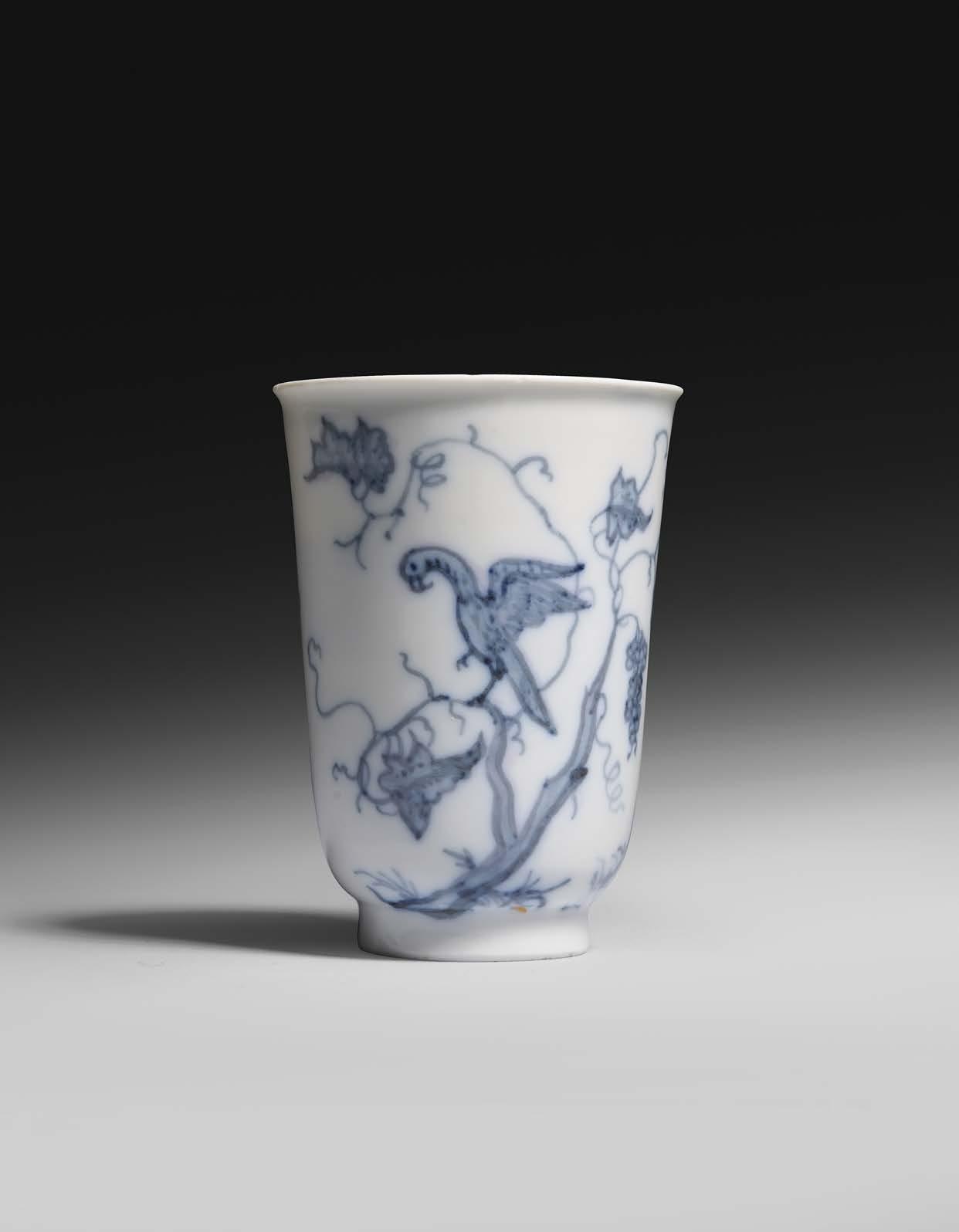
TUESDAY 3RD SEPTEMBER 2024


TUESDAY 3RD SEPTEMBER 2024
Please dial +44 (0)1722 followed by the number listed below
BRITISH AND CONTINENTAL CERAMICS & GLASS
Clare Durham 424507
Hollie Morrison 446964
20TH CENTURY DESIGN
Michael Jeffery 424505
Zoe Smith 446955
AFRICAN & OCEANIC ART ANTIQUITIES
Will Hobbs 339752
Georgina Way 446980
ASIAN ART
John Axford MRICS 424506
Alexandra Aguilar 424583
Freya YuanRichards 424589
Jeremy Morgan +44 (0)7812 601098
Michelle Yu 424571
Olivia Jones 424591
Nelson Chui 424591
CHINESE PAINTINGS & CALLIGRAPHY
Freya YuanRichards 424589
Michelle Yu 424571
FURNITURE, WORKS OF ART & CLOCKS
Mark YuanRichards 411854
Neil Grenyer 446974
Jim Gale 339161
Sarah Stone 339161
Victoria Elwell 339161
JAPANESE ART
Alexandra Aguilar 424583
Olivia Jones 424591
JEWELLERY
Marielle Whiting FGA 424595
Jonathan Edwards FGAA (Consultant) 424504
Samuel Hug FGA DGA 424586
Megan Corbett
MEDALS & COINS, ARMS & ARMOUR
Ned Cowell 341469
Georgina Way 446980
SILVER
Rupert Slingsby
VALUATIONS FOR INSURANCE & PROBATE
Jeremy Lamond MRICS FRSA
424501
Archie Swann 424594
Jacob Carpenter
PAINTINGS
Victor Fauvelle
424502
Neil Grenyer 446974
Frances Woodhams
Hannah Farthing (Trainee Valuer)
CLIENT SERVICES
Ruth Pike (Office Manager) 424500
Sarah Bennie
Julie Langstaff
Gemma Pointer
MARKETING
Chloe Davie
ACCOUNTS
Ania Antkowiak
BOARD OF DIRECTORS
John Axford MRICS Chairman
Natalie Milsted FCCA Managing Director
ASSOCIATE DIRECTORS
Alexandra Aguilar
Ed Beer
Ned Cowell
Clare Durham
Victor Fauvelle
Will Hobbs
Samuel Hug FGA DGA
Michael Jeffery
Jeremy Lamond MRICS FRSA
Rupert Slingsby
Marielle Whiting FGA
Freya YuanRichards
Mark YuanRichards

446961
Ed Beer 446962
Victoria Sturgeon
Heidi Easton
446951
TUESDAY 3RD SEPTEMBER 2024
9.30AM AT OUR CITY CENTRE SALEROOMS, SP1 3SU

VIEWING WILL TAKE PLACE AT OUR OLD SARUM GALLERIES
Saturday 31st August 10.00am – 1.00pm
Monday 2nd September 10.00am – 4.00pm
Tuesday 3rd September 8.30am – 1.00pm

Clare Durham 01722 424507 cd@woolleys.live
Hollie Morrison 01722 446964 hm@woolleys.live
DIRECTIONS TO THE OLD SARUM GALLERIES

Unit 1B, Castle Gate Business Park
Old Sarum, Salisbury, SP4 6QX
Client Parking Available
Saturday 31st August 10.00am – 1.00pm
Monday 2nd September 10.00am – 4.00pm
Tuesday 3rd September 8.30am – 1.00pm
5161 Castle Street, Salisbury, SP1 3SU
BUYER’S PREMIUM
Each lot is subject to a Buyer’s Premium of 26% plus VAT
CONDITION OF LOTS
Buyers are advised to obtain a full condition report prior to bidding, as descriptions do not necessarily list all faults.
COLLECTION OF LOTS BY APPOINTMENT
Collection is from our warehouse, Unit 1B, Castle Gate Business Park, Old Sarum, Salisbury, SP4 6QX. Please instruct carriers accordingly and note, the warehouse is closed over weekends. Please call 01722 446950 or 01722 424500 prior to collection to ensure the items are ready
All accounts to be settled prior to collection
EXPORT AND CITES LICENCES
Some lots will require export or CITES licences in order to leave the UK or Europe, please refer to the department for guidance.
bid.woolleyandwallis.co.uk




Instagram: @woolleyandwallisceramics @woolleyandwallissalerooms
Facebook: @woolleyandwallis
Twitter: @woolleywallis
Pinterest: Woolley and Wallis
ILLUSTRATIONS
Front cover: Lot 117
Back cover: Lot 253
Catalogue £10.00 (£15.00 by post)
1 A Newcastle light baluster glass or goblet, c.1740, the round funnel bowl engraved with a continuous formal foliate scroll border, raised on a balustroid stem with a short baluster section over a teared knop and plain stem, 18.5cm.
£150250

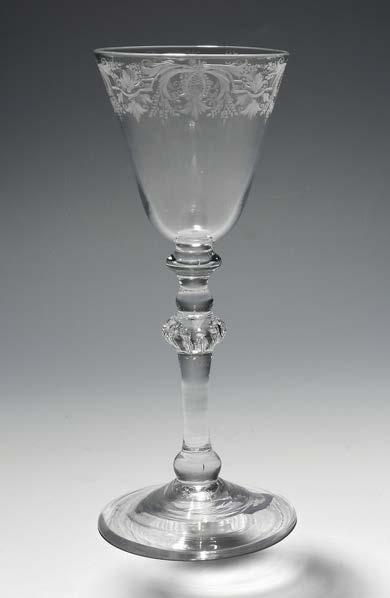
2 A Jacobite wine glass, the drawn trumpet bowl engraved with a rose and bud spray beside an oak leaf and ‘Fiat’, raised on a thick airtwist stem, a new foot, 14.8cm. £100200
£150250
3 A cordial glass, c.1760, the funnel bowl slightly fluted and engraved with flowers, raised on a thick multiple series opaque twist stem over a folded foot, 16.3cm.


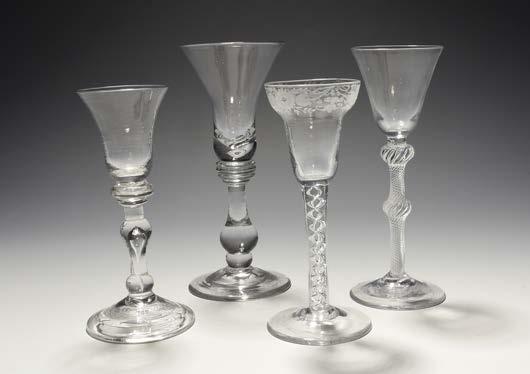
Four balustroid wine glasses, c.173050, one with a generous bell bowl over annulated collars and a baluster section stem enclosing a tear, a small bell bowl glass on a balustroid stem and folded foot, a drawn trumpet bowl with solid base enclosing a tear over a hollow baluster stem, and a drawn trumpet glass with a low baluster knop enclosing a tear, 17.8cm max. (4)
£150250

6 Four small wine glasses, c.1760, one probably Dutch and engraved in the Jacobite manner with a moth and daffodil, two with ogee bowls engraved with grapevine and lily of the valley, a round funnel bowl engraved with grapevine, and a later glass made in three parts and engraved with roses, 14.7cm max. (5)
£150250
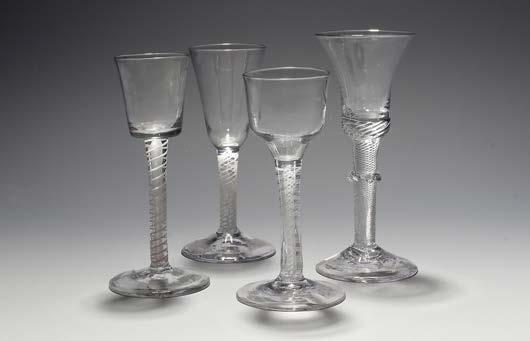
8 Four small wine glasses, c.1760, one with a bell bowl over a dense airtwist stem with collar, a bucket bowl over a multi series opaque twist stem, an ogee bowl glass and another with a deep round funnel bowl, both over opaque twist stems, 16cm max. (4)
£150250
5 A baluster wine glass, c.1730, with a bell bowl raised on an annulated knop above a baluster stem and basal knop, a small balustroid glass with bell bowl over a stem with baluster section enclosing a tear, a pantopped wine glass engraved with a band of flowers over a mercury twist stem, and a tall wine glass with round funnel bowl raised on a double knopped airtwist stem, 17.3cm max. (4)
£300500

7 Five wine glasses, c.175060, three with drawn trumpet bowls over plain stems enclosing a long tear, one a bell bowl on a plain stem and folded foot, the last a funnel bowl over a plain stem and folded foot, 17.5cm max. (5)
£150250

9 An early dwarf ale glass, c.1730, with flammiform moulding to the drawn bowl, another dwarf ale engraved with hops and barley, a dram glass with a bell bowl over a short stem and folded foot, and two beakers engraved with flowers, 12cm max. (5)
£100200

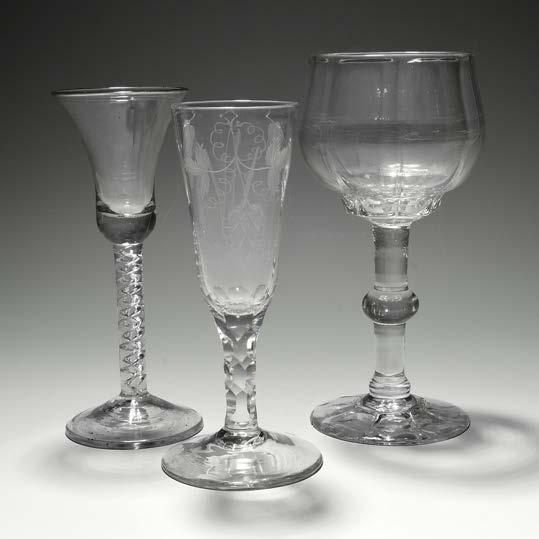
10 Two baluster wine glasses, c.1730, one with a bell bowl engraved with a stylised foliate band, raised on a stem comprising a triple annulated knop over a true baluster section, the other with a bell bowl over a stem with two mushroom knops over a domed and folded foot, a manufacturing flaw to the foot, 16.4cm max. (2)
£300500
11 A rare mead glass, c.1740, the cup bowl with vertical moulded flutes, raised on a plain knopped stem and moulded foot, a wine glass with a bell bowl over an airtwist stem, and an ale glass engraved with hops and barley over a facet cut stem, 19cm max. (3)
£100200
12 Two Bohemian wine glasses or goblets, c.170020, the first with a faceted flared bowl engraved with the arms of Austria impaling Burgundy, raised on a short stem enclosing red and gilt spiral threads, the larger glass with a conical bowl engraved with birds, flowers and polished ovals, raised on a faceted baluster stem, 19.2cm max. (2)
£300500
13 A cordial glass, c.1740, the narrow funnel bowl with a solid base enclosing a tear and raised on a plain stem with central and basal knops over a folded foot, and a ratafia glass with slender drawn trumpet bowl over a double series opaque twist stem, 17.4cm max. (2) £100200




14 A large wine glass, c.1760, the round funnel bowl engraved with a moth and cut with a large bunch of polished grapes, raised on a doubleknopped airtwist stem with annulated collar, over a conical foot, 19.5cm.
£150250
15 A rare small wine glass, c.174050, the ogee bowl engraved to one side with ‘TURKS HEAD’, the reverse ‘Oh How Charming is Good Liquor’, raised on a plain stem over a folded foot, 14cm.
£300500
16 A balustroid wine glass, c.173040, with bell bowl raised on a Kit Kat type stem with a baluster knop over a domed foot, probable marginal trim to the foot, 16.8cm.
£100200
17 A large cider glass, c.1760, the deep slightly ogee bowl with diamond point etching of a fruiting apple tree, the reverse inscribed ‘CYDER’, raised on a thick opaque twist spiral enclosing a gauze core, the foot trimmed, 17.3cm.
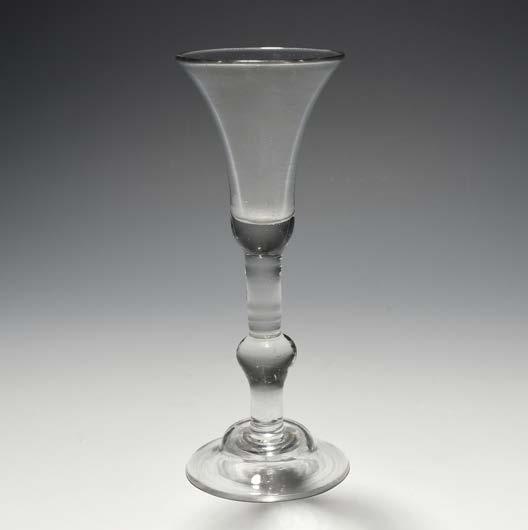
£400600


18 An Admiral Byng wine glass, c.1763, the round funnel bowl engraved with the officer hanging from a gibbet flanked by the initials A B, the reverse inscribed JUSTICE, raised on an airtwist stem above a conical foot, 15.6cm. £8001,200
Admiral John Byng was a Royal Naval officer and an MP from 1751 until his death in 1757. During the Seven Years War, Byng was sent to relieve a besieged garrison at Minorca. With his ships in a poor state of repair, Byng opted to return to Gibraltar to see to his ships and await further promised resources. On his return to Britain he was court-martialled for failing to “do his utmost” to prevent the loss of Minorca. He was executed by firing squad on 14th March 1757 - the engraving on the glass being symbolic rather than accurate - despite appeals to King George II for clemency. Byng was seen by many as a scapegoat for the Admiralty’s inefficiency and the execution in this way of such a high-ranking officer divided the country. His descendants today continue to campaign for a posthumous pardon.
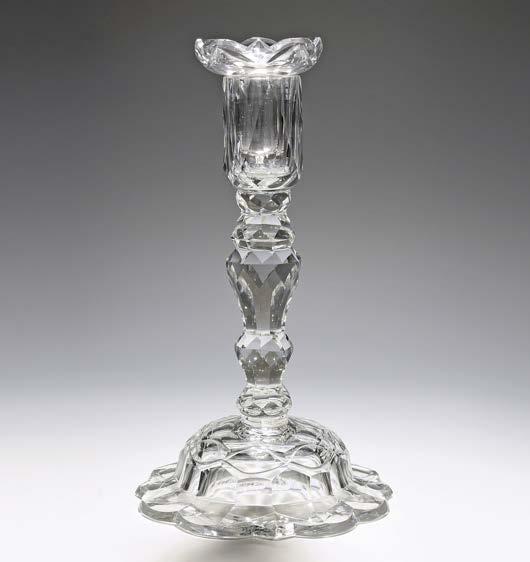

19 A cut glass candlestick with removable drip pan, late 18th/early 19th century, with a faceted baluster stem raised on a tall helmet foot with shaped rim, 24cm. (2) £150250
20 An unusual cut and moulded glass candlestick, late 18th century, the sconce moulded with vertical ribs over a facet cut stem, the helmet foot similarly moulded and cut to the rim, a large chip to the base of the removable drip pan, 24.5cm. (2)
£150250
21 A composite stem glass candlestick, c.1740, the Ushaped sconce raised on an inverted Silesian stem over a flattened ball knop between annulated rings, raised on a moulded helmet foot, 19cm. £200300
22 A cut glass chamberstick, c.177080, with a round funnel facet cut sconce rising to a shaped rim, raised on a flat lobed foot or drip tray, 13cm. £150250

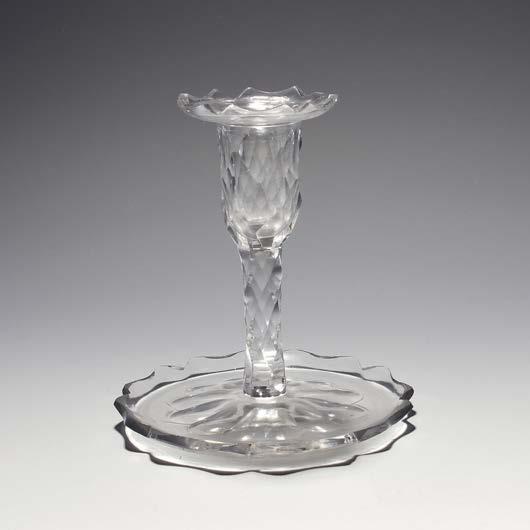
23 A pair of glass lustres, 1st half 19th century, with baluster stems, hung with two tiers of faceted lustres, and a toasting glass or goblet engraved with hops, barley and grapes around an empty shield, 27cm max. (3) £200300
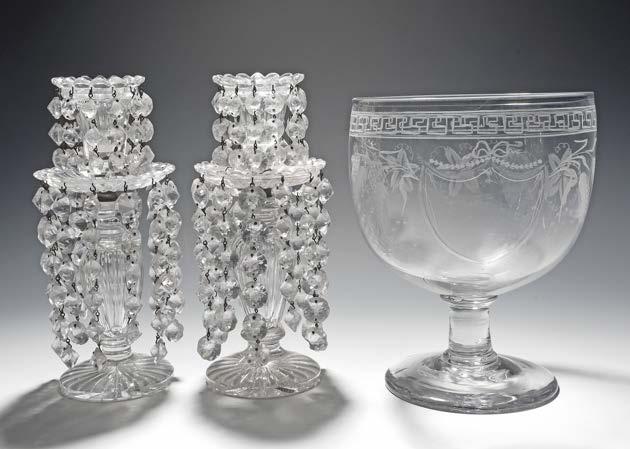

24 Two glass decanters with one stopper, c.1800, of mallet shape, one gilded ‘Rum’ beneath a grapevine border, the other blue glass and gilded with a faux label inscribed ‘Brandy’, with a Sunderland Bridge rummer engraved with the initials ‘JEP’ and a small opaline glass milk jug with wide rim, 22.5cm max. (5) £100200
25 Five German glass tankards, 19th/early 20th century, four with painted porcelain lids, one with a young woman dressing before a mirror, with initials and a shield worked into the design, one with the portrait of a man, the mount inscribed ‘Bayreuth August 1876’, another with a dog, the last with flowers, the fifth tankard with a facet cut amber glass lid, a crack to one tankard, 18cm max. (5) £200300

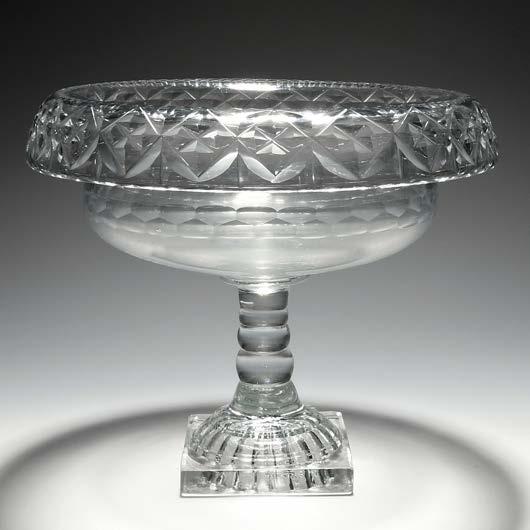
27 A large Irish cut glass comport or centrepiece, early 19th century, of navette shape, cut with diamond bands and flutes, raised on a bobbin stem and moulded foot, minor chipping, 30cm across. £150250
Provenance: a private collection. Purchased from the Bishop of Waterford’s house, c.1950.

26 An Irish cut glass bowl or centrepiece, 19th century, the circular bowl with an everted rim cut with a diamond design, raised on a multiknopped or bobbin stem over a square lemonsqueezer base, a chip to one corner of the foot, 20.5cm high. £150250

28 A large glass tazza, c.1750, the wide flat top with a galleried rim, raised on a moulded stem over a domed folded foot, 29cm dia. £150250


29 A large toasting or mixing glass, c.176070, the deep Ushaped bowl raised on a multi series opaque twist stem over a conical foot, 24cm. £150250
30 A large glass rummer of photographic interest, dated 1857, engraved with a panel containing a camera, inscribed ‘Presented to H H F Leithead by H H Bright, R Miller & J B Burden, Hartlepool 1857’, within fruiting grapevine, raised on a short plain stem, 17.2cm.
£100200
An H F Leithead is listed as being enrolled as a member of the Liverpool Photographic Society in 1858, suggesting that this was a farewell gift from fellow enthusiasts in Hartlepool the previous year.
31 A glass jug, late 18th century, the ovoid body raised on a circular foot, applied with a strap handle, 20.5cm.
£150250
32 A large glass serving jug or carafe, c.1770, of mallet form with a slight kickin base, applied with a strap handle and with a string rim, 25cm.
£500700

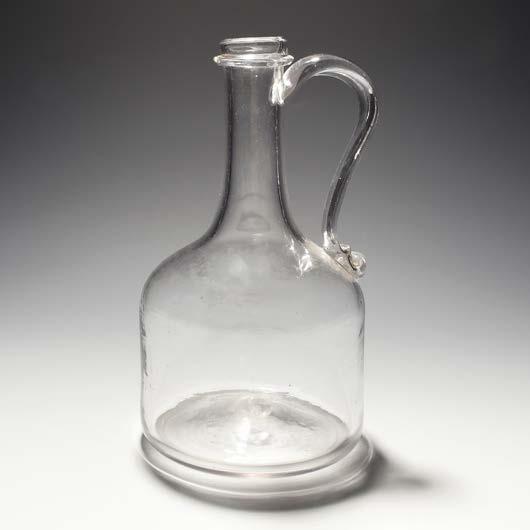
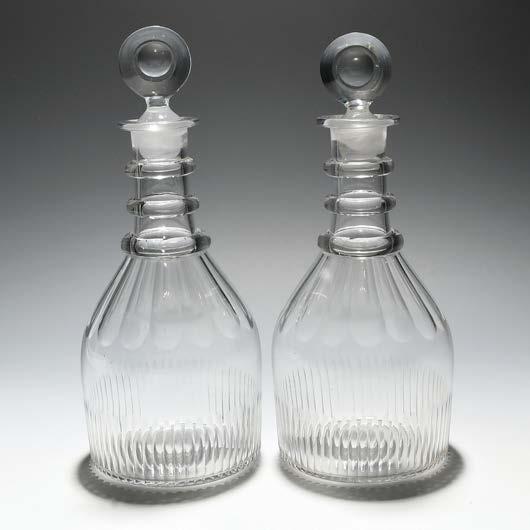
33 A pair of glass decanters and stoppers, c.177090, of mallet shape, the shoulders cut with polished lappets beneath three applied neck rings, each with a bullseye stopper, 27cm. (4) £150250
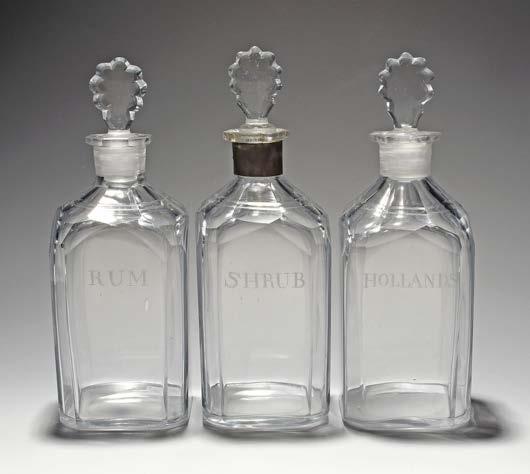
35 A set of three small glass decanters and stoppers, c.1800, of square section with facet cut shoulders and octagonal rims, engraved ‘Rum’, ‘Shrub’ and ‘Hollands’, a metal band to one neck, 21.5cm. (3) £150250
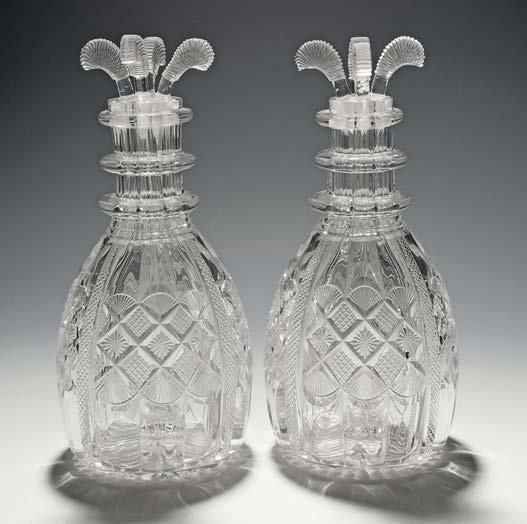
34 A rare pair of compartment liqueur decanters, 19th century, each divided into four sections, cut with a trellis design beneath three neck rings, each fitted with four small stoppers, 25.5cm. (10) £250350
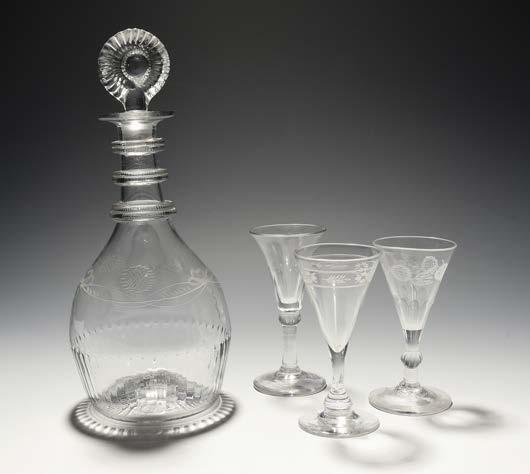
36 An Irish glass decanter and stopper, c.1820, probably Waterloo Glass Works of Cork, the Prussian shape moulded with vertical flutes and engraved with a simplistic floral design, with moulded bullseye stopper, with three small glasses, 28cm max. (5) £120150
37 Six black papier mâché bottle coasters, early 19th century, the circular forms decorated in gilt and polychrome with varying leaf, floral and butterfly designs, 13.8cm max. (6)
£150250
38 Seven German milchglas mugs or tankards, 18th century, variously painted in polychrome enamels with scenes of courting couples, one with a ship in harbour, another with an applepicking scene, damages, 16cm max. (7)
£150200
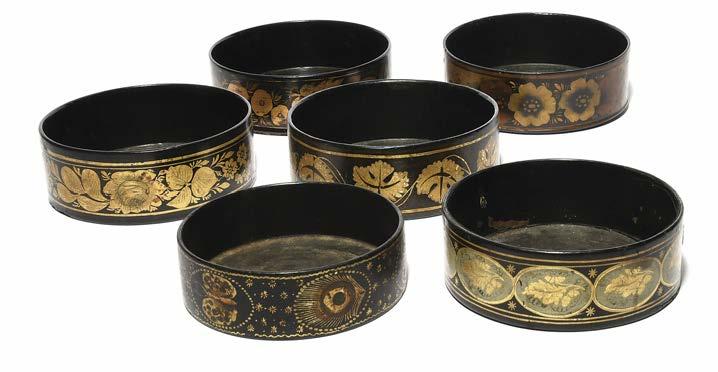
39 A Staffordshire opaque glass milk or cream jug, c.1755, of baluster form, raised on a low foot and applied with a loop handle, and a small bottle vase with pale buff striations, 12cm max. (2)
£250350
40 Two South Staffordshire opaque white glass bottles, c.1755, one with wrythenmoulding to the neck and painted with flower sprigs, the other painted with peony and other flowering plants, and a small opaque glass scent bottle with silver mounts, the neck of one vase reduced, 11cm max. (3)
£250350
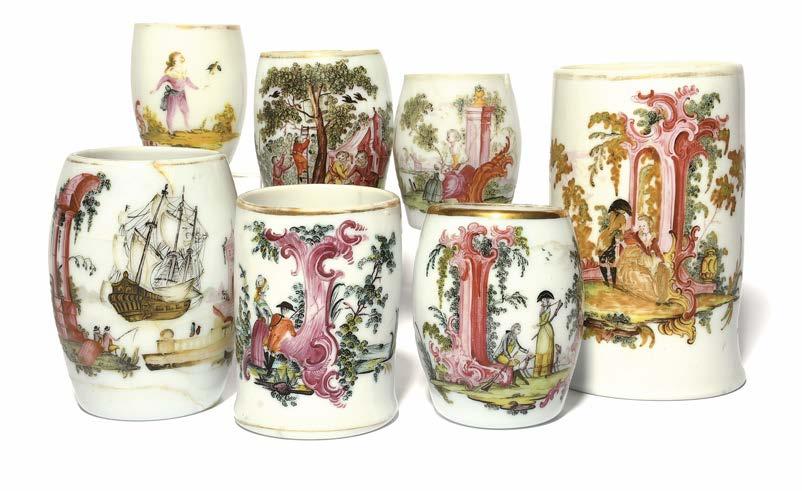



41 A rare Bohemian zwischengoldglas beaker, c.1870, the faceted form gilded with a stag and two deer between tall trees in a continuous woodland landscape, the base with a fleur de lys border in black, enclosing three small wooden dice to the base, 10.8cm.
£500700
42 A rare Vienna glass beaker (ranftbecher), 19th century, in the manner of Anton Kothgasser, the waisted form painted with an arrangement of playing cards overlapping on a brown ground, one card painted with an Austrian tax stamp, the foot cut with vertical flutes and richly gilded, 11.8cm.
£8001,200
Cf. Bonhams, The Muhleib Collection of European Glass, 2nd May 2013, lot 66 for an identical beaker by Kothgasser, dated 1824.
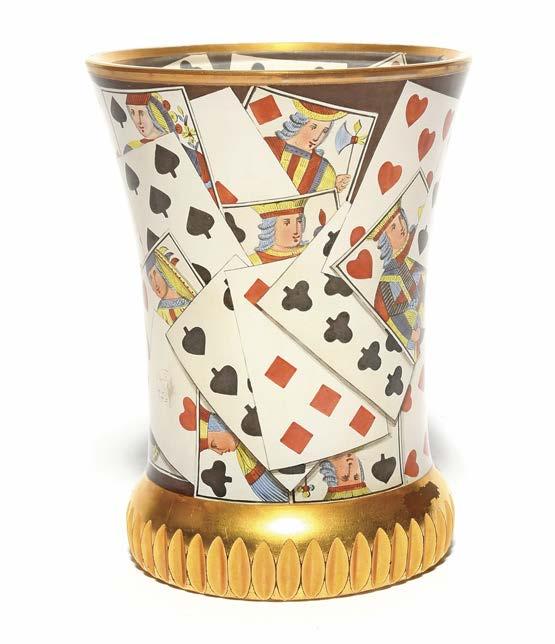

43 A medieval earthenware water jug or ewer, c.12th/13th century, the cylindrical body issuing a short spout and a wide strap handle, and a small Tudor Green jug, c.16th century, the neck and shoulders decorated with a rich green glaze, some damages, the smaller jug with a new handle, 23.3cm max. (2) £200300

44 Two Rhenish stoneware bellarmines (Bartmannskrug), 17th/18th century, each with a floral or mask roundel to the body beneath a long bearded face to the neck, one with an old metal mount to the rim, minor damages, 22.5cm max. (2) £300500


45 A small German stoneware bellarmine (Bartmannskrug), late 17th/18th century, the tapering neck with a bearded face, decorated in a mottled glaze, cracked, a hole drilled to the neck, 15.5cm. £150200
46 A pair of Halifax slipware bird whistles, c.180020, each with a large central bird mounted on a perch flanked by smaller birds above conical bases, decorated in striated cream and manganese slip, 24.5cm. (2) £150250
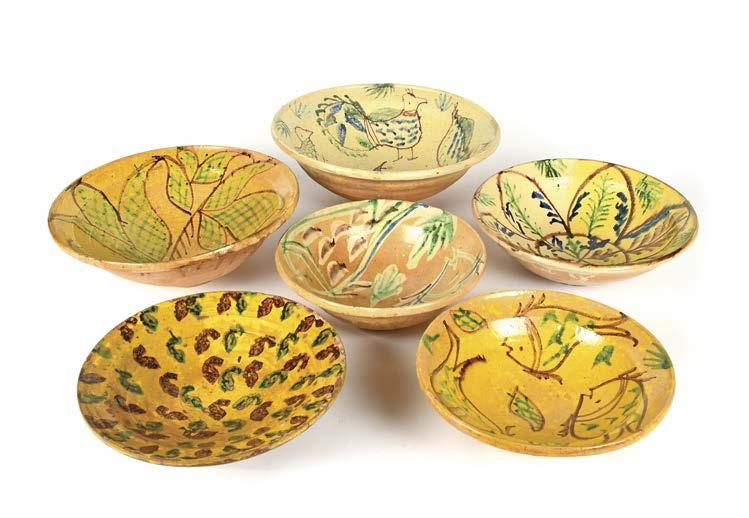
47 Six Peshawar earthenware bowls (Pakistan), late 19th/early 20th century, the flared forms variously decorated in cream, green, blue and manganese slip with fish, peacocks, flowers, leaves and geometric designs, 37.5cm max. (6) £300500
48 A Persian vase or jar, 18th century, painted in blue with geometric motifs and trellis bands, and a Moroccan charger painted with a star design to the well, within a dense panelled band in shades of blue, green, yellow and manganese, repairs to the jar, 34cm max. (2)
£150250
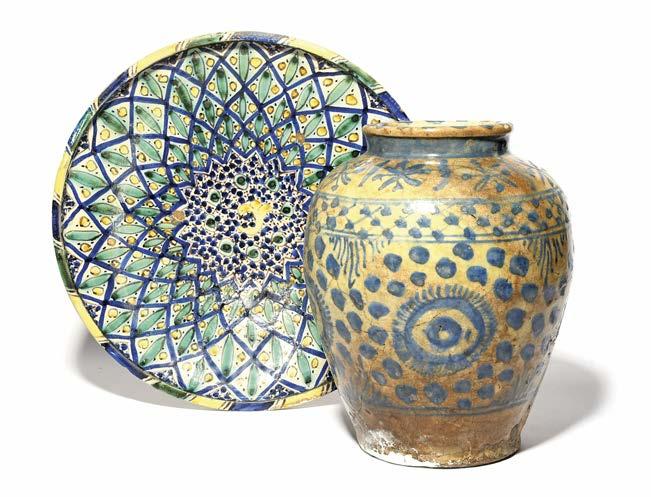

49 Two large HispanoMoresque lustre chargers, late 19th/20th century, each with a convex well, the larger decorated in copper lustre and blue with a saint beneath an arch within panelled borders, the cavetto with a continuous inscription, the smaller in a paler ruby lustre with blue inscriptions, M and foliate mark to the underside, 50.6cm max. (2)
£250350
50 A Kutahya pottery tankard, 19th/20th century, the tapering form decorated with a dense floral design in yellow, green, red and black, the angular handle with a repeated star design, some chipping to the footrim, 11.3cm. £100200
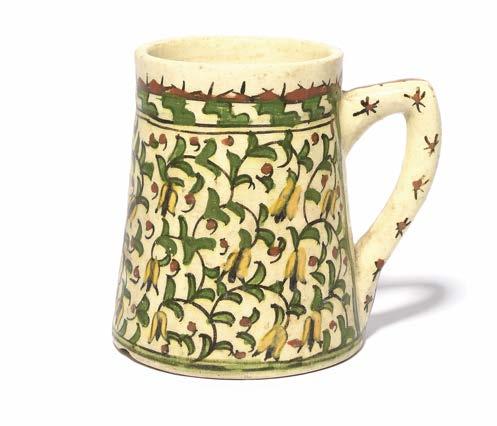
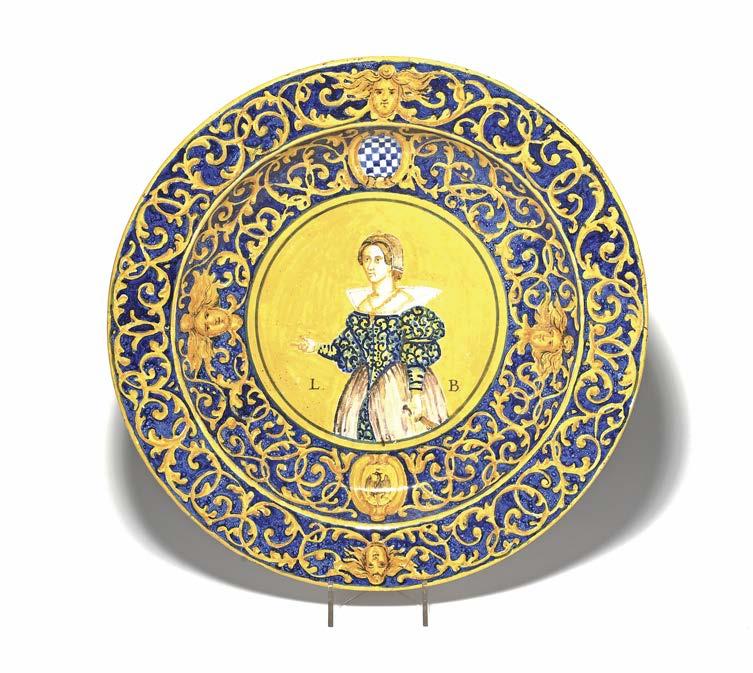
51 A massive Italian maiolica charger in Renaissance style, 19th century, the well painted with a portrait of Lucrezia Borgia on a yellow ground, appearing to hold a knife, inscribed ‘LB’, the wide rim with a foliate design on a blue ground, with a Prussian eagle armorial crest and the shield of the Pico della Mirandola family, a riveted section, 50cm. £600800 Lucrezia Borgia was the illegitimate daughter of Pope Alexander VI and his chief mistress, Vannozza dei Cattanei. She had a reputation as a femme fatale and married three times, taking a number of lovers at the same time. The Borgia family were linked to several murders and legend has it that Lucrezia had a ring in which she concealed poison to see off her enemies. On 14th June 1497, Lucrezia’s brother, Giovanni, was himself murdered. No official culprit was ever found, but rumours linked both his older brother, Cesare, and his sister, Lucrezia, to the deed. Giovanni had earlier raped Lucrezia’s friend, Rosalina della Mirandole, leading to her suicide. That Pope Alexander VI did not pursue an investigation into the death of his son may indicate that he knew another member of his own family was responsible.


53 An Italian maiolica albarello, probably 18th century Savona, painted in blue with the profile portrait of a man between continuous floral bands, the waisted form inscribed ‘UN DI MINIO’, some glaze loss, 21.5cm.
£150250


54 A Montelupo maiolica jug (boccale), c.162575, painted in green and manganese with a lion rampant, in the heraldic manner, the wide strap handle with horizontal stripes, some cracking, 21.2cm.
£200300
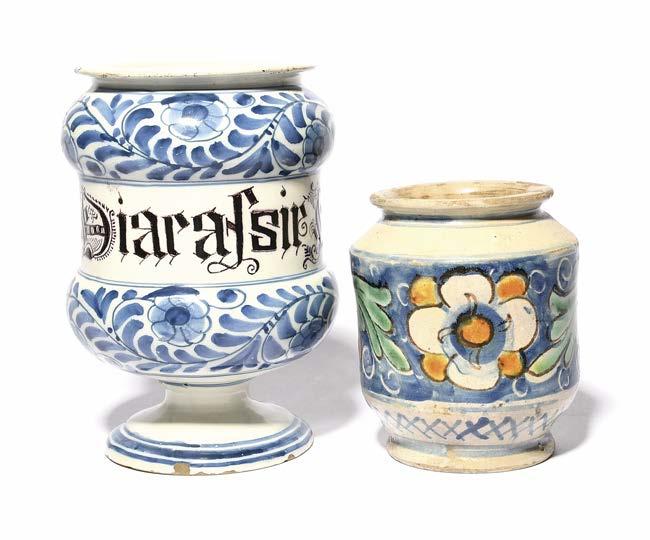
55 A Sicilian maiolica albarello, 18th century, Caltagirone, the waisted form painted with the profile portrait of a solider wearing a helmet, within a scrolling ochre border, reserved on a blue ground, the reverse with scrolling leaves, a little chipping, 23.5cm.
£500600
56 A small Caltagirone maiolica albarello, 18th century, painted in blue, green, ochre and manganese with a band of flowerheads and formal leaf scrolls, and a North Italian drug jar, c.172040, of footed dumbbell form, with a manganese inscription to the waist between bands of a formal blue foliate border, small chips, 17cm max. (2)
£200300
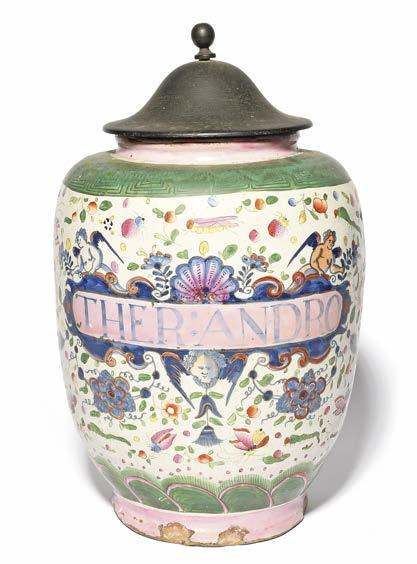
57 A large London delftware apothecary or drug jar, mid 18th century, originally decorated in blue with a cartouche inscribed ‘Ther: Andro’, later enamelled in the 19th century with a famille rose design of insects, crabs and scattered flowers between pink and green borders, with a later wooden cover, some chipping, cracked, 39.5cm overall. (2) Together with a letter from the Worshipful Society of Apothecaries, dated 4th April 1962, and another from the Wellcome Historical Medical Museum, dated 23rd May 1962.
Provenance: the Joy Hallam Collection.
Illustrated: HobbyPharm, vol. 4, No.3, 1983.
£300500


58 An unusual Delft puzzle jug, 18th century, the globular body painted in blue with a figure holding out a cloth or garment to two figures seated nearby, possibly a biblical scene of Jacob offering Joseph his coat of many colours, a further figure holding a parasol, the tall neck pierced with a flowerhead design, 18cm.
£200300
59 A pair of Continental faïence plates, 2nd half 18th century, decorated in the Imari or Dutch doré manner with a central stylised flower spray, the cavetto with a trellis band, the shaped rims with further flower sprays in red, blue and yellow, 23.3cm. (2)
£150250
60 A near pair of Delft vases and covers, 18th century, the octagonal reeded forms painted with a formal panelled design in an extended Imari palette, the covers with lion dog finials, iron red marks for Lambertus van Eenhorn, 25.3cm. (4)
£150250

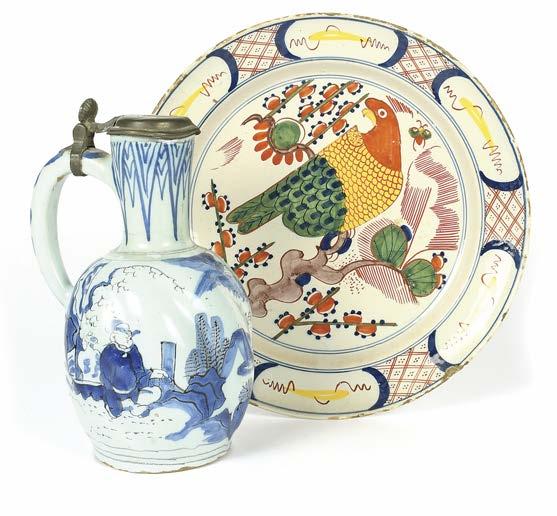
61 A Delft charger, 18th century, brightly enamelled with a parrot perched on a branch within a panelled rim, and a German faïence jug (enghalskrug) of spiral moulded form, painted in blue with Chinese figures in a garden, with pewter mounts, restoration to the neck, 30.3cm max. (2) £150250
62 Four delftware plates and a soup plate, 18th century, variously painted in blue with flowering Oriental plants, two with zigzag fences, some chipping, 23.2cm max. (5) £200300
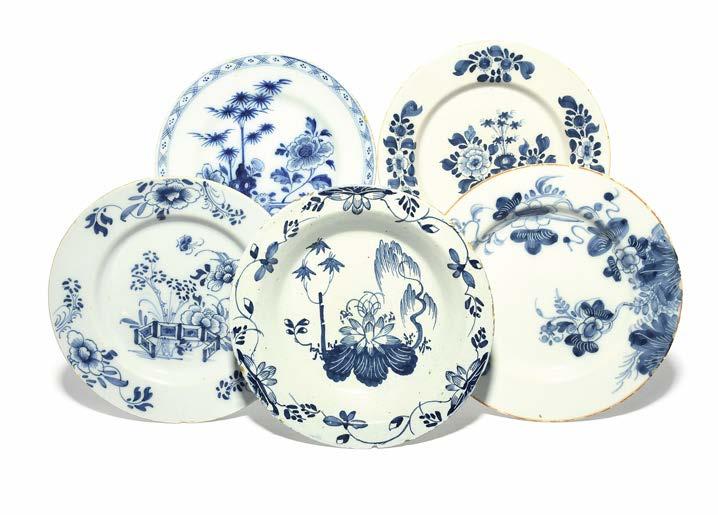

63 A creamware melon tureen and cover, late 18th/19th century, modelled as an oval gourd on a large leaf base, a Lambeth (Abigail Griffiths) delftware plate, c.1760, painted in polychrome enamels with a seated Chinese figure, and a pearlware plate painted in blue with a figure holding a parasol, within a reticulated rim, some faults, 22.8cm max. (4) £150250
Provenance: the Joy Hallam Collection.
64 A pair of Delft models of shoes, 18th century, painted in blue with a formal foliate design to the front and back, the heel painted blue, each moulded with an oval buckle, some glaze chipping, 13cm across. (2)
£500700

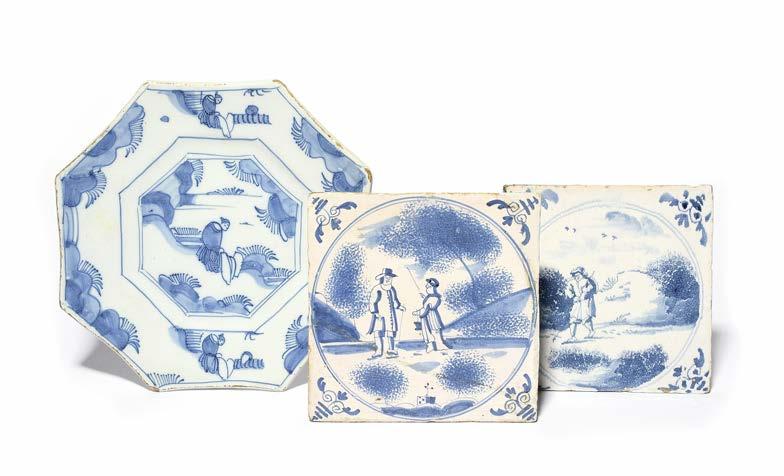
65 An early London delftware plate, c.1670, the octagonal form painted with a Chinese figure seated in a landscape, the scene repeated to the rim, and two London delftware tiles, c.16801700, painted in blue with European travellers within circular panels, one tile broken and restuck, 21.3cm max. (3)
£500700
66 A Delft or faïence teapot and cover, 18th century, possibly Swedish, simply decorated with a stylised flower spray in blue and black, modelled with a short spout and generous loop handle, heat cracks, 17cm across. (2)
£150250


67
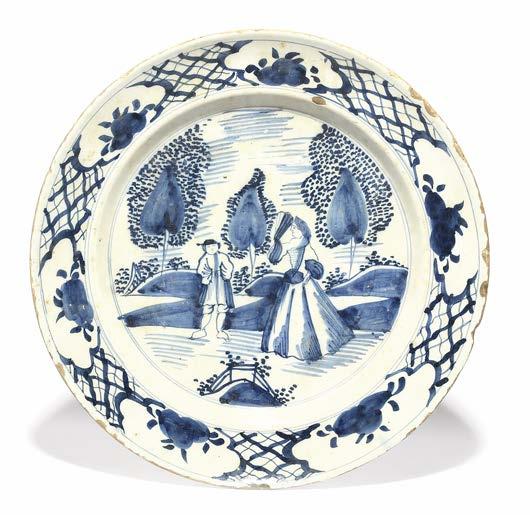
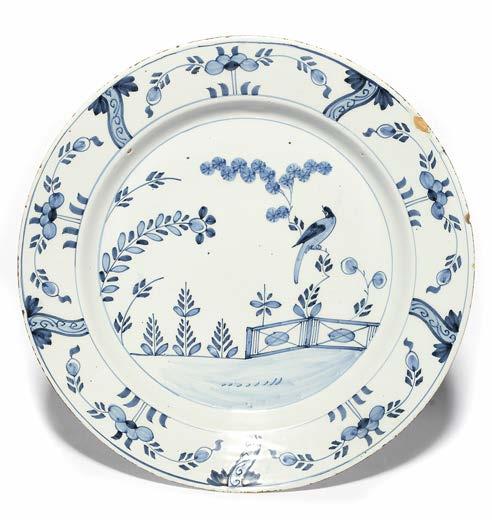



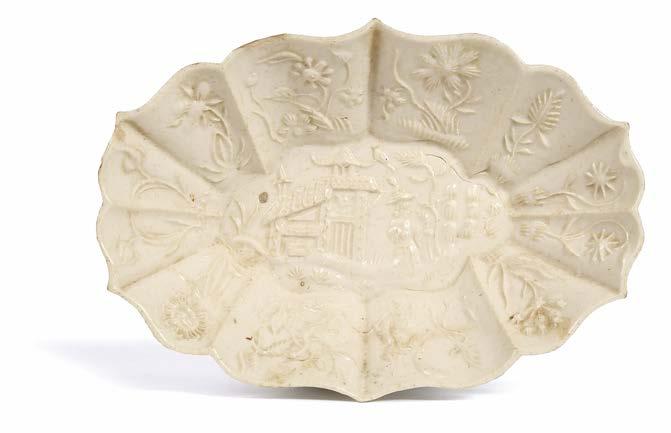

71 A Staffordshire saltglazed teapot and cover, c.175560, the globular body brightly enamelled with flowering Oriental branches, with crabstock handle and spout, some chipping to the cover and spout, 18.5cm across. (2)
£500700
72 A small Staffordshire saltglazed stoneware teapot and cover, c.1760, the globular body incised with a geometric band between applied crumbed clay, the spout moulded with a mask, the cover with a lion dog finial, some restoration to the cover and spout, 15.5cm across. (2)
£500700
73 A saltglazed stoneware spoon tray, c.1755, the deep lobed form moulded in relief with a Chinese figure beside a pagoda, the sides with flowering plants, two small rim chips, 11.8cm.
£250350
74 A saltglazed stoneware milk or cream jug, c.175560, of baluster form with a silvershape rim, and a small Jackfield jug of similar shape, a rim chip and short crack, 7.5cm. (2)
£100200
75 A Staffordshire saltglazed stoneware teapot and cover, c.1760, the globular body painted with a formal flower arrangement reserved on a puce ground, with crabstock handle and spout, cracked, 18.5cm across. (2)
£150200


76 A ‘Scratch Blue’ saltglazed stoneware mug, c.1750, with incised and coloured decoration of a stylised deer running between leafy plants, above narrow turned bands and a flared foot, a star crack to the base, 12.5cm high.
£250350
77 A small Staffordshire saltglazed stoneware teapot and cover, c.1760, well enamelled with a parrot perched on a branch beside flowering Oriental plants, the flat cover with a further floral stem, some chipping to the spout, 14.5cm across. (2)
£150200


78 A large creamware service, late 18th/early 19th century, with feathered rims picked out in puce enamel. Comprising: a large tureen and cover, five serving dishes or chargers in three sizes, two sauceboats, nine soup plates and 25 plates. (45) £200300
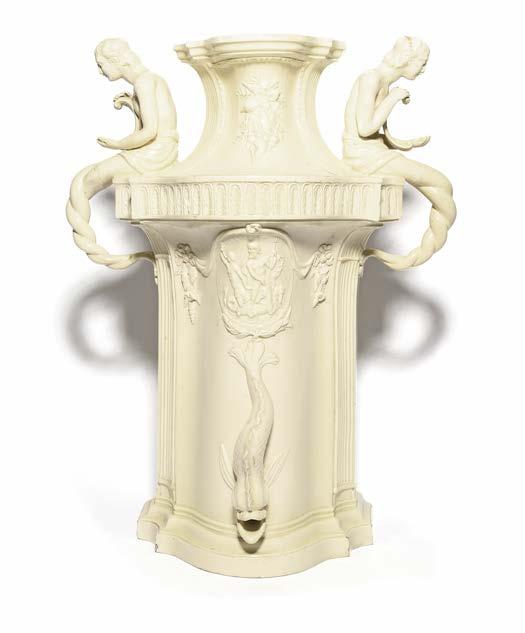
79 A large Leeds creamware fountain, 1st half 19th century, the shaped body applied with a dolphin spout below a panel depicting Neptune and Venus, the shoulders surmounted with triton handles around a central opening, some damages and restoration, 51.5cm. £250350
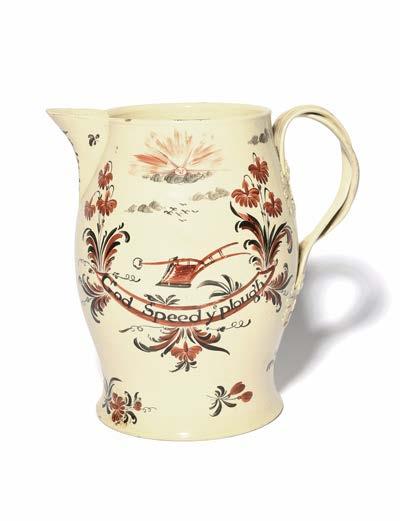
80 A large creamware cider jug, late 18th/early 19th century, painted in red and black with ‘God Speed ye Plough’ beneath a sunrise, the reverse with a corn stook and harvest implements, inscribed ‘John & Mary Beckitt’ beneath the double strap handle, 20.7cm. £500700
81 Two creamware plates of shipping subject, late 18th century, one printed and coloured with a ship at sail, flying a flag inscribed ‘Project’, the rim inscribed ‘1783 28 Nov’r, Jacob Karstensen & Anna Jacobs’, the other decorated with a ship flying the American flag, the rim with six flower sprays in black, 24.7cm. (2) £200300
82 A family pair of Pratt ware spirit barrels, dated 1809 and 1820, painted in green, ochre, blue and umber with continuous floral designs between turned bands, one inscribed ‘AR 1820’ and ‘JH 1820’, the other ‘Ann Rusey February 15 1809’, and a small creamware spirit barrel brightly painted with flowers and inscribed ‘EJ 1829’, 16.8cm max. (3) £200300
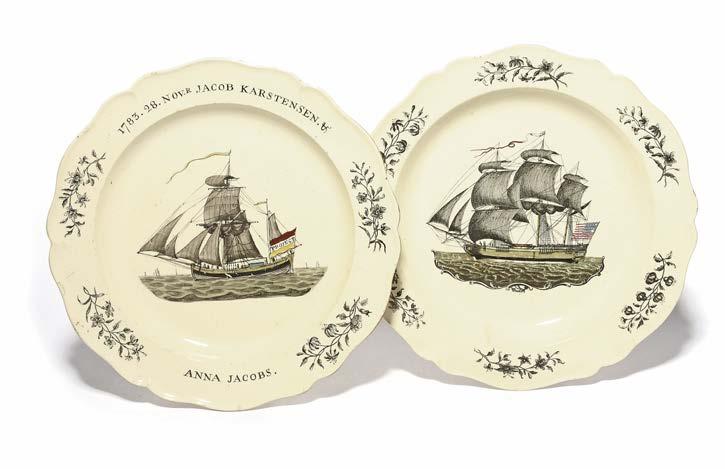
83 A creamware sauce tureen and cover, 19th century, modelled as a duck decorated in washed glazes of blue, green, brown and yellow, impressed TN 91, 18cm across. (2) £150250
84 A Pratt ware ‘Parson, Clerk and Sexton’ jug, early 19th century, moulded in relief with the three titled characters drinking and smoking in a garden setting, between corn ear borders, on a blue ground, and a pearlware plaque, moulded in relief with a profile portrait of a gentleman, with integral frame, some restoration to the spout, 20cm max. (2) £100200
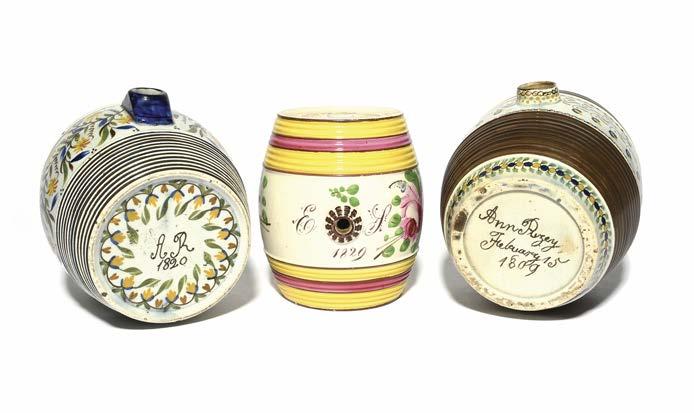

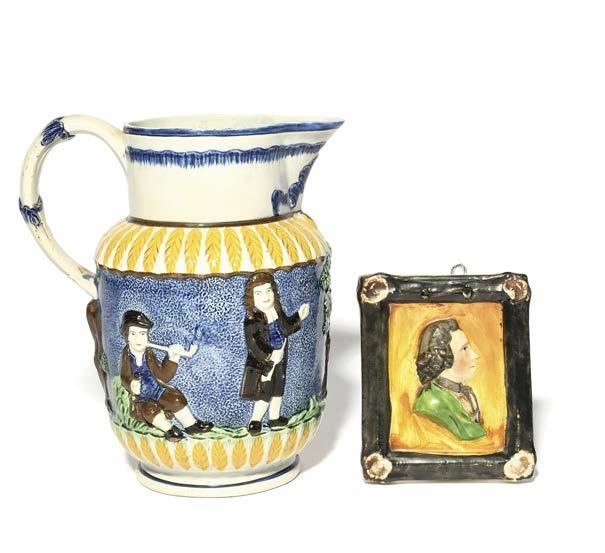

85 An unusual pearlware tea and coffee service, c.17901800, the fluted forms decorated with a deep orange feathered border and gilt edging. Comprising: a coffee pot and cover, a teapot with cover and stand, a slop bowl, a sucrier, a milk jug, a cake plate, five teabowls, six coffee cups and six saucers. (26) £400600

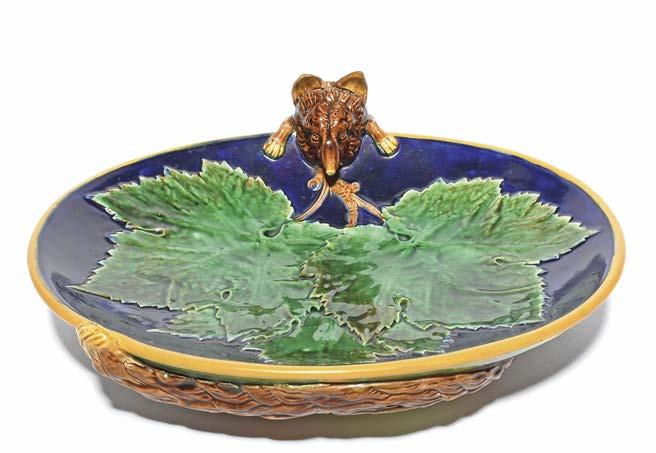
86 A drybodied stoneware christening mug, dated 1814, applied with three scenes of figures, including a a boy with a corn sheaf and a cornucopia, and Ganymede feeding the eagle, inscribed ‘Mastr. William Kempson Stafford 1814’, 8.8cm high. £120180
87 A George Jones Majolica dish or comport, c.1869, modelled with a fox leaning over the edge of a large dish moulded with vine leaves, his brush tail sweeping across the underside, applied mark and impressed registration diamond, restoration, 28.7cm across. £150200


88 An unusual Wedgwood pearlware cruet, 19th century, the oval form set with six reticulated egg cups around a central navetteshaped salt, all edged in blue, impressed mark, 26.5cm.
£150200
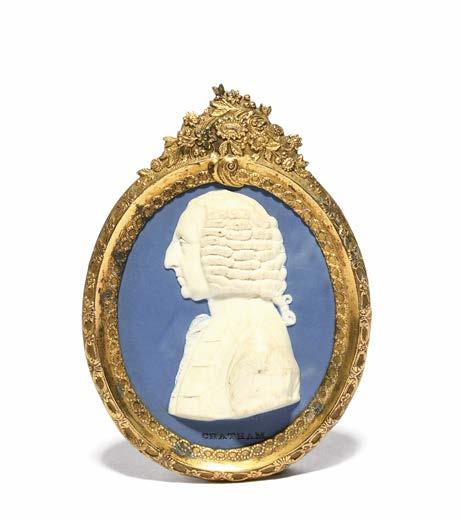
90 A Wedgwood & Bentley Jasperware plaque of William Pitt, c.177280, modelled by John Flaxman in profile, in white on a blue ground, titled CHATHAM, mounted in an elaborate gilt metal frame, impressed mark to the underside, the plaque 8.5cm.
£200300
William Pitt (the Elder), 1st Earl of Chatham, was Prime Minister of Britain between 1766 and 1768. He was also known as The Great Commoner because of his refusal (until 1766) to accept a title.
89 A Wedgwood tricolour Jasperware vase and cover, 19th century, applied with a continuous floral scroll design in white on a blue ground, raised on a socle foot and base with formal white leaf bands on a sage green ground, the cover with a putto finial, impressed mark, incised 442, 21.5cm. (2)
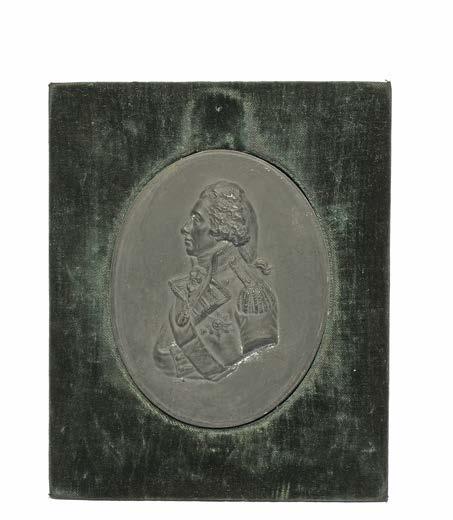
£300500
91 A Wedgwood black basalt plaque of Lord Admiral Nelson, 19th century, facing left and depicted as a head and shoulders profile portrait in full uniform, mounted in a green velvet frame, the plaque 9.3cm.
£150200
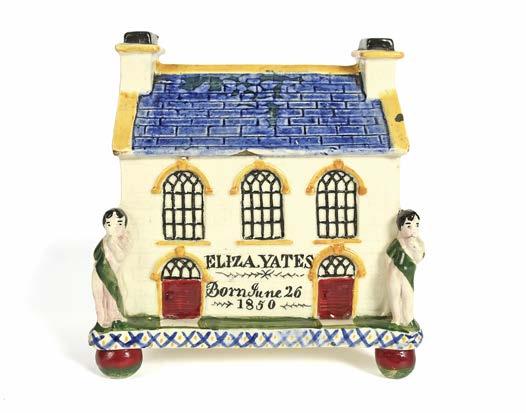
92 A pearlware cottage money box, dated 1850, modelled as a two storey house flanked by two putti, decorated in Portobello colours, inscribed in black with ‘Eliza Yates born June 26 1850’, a large chip to one corner, 17cm high. £150250
Eliza Yates was baptised at St Swithin, Lincoln on 21st July 1850, the daughter of John Dennis and Mary Ann Yates. John Yates is listed on the 1851 census as a butcher.
93 A Staffordshire watch stand, 19th century, modelled as a mantel clock, and a Staffordshire figural spill vase modelled with two gardeners flanking a mask fountain and a quatrefoil vase painted with strawberries, small restorations, 19cm max. (2) £150250
Provenance: A Private Collection from Buckinghamshire.


£100200
94 A pair of slipware models of lions, 19th century, naively modelled and recumbent with heads turned, raised on low chamfered rectangular bases, some glaze loss and chipping to one
95 A rare Staffordshire pearlware watch stand, c.181020, in two parts, the top modelled with Romulus and Remus being suckled by a wolf, the base with an opening for a large pocket watch within leaf scrolls, minor restorations, 30.3cm. (2)
Provenance: A Private Collection from Buckinghamshire.
£300500

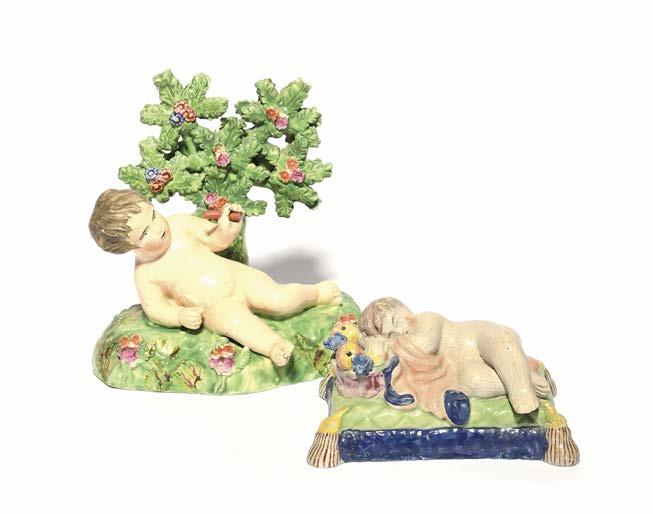
96 Two Staffordshire figures of putti, 19th century, one recumbent on a grassy base before flowering bocage, the other sleeping on a tasselled cushion, his head resting on a basket of fruit, minor faults, 15.3cm max. (2)
Provenance: A Private Collection from Buckinghamshire.
£100200
97 An unusual Continental faïence watch stand, 19th century, modelled as a mantel clock raised on a shaped green rectangular base, the top surmounted with a beaverlike animal holding a stick, 31.7cm. £150200




98 Three Staffordshire figures of the Evangelists, 19th century, depicting St Mark, St Luke and St John, the first with a lion, the second a calf, both writing their gospels, St John holding a goblet, all on titled bases before flowering bocage, some restoration, 20.5cm max. (3)
£150250
Provenance: A Private Collection from Buckinghamshire.
99 A Staffordshire Tithe Pig group, early 19th century, modelled with a parson standing with a farming couple offering their tithe, beneath leafy bocage, and a matched pair of figures of flower girls, recumbent with baskets before flowering bocage, small losses and repairs, 15.5cm max. (3)
£120180
Provenance: A Private Collection from Buckinghamshire.
100 A pair of Staffordshire figures, 1st half 19th century, one of a hunter holding a gun and a game bird, his companion as a female archer, holding a quiver and standing before a straw target, with a Staffordshire figure of a girl standing before flowering bocage, some restoration, 19cm max. (3)
£100200
Provenance: A Private Collection from Buckinghamshire.
101 A Staffordshire figure of a huntsman and his dog, 1st half 19th century, filling the barrel of his gun from his powder flask, an equestrian hunting figure with a dog racing alongside the horse, and a figure of a pointer standing before flowering bocage, some restoration, 17.8cm max. (3)
£200300
Provenance: A Private Collection from Buckinghamshire.


102 A Lakin & Poole (Staffordshire) figure of Mars, c.1800, wearing a plumed helmet and resting his right hand on his hip, a cockerel and his shield by his side on a square marbled base, titled to the reverse, 23.7cm. £100200
Provenance: A Private Collection from Buckinghamshire.
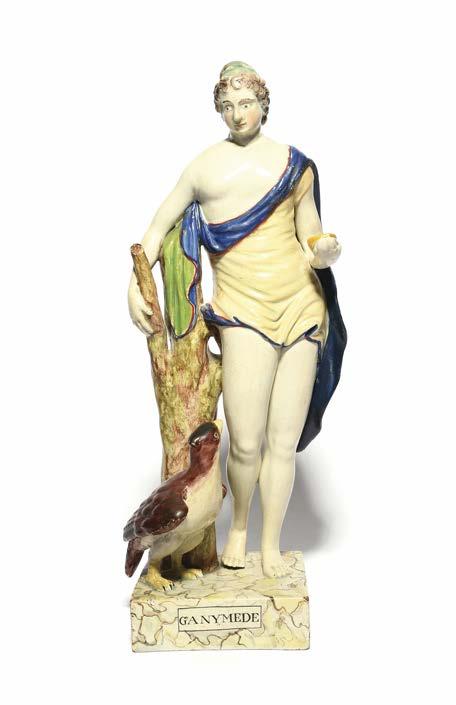
104 A large Lakin & Poole (Staffordshire) figure of Ganymede, c.180010, the young hero standing beside a tall trunk with an eagle at his side, raised on a marbled square base, titled to the front, good restoration to his neck and arm, 34cm. £150250
Provenance: A Private Collection from Buckinghamshire.

103 A large Lakin & Poole (Staffordshire) figure of Cephalus and Procris, c.180010, the Greek princess slumped on low rocks while her husband retrieves his unfortunate arrow from her breast, raised on a rectangular marbled base, titled in black to the front, impressed mark, some restoration, 27cm. £150250
Provenance: A Private Collection from Buckinghamshire.

105 A large Staffordshire figure group of Old Age, 1st half 19th century, modelled as an elderly couple resting on a stick or crutches, standing before flowering bocage and raised on a brightly enamelled scrolled base, small restorations, 27cm. £100200
Provenance: A Private Collection from Buckinghamshire.
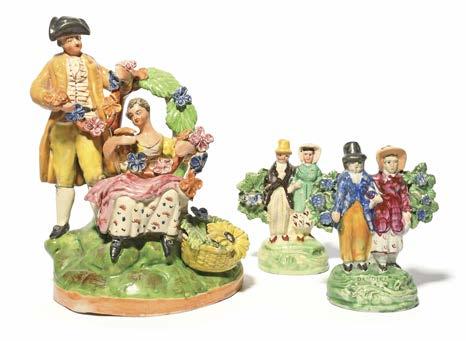
106 A Staffordshire figure group, 1st half 19th century, modelled with a gentleman standing behind a seated lady, each holding a flower garland, the base with a band of peach lustre, and two small figure groups of The Dandies, standing before flowering bocage, one titled, some restorations, 19.3cm max. (3) £150250
Provenance: A Private Collection from Buckinghamshire.
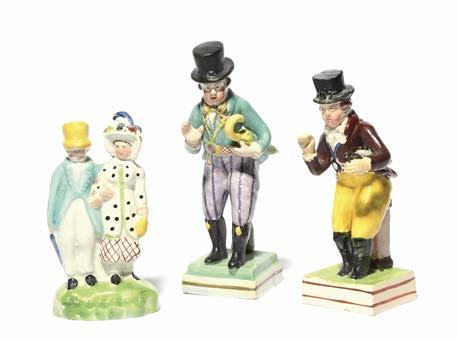
108 Two Staffordshire theatrical figures of the actor John Liston, c.1820, in his role as Paul Pry with an umbrella tucked under his arm, raised on square bases, and a small figure group of The Dandies, promenading arm in arm, some restoration, 15cm max. (3) £150250
Provenance: A Private Collection from Buckinghamshire.

110 Three Staffordshire figures of goats, 1st half 19th century, each modelled standing on a grassy hillock with a recumbent kid at its feet, all before flowering bocage, restoration to horns, 14cm max. (3) £150250
Provenance: A Private Collection from Buckinghamshire.
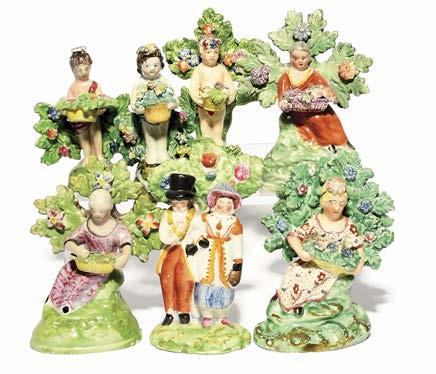
107 Seven small Staffordshire figure groups, 1st half 19th century, including one of The Dandies, three of flower girls reclining with baskets, and three of a putto holding a basket before them, all before flowering bocage, small losses and repairs, 12cm max. (7) £100200
Provenance: A Private Collection from Buckinghamshire.
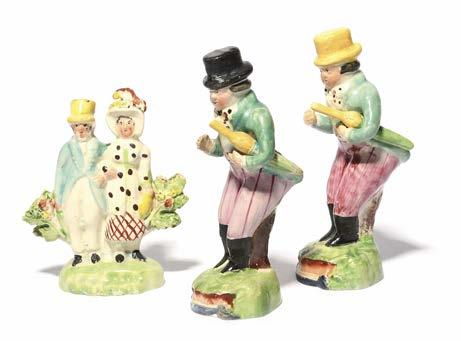
109 Two Staffordshire theatrical figures of John Liston, c.1820, in his role of Paul Pry with his umbrella tucked under one arm, and a small group of The Dandies, wearing Regency dress and standing before flowering bocage, some restoration, 13cm max. (3) £150250
Provenance: A Private Collection from Buckinghamshire.

111 Five Staffordshire figure groups of cows, 1st half 19th century, the largest of a cow being bitten by a snake, her hind leg lifted, two of a cow suckling a calf, two more with a cow standing with a recumbent calf at her feet, all before flowering bocage, some restorations, 16cm max. (5) £250350
Provenance: A Private Collection from Buckinghamshire.
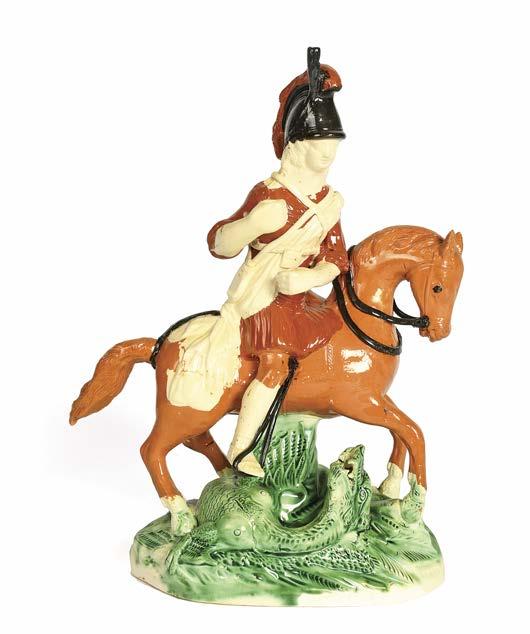

£200300
112 An unusual solid clay creamware figure of George and the Dragon, late 18th century, modelled from different coloured clays, the base and dragon washed in green, St George on horseback, vanquishing the dragon at his feet, some good restoration, 30cm.
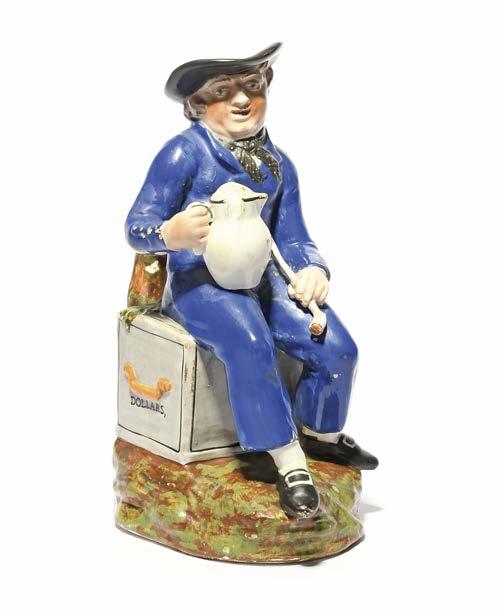
114 An American Sailor Toby jug, c.1820, wearing a blue uniform with yellow buttons and seated on a sea chest inscribed with the word ‘Dollars’, holding a foaming jug of ale titled ‘Success to our Wooden Walls’, some retouching, restoration to his hat, 25cm.
£150250
113 A Joseph Holdcroft Majolica figural jug or ewer, 2nd half 19th century, possibly William Gladstone, wearing a long brown coat, one hand resting on his stomach, the other holding a scroll behind his back, minor chipping, 27.5cm.
£100200

115 A Ralph Wood Toby jug, c.178590, seated with an empty jug resting on his left knee, a longstemmed clay pipe alongside his right leg, wearing a green waistcoat and buff jacket over pale yellow breeches, some restoration to his hat and shoes, 25.2cm.
Provenance: the Joy Hallam Collection.
£300500

John Harper Bean (known as Jack) was born in 1886 to George Bean and Mary Harper of Dudley. The family firm of A. Harper, Sons & Bean Ltd prospered during the First World War owing to the demand for munitions; in 1916 the foundry was producing 21,000 shell case a week. George Bean received a knighthood for his services to the war effort and his son, Jack, was made a CBE. With the cessation of hostilities, the manufacturers turned their attention to the production of motor cars, and the rights for the Perry car were purchased in January 1919. As Managing Director, Jack Bean was highly ambitious and travelled to America to purchase the latest production machinery. Combining a number of other smaller manufacturers, Harper Bean Limited was formed in November 1919 and the company continued expanding. Financial difficulties hampered production during the 1920s and the company went through several changes before becoming Beans Industries in 1933. It flourished during the 1950s and became part of British Leyland in 1960. Alongside his chairmanship of Bean Industries, Jack Bean was chairman for nearly 20 years of Midland Industries Ltd. He was a keen country sportsman and owned both a shooting estate in Anglesey and the Lawsnwood Estate at Wordsley. He died suddenly in March 1963 when returning from a holiday in South Africa and was buried at sea.
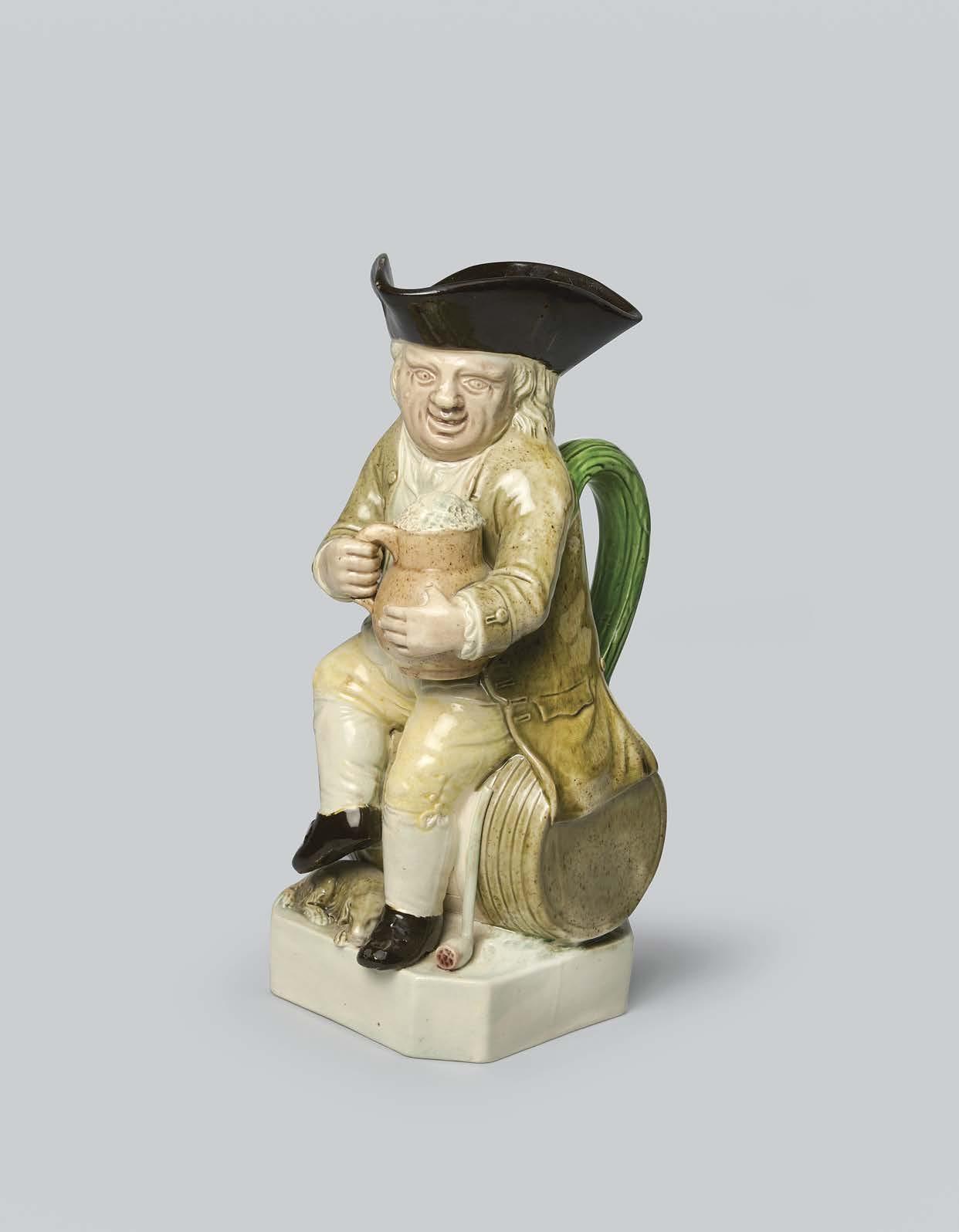
117 A good and rare Ralph Wood ‘Admiral Lord Howe’ Toby jug, c.178590, crisply modelled perched on a barrel with his dog recumbent beneath his right foot, holding a large foaming jug of ale, raised on a chamfered square base, decorated in pale yellow and buff glazes, 25.2cm. £3,0005,000 Provenance: John (Jack) Harper Bean CBE (1886-1963), and thence by familial descent. Cf. Vic Schuler, Collecting British Toby Jugs, p.58 for a discussion of the Lord Howe model.

This private collection of Staffordshire figures was assembled over a number of decades, with a focus on covering a multitude of different subject areas. Key to the collector’s enjoyment was considering the origins and influence of a piece, hence a number of Derby porcelain figures included which relate to a Staffordshire equivalent. The second part of this collection will be sold in these rooms in February 2025.
119 Two Staffordshire pearlware figure groups of the Vicar and Moses, 19th century, one of the drunken pair staggering along, raised on a tall titled base, the other of the sleeping Vicar in the pulpit, with Moses delivering the sermon below, some good restoration, 29.3cm max. (2)
£300500
118 A Hearty Good Fellow Toby jug, c.1810, standing with twisted body and holding a jug of ale and clay pipe, wearing a striped waistcoat beneath a pale lilac coat, impressed E mark to the base, some good restoration to his hat, 29cm.
£150250
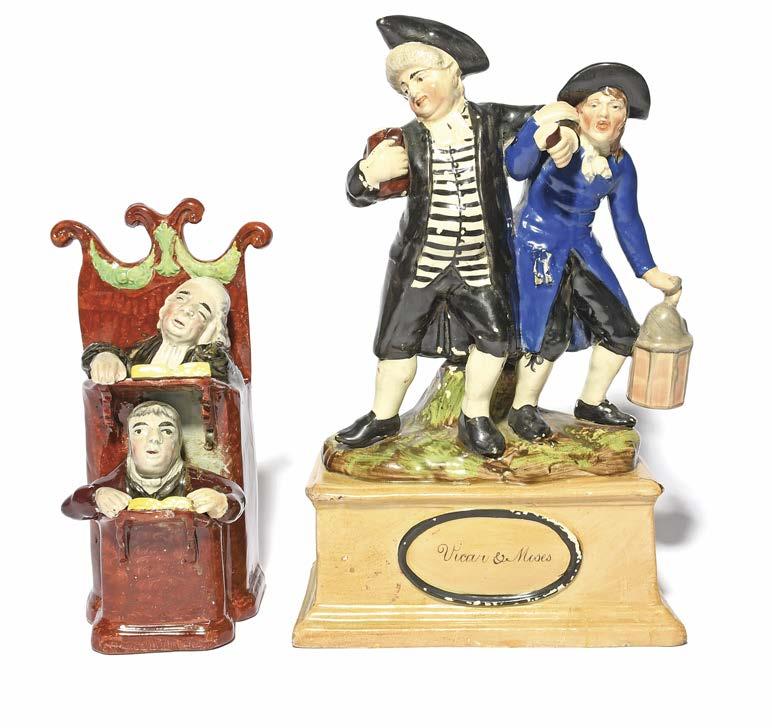

120 A Hearty Good Fellow Toby jug, 1st half 19th century, wearing a tartan waistcoat and holding a foaming jug of ale, a Staffordshire figure of a trumpeter seated in a floral bower, a flatback figure of a couple with a dog, and a small spill vase figure group, some damages, 27.5cm max. (4)
£100200

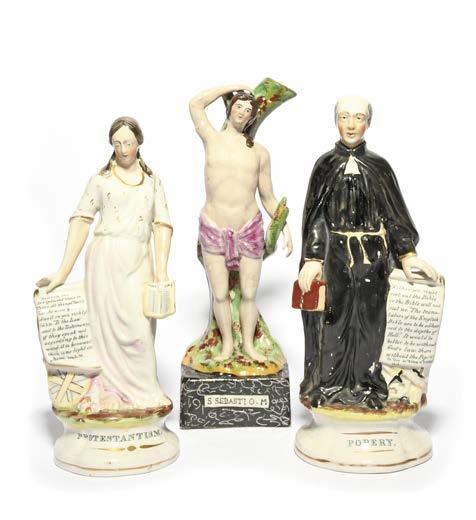
121 A Staffordshire pearlware figure of St Sebastian, 1st half 19th century, wearing a purple loin cloth and standing before a tree stump, raised on a square titled base, and two Victorian Staffordshire figures of Popery and Protestantism, of Parr type, each standing beside a scroll, some restoration, 24.8cm max. (3)
£150250
The pair of figures formerly in the collection of Lt. Colonel A C W Kimpton, then the John Birch Collection.

122 A Staffordshire figure of a British army veteran, c.181020, wearing the red coat of his uniform, his left leg replaced with a wooden peg, and a figure of a seated boy reading from a book held in his right hand, restoration to the veteran’s hat, 16cm max. (2)
£100200
Disabled veterans from the Napoleonic Wars were a common sight in England during the first decades of the 19th century. Many were forced to resort to begging; others, such as Billy Waters, forged a living through busking.
123 A Staffordshire pearlware figure of a girl, c.1810, seated on a marbled rectangular base and wearing a patterned Classical dress, reading from a large book resting in her lap and holding a cup in her left hand, restored through the neck, 17cm high.
£80120

125 Two Staffordshire figure groups, 1st half 19th century, one of the Songsters, standing atop a rocky base, she playing a mandolin and he a horn, the other titled Pastime and modelled with a piper seated beneath a tree, his companion seated beside a small dog, raised on square bases, some restoration, 22cm max. (2) £150250

124 A near pair of pearlware figural candlesticks, early 19th century, modelled as winged putti standing with a bow and a flaming quiver, their heads surmounted with flared sconces, and a Staffordshire candlestick figure of a putto seated on a tree stump and holding a letter, some restoration, 23cm max. (3) £150250

126 A matched pair of Staffordshire figure groups of Tenderness, 1st half 19th century, each modelled as a pastoral couple stringing a sheep with flower garlands, all before flowering bocage, raised on square bases, one titled to the front, some restoration to the bocage, 17.7cm max. (2) £150250
The smaller group with a paper label for Oliver Sutton Antiques.
127 Six Staffordshire figures, c.1820, all engaged in rural pursuits, two figures of gardeners, one of a shepherd holding a lamb, another of a young girl with a lamb, one of a washerwoman with a basket of laundry on her head, the last of a female hunter holding a bird aloft, all before flowering bocage, some repairs, 18cm max. (6) £200300
128 Six Staffordshire figures of rural workers, 1st half 19th century, one holding a pick and shovel and titled ‘The Poor Laborer’ [sic], another with an axe and titled ‘Wood Man’, two figures of gardeners, one titled ‘Earth’, a titled figure of a boy with a bird’s nest, and a figure of a boy and his dog before flowering bocage, some losses and restorations, 17cm max. (6) £150250

129 Three Staffordshire pearlware figure groups of haymakers, 1st half 19th century, including a couple seated on a tall rocky base beneath a tree, she holding a wide rake, and a pair of figures titled ‘Mowers’ and ‘Mate’, he with a scythe and his companion holding a small barrel of cider, some restoration, 25.5cm max. (3) £150250
130 Three large Staffordshire pearlware figures, c.181020, one of the Italian Farmer, wearing a turquoise jacket and holding a duck or goose, one of a lady dancing with a tambourine held aloft, the last of the Widow, resting one hand on a small barrel, all raised on square bases, a small amount of restoration, 26cm max. (3) £150250
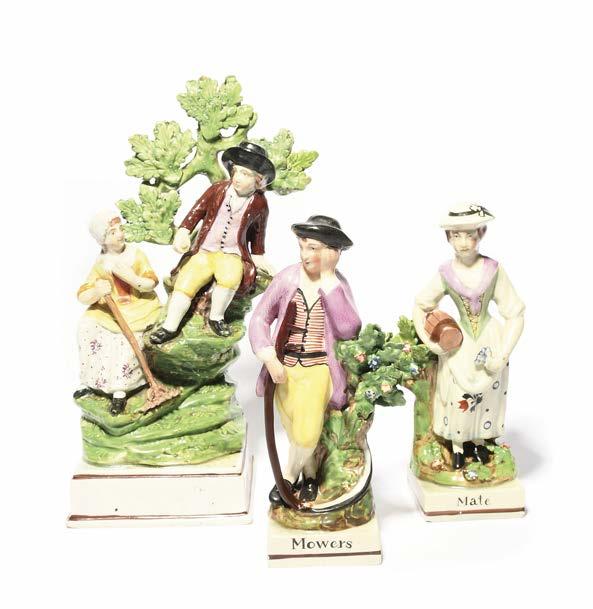



131 A pair of Derby porcelain figures of a shepherd and shepherdess, c.176570, modelled with a sheep and a dog, and three pearlware figures of shepherds, all before flowering bocage, some restoration, 14.3cm max. (5) £100200
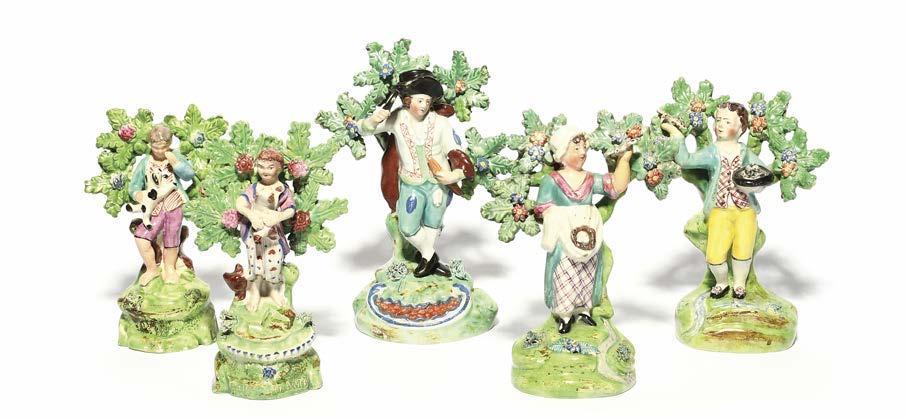
132 Two pairs of Staffordshire figures of children, 1st half 19th century, one pair Walton and modelled holding a bird and a nest, another pair Salt and modelled playing with a dog and a lamb, and a Walton figure of a boy holding a magnifying glass, all standing before flowering bocage, applied mark to the reverse, some restoration, 17.5cm max. (5) £200300
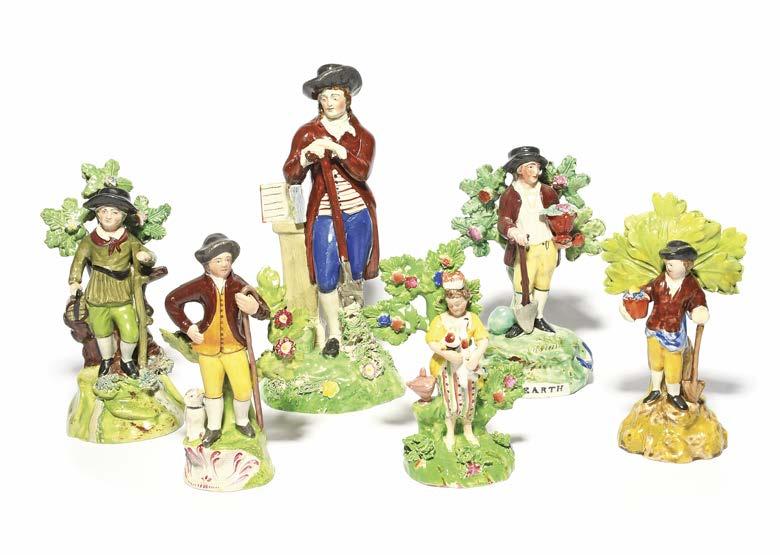
133 Six Staffordshire figures, c.182030, three of gardeners holding spades or flower pots, one of a haymaker holding a small barrel, another of a shepherd with a dog and staff, the last of a young girl with a lamb before flowering bocage, some restoration, 22cm max. (6) £150250
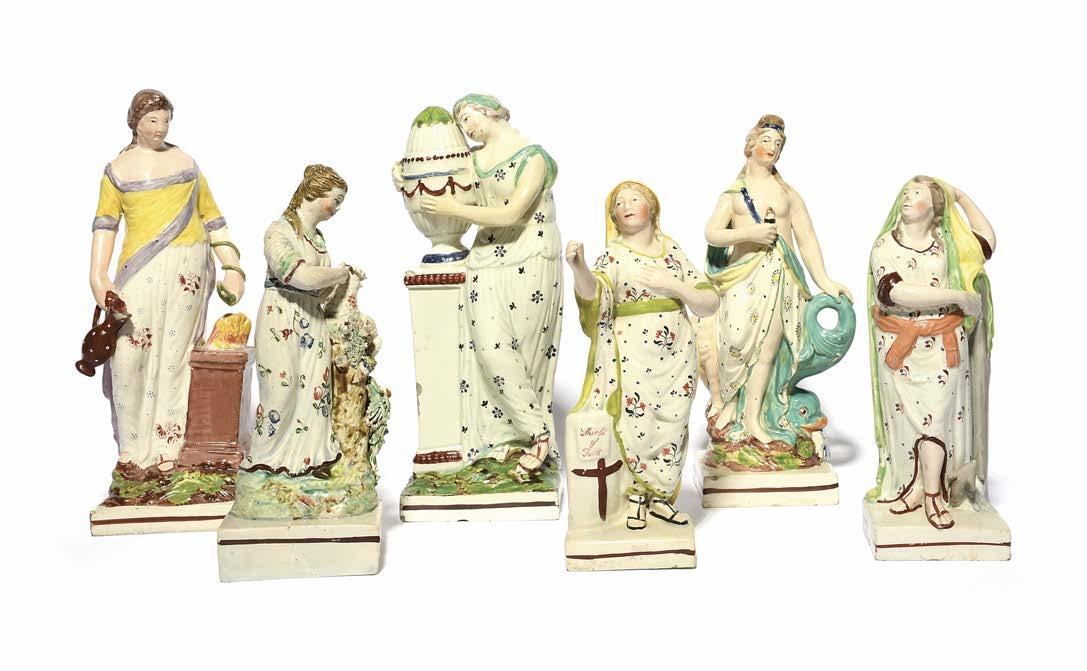
134 Six Staffordshire pearlware figures of Classical maidens, early 19th century, including a near pair of Faith and Hope, a figure of Venus with Cupid and a dolphin, a figure of Andromache weeping over the ashes of Hector, one of Hygeia holding a serpent over the fire, the last of a shepherdess, some small restorations, 23.5cm max. (6) £250350
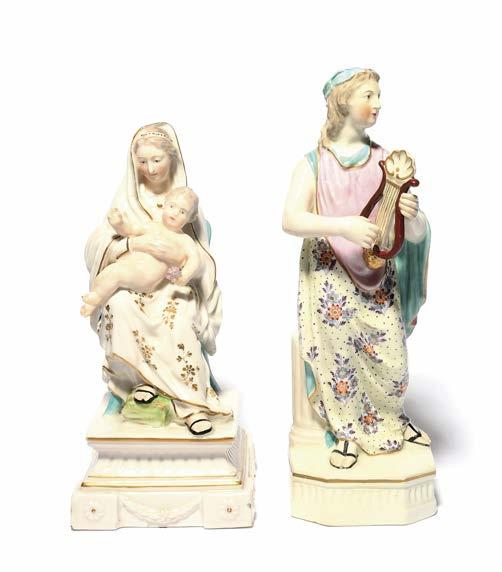
135 Two Derby porcelain figures, c.178090, one of the Madonna and Child, seated and raised on a Classical base, incised N138, the other of Apollo, wearing a loose flowered robe and playing a lyre, incised N243, minor faults, 25cm max. (2) £100200

136 Two Derby porcelain Classical figures, c.17901800, one of Ariadne, holding the edge of her yellow cloak above her head, the other of Juno standing beside a displaying peacock, with a pearlware version of the same figure of Juno, all raised on square bases, some restoration, 25.5cm max. (3) £150250

137 A Derby porcelain figure of Sacrifice, c.1790, modelled as Jason sacrificing a goat kid on a fluted column, a bowl collecting the blood below, with a Staffordshire pearlware figure of the same subject, raised on a square base, minor restorations to the pearlware figure, 20.5cm max. (2) £150250

139 A Staffordshire pearlware figure of John Bull, c.1820, seated with a jug of ale in his right hand and a large plate of meat on his lap, and a Scottish pearlware figure of Tam O’Shanter, seated in a green armchair and raising a glass in his right hand, a small amount of restoration to the latter, 13cm max. (2) £150250 John Bull with a paper label for Andrew Dando Antiques.

138 A Staffordshire pearlware group of rustic lovers, 1st half 19th century, seated on a rocky outcrop, he playing the flageolet, a dog, sheep and goat at their feet, restoration to her left hand and the goat’s horns, 24cm. £150200
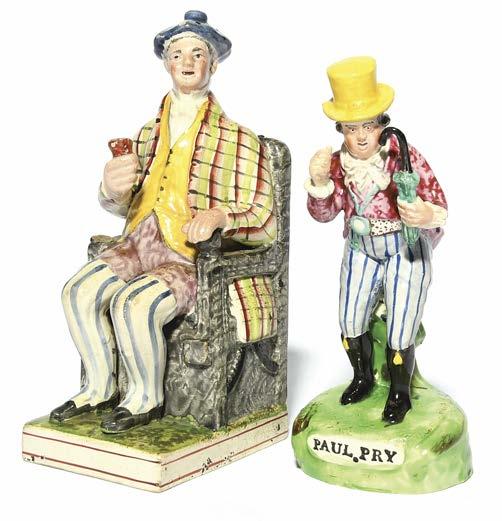
140 An Obadiah Sherratt figure of Tam O'Shanter, c.1830, seated in a highbacked armchair and wearing his characteristic hat over a tartan jacket and striped stockings, together with a theatrical figure of John Liston in his role as Paul Pry, some restoration to the latter, 17.5cm max. (2) £100200
141 Four Staffordshire Classical figures, c.181020, including Venus, Neptune, Justice and another holding a sword hilt, possibly Britannia, together with a ‘Lost Piece Found’ figure of a girl holding a coin, some damages and losses, 23.5cm max. (5) £200300

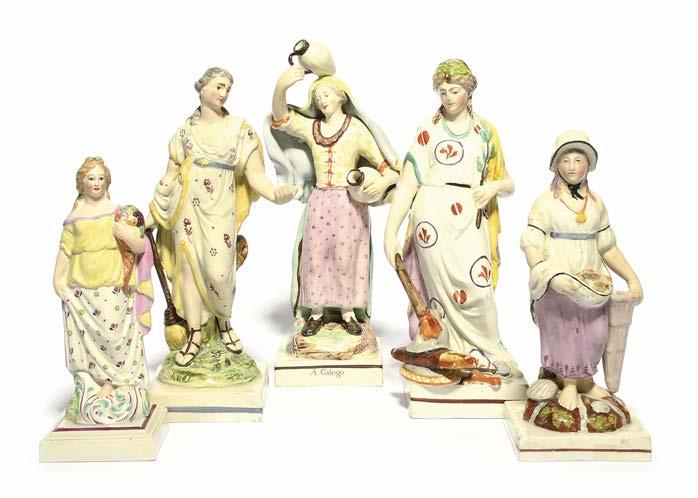
142 Five Staffordshire pearlware figures of women, c.180020, one of a water carrier titled ‘A. Galego’, a small figure of Ceres holding a cornucopia, one of ‘The Lost Piece’ depicting a Classical maiden holding a coin, one of a fisherwoman beside a lobster pot, the last a Classical maiden with a laurel branch, holding a flaming torch over other warlike attributes, all raised on square bases, some restoration, 22cm max. (5) £200300
143 Five Staffordshire figures of Classical maidens, 1st half 19th century, one of Charity with three infants, another of Ceres holding a cornucopia, one of Andromache weeping over the ashes of Hector, one of Hygiea with a serpent around her wrist, the last of a woman holding a baby, possibly the Virgin Mary, all raised on square bases, minor faults, 26cm max. (6) £250350

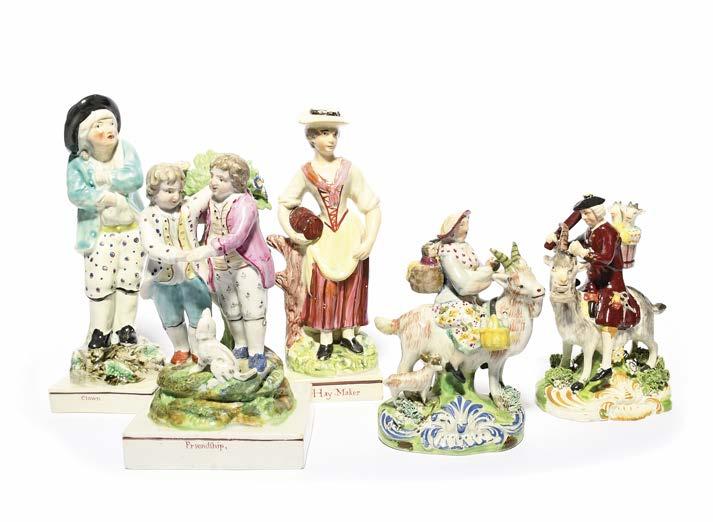
144 Five Staffordshire figure groups, 1st half 19th century, including a matched pair of figures of the Tailor and his Wife, a group of two boys and a dog titled Friendship, a figure of a female haymaker carrying a small barrel, and a figure of a boy tucking his hands inside his shirt, titled Clown, some restorations, 20cm max. (5) £150250
145 Six Staffordshire figures of musicians, c.180020, two of hurdygurdy players, two of a lady playing the mandolin (one titled ‘Flemish Music’), a figure holding a set of bagpipes, another playing a hunting horn, all raised on square bases, some restorations, 23.3cm max. (6) £250350

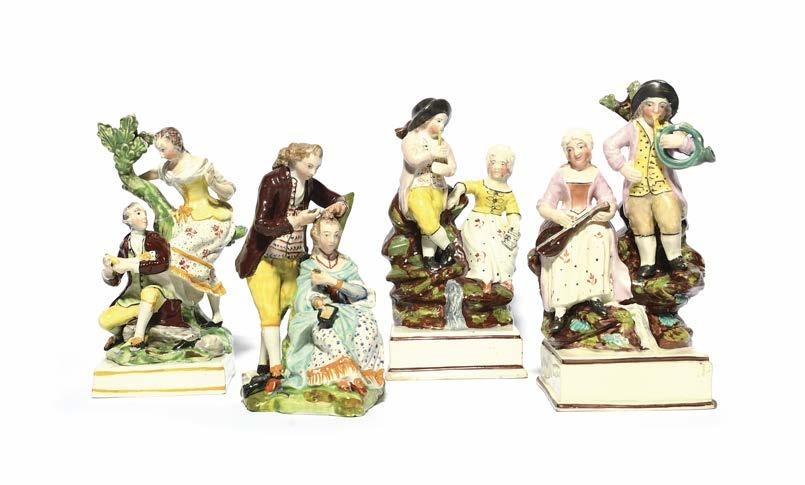
146 A pair of Staffordshire figure groups of musicians, c.1810, on rocky outcrops, one playing the flageolet while his companion sings, the other a horn while his companion plays the mandolin, a figure group of a hairdresser attending on a seated lady, another of a shoemaker fitting a shoe to a lady leaning on a tree, 17.5cm max. (4) £250350
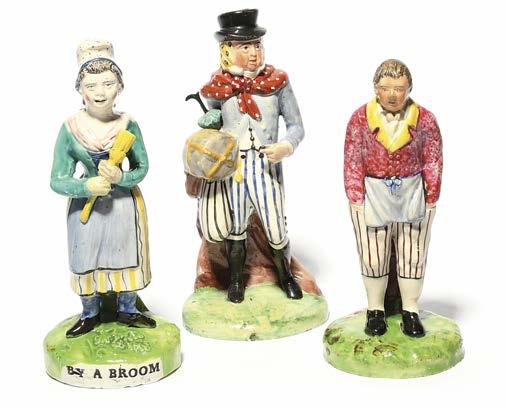

147 Three Staffordshire theatrical figures, c.182030, two of the actor John Liston, one in his role as Lubin Log, the other as Sam Swipes, and a figure of Madame Vestris as the Broom Girl, holding a short yellow brush, titled ‘By a Broom’ to the front of the base, some restoration to the Liston figures, 17cm max. (3)
£150250
148 A pair of Staffordshire figures of the Sailor and his Lass, c.181020, he holding a Union flag and wearing his seafaring attire, his wife holding a similarly dressed child by the arm, and a figure group of the Sailor’s Return, the jolly tar embracing his companion, raised on a chamfered and titled rectangular base, some restoration, 23.5cm max. (3)
£100200
149 Seven Staffordshire figures, c.180020, of people at rural pursuits, a matched pair of a hunter and his companion, a gardener holding a potted plant and a spade, a female archer figure, a young girl holding a cat, and a small boy holding a goose, the last of a man holding a magnifying glass aloft, some restorations, 18.3cm max. (7)

£150250
150 A Staffordshire Tithe Pig group, c.181020, a couple standing beneath a tree and offering their tithe to the parson, a figure of a bugler and another of a piper, both before flowering bocage, and a Walton figure of a putto with baskets of flowers, some restoration, 16.5cm max. (4)
£150250
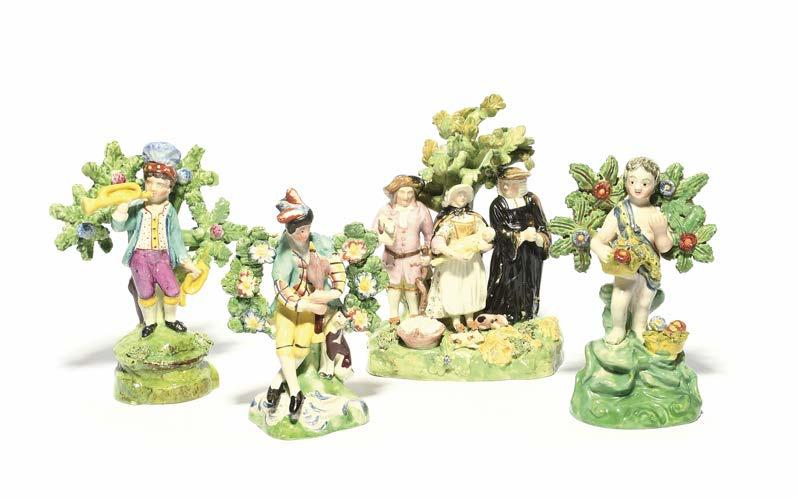
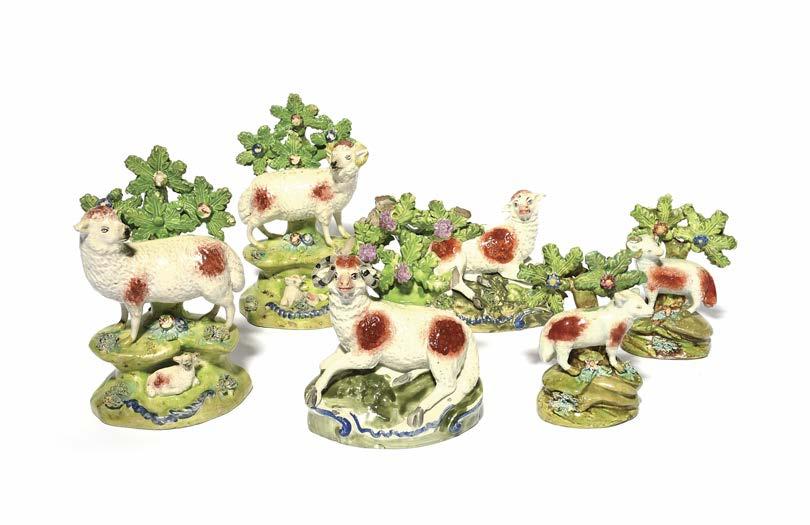
151 Three Staffordshire pearlware pairs of sheep, 1st half 19th century, one pair Walton and modelled with a ram and ewe on rocky outcrops above recumbent lambs, the smallest pair also Walton and modelled beneath flowering bocage, the last pair Salt and modelled recumbent on scrolled bases, applied marks, some damages, 16cm max. (6) £250350
152 Four Derby porcelain figures of sheep, c.176080, one of a ram standing with a recumbent kid at his feet, another of a ewe standing on a base applied with flowers, two of sheep recumbent before flowering bocage, some restoration, 13cm max. (4) £200300


153 A pair of Salt (Staffordshire) pearlware figures of cows, 1st half 19th century, each standing on a rocky outcrop with a recumbent calf at their feet, before flowering bocage with purple blooms, and a figure of a recumbent doe, her head turned to the left, some restoration, 14cm max. (3) £150250

154 A pair of Staffordshire flatback figures of foxes, 19th century, modelled with ears erect and one forepaw lifted to rest on a low stump, 17cm. (2) £80120
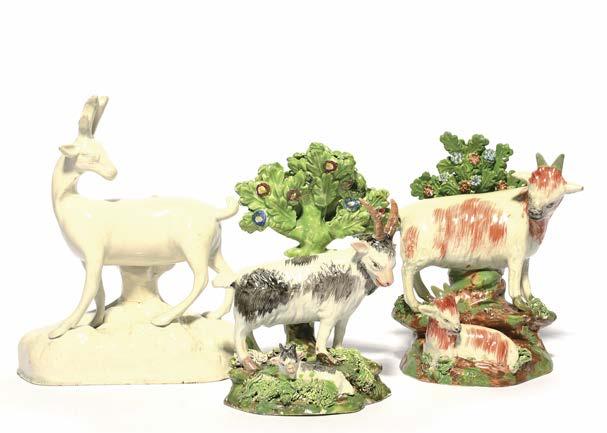
155 Two Staffordshire pearlware figures of goats, 1st half 19th century, modelled standing before flowering bocage with a recumbent kid at their feet, and a pearlware figure of a stag, left in the white, standing four square with his head turned to look over one shoulder, some restoration, 16.5cm max. (3) £100200

156 A Staffordshire spill vase, 1st half 19th century, modelled as a hollow tree trunk with three openings, a pair of brightly coloured birds perched above a nest with two sheep and two recumbent lambs at the base, 15.5cm high. £150200
Paper label for D M & P Manheim.

157 A rare Staffordshire figure of a messenger boy, c.1820, wearing a yellow cap and jacket and blowing a horn, standing before flowering bocage, some restoration to the instrument, 20cm. £100200

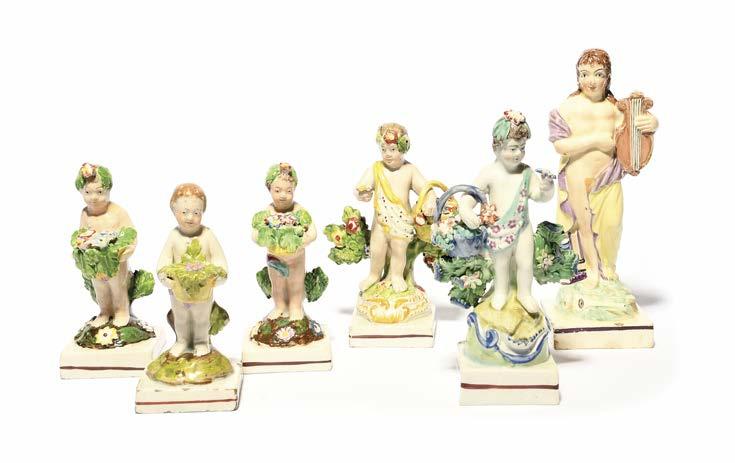

158 A pair of Staffordshire figures of Elijah and the Widow, late 19th century, seated beneath flowering bocage, and a Staffordshire figure of Jesus talking to a Samaritan woman at a well, 14.2cm max. (3)
£80120
159 Five small Staffordshire figures of putti, early 19th century, variously modelled with baskets of flowers, raised on square bases, and a small figure of Apollo holding a lyre and standing before a pile of books, one putto restored, 14.5cm max. (6) £100200
160 Two pairs of Staffordshire figures, c.181030, a pair depicting Jobson and Nell, the old cobbler and his companion seated and brightly enamelled, and a pair of figures of Old Age, all raised on titled square bases, 22.3cm max. (4) £150250
161 A pair of Staffordshire pearlware figures of gardeners, 1st half 19th century, each standing beneath tall flowering bocage, she with a large flowerpot, both raised on unusual footed bases, and a figure group of a couple flanking a tree and a fountain, she with a watering can, some restoration, 20.7cm max. (3) £150250

162 Five small Staffordshire pearlware figures, 1st half 19th century, including a pair of pastoral musicians, playing the lyre and flageolet, a pair of Hope and Faith standing beneath flowering bocage, the last of a boy with legs crossed and holding a book, small restorations, 15.5cm max. (5)
£100200
163 Three near pairs of Staffordshire figures, c.180020, one of the Lost Sheep Found and the Lost Piece Found, a pair of a gardener and his mate, the last pair small and of Spring and Summer, all raised on square titled bases, small damages and repairs, 23cm max. (6)
£200300

164 A Staffordshire pearlware figure group of the Lost Sheep, c.1810, the unfortunate animal strung over the shepherd’s shoulders, a figure of a flower girl with her apron full of blooms and a Staffordshire figure group of The Dandies, promenading in Regency dress, raised on a square base, some restoration, 20.3cm max. (3)
£150250
£100200
165 A Pratt ware figure group of the Babes in the Wood, 1st half 19th century, with two young children nestled among leaves, and a Pratt model of a baby in a cradle, 12.5cm across. (2)
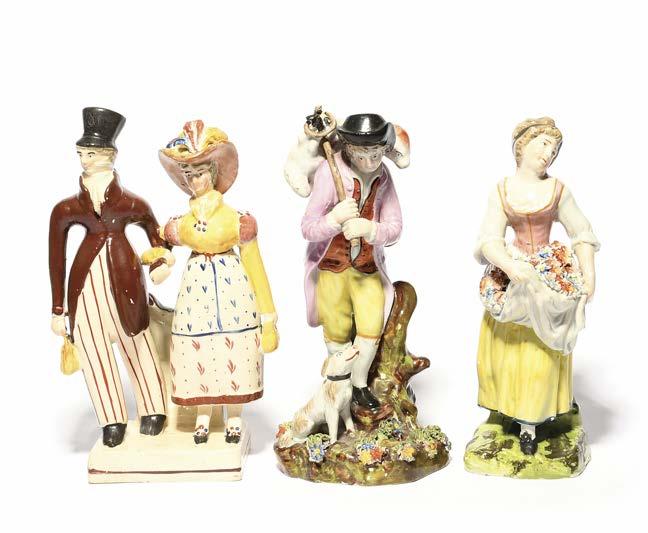

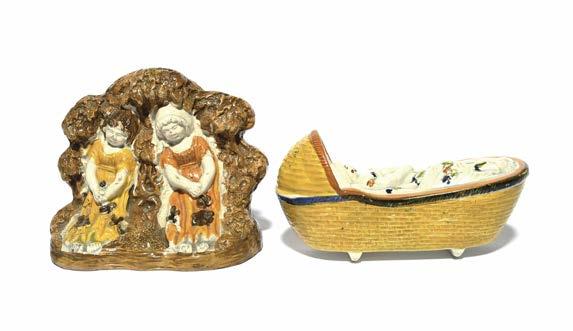



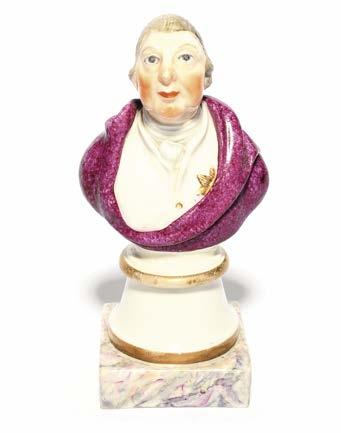
166 A Pratt ware moulded plaque, c.1800, moulded with a figure possibly emblematic of Summer, holding flowers in her right hand and resting her head on her left, within a stiff leaf band and moulded frame, typically enamelled, a little good restoration, 20cm. £150250
167 An English porcelain bust of George III, early 19th century, wearing a puce robe over a white jacket with gold star, raised on a socle over a marbled square base, incised ‘George III’ to the reverse, 14cm. £150250
168 Two pearlware cottage money boxes, 19th century, each modelled as a small house with children peeping from the upper windows, flanked by two figures, the back of each roof pierced with a coin slot, 12.5cm. (2) £100150
169 A Pratt ware quintal vase, c.1790, the five branches moulded with overlapping leaves, highlighted in ochre, blue, yellow and green, some chipping, 22.5cm. £100150
170 A Staffordshire enamel linen ground snuff box, c.177080, the rectangular cover decorated with a raised figure of eight motif and a band of flowers on a pink gingham ground, the sides with similar floral and linen ground design, 6.6cm across. £150250
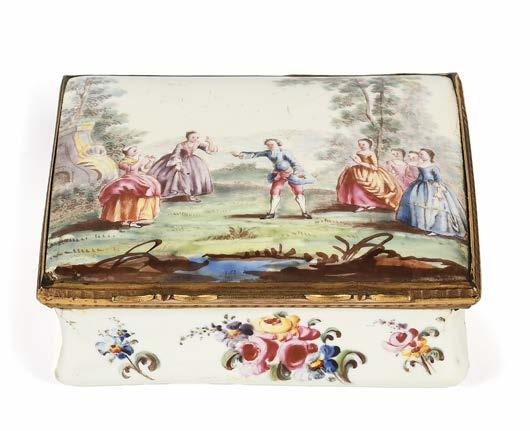
171
172 A Vienna snuff box, 19th century, the cover painted with a reclining maiden and Cupid holding a mask, the interior with a Classical couple in woodland, the base and sides decorated with formal gilt designs on coloured grounds, with gilt metal mounts, 8.7cm across. £150200
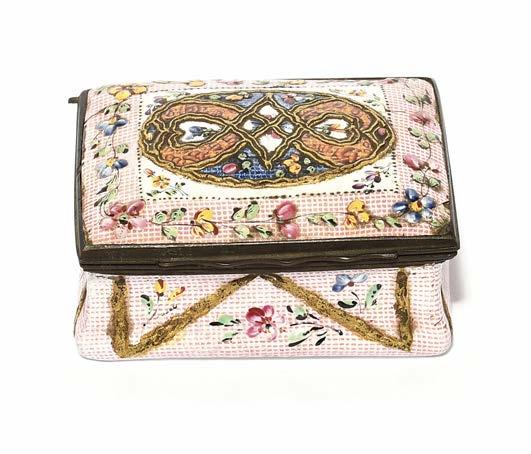
171 An English enamel snuff box, c.1780, the lid decorated with figures playing a game in a woodland setting, the waisted sides with sprays of flowers, the underside with a dragonfly, with gilt metal mounts, 8cm. £100200
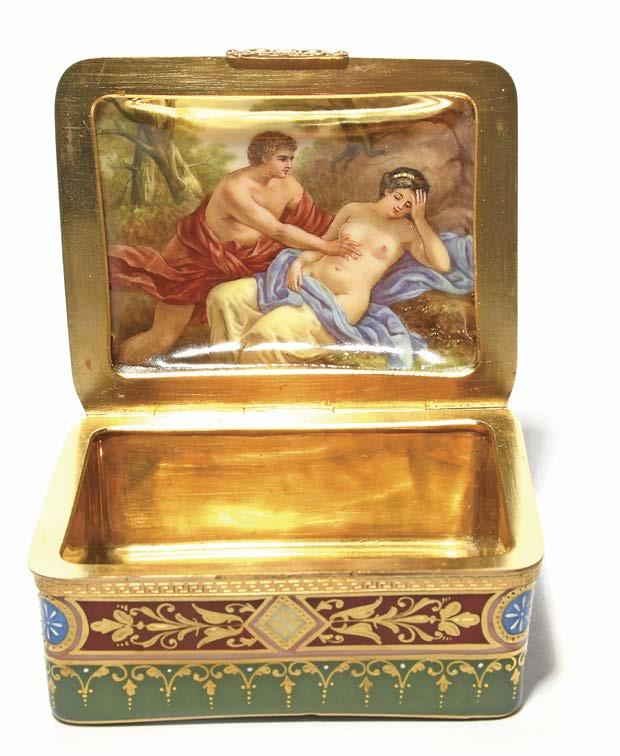

173 A German porcelain etui, c.176070, possibly Meissen, the shaped form painted with winged putti balanced on or suspended from flower garlands, the base with a mask and motifs, with gilt metal mounts and full contents, 11.5cm.
Ivory Act Registration No: Q8DPQ7U
£300500

174 A Meissen goldmounted scissor case, c.175060, painted with scenes of putti resting on clouds and playing with flower garlands, the gold mounts chased with a leaf scroll design, 12.1cm.

175 A Samson Chantillystyle snuff box or bonbonniere, late 19th century, modelled as a woman sitting on a chamberpot and lifting her skirt behind, and a Continental porcelain bonbonniere of a woman’s head wearing a black eye
£500800

176 A St Cloud dessert knife and fork, c.172040, the handles of pistol grip form and painted in underglaze blue with a formal design of leaf scrolls and diaper bands, 20.8cm max. (2) £100200

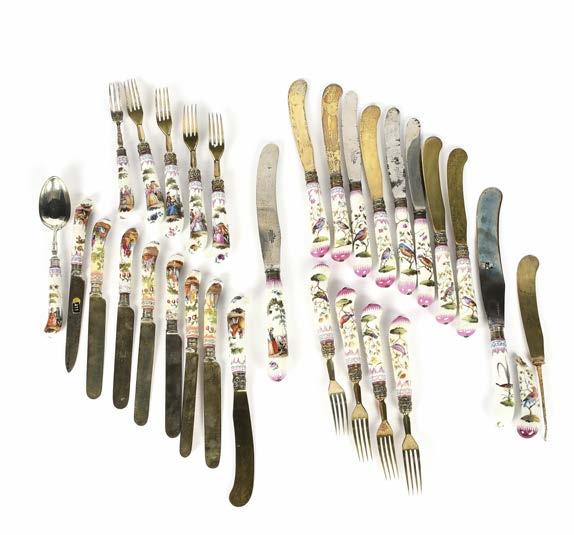
177 A collection of porcelain handled cutlery, 18th century and later, including a St Cloud knife with a blue lambrequin design, a pair of silver knives with turquoise handles, a pair of gilded spoons with floral handles, a silver cake knife and fork with faceted white handles, an elaborate fruit knife with moulded stem, an Imari knife and fork, two Meissen forks with red dragons, a number of other knives and forks, and three loose porcelain handles. (34)
£200300
178 Seven silvergilt fruit knives and forks with Continental porcelain handles, c.1863, the handles painted with colourful flowers and insects, with a collection of similar cutlery with silver and steel blades, the silvergilt with London hallmarks for 1863, some damages, 28.2cm max. (30)
£150250

179 A Meissen butter curler, mid 18th century, the shaped bowl with a serrated surface and edges, painted with sprays of Deutsche blumen, and a French porcelain spoon formed of overlapping leaves, 15.4cm max. (2)
£100200
180 Two Sèvres egg cups (coquetiers) from Royal services, c.184666, one from the service for LouisPhilippe at Fontainebleu, painted with roundels and birds within a berried swag border, the other from the service à chiffre dore de l’Empereur Napoleon III, decorated with a crowned gilt N on a white ground, printed marks, 6.5cm. (2)
£250350

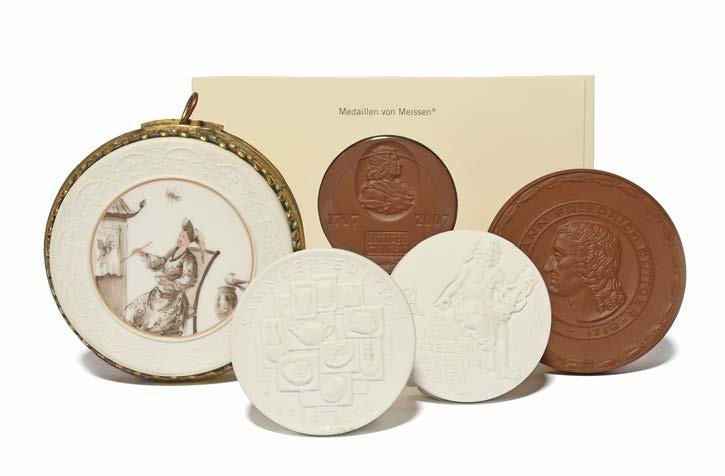


181 Five commemorative Meissen plaques, modern, one Böttger Steinzeug and moulded with a portrait of Johann Böttger, another celebrating 300 years of Böttger’s stoneware in 2007, one biscuit with a giltmetal mount and painted with a portrait of an artist, commemorating Johann Horoldt, two more commemorating 10 years of the Friends of Meissen in 2008, another the factory’s 300 year anniversary in 2010, 8.3cm max. (5) £150250
182 Three German porcelain oval plaques, 20th century, one painted with the portrait of a girl after Friedrich August von Kaulbach, one with a portrait of the young Virgin Mary, another of the Madonna and Child, all within pierced Bavarian wooden frames, 16.5cm overall. (3) £200300
183 A French enamel portrait plaque, 2nd half 18th century, painted with a young woman, possibly emblematic of Summer, wearing a floral diadem and holding further flowers against her slipping white dress, mounted in a gilt metal frame, a short restored crack, 8cm overall. £150200
184 Two English porcelain rouge pots, c.181020, one decorated with vertical stripes in orange, white and gilt, the other with gilt foliate sprigs, a chip to the first, 4.2cm high. (2) £100200

185 A pair of Chantilly custard cups and covers (pots à jus), c.1750, the squat spiral moulded forms painted with stylised flower sprigs, blue hunting horn marks, 7.5cm. (4)
£200300
One with a paper label for the O. Lenhart Collection.
186 A Royal Copenhagen Flora Danica custard cup and cover, 19th century, painted with a spray of Trefoil (Trifolium), titled to the base, and a Paris porcelain custard cup and cover painted with colourful feathers on a pointillé ground, a crack to the Paris cover, a few small chips to the Copenhagen cover, 7.3cm high. (4)
£150250

187 A St Cloud whiteglazed coffee cup and trembleuse saucer, c.173040, moulded in the artichoke manner with bands of overlapping petals, the cup with a finely moulded angular handle, 12.5cm. (2)
£8001,200
188 An early St Cloud teabowl and saucer, c.172530, moulded with a band of reeding and painted with a formal design of flowers and leaf scroll motifs, 13.1cm. (2)
£150250


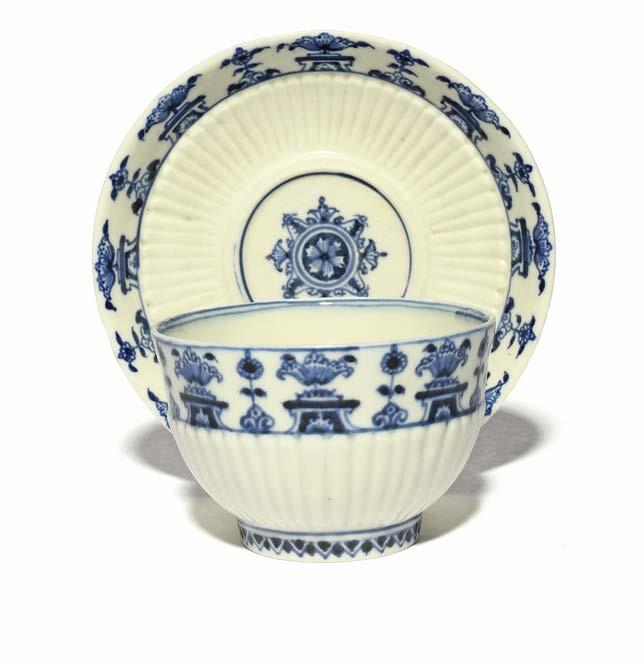


189 A St Cloud sucrier and cover, c.172530, moulded with bands of reeding and painted with a formal lambrequin design of flowers and leaf scroll motifs, the cover with a flared finial, 10.7cm high. (2)
£200300

190 A pair of large St Cloud cups and trembleuse saucers, c.1730, moulded with bands of reeding and painted with a formal design of flowers and leaf scroll motifs, 14cm. (4)
£300500
191 A Chantilly saucer, c.173035, painted in Kakiemon enamels with flowering plants and a winged beetle, brown line rim, red hunting horn mark, 12.2cm.
£150250
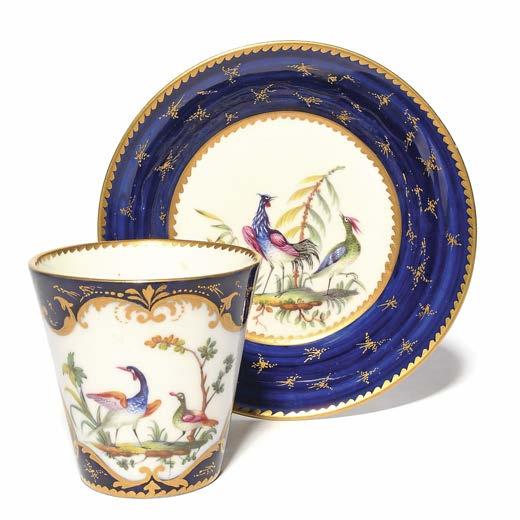
192 A Vincennes flared cup and saucer (gobelet à la Reine et soucoupe), c.175253, with later decoration of exotic birds next to low branches and flowering plants, reserved on an original bleu lapis ground with later gilt foliate detailing, blue interlaced Ls mark, 15.2cm. (2) £150250

193 A Sèvres saucer dish, date code for 1771, the sloping sides painted by François Aloncle with colourful birds between leafy plants, two smaller birds in flight, on a white ground with a gilt dentil rim, blue interlaced Ls mark enclosing date letter S and painter’s mark, 18.5cm. £200300

194 A rare Sèvres hard paste chamber pot (bourdaloue), date code for 1785, painted with sprays of polychrome flowers on a white ground between narrow blue bands intersected with gilt dots, crowned blue interlaced Ls mark , date letters HH and painter’s mark Y, 20cm across.
£200300

195 A Sèvres cup and saucer (gobelet Hébert et soucoupe), date code for 1767, painted by LouisJean Thévenet with stylised roundels enclosed in berried leaf swags alternating with gilt trellis on a blue ground, above flower garlands issuing from gilt rings, blue interlaced Ls mark enclosing date letter O beside a painter’s mark, 13.7cm. (2) £200300
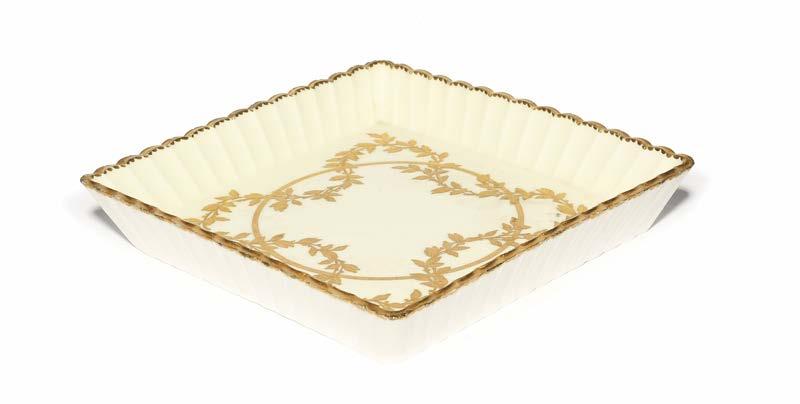
196 A Sèvres square tray (plateau carre cannele), c.1760, the well gilded with a continuous berried leaf garland entwining around a central ring, the fluted rim with a gilt dentil border, blue interlaced Ls mark, 15.3cm. £250350
197 A rare Sèvres biscuit porcelain vase, c.176162, of small size, possibly modelled by JeanClaude Duplessis, of inverted pear shape with leaf scrolled angular handles, raised on a circular foot, 11.5cm high.
£400600
The form and handles of this vase bear several similarities to the vase feuilles de myrte, which was produced in three sizes. The inverted pear shape relates to the vase Hébert, which was in production from 1754. Small biscuit vases of this type were used as table decorations forming part of larger dessert services from the early 1750s.

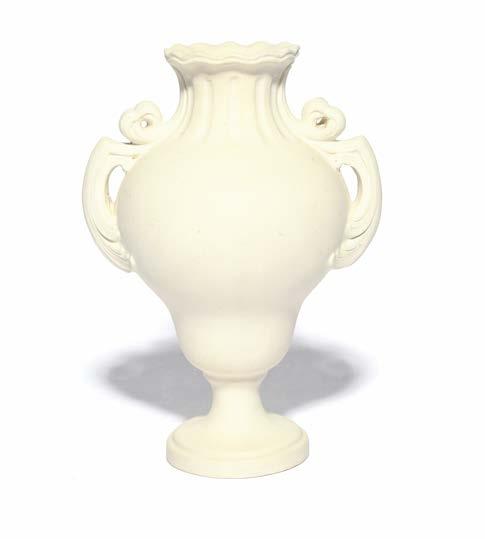
198 An early Sèvres cheese dish stand (plateau de fromager), date code for 17589, the deep form painted with flower sprays, the rim with gilt foliate sprays, blue interlaced Ls mark enclosing date letter f, musical notes painter’s mark, 20cm.
£250350
199 A Sèvres square tray (plateau tiroir), date code for 1783, painted by MarieJeanneBarbe Bunel (née Buteux) with a design of scattered cornflowers within a gilt dentil rim, interlaced blue Ls mark enclosing date letters ff for 1783 above a painter’s mark, a small filled chip to the foot, 14.8cm. £200300
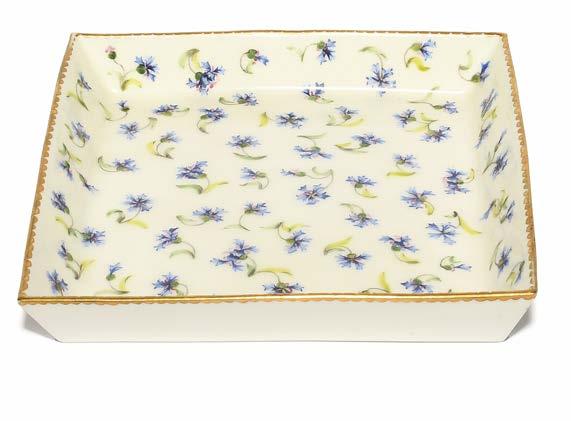
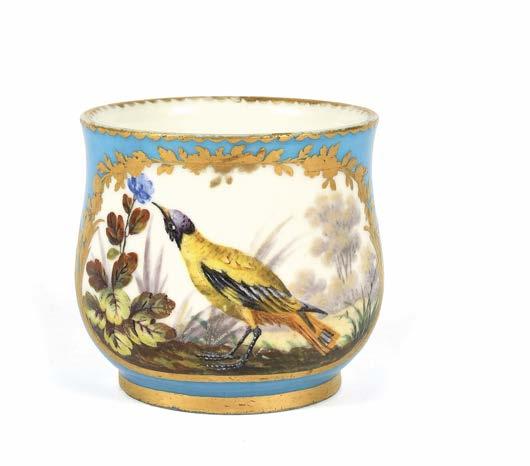
200 A Sèvres custard cup (pot à jus) from the service for the baron de Breteuil, date code for 1768, painted with an Indian oriole lifting its head to a blue flower, reserved in a gilded panel of flowers and grasses on a bleu celeste ground, with a gilt dentil rim, titled in black to the underside ‘L’oriol des Indes’, blue interlaced Ls mark enclosing date letter P, painter’s mark for François Aloncle, the cover lacking, 5.3cm. £500800
The service purchased by Louis-Charles-Auguste Le Tonnelier, baron de Breteuil, included 14 pots à jus. Le Tonnelier was the former French Minister-Plenipotentiary to Cologne (1758-59) and Russia (1760-63) and Ambassador to Sweden (1763-67), later Ambassador to the Netherlands (1768-69), Ambassador-Extraordinary to the Two Sicilies (1772-74) and Ambassador to Austria (1775-83). From 1783, upon his return to France, he came ministre et sécretaire d’Etat de la Maison du Roi, remaining an influential figure in French domestic and foreign politics throughout the second half of the 18th century. A supplement to this service was purchased in 1771. It is believed that a substantial part of this service was formerly in the 19th century collection of Count A D Sheremetev and was brought to London circa 1906 for sale with the dealer, Asher Wertheimer. Cf. David Peters, Sèvres Plates and Services of the 18th Century, Vol. II, 68-1 for a description of the service, several pieces of which are known to have been decorated by Aloncle. The decoration on this and other services is understood to have been based primarily on the engravings by ornithologist, George Edwards.
201 A Sèvres small square tray (plateau tiroir), c.1760, painted with flower sprays in puce monochrome within a gilt dentil border, 10.3cm. £200300
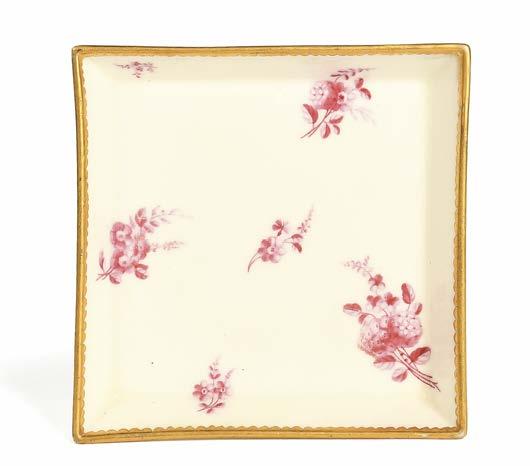
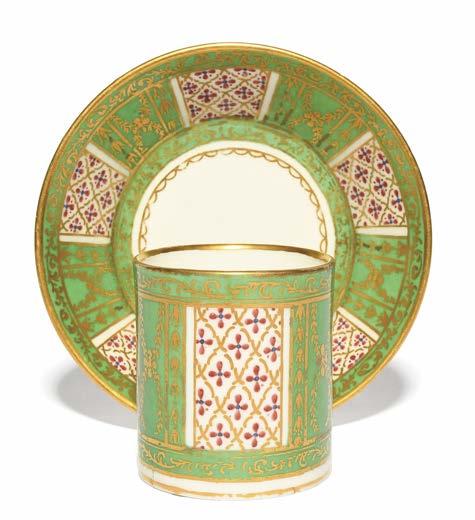

203 A Sèvres cup and saucer (tasse Bouillard et soucoupe), c.1780, decorated with continuous bands of blue harebell flowers against gilt striping, blue interlaced Ls marks, 13.7cm. (2) £150250
£150250
202 A small Sèvres hard paste coffee can and saucer (gobelet litron et soucoupe), date code for 1777, painted by Thévenet with flowerhead trellis panels reserved on an apple green ground with gilt foliate decoration, blue and puce interlaced Ls marks enclosing date letter Z, painter’s marks, 12cm. (2)
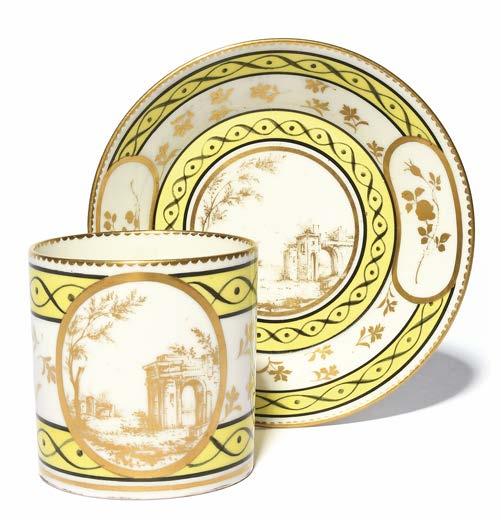
204 A Sèvres coffee can and saucer (gobelet litron et soucoupe), date code for 1778, finely gilded with panels of Classical ruins beneath tall trees, reserved on a ground of gilt scattered flower sprigs and pale yellow borders with black motifs, blue interlaced Ls marks enclosing date letters AA above an unknown painter’s mark of an upturned crescent, 12.7cm. (2)
£200300

205 A Sèvres hard paste coffee can and saucer (gobelet litron et soucoupe), date code for 1778, painted by LouisThomas Bauquerrec with concentric bands of flowers alternating with panels of gilt leaf bands on a café au lait ground, crowned puce interlaced Ls mark over painter’s mark, unusual blue marks of 248 over 1 and a triangle, 12.2cm. (2) £200300
206 A Sèvres triple jam pot on a fixed triangular stand (plateau à trois pots de confiture), date code for 1782, painted with a design of scattered cornflower sprigs on a white ground, gilt dentil rims, blue interlaced Ls mark above painter’s marks V: and RD, 20cm across. (4)
£300500
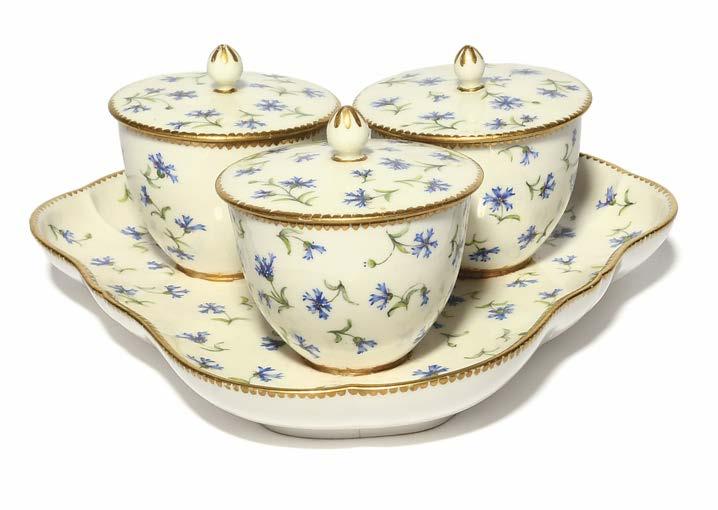
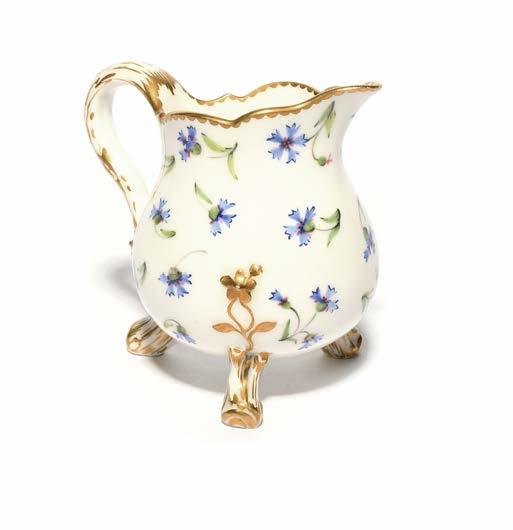
207 A small Sèvres milk jug (pot à lait à trois pieds), date code for 1783, painted by Mlle. Félicité Armand la jeune with a design of scattered cornflowers, the handle and three feet formed as stalks, blue interlaced Ls marks enclosing date letters ff over a painter’s mark, 8.1cm. £300400
208 A small Sèvres ecuelle rond with cover and stand, c.178283, decorated by Le Bel with a band of cornflowers enclosing a gilt dot ground, blue interlaced Ls marks enclosing date letters ee and ff, painter’s marks LB, 19.6cm. (3)
£300500



210 A Sèvres miniature coffee can and saucer (gobelet litron et soucoupe), c.1780, painted with concentric bands of brown and white fur effect on a lilac ground, blue and gilt interlaced Ls marks, 8.1cm. (2) £150250
£150250
209 A Sèvres miniature coffee can and saucer (gobelet litron et soucoupe), date code for 1783, the can painted by Mlle. Félicité Armand la jeune, the saucer by MarieJeanneBarbe Bunel (née Buteaux) with a design of scattered cornflowers, gilt dentil rim, blue interlaced Ls mark enclosed date letters ff above painter’s marks, 7.8cm. (2)

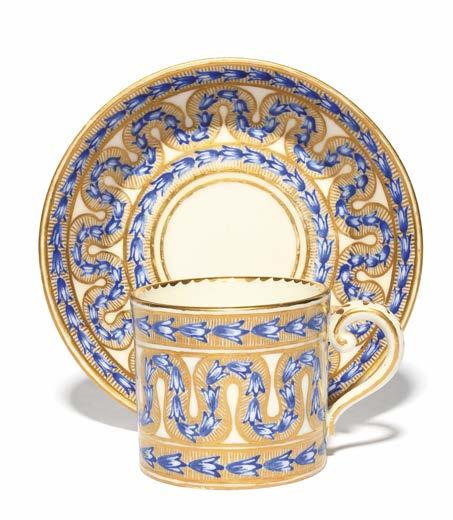
£150250
211 A Sèvres small coffee can and saucer (gobelet litron et soucoupe), c.1770, painted with cornflower sprigs reserved between purple trellis bands with gilt leaf swags, blue interlaced Ls marks above painter’s mark cb, possibly for Chabry fils, 10.3cm. (2)
212 A small Sèvres coffee can and saucer (gobelet litron et soucoupe), date code for 1781, decorated with continuous bands of blue harebell flowers against gilt striping, blue interlaced Ls mark enclosing date code dd, 10.8cm. (2) £150250
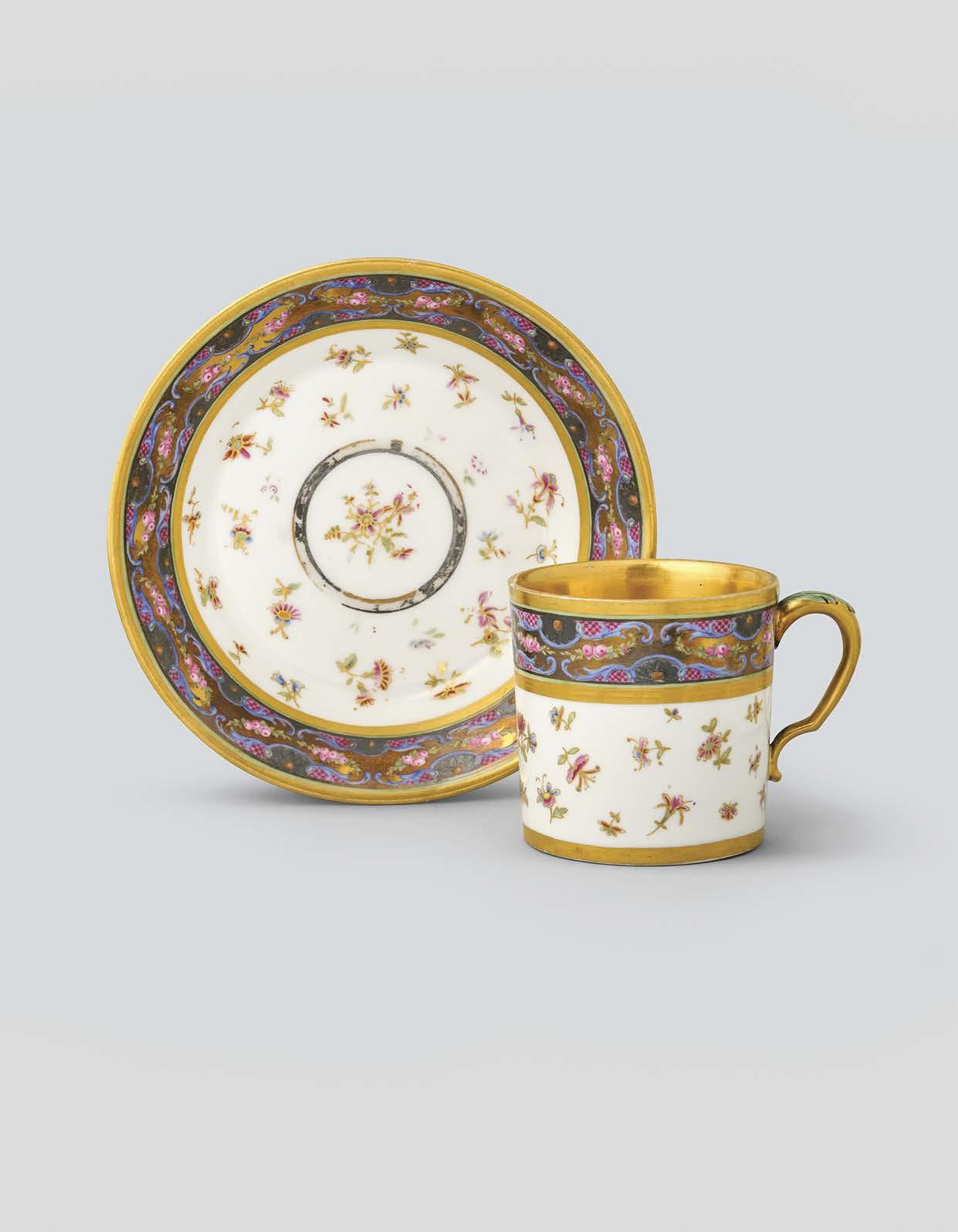
213 A rare Sèvres coffee can and saucer (gobelet litron et soucoupe), of the third size, date code for 1777, decorated with a lavish border of tiny pink rose swags suspended from blue scrollwork enclosing pink gingham panels and black demi flowerheads on a gilt ground, enclosing scattered flower sprigs in polychrome enamels edged in gilt, the cup with a rich gilt interior, gold crowned interlaced Ls mark enclosing date letter Z, unknown painter’s mark A and LG probably for Le Grand, 13cm. (2) £1,5002,000

214 A laterdecorated Sèvres teapot and cover (théière calabré), the porcelain c.176070, finely decorated with jewelled and foil decoration in the Fromery manner, with scrolling floral and leaf bands flanked by berried borders, the cover with a gilt fruit knop, spurious gilt interlaced Ls mark and painter’s mark 2000, metal mount to the base of the handle, 13.3cm across. (2) £250350
Cf. Aileen Dawson, French Porcelain, A Catalogue of the Collection of the British Museum, London, pp.168-169 for a discussion of this type of decoration, previously thought to be 18th century.
215 A Sèvres cup and saucer (gobelet bouillard et soucoupe), c.176570, painted with garlands of flowers suspended from concentric bands entwined with gilt ribbon within a pink pointillé ground border, blue interlaced Ls mark, 13.8cm. (2) £150250


216 A laterdecorated Sèvres plate from a service for Madame du Barry, the porcelain c.177273, decorated with a central DB monogram in gilt and flowers, the rim with panels of putti alternating with baskets of flowers, blue interlaced Ls mark enclosing date letter T, P7 painter’s mark, 24.4cm. £150250
Cf. David Peters, Sèvres Plates and Services of the 18th Century, Vol. II, pp.495-98 for a discussion of the service produced for Maria Caroline, Queen of Naples and Sicily. A service with similar decoration was started for Madame du Barry but never finished. Examples are known with contemporary decoration and gilding, as well as with 19th century gilding and 19th century full decoration. This plate may well fall into the category of having 18th century painting but 19th century gilding.
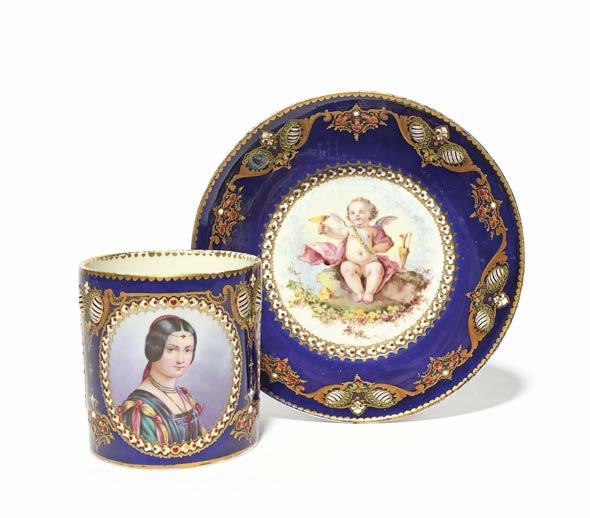
217 A Sèvres style jewelled cabinet cup and saucer, 19th century, the can painted with three portrait panels of courtly ladies reserved within jewelled motifs on a rich blue ground, the saucer with a putto and matching jewelled decoration, pseudo interlaced Ls marks, 14.3cm. (2) £150200
218 A Sèvres hard paste coffee can and saucer (gobelet litron et soucoupe), c.1800, painted with three panels of pink roses linked by flower garlands suspended from lilac ribbons, between bleu mazarin borders, blue FR and Sèvres mark, gilt decorator’s mark 2000 for Vincent jeune, 13.3cm. (2) £200300
219 A Sèvres hard paste coffee can and saucer, c.1800, finely painted with a band of flowers over a blue marbled ground, a Sèvres cup and saucer of unusual shape, painted with blue flower swags and puce tendrils on a pale yellow ground, and a coffee can (gobelet litron) painted with a continuous landscape border in monochrome over a muddy green ground, various marks, 14.8cm max. (5) £200300
220 Three Sèvres coffee cans and saucers, c.1775 and c.1789, the earlier can of large size and painted with rose sprays on an oeil de perdrix ground, another painted with differing flower sprays between bleu nouveau bands with gilt designs, the last with stylised panels of vases and foliate scrolls within turquoise borders and berried leaf bands, varying interlaced Ls marks, date codes and painter’s marks, some damages and repairs, 15.4cm max. (6) £200300


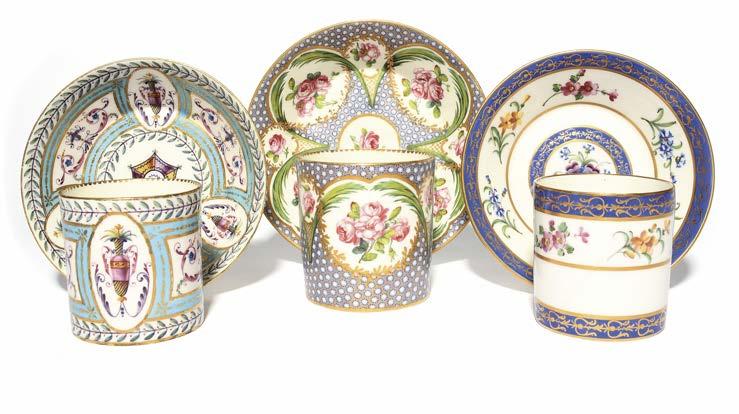

221 A pair of Sèvres dishes (compotiers rond), the porcelain 18th century, later decorated, possibly in London, with colourful birds perched on low branches, the rims with further panels of birds reserved on a blue ground, blue interlaced Ls marks, 20.7cm. (2)
£150250
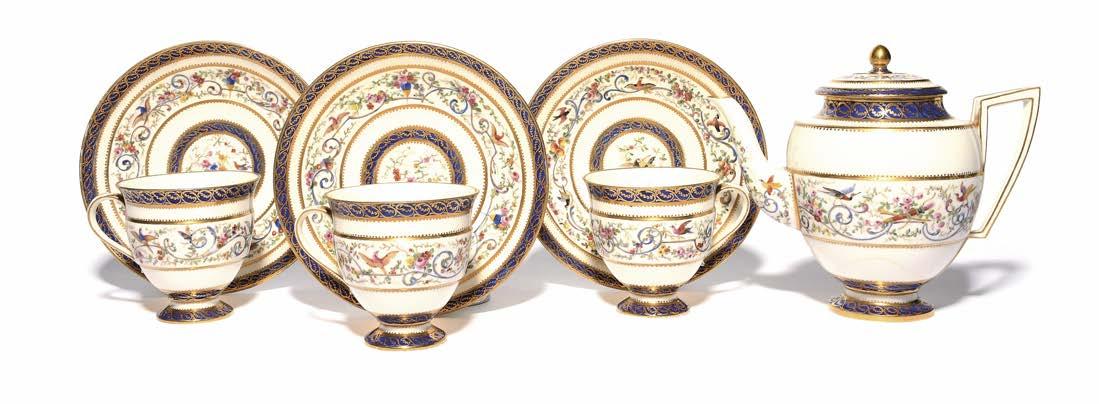
222 A Sèvres part tea service, date codes for 1793, including a teapot and cover and three cups and saucers (tasse l’Etrusque), all painted with birds amidst flowers and formal scrolls on a continuous border, reserved within narrow blue borders with a formal gilt scroll design, blue Sèvres script marks and date codes, the teapot cracked, 18.5cm max. (8)

£600800
223 A pair of Sèvres coffee cans and saucers (gobelets litron et soucoupes), date codes for 1786, and a matching slop bowl, painted with scattered pink roses within bleu nouveau borders with gilt berry swags, blue interlaced Ls marks and painter’s mark of five dots, 16cm max. (5)
£200300
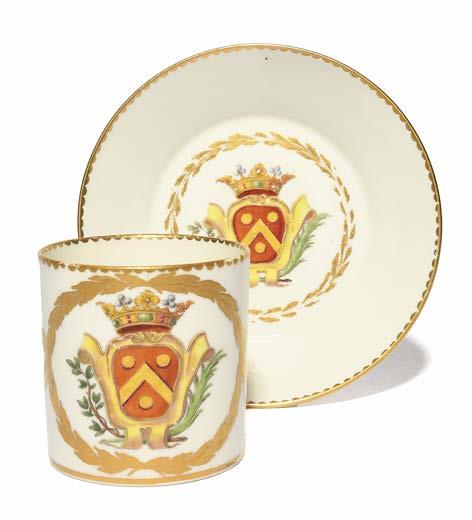

225 A Sèvres coffee can and saucer (gobelet Boizot et soucoupe), third quarter 18th century, painted with a band of small floral panels reserved on a blue border, and a band of berried myrtle, puce interlaced Ls mark enclosing a gilt 9, painter’s numeral 9 in puce for Méreaud jeune, 13cm. (2)
£200300
224 A rare Sèvres armorial coffee can and saucer (gobelet litron et soucoupe), date code for 1781, painted by Charles Buteux with the shield of MarieCharlesLouis de Bonnaire de Gif, beneath a marquis’s coronet, within gilt leaf borders, red crowned interlaced Ls mark and painter’s mark to the saucer, 13.8cm. (2)
Marie-Charles-Louis de Bonnaire became a maitre des Comptes on 19th August 1776 and was still a member of the Chamber des Comptes in 1790.

£250350
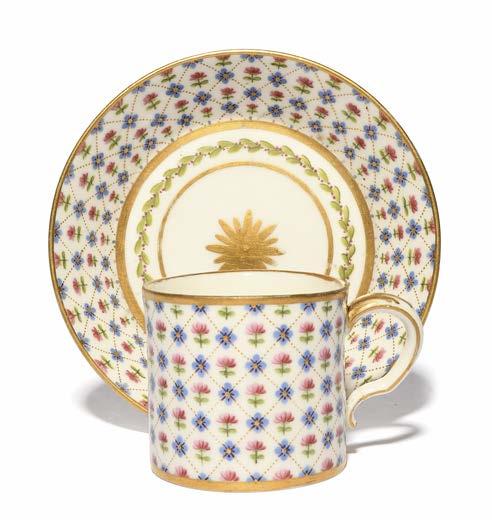
227 A small Sèvres coffee can and saucer (gobelet litron et soucoupe), c.176070, painted with a formal design of pink flower stems enclosed in a trellis of blue flowerheads, the saucer’s well with a continuous berried leaf border, puce interlaced Ls mark and painter’s mark DR, 10.7cm. (2)
£200300
226 A Sèvres hard paste cup and saucer from the Revolutionary period, c.1795, painted with a band of stylised vases and other motifs within colourful foliate scrolls, reserved between blue bands with a black foliate design, the saucer’s well with a rose bush in a landscape, incised marks, 14.2cm.
£150250

228 A large pair of ormolumounted vases with fixed covers, 19th century, in the Sèvres style, painted with scenes of courting couples in pastoral settings, the reverses with panels of flowers, reserved on a turquoise ground, mounted with ormolu rams’ head handles and foliate bases, 51cm. (2) £300500
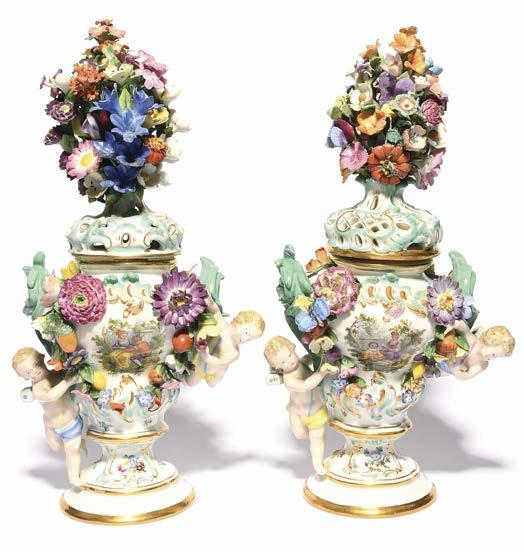
230 A near pair of Meissen pot pourri vases and covers, 1st half 19th century, the baluster forms each applied with two winged putti and a profusion of flowers and fruits, painted with scenes of children, the reverses with flowers, the tall pierced covers surmounted with various blooms, blue crossed swords marks, small losses and restorations, 31cm. (4) £600800

229 An ormolumounted Continental porcelain vase and cover, 19th century, in Sèvres style, painted with a panel of birds, the reverse with flowers, reserved within gilt cartouches on a turquoise ground, the neck reduced and cover restored, 26cm. (2)
£150250

231 A pair of small Meissen pot pourri vases and covers, 19th/20th century, the baluster forms painted with courting couples, the reverses with flowers, applied with flowers and fruits and each with two putti holding further flowers, the pierced covers with tall floral finials, blue crossed swords marks, some faults, 26cm. (4) £150250

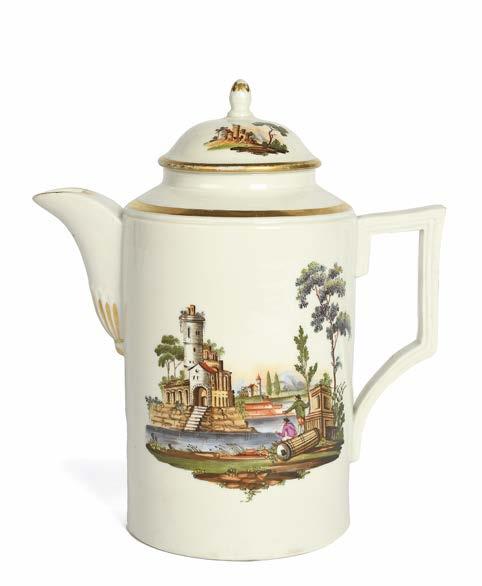
232 A Meissen chocolate pot and cover, c.1760, the baluster form painted with a boy holding branches in a rural landscape, the reverse with a young girl, within a floral and trellis border, with a rococo scroll handle, blue crossed swords mark, 15cm high. (2)
£150250

233 A large Limbach coffee pot and cover, late 18th century, painted with figures seated on Classical ruins by a river with buildings visible on the other side, the reverse with a further Italianate landscape, gilt leaf mark, 23cm. (2)
£150200
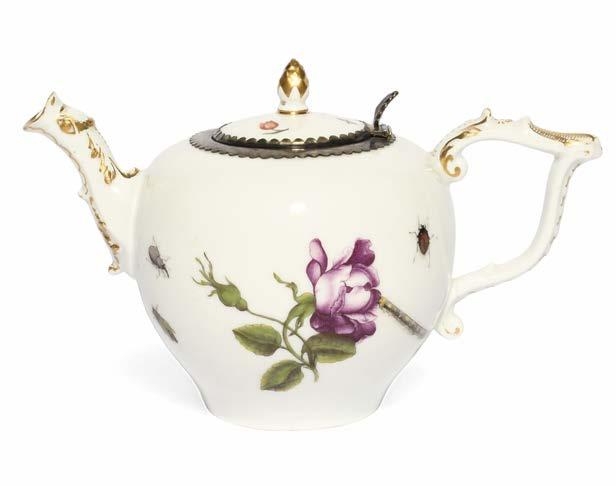
234 A Sèvres teapot and cover (théière litron), date code for 1787, painted with figures beside rivers and buildings, the shoulder and cover with a foliate design in puce and purple between rich yellow bands, blue interlaced Ls mark enclosing date letters KK and above a painter’s mark V., 16cm across. (2)
£300500
235 A Meissen botanical teapot and cover, c.1745, painted in the holzschnitt manner with a purple rose spray, the reverse with an orange trumpet flower, with scattered insects and a caterpillar, the flat cover set with silvergilt mounts, the spout modelled as a mythical beast, blue crossed swords mark, 17.5cm across.
£150250 Old paper label for Vandermeersch.


A pair of ormolumounted Sèvres style comports or tazzae, the porcelain possibly 18th century and later decorated, painted with courting couples on a bleu celeste ground, and a Sèvres style seau or câchepot painted with birds and flowers within gilt panels on a later turquoise ground, with ormolu
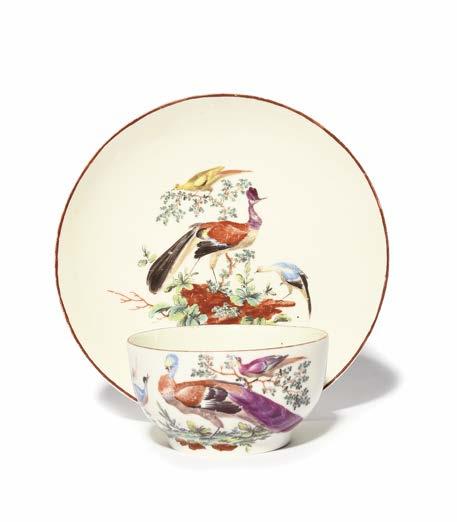

240 A Sèvres pâtesurpâte vase, c.1896, the slender form with raised decoration of apple blossom and trailing ivy on a pale green ground, incised ‘919PN’ to the underside, printed marks, 34.3cm. £500800
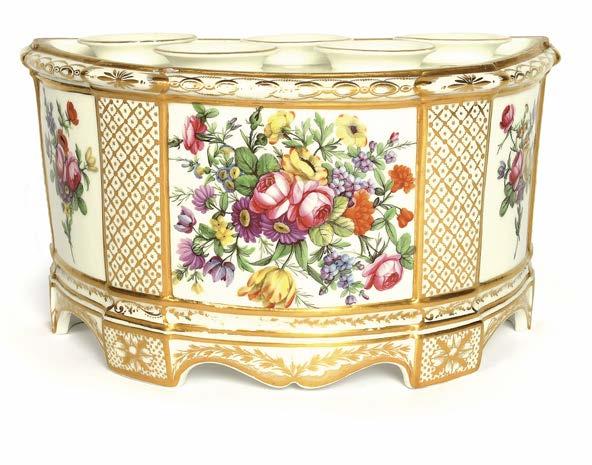

241 A large Paris porcelain bough pot and cover, 1st half 19th century, probably Rue Thiroux, of D form and painted with panels of flowers including rose, tulip and auricula, between gilt trellis bands, the cover set with five flared openings, gilt crowned A mark, 27cm across. (2) £200300
242 A Paris porcelain bough pot and cover, 1st half 19th century, probably Rue Thiroux, painted with pastoral figures before a waterfall, the sides with further watery landscapes, between formal gilt designs, the cover with three large flared openings, faint red stencilled mark, 24cm across. (2) £200300


£1,2001,500
243 A rare and early Meissen cream pot with cover and stand, c.173035, painted in the Imari palette with sprays of indianische Blumen within a lambrequin panelled border, blue caduceus mark, painter’s mark of four red dots inside the footrim, 16.8cm. (3)
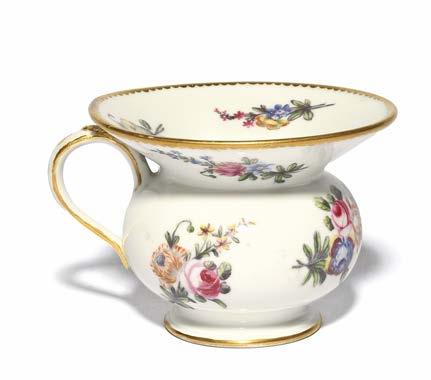
244 A rare Sèvres hard paste spittoon, c.1775, painted by Theodore with sprays of flowers on a white ground, the decoration echoed to the wide rim, puce crowned interlaced L’s mark, painter’s mark of four blue dots, good restoration to the handle, 7cm high.
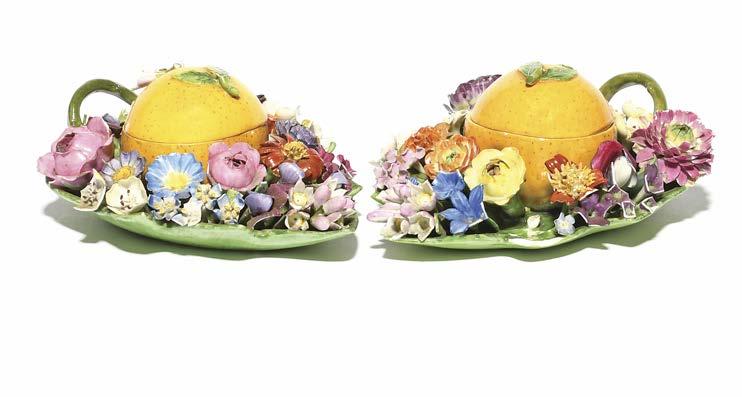
£250350
245 A pair of Meissen trompe l’oeil boxes and covers, 19th century, each modelled as an orange resting on a large leaf applied with flowers, blue crossed swords marks, some losses, 19.5cm across. (4) £150250

£1,0002,000
246 A rare Berlin (KPM) armorial plate from the Prussian Service for the Duke of Wellington, c.181719, the well decorated with the arms of Wellington flanked by two lions, the cavetto gilded, the rim with tied swags of laurel and oak on a pale pink ground, blue sceptre mark and star mark, broken and previously riveted, 23cm.
Provenance: Arthur Wellesley, 1st Duke of Wellington. Then John Dalrymple (1793-1881) and thence by descent. By reputed family tradition - this plate was broken at a Waterloo banquet and the pieces gifted to John Dalrymple by Wellington’s butler, who was a personal friend.
The extensive Prussian service, still on display at Apsley House, was a gift to Wellington from King William III of Prussia. 100 of these so-called ‘ordinary’ dinner plates were produced and were the most numerous as they were changed for every course of the meal. An outline was transfer printed onto each plate to allow better precision for the porcelain painters. Comparison with other extant pieces at Apsley would suggest this plate was one of the earliest produced as both the factory mark and painter’s mark correspond to others in the service.
247 A study collection of Continental porcelain saucers, 18th and 19th century, including two Berlin saucers painted with flowers, two Meissen saucers painted with flowers within osier moulded borders, a Berlin saucer painted with a Roman figure holding a lyre, a Paris saucer painted with farm animals in a continuous border, and a pair of saucers, probably Italian, painted with birds, 13.3cm max. (8)
£100200

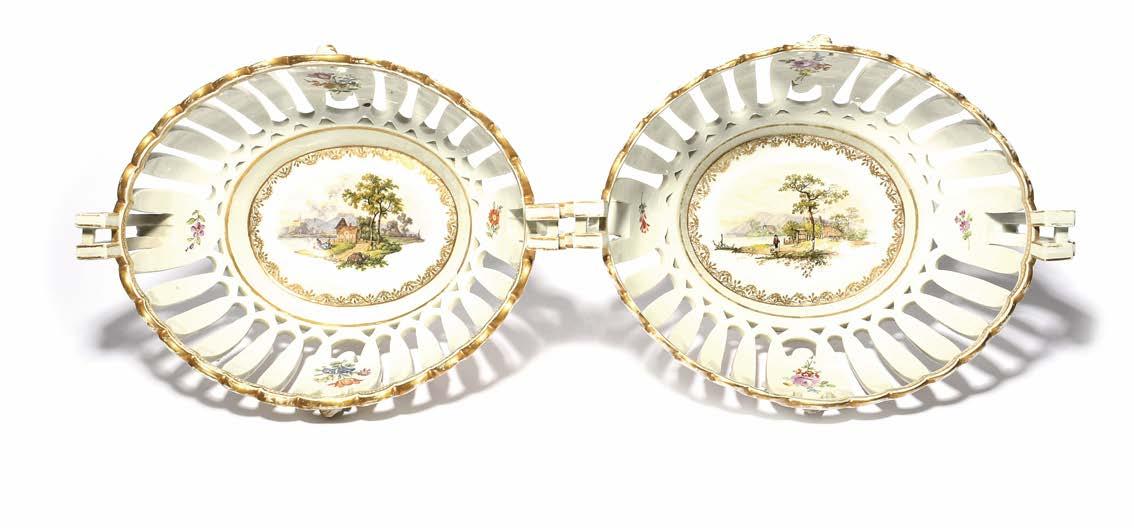
248 A pair of Meissen baskets, c.1780, the interiors painted with small figures in pastoral landscapes, the sides formed of interlocking ovals applied with pink roses, each raised on four angular feet, blue crossed swords and star marks for the Marcolini period, one foot broken and restuck, 31cm across. (2)
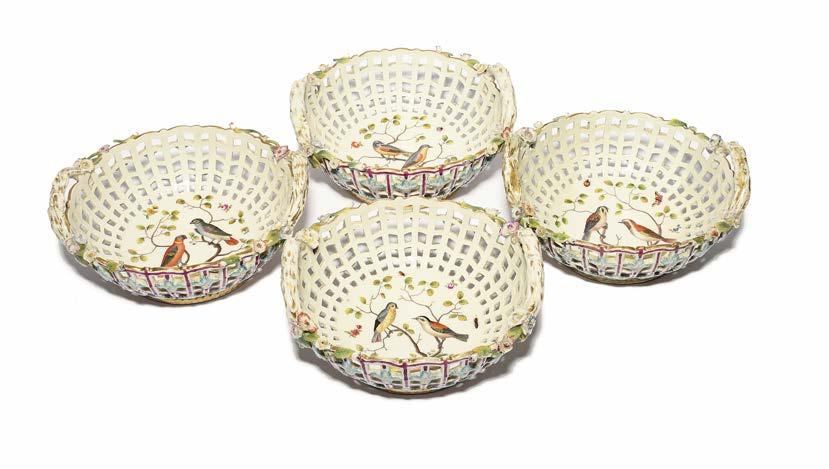
£250350
249 Four Meissen style baskets, 19th century, the wells decorated with birds perched on branches, the pierced exteriors picked out in puce and turquoise with leaf motifs, blue crossed swords marks, one drilled, 16.5cm across. (4)
£100200
250 A Frankenthal plate, c.175962, painted with flowering prunus branches issuing from a banded hedge, the rim with small sprigs of indianische Blumen, blue lion mark and monogram of JosephAdam Hannong, 24cm. £100200
The pattern copies a Japanese Kakiemon original but uses a different colour palette.


251 A pair of Meissen dessert plates, c.1760, possibly from a service made for Frederick the Great, moulded with the Marseille design of floral and trellis panels enclosing fruit and flower vignettes, alternating with colourful birds, the well with scattered sprays of fruit and flowers, blue crossed swords marks, 24cm. (2)
£300500
252 A Russian Soviet style plate, 20th century, with printed decoration after a design by Mikhail Adamovich, bearing the dates 1918 and 1923, and an oval porcelain dish printed with a nurse assisting a wounded soldier, signed in the print, 30.7cm max. (2)
£150200

Today, porcelain is taken so much for granted that it is hard to believe that fired china clay could ever cause the drama and political intrigue that surrounded it in the first decades of the 18th century.
When Johann Böttger oversaw the successful production of hard-paste porcelain at Meissen in Germany, the race was on in other European countries. Christoph Hunger was among those who defected from the German factory and brought the secrets of production to Vienna, where a factory was established in 1718. Two years later, Hunger could be found in Venice, working with the prosperous goldsmith, Francesco Vezzi, to establish Italy’s first porcelain manufactory since the Medici’s experimental production some 150 years earlier.
Vezzi, approaching 70 when the factory first began, passed financial control of the factory to his son, Giovanni. The transfer was not a success. By 1727 the factory was in financial ruin and the kilns were pulled down by the end of that year. The ever-duplicitous Hunger had by this time returned to Meissen and informed the Saxon authorities that the Venetian factory relied on the china clay imported from Saxony. Export of the clay was banned the following year.With barely seven full years in production, it is little surprise that few pieces of Vezzi ever make it onto the auction market; indeed barely 200 are believed to be extant today.
£2,0003,000
253 A rare Vezzi beaker, c.172027, the slender Ushaped form painted in underglaze blue with longnecked birds perched on branches of fruiting grapevine, VEN: A mark to the base, 8.2cm.
Tall beakers of this type were used for drinking purified chocolate mixed with sugar and boiling water. Milk, wine or egg were sometimes also added and the drink was felt to have medicinal effects.
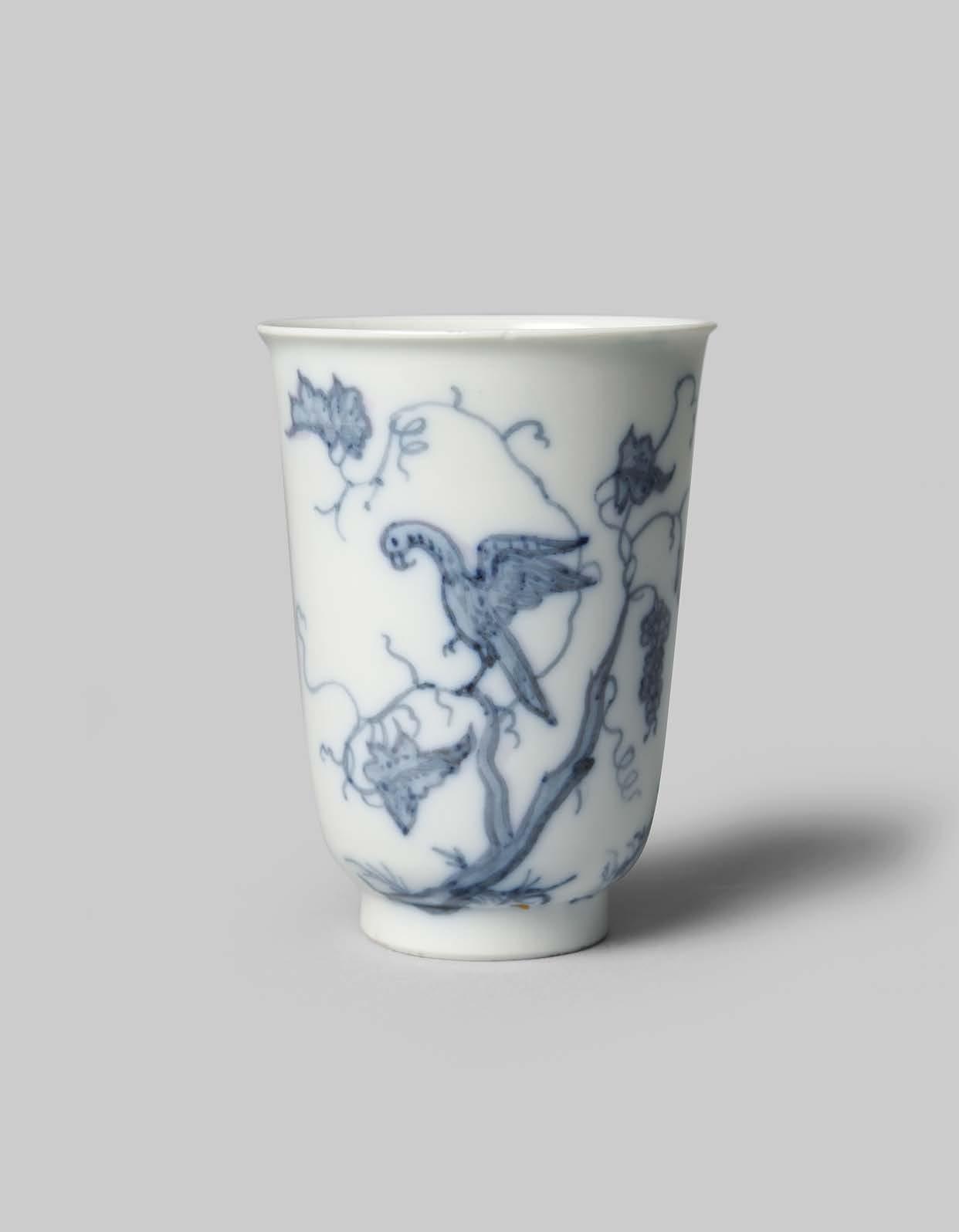


£300500
254 A Russian biscuit porcelain figure of a peasant girl, 19th/20th century, Gardner factory, holding the edge of her yellow apron over her green pinafore, wearing a lilac headscarf, raised on a square base, printed mark, 20cm.
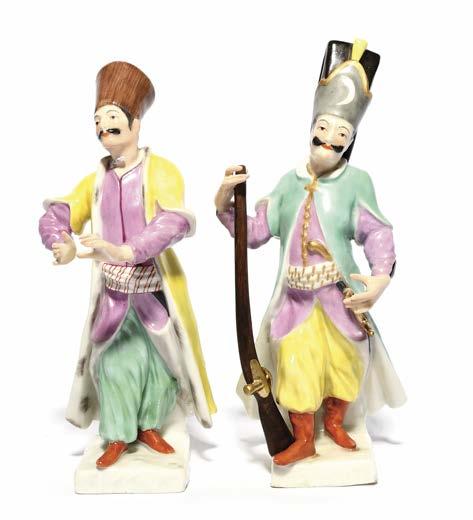
255 A small Russian porcelain figure of a musician, mid 20th century, seated and playing the accordion or concertina, and a Copenhagen figure of a boy, 19th century, wearing a top hat and carrying a basket of flowers, crowned wave mark, 14cm max. (2)
£150250

258 Six small Meissen figures, 19th/20th century, including two figures of hunters, a figure of a boy training a dog in a blue coat, a figure of Cupid in disguise as a messenger, a figure of a peasant girl holding a flower, and a miniature figure of a huntsman on horseback, varying blue crossed swords marks, some restorations, 14cm max. (6) £200300
259 Two Herend figures of peacocks, modern, modelled with tails on display and decorated in the Art Deco manner with a geometric design in blue, green, gilt and black, raised on white oval bases, printed marks, 11.3cm high. (2) £100150
260 Two Meissen figure groups, 19th century, one of two dancing courtiers on a tall vase, the other of vintners with baskets of grapes and a barrel on a rocky base, blue crossed swords marks, some good restoration, 18.6cm max. (2) £200300
261 Three Meissen figures from the Cris de Paris series, modern, after the models by Peter Reinicke, including a chestnut vendor proffering a cone of his wares, an egg seller with a large pot on her head and a basket over one arm, and a flower seller with a basket of flowers on top of her head, blue crossed swords marks, some damages and repairs, 15.5cm. (3) £200300


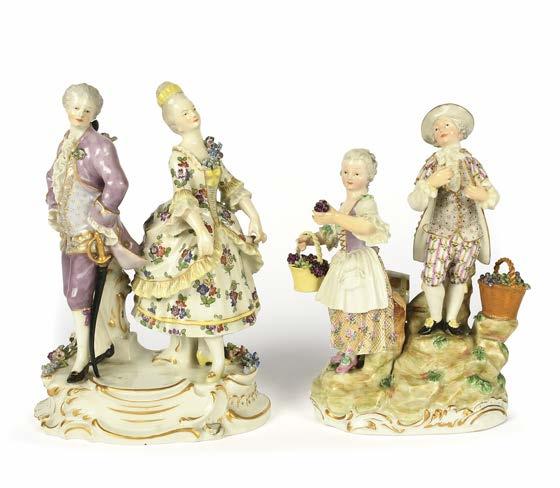


262 A Meissen model of the lace maker Barbara Uttman, c.1745, modelled by J F Eberlein, resting her lacemaking pillow on her knee, her hair tied neatly back from her face, 10.5cm. £300500
Barbara Uttman (1514-1575) established the lacemaking industry in her hometown of Annaberg, Germany. Her tombstone credits her with the invention of bobbin lacemaking in 1561. Cf. Len and Yvonne Adams, Meissen Portrait Figures, pl. XLVII. There are several variations of this figure.
263 A Meissen figure of a seated Dutchman preparing his pipe, c.174550, modelled by J F Eberlein, wearing a pink jacket over wide green trousers, filling his pipe from a sack of tobacco resting on one knee, seated on a yellow cushion, raised on a flat base applied with flowers, a chip to his pipe stem, 13cm high. £6001,000


264 A Meissen figure of a toper, c.1870, seated on an upturned bucket, holding a tankard and smoking a longstemmed pipe, wearing a furlined coat, his tricorn hat resting by his side, blue crossed swords mark, incised L44, a small amount of restoration, 18cm high. £150250
265 A Meissen figure of The Chocolate Girl, 20th century, modelled by Paul Helmig after a painting Etienne Liotard, the young servant girl carrying a tray of drinking chocolate, blue crossed swords mark, 18.2cm.
£100200


266 A Meissen figure of Africa, c.1750, wearing a feathered skirt and headdress, his hands on his hips with an elephant hide held behind him, raised on a low pad base applied with flowers, 15.7cm. £200300
Cf. Len and Yvonne Adams, Meissen Portrait Figures, p.185.
267 A Meissen style chinoiserie arbour group, 19th century, after the original factory model by Peter Reinicke, a couple in eastern dress seated on a highbacked chair and reading from a book, beneath a scrolled and pierced arbour applied with flowers, blue crossed swords mark, 22cm.
£200300
The original model was after an engraving by Gabriel Huquier, following a painting by François Boucher.

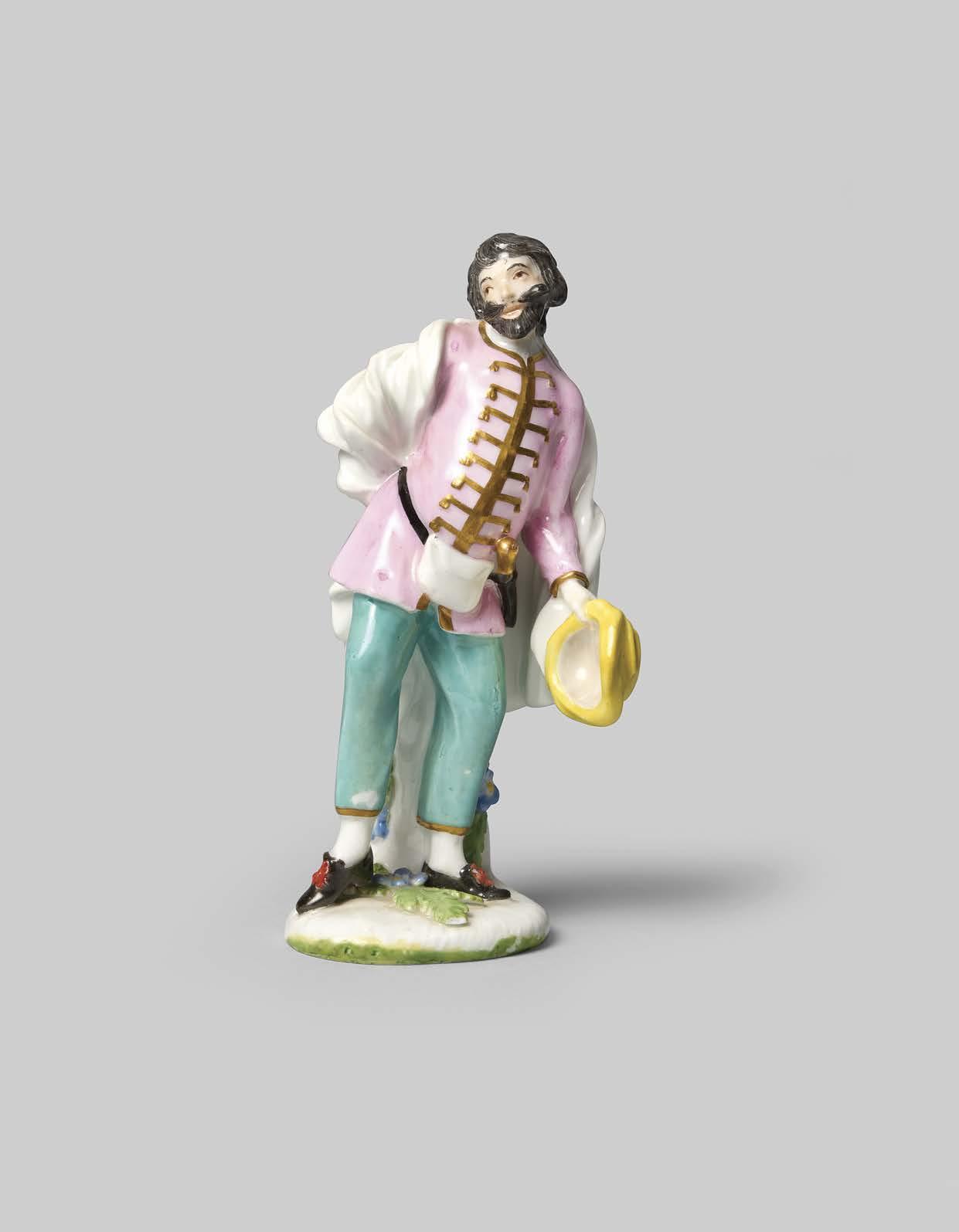
268 A
1,500 A
269 A Meissen figure of a vegetable seller, c.174550, modelled by J F Eberlein as a young woman wearing a widebrimmed straw hat, carrying artichokes and turnips in her apron, wearing a yellow bodice over a floral patterned dress, good restoration to her lower right arm, 17.2cm. £500800 Cf. Len and Yvonne Adams, Meissen Portrait Figures, col. pl. XXVIII.
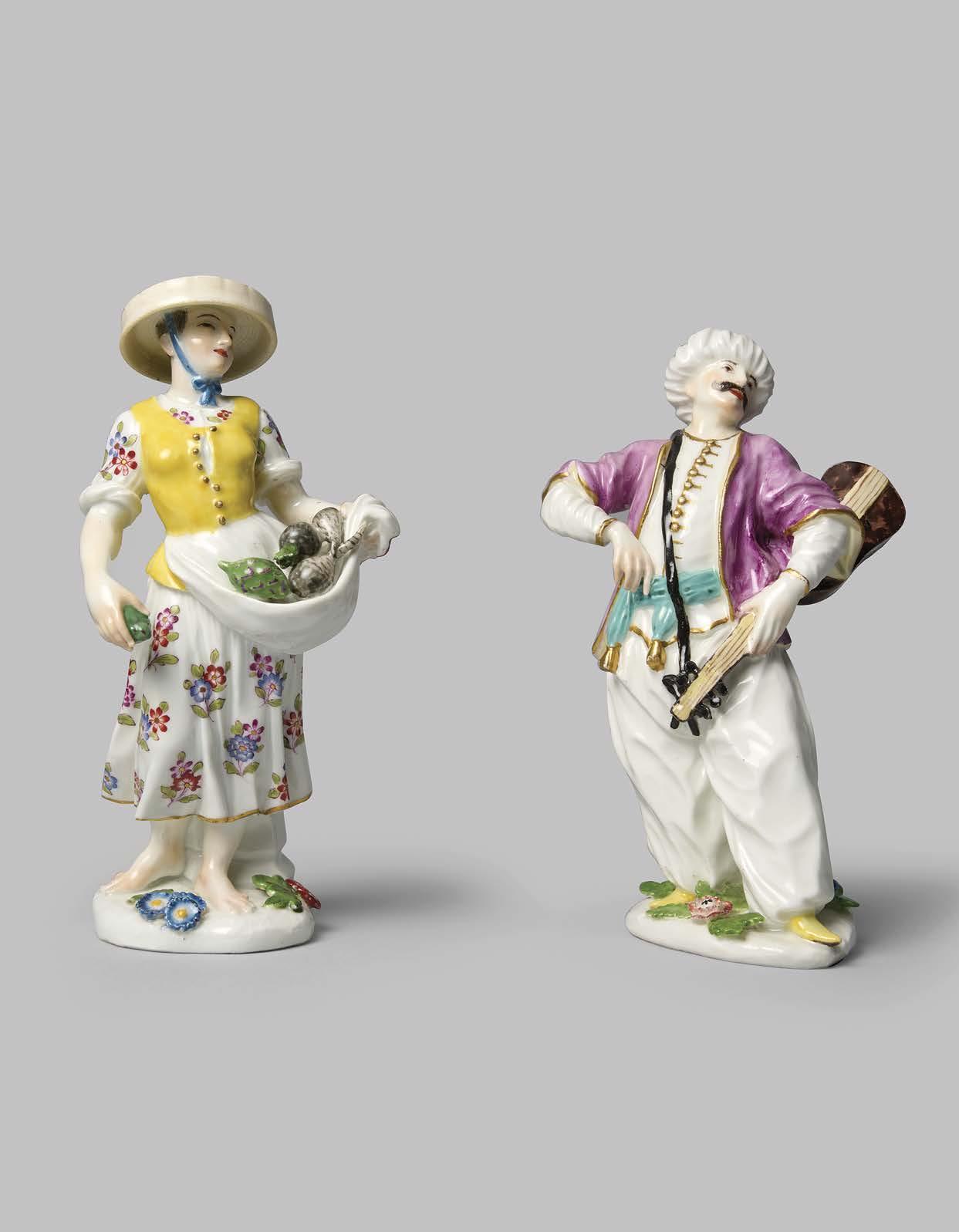
270 A Meissen figure of a Turkish musician, c.1745, modelled by P Reinicke and J F Eberlein after Le Turk Amoreux by Georg Friedrich Schmidt following a painting by Nicholas Lancret, the moustachioed figure holding a guitar and dressed in traditional costume with a turban and turquoise sash, the low pad base applied with flowers, faint blue crossed swords mark, minor restorations, 17cm. £600800
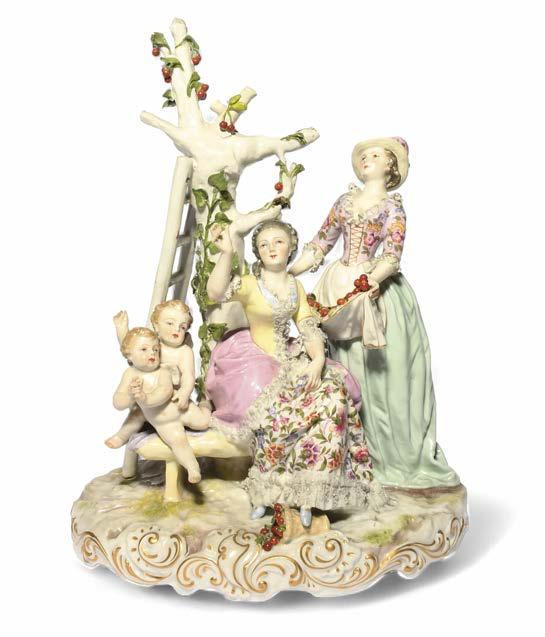
271 A large Samson figure group of cherry pickers, late 19th century, modelled with two young ladies and two putti beneath a cherry tree, one with her apron full of fruit, a ladder leaning against the trunk of the tree, pseudo crossed swords mark after Meissen, small losses and repairs, 33.5cm.
£200300

273 A Continental porcelain figure group, late 19th century, after Vienna, modelled with a young woman seated before a table with a pug dog on her lap, a messenger bending over her, pseudo shield mark, 21.3cm. £100200

272 A matched pair of figures of the Racegoer and his Companion, 19th century, the companion Minton and holding a letter and a feathered muff, the racegoer French and holding a spyglass to his right eye, some repairs to the companion, 19.5cm. (2)
£100200
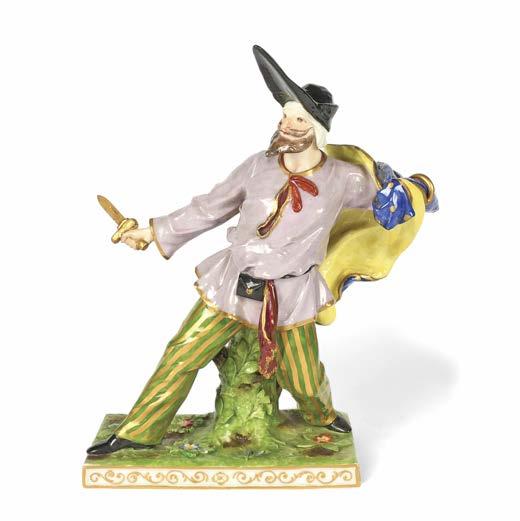
274 A Continental porcelain figure of Pantalone, 19th/early 20th century, from the commedia dell’arte, wearing a black hat with a long peak, brandishing a dagger in his right hand and a long cloak over his left shoulder, raised on a rectangular base with a gilt scroll design, some restoration, 24cm high.
£100200

275 A Meissen figure group of The Toilette of the Little Princess, c.182540, originally modelled by J J Kändler after an engraving by Le Bas based on a painting by Chardin, a court lady arranging the hair of a young girl holding a furlined muff, standing beside a dressing table laid out with a mirror, comb, scissors, scent bottle and various boxes, a cat washing itself beside, raised on a scrolled base with applied flowers, daubed blue crossed swords mark, some restoration, 18.5cm high. £6001,000

276 Three Meissen figures, 20th century, one of a gallant shepherd in demonstrative pose with a lamb recumbent by his side, one of a boy gardener holding a watering can, the last of a young girl holding a basket of flowers, blue crossed swords marks, 23.8cm max. (3) £150250

277 A Meissen chinoiserie figure group, 19th century, depicting a Chinese gentleman in elaborate hat, seated on a tasselled cushion, a female attendant holding a parasol above his head, an empty pot resting on his knee, blue crossed swords mark, some restoration, 26cm (with parasol). (2) £150250
The original model was by Kändler and Reinicke, and later remodelled by F E Meyer.
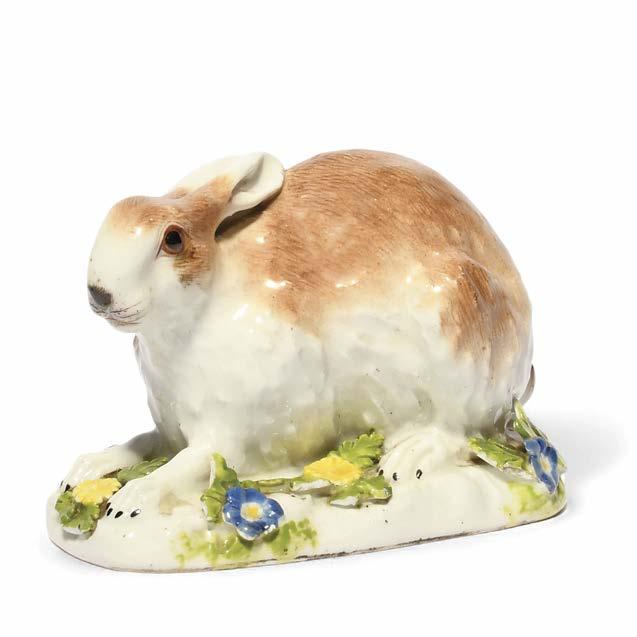
278 A Meissen figure of a rabbit, mid 18th century, modelled in a recumbent position with ears laid against its back, its fur detailed in brown enamel, on a low base applied with flowers, blue crossed swords mark, a small chip to one ear and a few leaves, 10.3cm across.

£500800
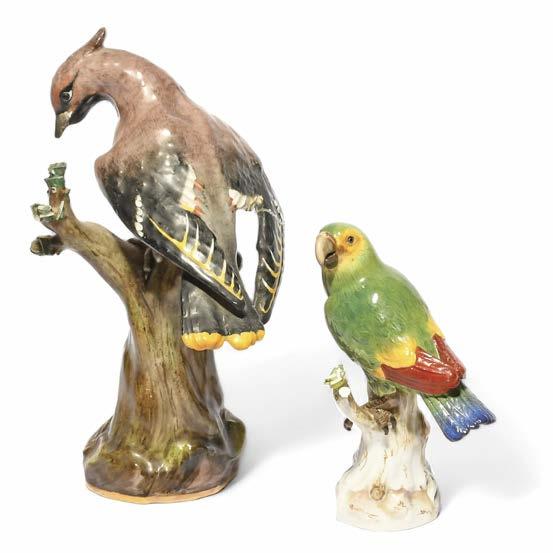
a
£150250
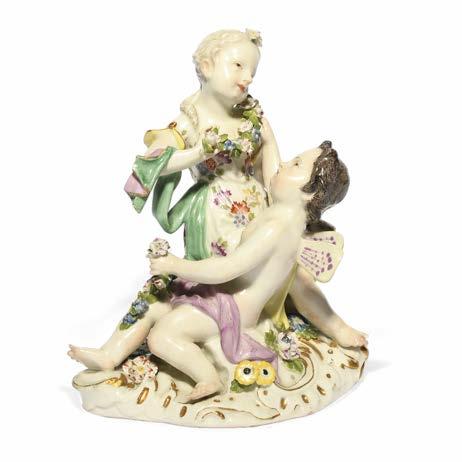

281 A Meissen figure group, c.176070, modelled as a young girl being wooed by a winged putto at her feet, a garland of flowers around her neck, raised on a low scrolled base with gilt detailing, blue crossed swords mark, minor chips, 13cm high.
£150200
282 A miniature Meissen figure of a traveller, mid 18th century, in theatrical stance, drinking from a large jug painted with a puce flower spray, a yellow cloak over his left shoulder, holding his hat in his left hand, blue crossed swords mark, 9cm.
£250350
283 A Vienna figure group of The Lover Discovered, date code for 1854, after the Meissen model by J J Kändler, the suspicious husband leaning over the bed as his dog investigates, the lady of the house reclining with a cup of tea and a pastry, Cupid clambering out from beneath the covers, impressed shield mark, 19cm across.
£150250
284 Two Meissen figures, 2nd half 19th century, one of a sleeping girl modelled by Acier, after a painting by JeanBaptiste Greuze, relaxing in a large chair with one arm on a tall wooden table, incised E58, another of a lady seated by a spinning wheel, originally modelled by J J Kändler, holding a book in her right hand, incised 2685, both with blue crossed swords marks, some repairs, 18.5cm max. (2)
£200300
The second model is after the engraving ‘Les amusements de la vie privée’ by Louis Surugue of 1747, after the painting by Chardin of 1746. The engraving was dedicated to Madame La Comtesse de Tessin.
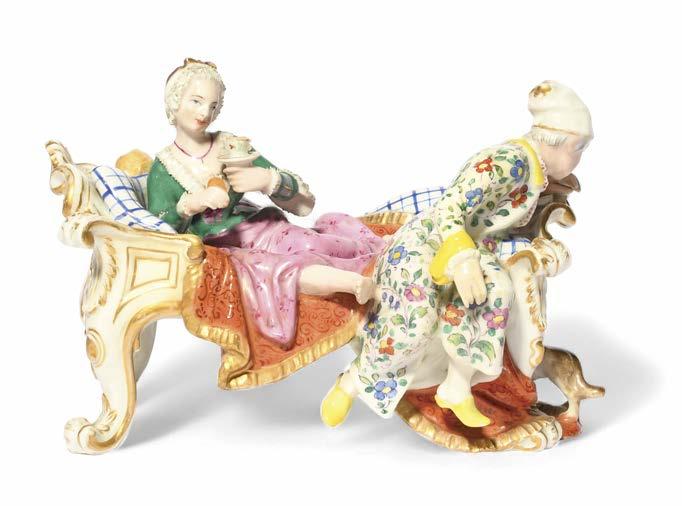

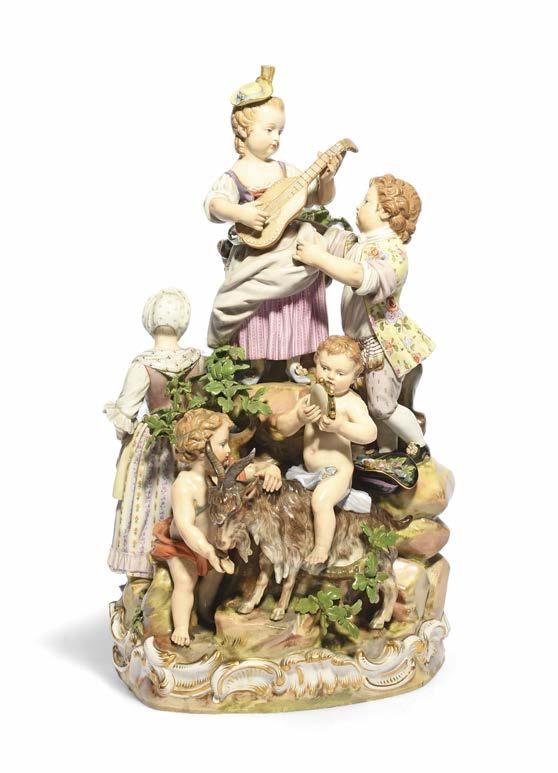
286 A Meissen figure of Count Bruhl’s Tailor, 2nd half 19th century, riding on the back of a billy goat and brandishing a pair of scissors in his right hand, his coat decorated with a blue and gilt floral design, blue crossed swords mark, some restoration, 22.3cm. £150250

285 A large Meissen figure group of country revellers, 19th century, a young girl standing atop a rocky outcrop and playing a stringed instrument, a violinist pouring wine for his companion, two putti with a donkey and a third with a dove, blue crossed swords mark, incised C59, small restorations, 37.5cm. £600800

287 A Meissen figure of a chef, modern, seated with a frying pan and holding a joint of meat aloft, blue crossed swords mark, incised number 1300, a chip to the frying pan handle, 18cm. £150200

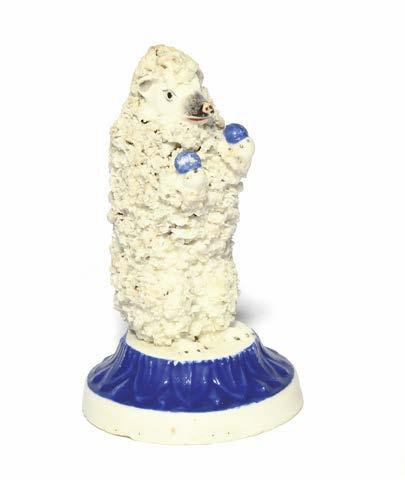
290 A rare Staffordshire porcelain figure of a kangaroo, 19th century, seated on its haunches with its head turned to look over one shoulder, raised on a low base decorated in green enamel with gilt scrolls, 7cm high.
£200300
Cf. D G Rice, English Porcelain Animals of the 19th Century, p.192, fig.156.
289 A rare Staffordshire porcelain figure of a juggling hedgehog, 19th century, standing on its back paws with a blue ball in each of its fore paws, its coat formed of crumbed clay, raised on a circular base with stiff leaf moulding and blue decoration, 8.6cm.
£200300
Cf. D G Rice, English Porcelain Animals of the 19th Century, p.173, where he describes hedgehogs in porcelain as very rare.
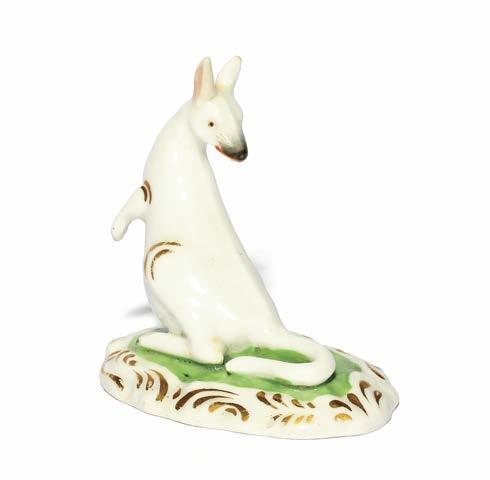
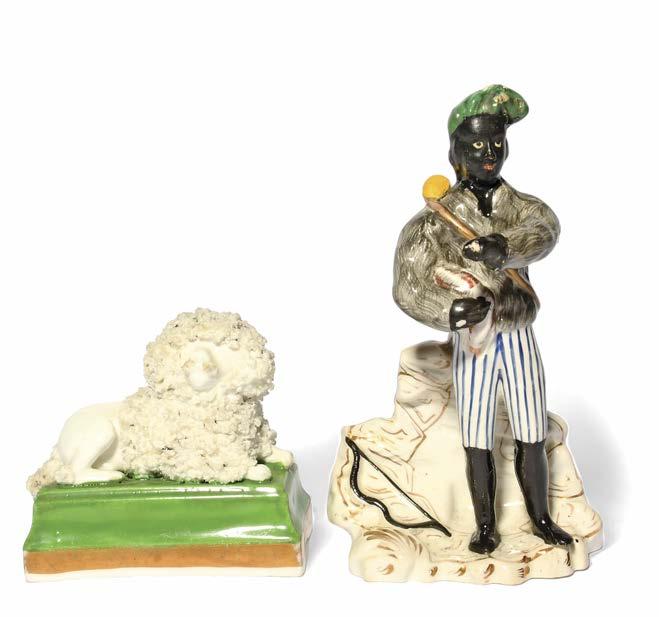
291 A Staffordshire porcelain figure of a poodle, c.1820, recumbent on a green base, and a Staffordshire figure of Man Friday, wearing a green cap and striped breeches, some restoration to the latter, 15.7cm max. (2)
£100200

292 A Spode miniature watering can and cover, c.1820, the pearshaped body painted with arrangements of flowers within a gilt trellis panel border, the handle and spout gilded, 7.5cm. (2) £100200


293 A Spode ‘Lizard’ bottle and stopper, c.1820, the tall cylindrical neck moulded with the crest of a bird standing over a brazier, painted in pattern 1918 with arrangements of flowers on a white ground, iron red factory mark and pattern number, 10cm. (2)
£150250

294 A miniature Spode watering can and cover, c.1820, decorated in pattern 2812 with pink roses on a gilt tendril ground, iron red factory mark and pattern number, 7cm high. (2)
£100200
295 A Royal Worcester miniature fruitpainted coffee pot and cover, date code for 1958, painted with peaches and grapes, signed, a miniature cream jug, a teacup and saucer, all with similar decoration, black printed marks, and a small saucer or dish painted by Kitty Blake with blackberries, 12.7cm max. (6)
Provenance: the Joy Hallam Collection.
£150250

296 A Flight, Barr and Barr part dessert service, c.182030, painted with British landscape scenes reserved on an apple green ground, the views titled to the reverse, printed and impressed marks. Comprising: a sauce tureen and cover, a comport, two oblong dishes, two onehandled dishes, and 11 plates. (18) £300500
297 A Derby part service, c.1820, painted by Leonard Lead, each with three bold flower sprays including tulip, rose, auricula and heartsease, within gilt dentil rims, iron red crowned crossed batons marks. Comprising: nine plates and two oval chargers or serving dishes. (11) £400600

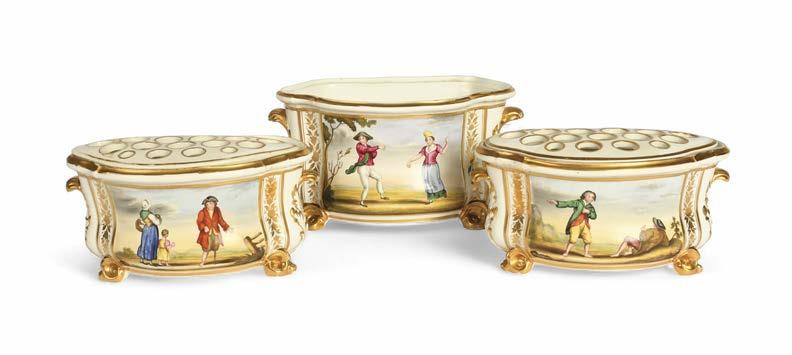
298 A garniture of three Bloor Derby bough pots, c.182530, two with covers, the shaped forms painted with pastoral scenes, the larger with a couple dancing, the smaller with scenes of travellers and beggars, raised on gilded scroll feet, red printed marks, one cover lacking, 22cm across max. (5) £300500
299 A group of Swansea style teawares, c.181020, including a trio, two coffee cups and a saucer painted with birds, a teacup and three saucers painted with fruit sprays, and a saucer painted with arrangements of shells, and another with sprays of pink roses, all with the same trellis panel gilded design, some faults, 14.6cm max. (12) £100200

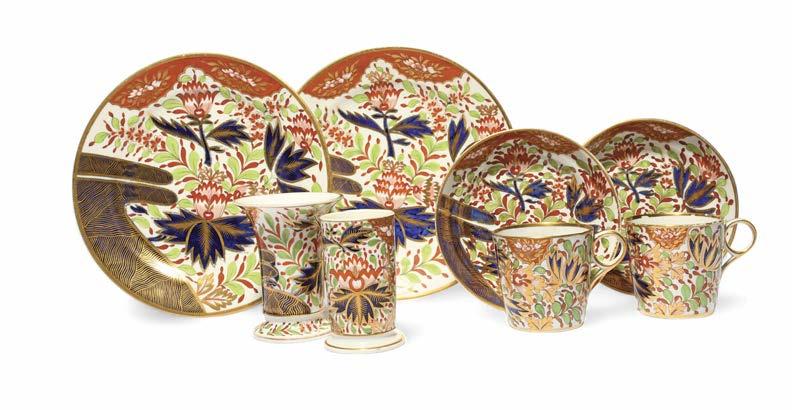
300 A group of Chamberlain’s Worcester porcelains, c.1810, including two plates, two cups and saucers and two spill vases, all richly decorated in pattern 276, in an extended Imari palette with a bold stylised foliate design, script marks to most, one erroneously marked with pattern number 240, 21.5cm max. (8) £150250
301 A pair of Wedgwood Black Astbury cups and saucers, mid 20th century, of peony shape, finely gilded with panels of Classical figures within formal raised gilt foliate motifs on a black ground, printed marks including the Portland Vase, 14.7cm. (4) £250300
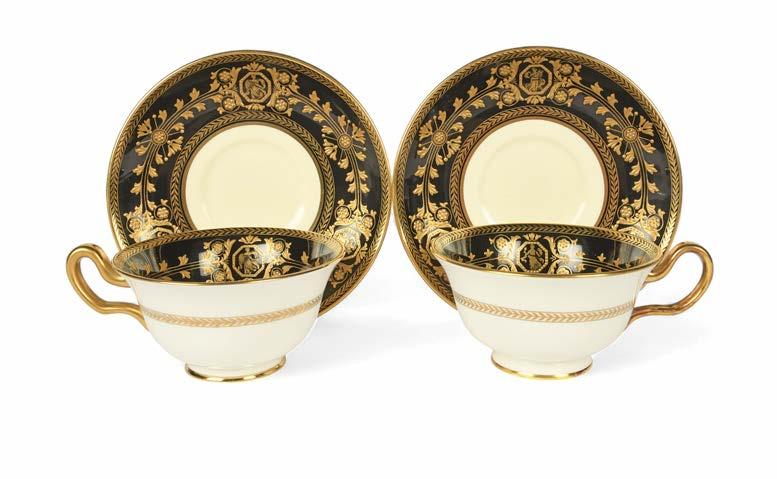

302 A pair of small Minton pot pourri vases and covers, 19th century, in the Sèvres manner, painted with scenes of putti at play, the reverses with flowers, all reserved on a turquoise ground, the necks and covers with a pierced design, pseudo blue Sèvres mark, some repairs, 19.5cm. (4) £150250
303 A pair of Bloor Derby ewers, c.1830, of Kedleston ewer form, painted with scenes of figures, one with a man wading through water and giving his daughter a piggyback, the reverse with a woman carrying a child across a bridge, the other with a woman and two children, the reverse with a woman holding hands with her daughter, within gilt palmette borders on a white ground, red printed marks, 28cm. (2) £250350
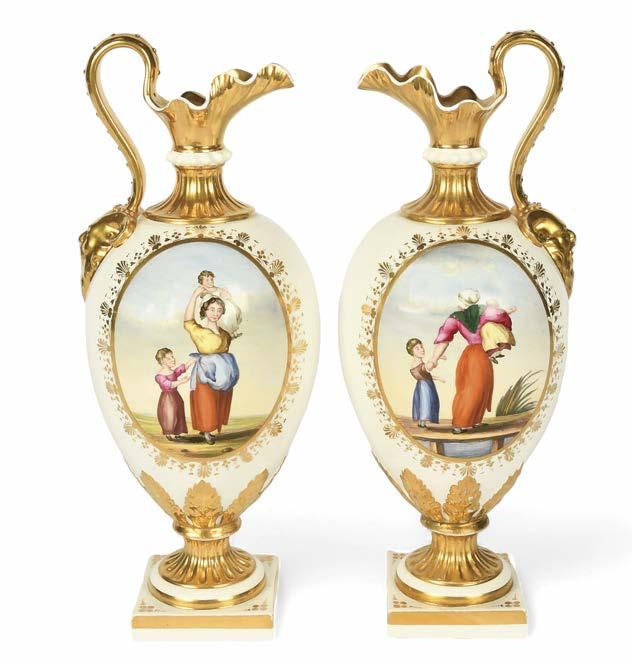

304 A large Spode vase, c.1820, of New Shape Jar form, richly decorated in pattern 967 with a fence, bamboo and stylised plants in an extended Imari palette, iron red factory mark and pattern number, 20.8cm. £150200

305 A pair of Minton vases and covers, 19th century, in the Sèvres style, well painted with scenes of Classical maidens attended by children, one with a dwarf taking a dagger from the hand of a reclining maiden wearing a laurel diadem, the reverses with songbirds in flight above rose sprays, reserved on a turquoise ground with jewelled bands to the foot, cover and painting, blue interlaced Ls mark enclosing letter A above the letters FC, some restoration, 38.5cm. (4) £600800

307 A good and large Grainger’s Worcester reticulated vase and cover, date code for 1893, the Ushaped body finely pierced with a floral and foliate band between narrow flowerhead borders picked out in gilt, above an acanthus leaf section, raised on a knopped stem and pierced square foot, the tall cover with a repeated palmette design and hollow gilt finial, printed marks, 48.2cm (vase and cover). Together with a wooden stand. (3) £8001,200

308 A large Coalport clock, 19th century, of rococo form, applied with a bird and large flowers on exuberant scrollwork picked out in blue and gilt, raised on four scroll feet below a reticulated trellis panel, 34.5cm. £200300
98
306 A large and unusual English porcelain vase, 1st half 19th century, possibly Coalport, well painted with floral arrangements between applied white flowers, the shoulders with gilt handles formed from the heads of cranes or herons, small losses, some restoration to the rim, 37cm. £100120
Provenance: the Joy Hallam Collection.


309 Four English porcelain vases, 19th century, one Miles Mason and painted with flowers on a gold ground between ram mask handles, a flared beaker vase, probably Spode and decorated in pattern 1626 with a panel of flowers between beaded bands, another of flared form painted with a hunter and his dog on a green ground, the last with a panel of flowers on a blue ground, some damages, 24cm max. (4) £150250

Rod was well known in the world of ceramics for all the right reasons. His prodigious and broad knowledge of English porcelain was delivered with great friendliness, he was always generous and approachable, and thoroughly enjoyed the challenge of finding things for his many customers. The academic side of his business encompassed historical research and getting his hands dirty in joining in archaeological excavations.
Coming from the Wirral in Cheshire, he was very much drawn to the porcelains from Liverpool. Attribution was always one of Rod’s keen interests and he pursued this most especially in the field of Liverpool porcelains. Most notably, he and Maurice and Lyn Hillis, together with Paul and Bunny Davies, made spectacular discoveries on the site occupied by William Reid & Company, which enabled a reattribution of some pieces hitherto given to Richard Chaffers the socalled phosphatic group and to Samuel Gilbody’s factory. This culminated in an exhibition held at Rod’s shop in Campden Street, accompanied by the catalogue published by Maurice and Rod in March 2000, The Liverpool Porcelain of William Reid: A Catalogue of porcelain and excavated sherds. This led to reattributions in the sale of the Watney Collection in the same year. This was all prompted by an informal visit Rod made to the Reid site, where he found some sherds which generated the official dig by Liverpool Museum’s Archaeology department. Earlier, in 1991, Rod and Maurice Hillis had collaborated on a paper ‘Further Finds of Gilbody Porcelain’, published in NCS Journal 8, illustrating many sherds found by them and Paul and Bunny Davies. The NCS invited him to cocurate the porcelains in their 1993 exhibition held at the Walker Art Gallery, Liverpool, Made in Liverpool, Liverpool Pottery and Porcelain 1700 –1850.

Rod’s paper to the Northern Ceramic Society, ‘Liverpool Porcelain Figures Fact or Fiction?’, published in NCS Journal 28 (2012), reinforced his interest in attribution as he here discussed figures attributed to Gilbody and, controversially, the figures attributed to Chaffers, particularly the George II busts and related wares including two plaques in the V&A collection, where he suggested a Vauxhall attribution.
In 1998, Rod held an exhibition at Stockspring Antiques in Kensington Church Street, of the recently discovered sherds from Isleworth, which had been found on the Thames foreshore by Ray Howard and Arthur Bayliss, who generously lent them to the exhibition. I was fortunate to be involved in producing with Rod the catalogue Isleworth Porcelain that gathered together extant pieces including dated wares and pieces from descendants of the Goulding family who married into the Shore family, owners of Messrs Shaw & Co, the Isleworth concern. Most fortuitously, the ‘Syon Park Vases’ came up at auction and Rod was able to buy these for inclusion in the exhibition.
Through Rod’s friendship with Robert Hunter, editor of Ceramics in America, the journal published by The Chipstone Foundation, he became interested in the history of early American porcelain and the prevalence of English porcelain on American excavated sites. This led to a paper in 2007 with Robert Hunter on ‘English Porcelain in America: Evidence from Williamsburg’. He was also keenly interested in the ceramic activities of John Bartlam at Cain Hoy and, in 2011, contributed along with J. Victor Owen, Robert Hunter and Martha Zierden to a scientific paper ‘Microstructures of Phosphatic Porcelain from Sintering to Vitrification: Evidence from Sherds Excavated in Charleston, South Carolina’ published in Geoarchaeology. It was enormously appropriate that Rod was commissioned on behalf of the Metropolitan Museum to buy the previously unrecorded blue and white teapot attributed to John Bartlam’s, Cain Hoy, South Carolina manufactory, in these Rooms at Salisbury in February 2018.
On the more commercial front Rod was a frequent exhibitor at the Wakefield Ceramic Fairs, especially at the Cumberland Hotel in London in the 1970s and later exhibited at the International Ceramics Fair and Seminar in the 1980s before joining other dealers of Kensington Church Street in a ceramicorientated ‘Eight Days in June’, which became a popular part of the ceramic season. Every January he also exhibited at the New York Ceramics Fair as well as the BADA Fair in London in spring. After he closed his shop in Campden Street, he dealt by appointment mostly via his online website, which he continued to do when he moved back to the Wirral, until he was unable to through ill health.
I am confident that Rod would have been pleased to know that these pieces that he personally selected with his unfailingly professional and experienced eye will be finding new homes.
Anton Gabszewicz
Pimlico, 2024
310 A small Vauxhall blue and white bottle vase, c.1758, the globular body painted with flowerhead motifs within a hexagonal diaper design, the tapering neck with an everted rim and a narrow painted band, a crack to the neck, 10.8cm. £400600
Provenance: Rod Jellicoe.


311 A Vauxhall blue and white small mug or coffee can, c.175558, the cylindrical form with a slightly flared foot, painted in a bright blue with a figure fishing in a continuous pagoda island landscape, 6.7cm. £400600
Provenance: Rod Jellicoe. Formerly, the David and Jan Birley Collection.
Exhibited: English Ceramic Circle, 2007, No. 143.
312 A miniature or toysized Richard Chaffers (Liverpool) blue and white teabowl and saucer, c.1762, painted with a V of birds in flight above a Chinese island landscape, 8.3cm. (2) £100200
Provenance: Rod Jellicoe.
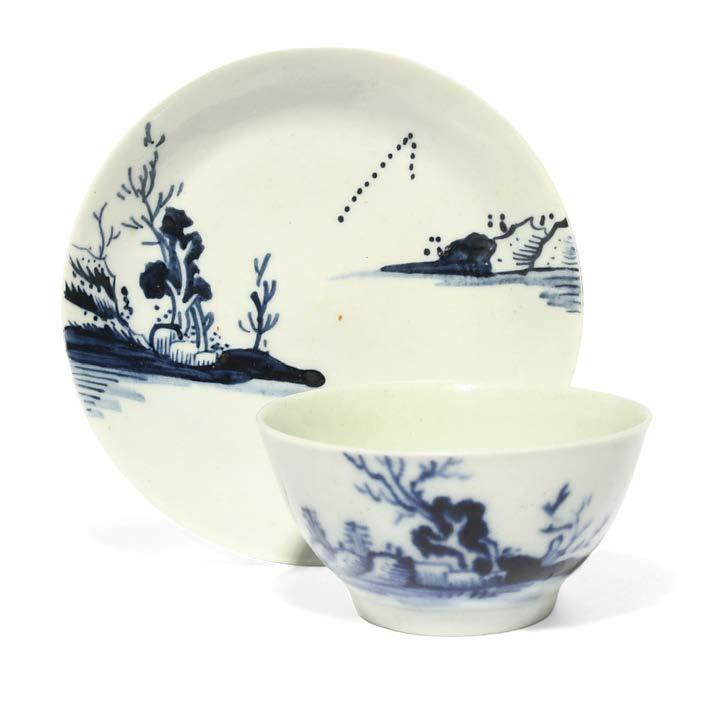

313 A Bow blue and white chocolate pot and cover, c.1760, painted with the Golfer and Caddy pattern, a Chinese boy carrying rolled scrolls for a gentleman beneath gnarled flowering branches, painter’s numeral 2, the handle and a small rim section broken and restored, 16.3cm. (2) £1,5002,000
Provenance: Rod Jellicoe. Formerly with Lady Kate Davson, née Kate Foster (1938-2020).
Exhibited: Ashmolean Museum, Oxford, 2009-2020.

314 A pair of rare and early Bow blue and white salts or sweetmeat stands, c.1750, each formed of three scallop shell dishes supported on a moulded base applied with further small shells and seaweed, topped by a large whelk shell, each dish painted in a bright blue with a fringed tree beside holey rockwork within a fleur de lys border, minor damages, 16cm across. (2)
Provenance: Rod Jellicoe.
The painted design on this stand is known on single shell dishes of the same date but is rare on this form.
£8001,200
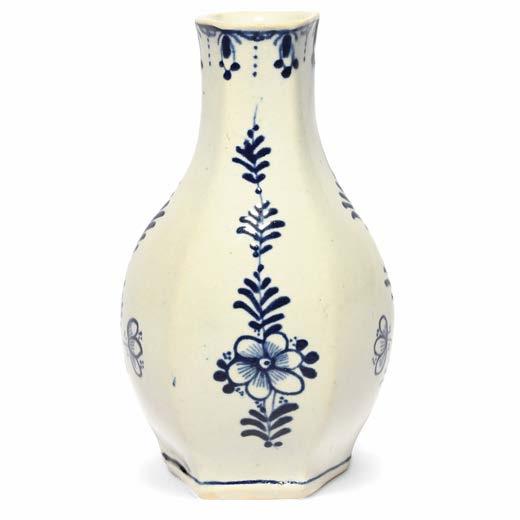
315 A Pennington’s (Liverpool) small vase or cruet bottle, c.176875, the hexagonal bottle form painted with four stylized flower and leaf sprays beneath a formal border, a tiny rim chip, 11.4cm. £300500
Provenance: Rod Jellicoe. Formerly the David and Jan Birley Collection.
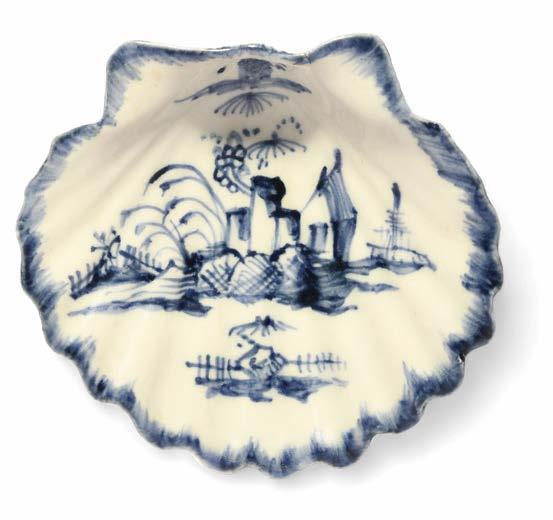
317 An English porcelain blue and white pickle dish, c.1760, of scallop shell form, painted with a Chinese landscape design, raised on three peg feet, JE monogram painter’s mark to the base, 11cm across. £150250
Provenance: Rod Jellicoe.

316 A rare Caughley blue and white inkwell and liner, c.177580, of capstan shape, printed with the Bell Toy pattern, the reverse with vases of flowers in a garden setting, the flat top pierced with four small holes around a central aperture containing the liner, decorated with flower sprigs, faint C mark, 9.6cm across. (2) £400600
Provenance: Rod Jellicoe.
Cf. Geoffrey Godden, Caughley and Worcester Porcelains, pl.128 for a similar example plus wasters excavated from the factory site.

318 A William Reid (Liverpool) blue and white coffee cup, c.1755, moulded with a diaper design enclosing panels painted with small flower sprigs, the shaped rim with a formal border, 6.3cm. £150250
Provenance: Rod Jellicoe. Formerly the David and Jan Birley Collection.
319 A small Bow blue and white mug, c.1760, the bell shape densely painted with flowering peony, chrysanthemum and bamboo, the rim with a trellis border, 9cm.
Provenance: Rod Jellicoe.
£150250

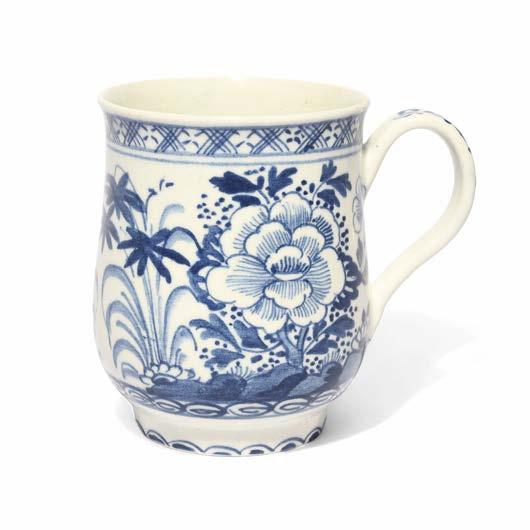
320 A rare Lowestoft blue and white cider mug, c.1765, the globular body painted with insects in flight above floral swags issuing from tied ribbons, the shoulder and straight rim moulded with lappets and horizontal banding, the interior rim painted with a continuous floral band, 9.8cm. £8001,200
Provenance: Rod Jellicoe.
Cf. Geoffrey A. Godden, Lowestoft Porcelains, p.70, pl.66 for an example of the same shape.
321 A Lowestoft blue and white feeding cup, c.1770, the straight sided form painted with a moth in flight above flowering plants, the top half covered and painted with a further flower spray, the slender tapering spout with floral tendrils, 15.2cm across.
£150250
Provenance: Rod Jellicoe. Formerly the Mrs D MacCallum Collection.

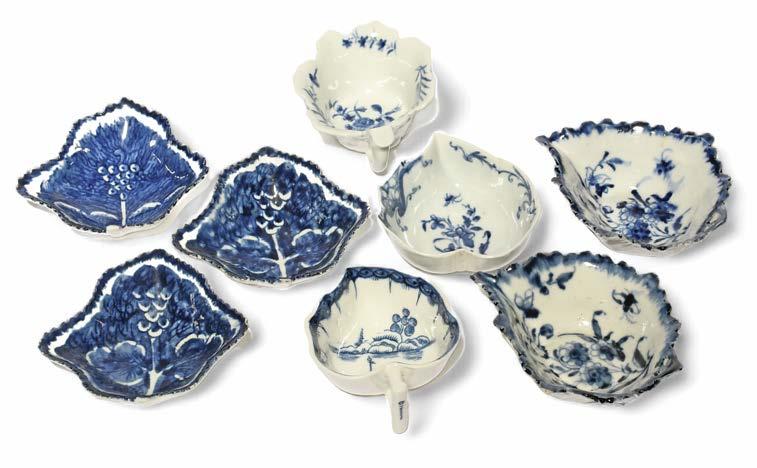
323 Two Bristol blue and white pickle dishes, c.1772, of leaf shape, one painted with three differing flower sprays, the other with a central flower spray within scattered leaves, the last with a blue X mark, small rim chips, 9cm. (2) £300500
Provenance: Rod Jellicoe.
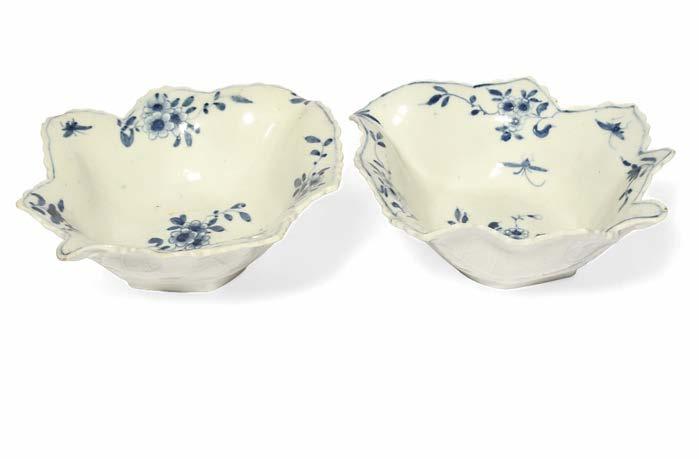
325 A rare pair of Bow blue and white flower pots, c.176265, the flared bucket shapes painted with fanshaped panels of Oriental landscapes reserved on a powder blue ground, moulded with ring handles, the bases pierced with a central hole, stands lacking, 6.2cm. (2) £200300
Provenance: Rod Jellicoe.
322 Five English porcelain blue and white pickle dishes and three butterboats, c.175865, three of the pickle dishes Bow and painted with a vine leaf design, two Derby and painted with flowering plants, one butterboat Worcester of geranium leaf design, the other two Derby and Worcester and of leaf shape, small faults, one butterboat handle lacking, 9.5cm max. (8) £150250
Provenance: Rod Jellicoe.

324 A pair of large Worcester blue and white pickle dishes, c.1758, of deep vine leaf form, painted with small sprays of flowering prunus and scattered flying insects, workman’s marks, 15.3cm across. (2) £100200
Provenance: Rod Jellicoe.

326 A rare New Hall blue and white pickle dish, c.1785, of leaf shape, printed with the Gazebo pattern within a cell diaper and leaf pattern border, 10.1cm.
Provenance: Rod Jellicoe.
£300500

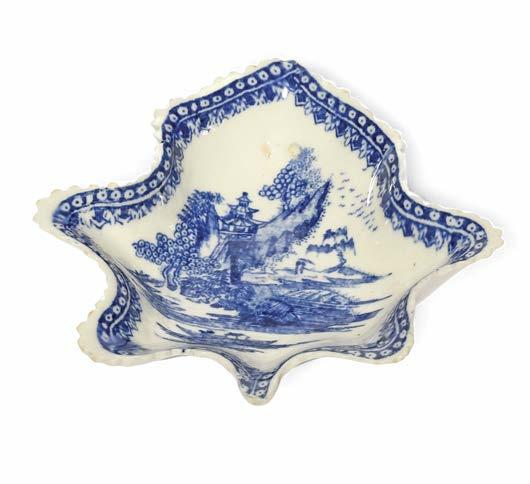
327 An English porcelain blue and white basket, c.176070, of lobed circular form, painted to the interior with a domed pagoda and other low buildings in a Chinese island landscape, the interior rim with a cell diaper border, a rim crack, one handle broken and restuck, 19.2cm across.
Provenance: Rod Jellicoe.
328 A large Worcester twohandled blue and white sauceboat, c.175558, the generous form painted to the interior with the TwoHandled Sauceboat Landscape pattern, the exterior moulded with panels and decorated with small vignettes, the handles with unusual hound’s head thumb rests, painter’s mark, 21.3cm across.
£250350
Provenance: Rod Jellicoe.
£100200
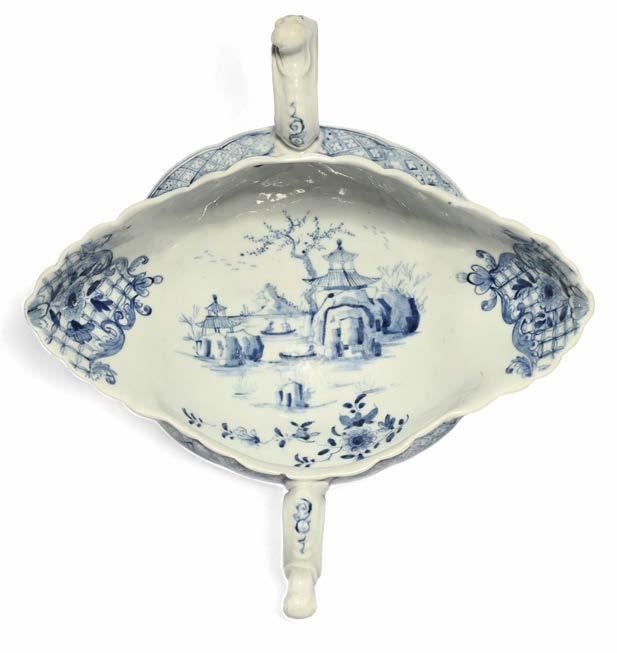

329 An unusual Derby blue and white dish, c.177075, painted with a Chinese figure standing before a table in an interior scene and talking to a small boy holding a broom, the rim reserved with four peony panels on a hatched diaper ground, the underside rim painted with landscape vignettes, a faux six character Chengua mark, 28cm. £300400
Provenance: Rod Jellicoe.
Exhibited: Juno Antiques, 2013.
330 A large Lowestoft blue and white cider jug, c.1765, painted with a Chinese figure carrying a parasol in an extensive pagoda landscape, the shoulder and neck moulded with flowerheads and lappets, the neck painted with a formal floral border, painter’s numeral 2 inside the footrim, minor faults, 26.2cm. £300500
Provenance: Rod Jellicoe.
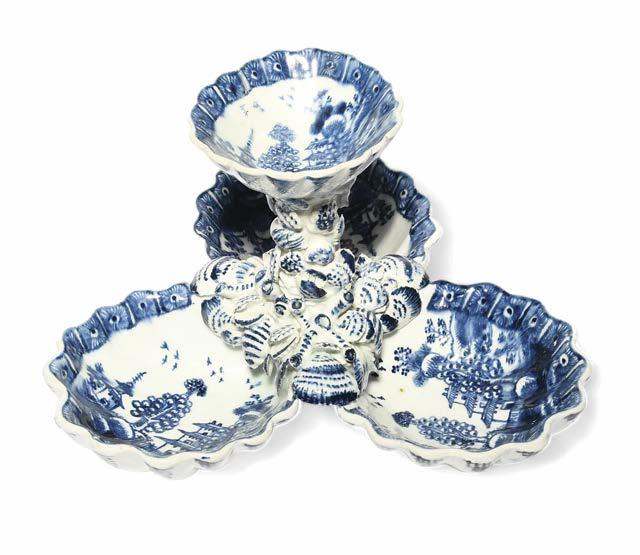

331 A Bow blue and white tiered pickle or sweetmeat stand, c.1760, formed as three joined scallop shells, a circular dish rising from a central pillar applied with further small shells, each decorated with a pagoda landscape pattern within cell diaper borders, raised on three peg feet, some restoration, 13.5cm high. £100200
Provenance: Rod Jellicoe.
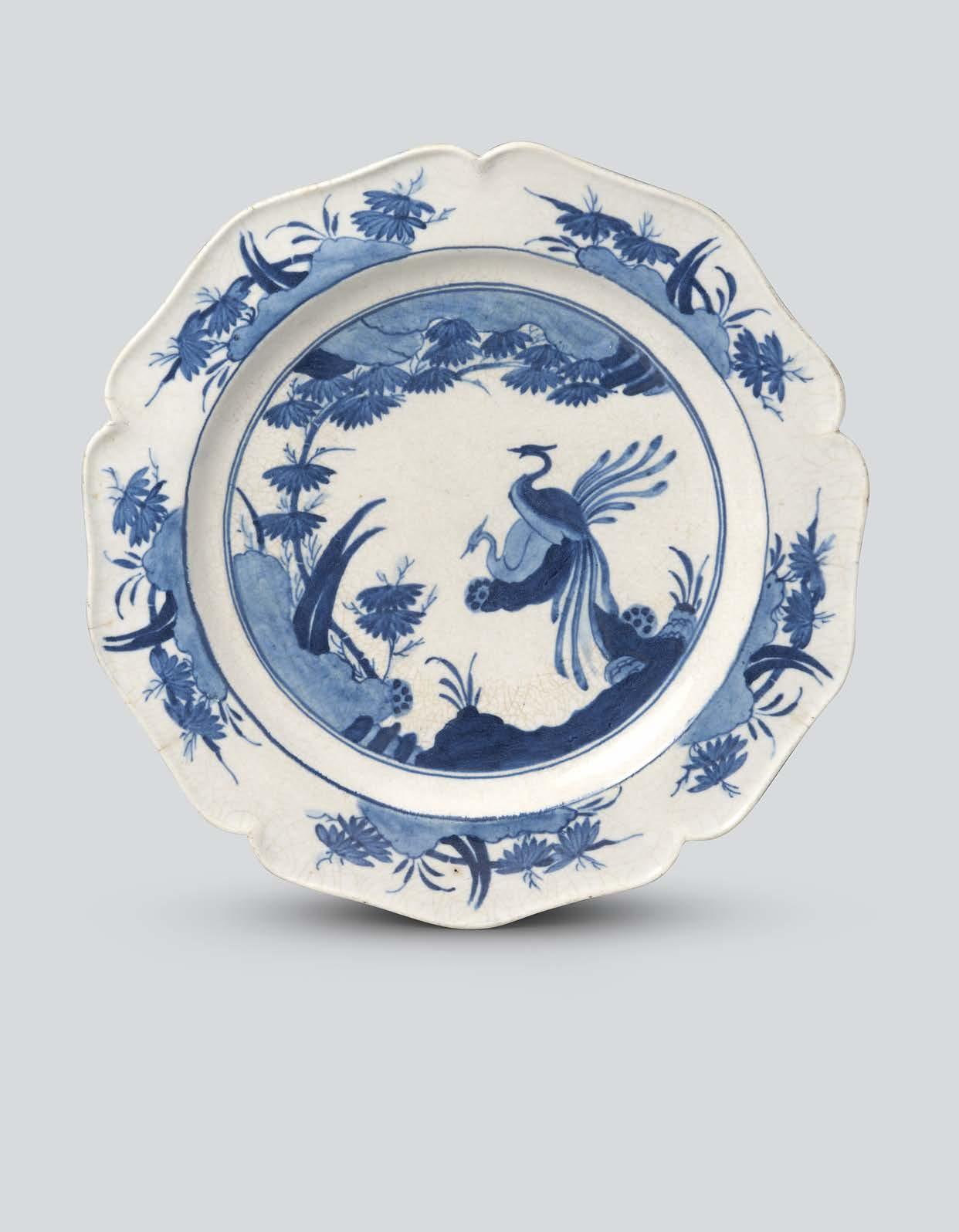
332 A rare Chelsea blue and white plate, c.175455, of cinquefoil form, painted after a Japanese Kakiemon design with two longtailed birds perched on a low branch beneath leafy bamboo and dense cloud scrolls, the shaped rim with five repeated vignettes of flowering plants, blue anchor mark, two small restorations to the rim, short rim cracks, 23cm.
Provenance: Rod Jellicoe.
£1,0001,500
With Chelsea’s preference for emulating the more colourful Chinese famille rose or Japanese Kakimon wares, few pieces of blue and white were produced at the London factory. This plate is one of a handful of similar examples with identical decoration to the well. However, only one other (from the Elizabeth Adams Collection) is known with this repeated landscape design to the rim. Cf. Mary White, A Chelsea Blue and White Plate and its Origins, Transactions of the English Ceramic Circle, Vol. 24, pp.55-61 for a discussion of the decoration of a similar plate in the White Collection.
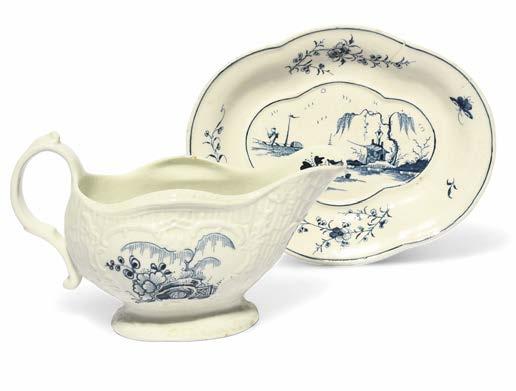
333 A Philip Christian (Liverpool) blue and white sauceboat, c.176572, crisply moulded with panels and painted with Oriental landscape scenes, and a quatrefoil stand, probably Derby, painted with a figure in a junk behind cannonball rocks, the rim with flower sprays, 17.8cm max. (2) £100200
Provenance: Rod Jellicoe.
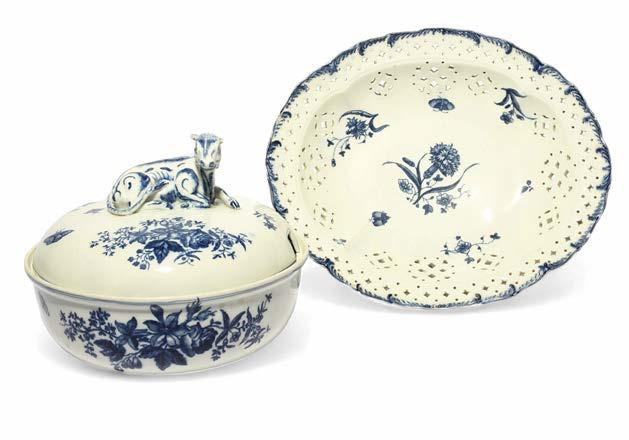
334 A rare Worcester blue and white comport or dessert stand, c.176570, the quatrefoil form printed with the Gillyflower pattern within a pierced featheredged border, and a rare Worcester circular tureen and cover, printed with the Pinecone pattern and other vignettes, the cover with an unusual finial of a recumbent cow, the tureen broken and repaired, 29.2cm max. (3) £150200
Provenance: Rod Jellicoe.

335 A rare New Hall plate in the Sèvres style, c.178590, moulded and painted in blue with feuille de choux borders, a New Hall blue and white coffee cup and saucer printed with birds in flight above Oriental plants within a fleur de lys border, and a spoon tray printed with the Trench Mortar design, 22cm max. (4) £200300
Provenance: Rod Jellicoe. The plate formerly in the J Holgate Collection.
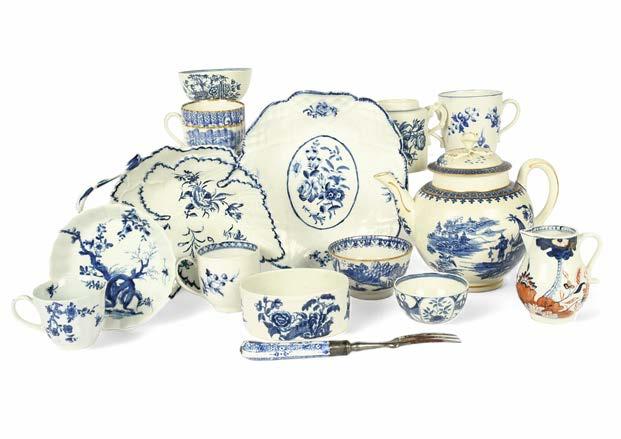
336 A group of English blue and white porcelains, c.175580, including a Philip Christian (Liverpool) oval potting pot printed with the Fence pattern, a Bristol coffee cup painted with flowers, an early Worcester coffee cup and saucer in the Prunus pattern, a Worcester leaf dish, a Bow moulded dish, a Lowestoft Imari milk jug, a Worcester teapot and cover in the Fisherman pattern, a New Hall coffee can, a Caughley twohandled cup, three teabowls, a mustard pot and a fork handle, some faults, 19.5cm max. (16) £250350
Provenance: Rod Jellicoe.
337 Three Bow plates or dishes, c.175060, one of elongated octagonal form and applied with prunus sprays, left in the white, the other two blue and white, one painted with chrysanthemum and bamboo with a panelled trellis border, the other with a rose spray, the rim with moths and other flower sprigs, the last broken and restuck, 26.8cm max. (3)
Provenance: Rod Jellicoe.
£150250
The plate with the rose spray is among a class where the attribution hovers between Bow and Isleworth.
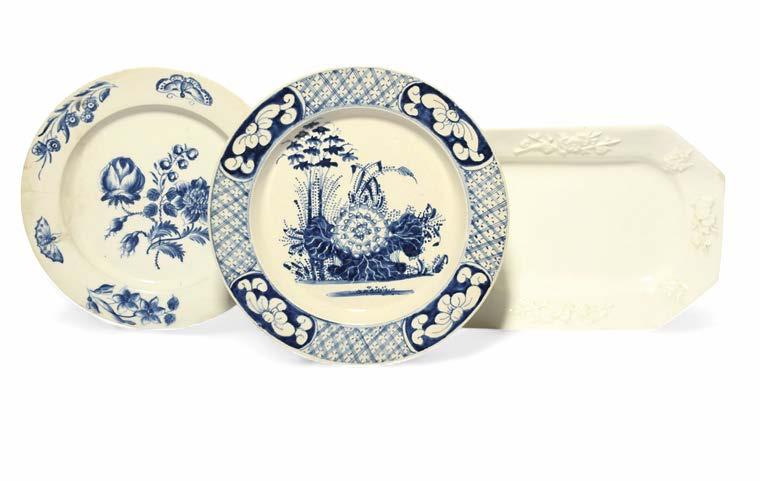

338 A pair of Bow blue and white leaf dishes, c.176570, the wells moulded with three tall sprigs of foxglove flowers, the handles formed from the curve of the leaf stalk, 26.5cm. (2)
Provenance: Rod Jellicoe.
£200300
339 Three Bow blue and white octagonal plates, c.1765, painted with a Chinese pagoda landscape, the rims with four repeated flower sprays, the undersides with seaweed tendrils, small rim chips, 23.5cm. (3)
Provenance: Rod Jellicoe.
£300500
Cf. Elizabeth Adams and David Redstone, Bow Porcelain, p.169 for a charger in the same design.


340 A rare Samuel Gilbody (Liverpool) dish, c.175860, the elongated octagonal form painted in underglaze blue and highlighted in gilt with two figures meeting on an arched bridge in a Chinese island landscape, a few small rim chips, 22cm. £150250
Provenance: Rod Jellicoe.
341 A Liverpool blue and white shaped dish or charger, James Pennington or Richard Chaffers, c.1765, painted with tall willow trees and large peony issuing from holey rockwork, the shaped rim with four flower sprays, 33.8cm. £150250
Provenance: Rod Jellicoe.
Cf. Maurice Hillis, Liverpool Porcelain, pl.4.98 for the same shape in Pennington’s porcelain, pl.5.71 for a Chaffers’ mug in the same pattern.
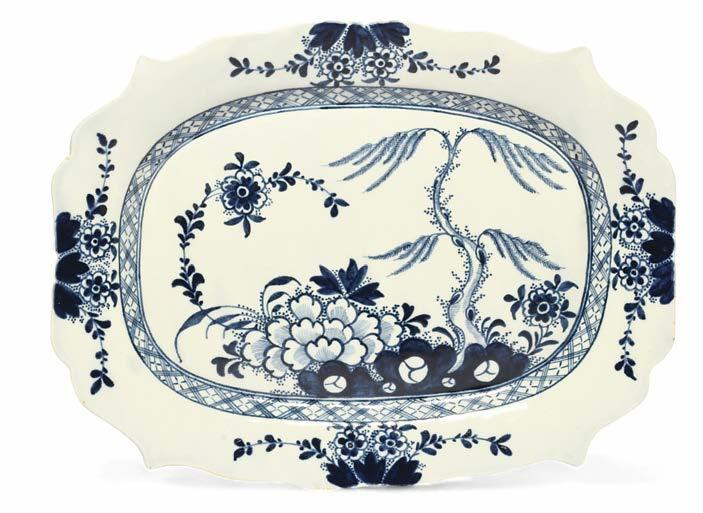

342 Three pieces of Liverpool blue and white porcelain, c.176070, including a Philip Christian spoon tray painted with a bird perched on a flowering peony spray, a Pennington’s asparagus server painted with a flower spray, and a shellshaped pickle dish printed with Chinese figures in a garden setting, the spoon tray broken and restuck, 15cm max. (3) £100200
Provenance: Rod Jellicoe.
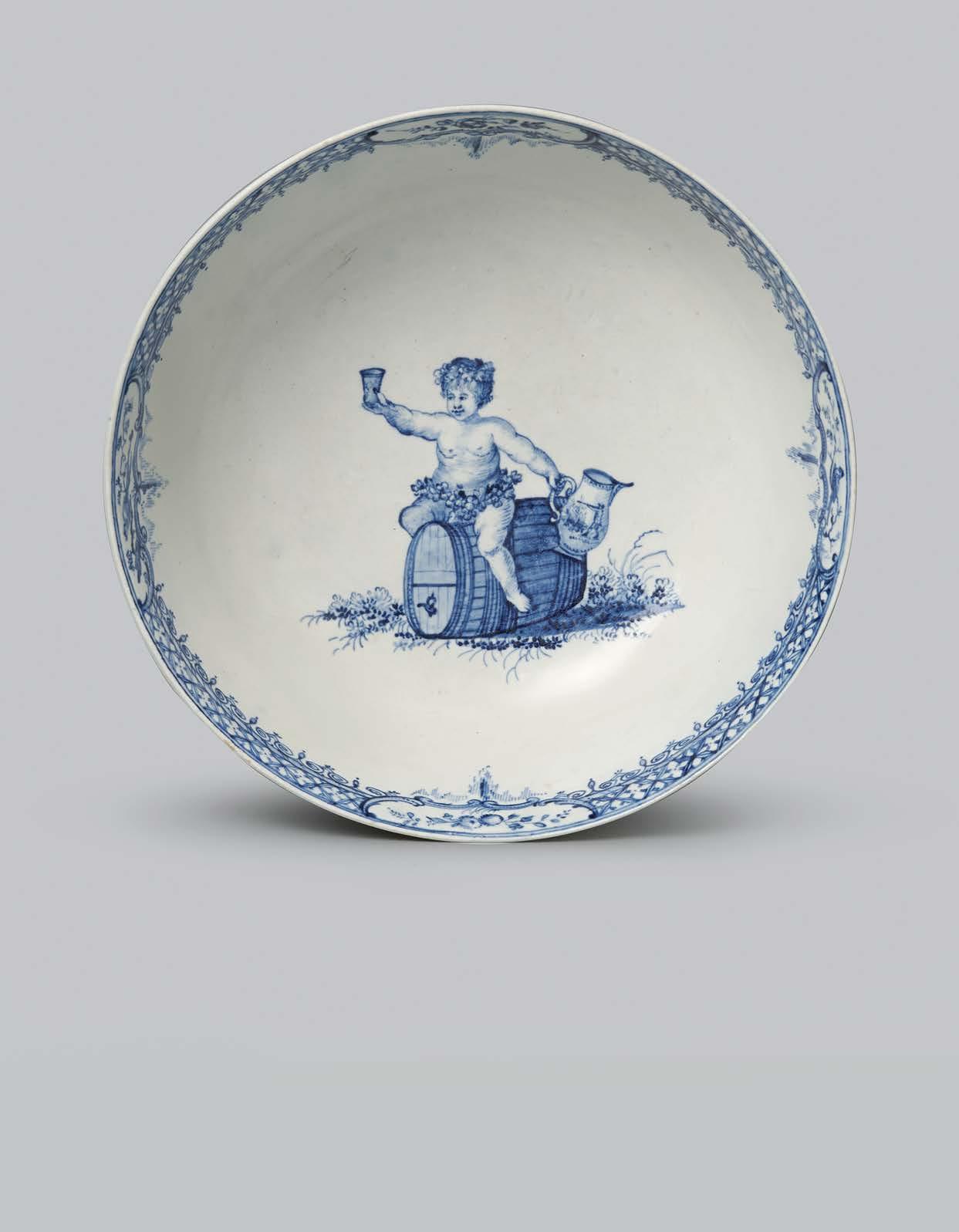
343 A good John Pennington (Liverpool) blue and white punch bowl, c.1780, the interior painted with the infant Bacchus sitting astride a barrel and holding a cup of ale aloft, a blue and white jug in his left hand bearing the same pattern as the bowl’s exterior, a hunter aiming his gun at a group of game birds in a rural landscape, the interior rim with bird and flower vignettes reserved on a formal trellis border, 22cm dia. £1,0001,500
Provenance: Rod Jellicoe. Formerly the Walton Temple Collection. With Klaber & Klaber, 11th September 1980.
This bowl relates to a group of shipping bowls with similar exterior decoration, illustrated by Maurice Hillis in Liverpool Porcelain, figs. 8.33-8.43. Similar dated pieces made for shipping or trade families in the vicinity bear similar high quality painting.


344 A pair of early Bow blue and white plates, c.1755, painted to the wells with two Chinese figures before buildings and trees, the rims with three sprays of flowering peony, painter’s numerals 19 and 17 to the bases, a restored rim crack to one, 23cm. (2) £200300
Provenance: Rod Jellicoe.

346 A Lowestoft blue and white teabowl and saucer, c.1765, painted with the Dragon pattern, a small Worcester teabowl and saucer, a Bow teacup and an English porcelain small bowl, all painted with the Dragon pattern, a broken rim section to the bowl, the teacup lacking its handle, 13.8cm max. (6) £300500
Provenance: Rod Jellicoe. The small bowl formerly in the Gilbert Bradley Collection.

345 A rare Derby blue and white rouleau vase, c.176568, the cylindrical form painted in imitation of a Chinese original with birds and butterflies in flight above flowering plants issuing from rockwork, the shoulder with a trellis border, a few small nibbles to the foot, 14cm. £500800
Provenance: Rod Jellicoe. Formerly the Eric Manson Collection.
Exhibited: Simon Spero, 2012, no.39.
This shape is otherwise unrecorded in English porcelain and possibly copies a Meissen original deriving from a 17th century Chinese form. In his 2012 catalogue, Spero posits the theory that the vase could have been made as a replacement for a small garniture, since Derby specialised in replacements for Continental services at the time.

347 A leadglazed Staffordshire blue and white coffee pot, c.178090, the baluster body painted with a low hut beside tall rockwork, the spout elaborately moulded with a mythical beast, and a large silvershaped dish painted with a figure fishing from a promontory behind rockwork, some chipping, the coffee pot’s cover lacking, 33cm max. (2) £150250
Provenance: Rod Jellicoe. The coffee pot formerly in the Watney Collection.

348 A pearlware nursery or child’s mug, c.1780, painted with a dog standing in a landscape beneath a scroll inscribed ‘For my dear Boy’, possibly painted by Robert Allen of Lowestoft, with a miniature pearlware teapot and cover painted in blue with a pagoda scene, the mug 6.5cm high. (3)
£150200

Provenance: Rod Jellicoe. The mug formerly with Garry Atkins.

350 A large Stefan Nowacki (Derby) cabinet mug, 2nd half 20th century, painted with ships at sea reserved on a turquoise ground with gilt foliate scrolls, signed, red monogram mark to the underside, 12cm high.
Provenance: Rod Jellicoe.
£100200
349 An English porcelain scent bottle, c.181520, probably Derby or Chamberlain’s Worcester, of flattened form, painted to one side with figures in a European landscape, the reverse with similar decoration in puce camaieu, within a dark blue border, 12.3cm.
Provenance: Rod Jellicoe.
£5080

351 A Sèvres coffee can (gobelet litron), date code for 1789, decorated with monogrammed initials MP in gilt and pink roses, within blue and gilt dots bands flanking stylised flower sprays, date code MM flaking interlaced Ls mark above painter’s mark jP, 6.2cm.
Provenance: Rod Jellicoe.
£150200

353 A collection of New Hall and other teawares, late 18th/early 19th century, decorated with formal floral patterns and chinoiserieinspired designs, including three teapots and covers (one Miles Mason), eight milk jugs of varying form, three plates, a small bowl, 21 teabowls, one teacup, five coffee cups, two coffee cans and 11 saucers. (58)
£150250
Provenance: Rod Jellicoe.
352 A New Hall part tea service, c.1800, the fluted forms decorated in pattern 83 with small panels of pink roses within gilt festoons, painted pattern numbers, a rim section of the slop bowl broken and restuck. Comprising: a teapot and cover, a milk jug, a slop bowl, four cake plates in two sizes, ten teabowls, ten coffee cups and nine saucers. (37)
Provenance: Rod Jellicoe.
£100200

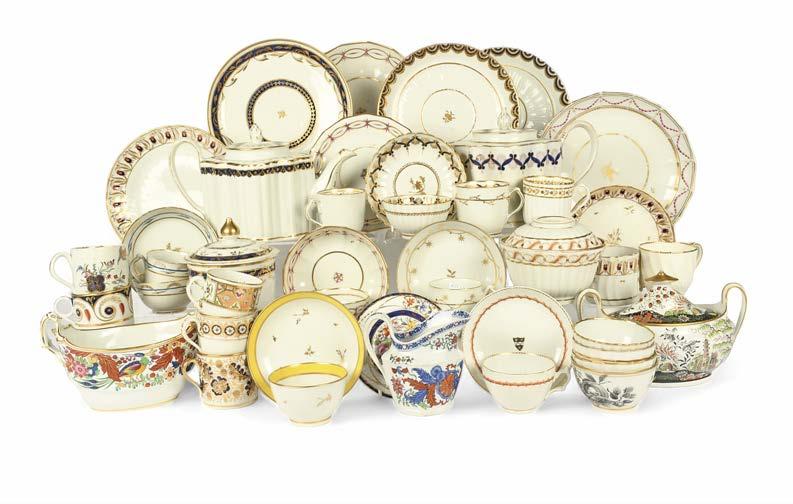
354 A collection of mostly New Hall teawares, c.17851810, variously decorated with formal borders and stylised foliate designs, including a rare teapot with rosette feet in a variation of pattern 154, another teapot and cover, a sucrier and cover in pattern 943, a fluted sucrier and cover in pattern 142, another sucrier and cover, a Barr Worcester sucrier, six plates, a teapot stand, a milk jug, an armorial cup and saucer, eight teabowls, six coffee cans, eight coffee cups and seven saucers. (50)
Provenance: Rod Jellicoe.
£200300
355 A New Hall part tea service, c.1785, painted in pattern 20 with Chinese figures in a garden setting. Comprising: a teapot with cover and stand, a milk jug, a cake plate, a slop bowl, a coffee cup, four teabowls and five saucers. Together with another New Hall part service decorated with a lilac and gilt border, comprising four coffee cups, four teabowls and 11 saucers. (35) £300500
Provenance: Rod Jellicoe.


357 A group of Regency porcelains, c.180520, including a Nantgarw oval dish, a cabinet cup with cover and stand decorated with silver lustre, possibly Spode, a Coalport armorial plate, a Barr, Flight and Barr saucer dish with the letter J within a bold Imari design, a golddecorated Derby saucer, a New Hall milk jug with Classical figures, a similarly decorated teapot and cover, and a botanical teacup and saucer, some damages, 29.3cm max. (12)
£150250
Provenance: Rod Jellicoe.
356 A study group of English porcelain teawares, c.17901820, including a New Hall trio of coffee cup teabowl and saucer decorated with green and gilt flower swags, another trio with coffee can decorated in a Tobacco Leaf design, a rare Herculaneum teapot and cover of small size, a New Hall teapot stand with Warburton’s Patent decoration, a saucer dish in pattern 511, a coffee can and saucer in a panelled design, three ringhandled coffee cans, a small mug and a toilet pot and cover, some faults, 19.8cm max. (18) £150250
Provenance: Rod Jellicoe. The first trio formerly from the Watney Collection. The teapot from the Godden Reference Collection. The plate formerly with Mercury Antiques.

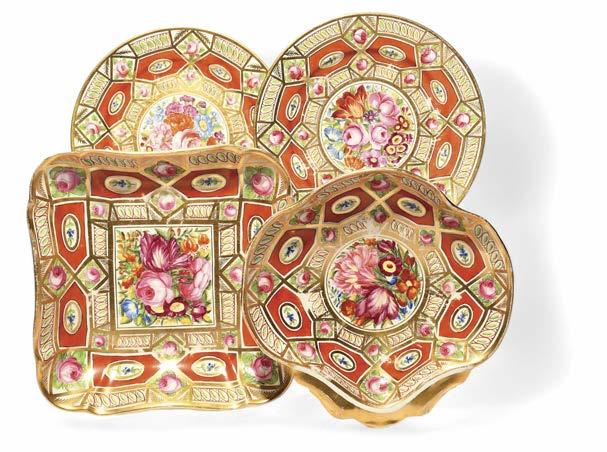
358 Four Coalport dessert dishes in the Church Gresley pattern, c.1820, richly decorated with small cornflower florets reserved in hexagonal red panels amidst smaller panels of pink rosebuds and stylized leaves, the wells with bold floral arrangements, comprising a square dish, a shellshaped dish and two plates, 26.5cm max. (4) £150250
Provenance: Rod Jellicoe. The shell-shaped dish with a paper label for the Lois Ruth Lorie Collection.
359 A Barr Worcester part tea service, c.1800, printed in red with vignettes of Classical figures and gods, reserved within gilt panels on a cracked ice salmon ground, centring around monogrammed initials ‘TJ’, incised B marks. Comprising: two cake plates, six tea cups, two coffee cans and seven saucers. (17) £250350
Provenance: Rod Jellicoe.


360 A Worcester tea service, c.178090, the reeded forms decorated in gilt with the Queen’s pattern. Comprising: a teapot and cover, a sucrier and cover, a tea canister and cover, a milk jug, a slop bowl, a cake plate, six teabowls and six saucers. (21) £100150
Provenance: Rod Jellicoe.

361 A rare New Hall Tobacco Leaf tea and coffee service, c.1812, richly decorated in pattern 856 with stylised flowers and leaves in shades of green, orange, white and gilt, reserved on a dark blue ground. red pattern numbers, some restoration to the coffee pot’s spout and the teapot’s stand. Comprising: a coffee pot and cover, a teapot with cover and stand, a milk jug, a slop bowl, a cake plate, six teacups, six coffee cups and six saucers. (26) £8001,200
Provenance: Rod Jellicoe.
This elaborate pattern derives from a popular and elaborate Chinese design produced for the Western market in the second half of the 18th century. Cf. Geoffrey Godden, New Hall Porcelains, p.251 where a service of the same shape is illustrated beside an original purchase invoice dated 1812.

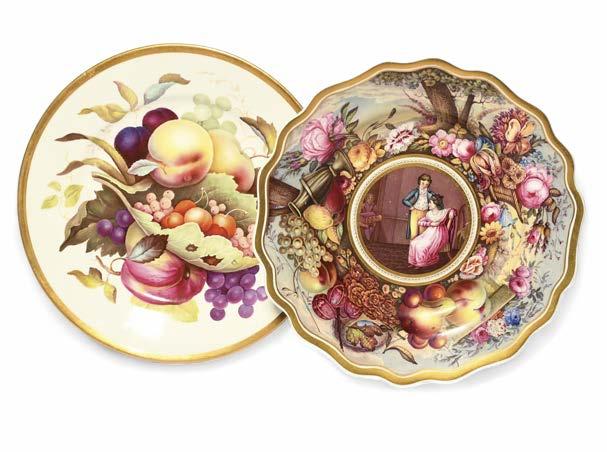
362 A Derby bough pot and cover, c.1795, of D shape, painted by John Brewer with a sailing vessel coming into a harbour, flanked by panels of pink roses, the sides with rams’ head handles, puce crowned crossed baton’s mark, gilt X mark inside the footrim, 24.3cm. (2) £150250
Provenance: Rod Jellicoe. Formerly the Kim Samuels Collection and the Cordwent Collection.
363 A Derby cabinet plate, c.1815, painted probably by Thomas Steel with a profusion of fruit including peach, cherries, plums and redcurrants, and an unusual plate painted with a central vignette of a Regency couple in an interior, within a wide rim of flowers, fruit, baskets and a bird’s nest, 22.5cm max. (2) £300500
Provenance: Rod Jellicoe.

364 A rare and important New Hall plate painted by Fidelle Duvivier, c.178590, the well painted with two figures on horseback between trees, the lobed rim with a formal panelled border in gilt and turquoise, 21cm.
Provenance: Rod Jellicoe.
£8001,200
This plate is believed to be part of a New Hall service made for John Daniel and sold to a Mr Gray (believed Thomas Cartlidge Gray of Hanley) in 1830 as part of a sale of Daniel’s effects. Cf. Geoffrey Godden, New Hall Porcelains, pp.166-173 for a detailed discussion of this service.

365 Five Herculaneum porcelain plates, c.1820, two finely painted with arrangements of English flowers, one with a ewer of vases and fruit, another with an upturned basket of flowers, the last with a basket of flowers beneath a tree and a low pedestal with a basket of fruit, all within elaborate gilt borders of convolvulus, 22cm. (5)
Provenance: Rod Jellicoe.

366 Two Herculaneum porcelain câchepots and stands, c.1810, the flared forms painted with figures before barns and cottages in rural landscapes, the waisted stands with gilt foliate bands, the larger pot and stand cracked, 17cm overall max. (4) £200300
Provenance: Rod Jellicoe.
£250350
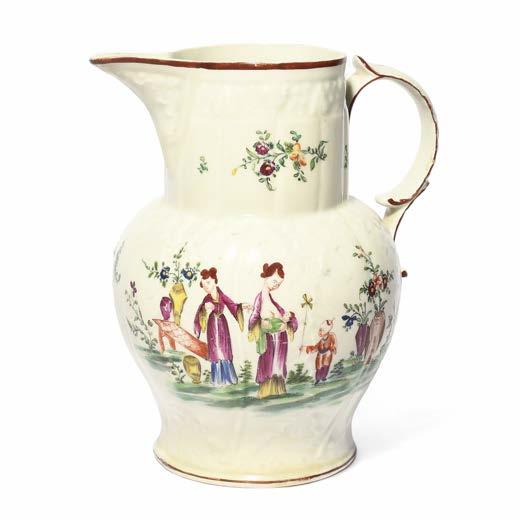
367 A New Hall style cabbage leaf jug, late 18th/early 19th century, painted in polychrome enamels with Chinese figures including a mother breastfeeding a baby, another figure holding a parasol before an ornamental fence, the decoration likely a later addition, some restoration to the foot, 24cm.
Provenance: Rod Jellicoe.
£100200
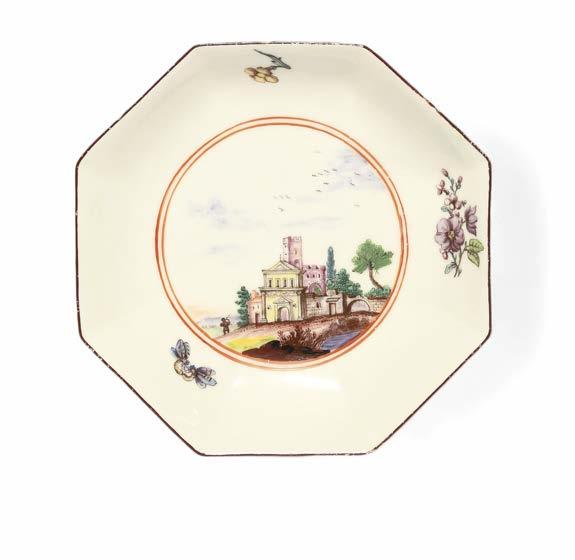
369 A Chelsea strawberry leaf sauceboat, c.175255, the deep form finely painted to the exterior with naturalistic flower sprays, moulded with sprays of alpine strawberry extending to form the feet and over the crabstock handle, brown line rim, red anchor mark, a 2cm chip to the rim, 16.5cm across. £300500
Provenance: Rod Jellicoe.
368 A Chelsea octagonal saucer, c.1752, painted in the Meissen manner with a central panel depicting a European landscape, within a double red line border and scattered naturalistic flower sprays, brown line rim, 12.5cm. £200300
Provenance: Rod Jellicoe.

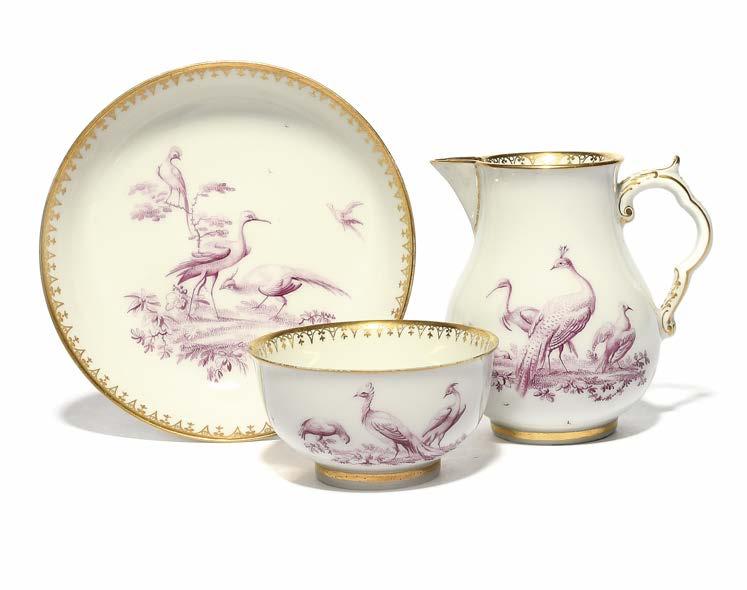
370 A Chelsea milk jug with teabowl and saucer, c.176064, finely painted in puce monochrome with a peacock and other fancy birds perched on and beside leafy branches, within an elaborate gilt border, gold anchor marks, 12.1cm. (3) £500700
Provenance: Rod Jellicoe.
Provenance: Rod Jellicoe.

£1,0001,500
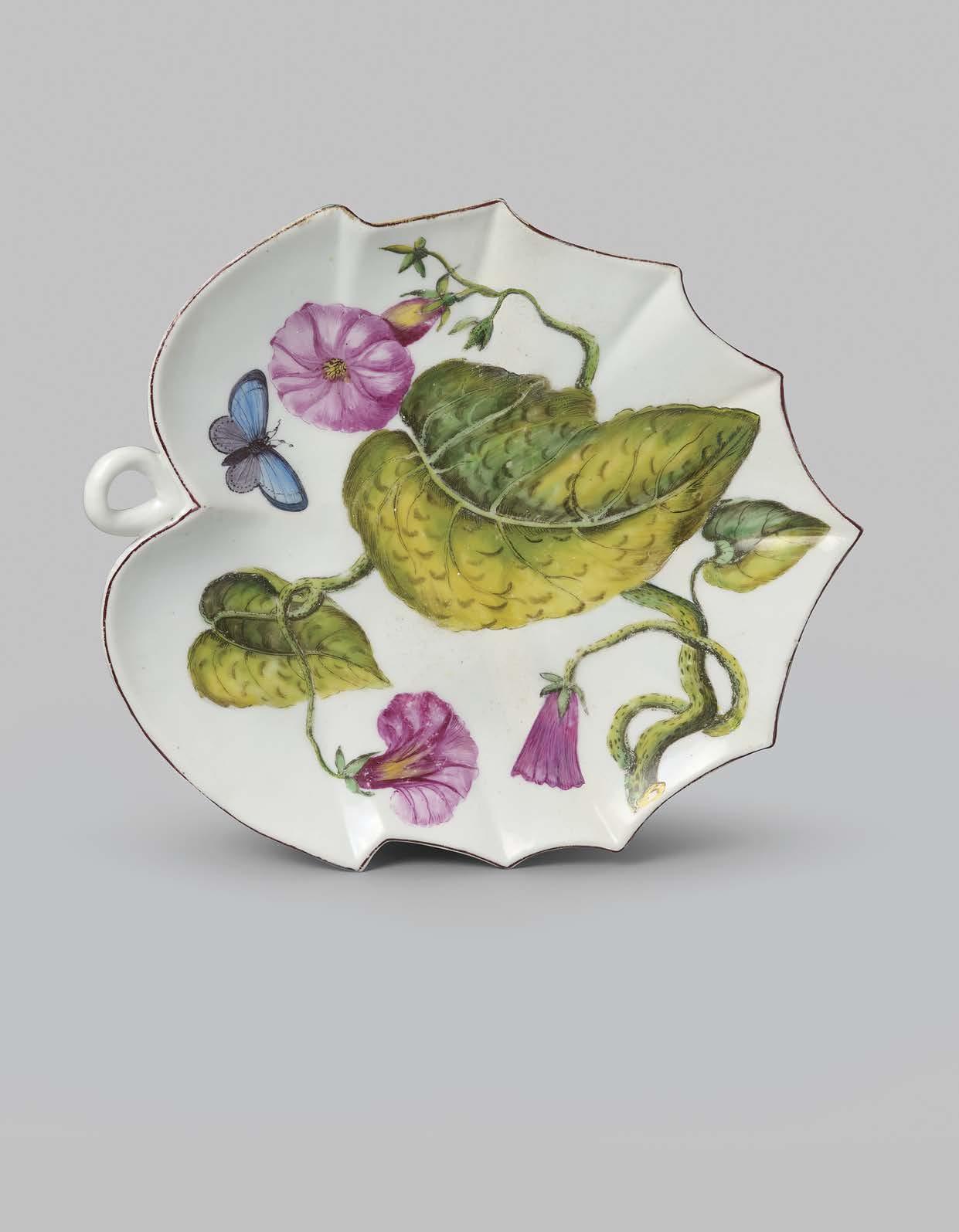
372 A Chelsea Hans Sloane leaf dish, c.1755, painted with a large botanical specimen of pink convolvulus, a blue butterfly to one side, brown line rim, the underside moulded with a twig and leaf base issuing from the handle, red anchor mark, restored cracks, 23.1cm.
Provenance: Rod Jellicoe.
£600800
Cf. Sally Kevill-Davies, Sir Hans Sloane’s Plants on Chelsea Porcelain, pp.112-113 for a plate with similar decoration derived from an engraving by G D Ehret.

373 A Chelsea Hans Sloane leaf dish, c.1755, painted with a fruiting spray of a fig tree and two ripe figs within a brown line rim, the underside moulded with a twig foot painted with leaves and a large caterpillar, restored rim cracks, 23cm. £8001,200
Provenance: Rod Jellicoe.
Cf. Sally Kevill-Davies, Sir Hans Sloane’s Plants on Chelsea Porcelain, pp.122-125 for a number of contemporary engravings and other Chelsea examples bearing fig decoration.

374 A near pair of Bow botanical plates, c.175660, the octagonal forms painted with moths and other creatures around a central floral specimen, brown line rims, 21cm max. (2)
Provenance: Rod Jellicoe.
The specimens possibly deriving from engravings by Pierre Vallet.
375 A pair of Chelsea botanical dishes, c.1756, painted with specimens of fruit amidst butterflies and other flying insects, the lobed rims with a brown line, and a Chelsea dessert dish painted with moths in flight around a fruiting gourd spray, feathered rim, brown anchor mark to the last, some wear, 27cm max. (3) £150250
Provenance: Rod Jellicoe.
£8001,000


376 An unusual Chelsea moulded dessert dish, c.176065, the rim moulded with a continuous band of fruiting grapevine, left in the white, and a Chelsea leaf dish, painted with small flower sprays in the Meissen manner, brown line rim, 25cm max. (2)
£300500
Provenance: Rod Jellicoe.
377 Three English porcelain mugs, c.175870, two Derby, one painted with Dishevelled birds, the other with banded hedges in puce monochrome, the last mug Worcester and painted with polychrome flower sprays beneath an underglaze blue border, 10.3cm max. (3) £250350
Provenance: Rod Jellicoe. The bird mug formerly in the Flowerday Collection and with an old paper label for Albert Amor.


378 A Chelsea dessert dish, c.1755, of lozenge shape, painted with exotic birds, a small William Reid (Liverpool) bowl painted with the Table pattern, a Longton Hall leafmoulded cream boat, two slop bowls, one moulded with prunus, and two Bow teabowls painted with famille rose flowers, some damages, 26.8cm max. (7) £200300
Provenance: Rod Jellicoe. One bowl formerly in the Boynton Collection.
379 Three Bow plates, c.176065, one octagonal, one lobed, the last of small shaped oval form, all painted in the Kakiemon palette with the Two Quail pattern, the lobed plate with some restored chips, 22.5cm max. (3) £150250
Provenance: Rod Jellicoe.
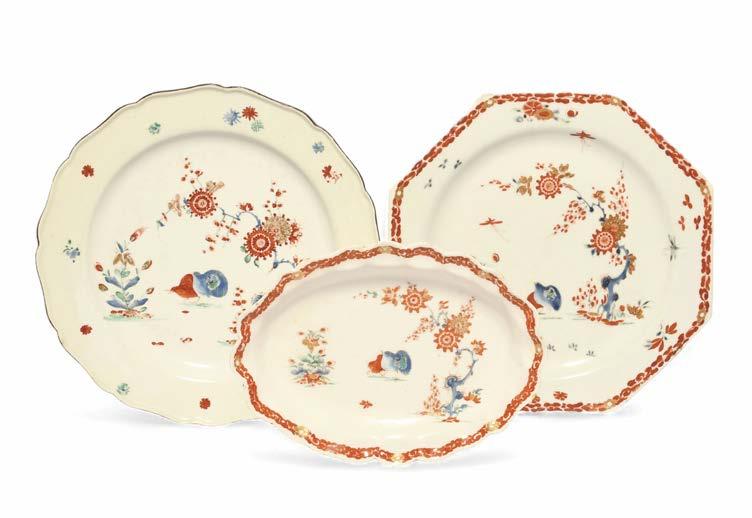

380 A Bow double leaf dish, c.1758, painted in Kakiemon enamels with the Two Quail pattern, the birds perched beneath and beside flowering plants, the shaped rim with a continuous leaf border in iron red and gilt, 29.2cm. £200300
Provenance: Rod Jellicoe. Formerly the collection of Mr and Mrs Gordon T Southam, Vancouver.
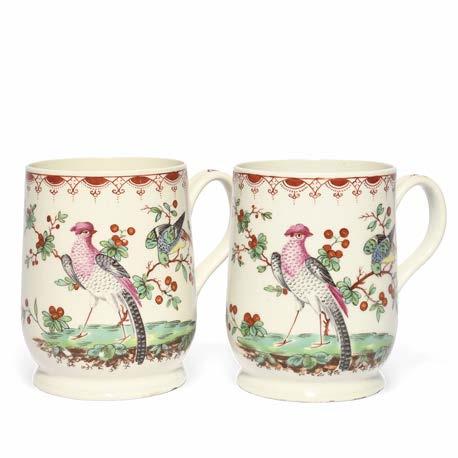

381 Two English porcelain sauceboats, c.176070, one Derby or low lobed form, painted with flower sprays, the other Liverpool with strap moulding and rococo panels painted with flowers, small rim chips to the Derby, 19cm across max. (2) £150250
Provenance: Rod Jellicoe.
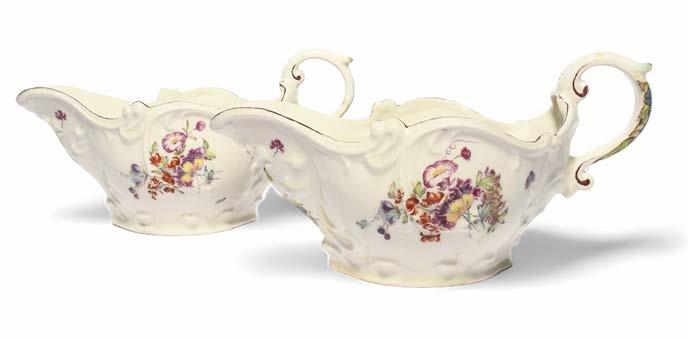
382 A pair of Bow mugs, c.1765, each painted with a fancy bird standing before berried branches, with two other colourful birds perched besides, the rims with a formal scroll border in iron red, a star crack to one base, 11.8cm. (2) £250350
Provenance: Rod Jellicoe.
383 A pair of Longton Hall sauceboats, c.1755, the generous forms with moulded scrolls and painted with flower sprays in the ‘Trembly Rose’ manner, the interiors each centred with a pink rose, small restorations, 21cm. (2) £400600
Provenance: Rod Jellicoe. Formerly the Watney Collection.
Exhibited: English Ceramic Circle, 2006, no.125.
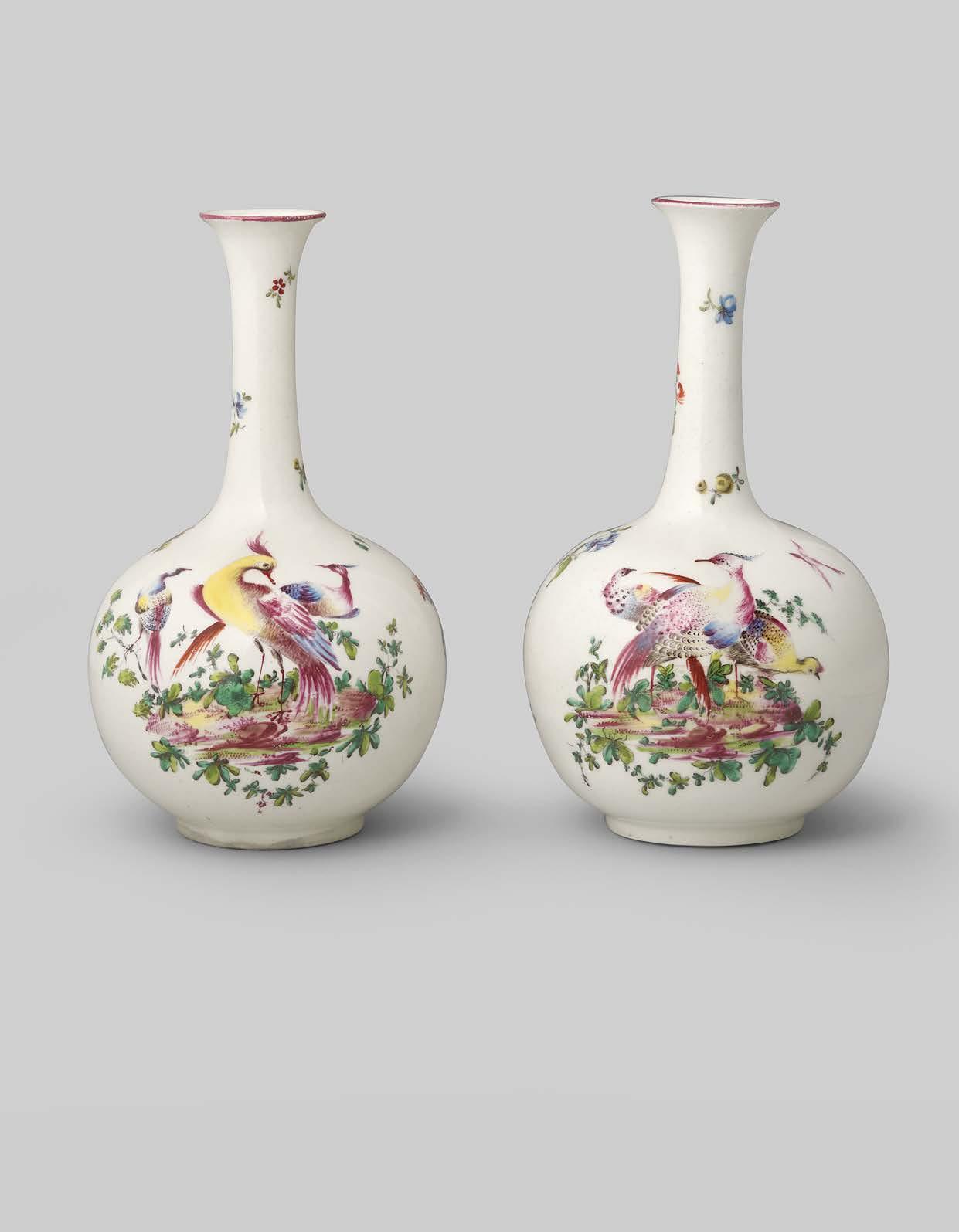
384 A rare pair of Bow bottle vases, c.175560, the globular bodies well painted with brightly coloured fancy birds, the reverses with loose flower sprays and scattered sprigs, the slender necks with everted rims decorated with a puce line, 19.2cm. (2)
£8001,200 Provenance: Rod Jellicoe.
385 Three Sèvres plates, date codes for 1776, each painted with a colourful bird perched on or below low leafy branches, the rims with floral sprays within gilt feuille de choux borders, blue interlaced Ls mark enclosing date letter Y, painter’s mark B and gilder’s mark W, small rim chips, 23.7cm. (3)
£250350

Provenance: Rod Jellicoe.
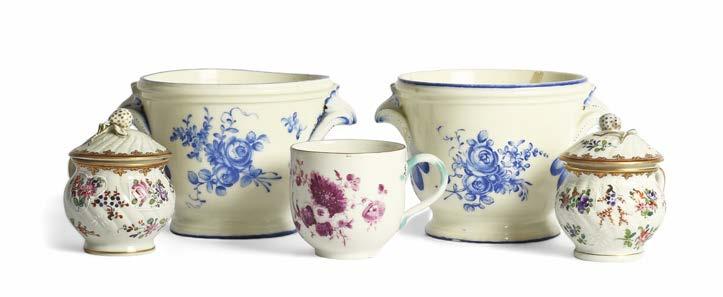

386 A pair of Chantilly glass coolers, c.1750, painted with flower sprays in blue monochrome, a pair of Continental porcelain custard cups or pots à jus and covers, and a Meissen coffee cup painted with puce flowers, one cooler broken and restuck, 10cm max. (7)
Provenance: Rod Jellicoe.
£100200
387 A Sèvres ice cup stand (plateau de tasse à glaces) and six ice cups, c.176070, the stand of twelvelobed form, painted with small flower sprays on a white ground within narrow blue borders with gilt intersections, 22.5cm. (7)
Provenance: Rod Jellicoe.
£1,5002,000


388 A small and rare Bristol reeded bowl, c.1775, with a band of finely fluted moulding, painted in polychrome enamels with Chinese figures in a garden landscape, brown line rim, blue crossed swords and X mark, 11cm dia.
£200300
Provenance: Rod Jellicoe.
Cf. Albert Amor Ltd., The Creed Collection of Plymouth and Bristol Porcelain, no. 65 for a similar bowl.
389 Two Bristol bowls and a saucer dish, c.177075, the larger bowl with osier moulding to the rim, the smaller of ogee shape, all three pieces painted with polychrome flower garlands suspended from gilt rings or enamel roundels, the bowls with blue X marks, the dish with a blue crossed swords mark, 18.3cm max. (3)
£250350
Provenance: Rod Jellicoe. The larger bowl with an old paper label for Andrew Dando of Bath.

390 Three rare Bristol ice cups and a stand, c.1775, after Sèvres, the cups of slender footed form, the stand of lobed form with a galleried rim, all painted with sprays of polychrome flowers including rose, daffodil and iris, blue X marks to two cups, one cup restored, the stand 21.5cm across. (4) £500800
Provenance: Rod Jellicoe. Formerly Robert Williams, 1974.
Very few Bristol ice cups are recorded and the stand is believed to be a unique survival.
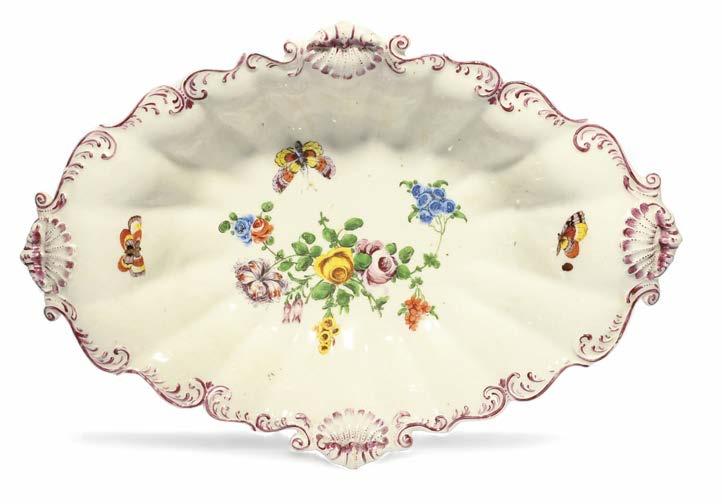
391 A rare Plymouth dish or centrepiece, c.176870, the oval form with deep fluted sides and four moulded shell handles within a feathered rim, painted with colourful moths around a central flower spray, broken and cleanly repaired, 31.5cm. £500800
Provenance: Rod Jellicoe. Formerly in the collections of F S Mackenna and Peter Stephens.
Exhibited: English Ceramics Circle, 1948; Albert Amor Ltd, 1978.
Illustrated: F. Severne Mackenna, Cookworthy’s Plymouth and Bristol Porcelain.
392 A Bristol mask jug, c.177275, with slightly tapering neck applied with a bearded mask to the spout, the whole painted with scattered flower sprays, blue X and 6. mark, and a Bristol sauceboat moulded with floral festoons and painted with garlands of flowers, some rim chipping, 16.8cm high max. (2) £300500
Provenance: Rod Jellicoe.


393 A rare Bristol pinecone moulded jug, c.1772, raised on a tall foot and painted with puce flower sprays, a Bristol ogee pot decorated in the Ludlow Service manner, a custard cup and cover with small gilt sprigs, and a cylindrical mug painted with polychrome flower sprays, 11.5cm max. (5) £250350
Provenance: Rod Jellicoe.
394 A Plymouth saucer, c.176870, painted in underglaze blue with a figure crossing a bridge in a Chinese landscape, highlighted in red enamel, and two Bristol saucer dishes, one of ogee form and painted in green monochrome with swags of flowers, the other in pale blue with floral posies, blue X marks, 20cm max. (3) £300500
Provenance: Rod Jellicoe.
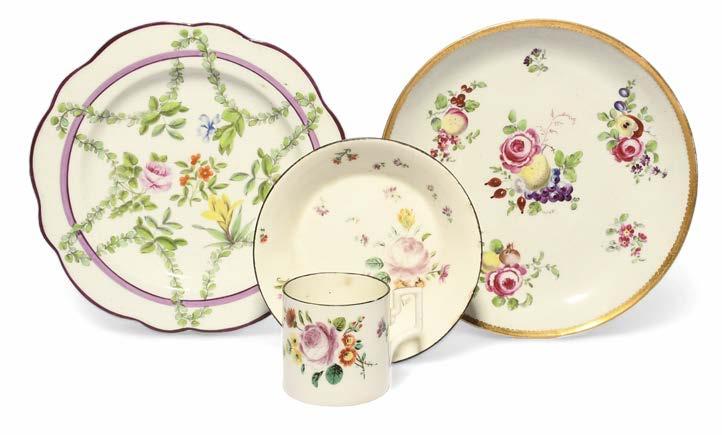
396 A group of seven English porcelain cups, c.175070, including a shaped Worcester cup with wishbone handle, a Bristol cup painted with flower garlands, two Bow cups with famille rose decoration, two Liverpool cups with Oriental flowering branches, and a tall Derby cup, minor faults, 7.8cm max. (7) £200300
Provenance: Rod Jellicoe.

395 A Derby plate, c.1785, painted with flower sprigs suspended from leaf swags interlaced around a puce ribbon, a saucer dish painted with vignettes of flowers and spotted fruits within a gilt dentil rim, and a coffee can and saucer painted with flowers, 21.3cm max. (4) £100200
Provenance: Rod Jellicoe. The Derby plate formerly in the collection of Mrs D MacCallum.
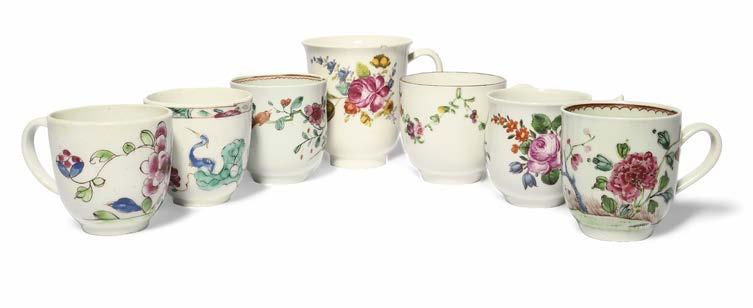

397 A good Worcester teabowl and saucer, c.175860, of hexafoil shape, finely painted in puce monochrome with two Chinese figures standing before a tall pagoda and spreading tree, a boat at sail in the background, and a Worcester coffee cup and saucer painted with the Valentine pattern, a pair of doves perched on a quiver of arrows beneath a breadfruit tree, the coffee cup cracked, 11.5cm max. (4) £300500
Provenance: Rod Jellicoe.
The Valentine pattern is a copy of a Chinese export porcelain pattern, drawn by Lieutenant Piercy Brett and used on a service for Commodore George Anson in 1743. Cf. The Victoria and Albert Museum, Accession No. C.337&A-1940, for a saucer in the monochrome pattern.

398 A William Reid (Liverpool) Masonic tankard, c.175661, the shaped barrel form printed in black with the arms of the Grand Lodge of England and other Masonic emblems, a large section broken and restuck, 12.4cm. £250350
Provenance: Rod Jellicoe. Formerly the Watney Collection. Exhibited: Roderick Jellicoe, William Reid Exhibition, 2000. Phillips, Liverpool Exhibition, 1997, no.3/163.


399 A Worcester campanashaped mug, c.1760, printed in black with the Magpie and Finch pattern, the birds perched on a low fence and leafy branches, the sides with butterflies and scattered flying insects, 11.3cm.
Provenance: Rod Jellicoe.
£300500

400 A small Worcester Scratch Cross mug, c.1755, of slight waisted form, printed in black in the Smoky Primitive manner with The Piper, the pastoral musician seated at the base of a tree and serenading his standing companion, incised line to the base, a faint hairline, 6.2cm. £300500
Provenance: Rod Jellicoe.
401 A Worcester teapot and cover, c.175658, printed in black with Les Garçons Chinois and a scene of a figure fishing from a tall scaffold, both after Jean Pillement, the low domed cover with a windmill and other buildings around a floral finial, restoration to the end of the spout and one petal of the finial, 19.5cm across. (2)
Provenance: Rod Jellicoe.
£200300
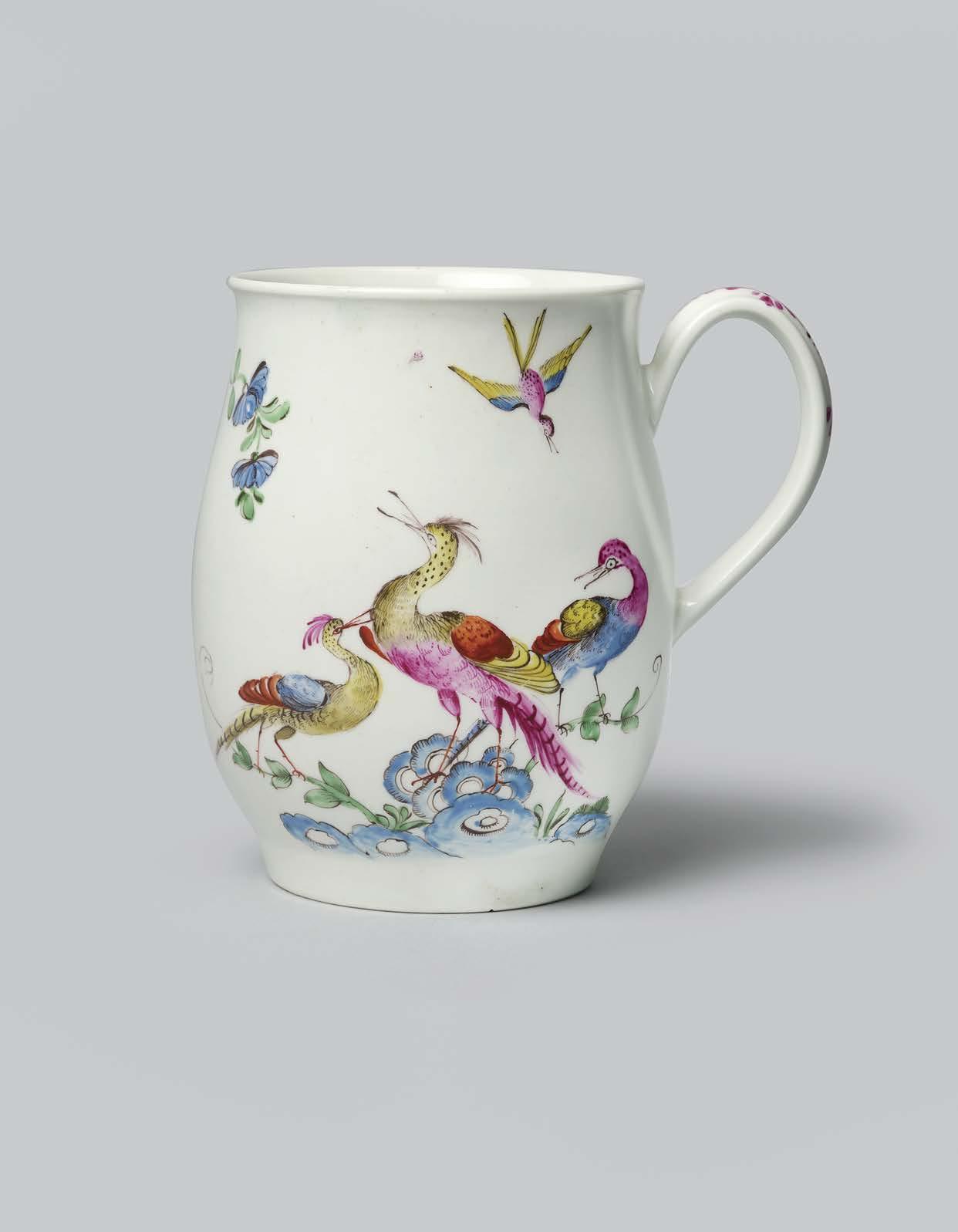
402 A good Worcester mug, c.175860, the barrel body with an everted rim, finely painted with three colourful longtailed birds with beaks agape, perched on holey rockwork, a smaller bird diving down on them from above, the reverse with a loose flower spray, the grooved strap handle with a puce motif, 12cm. £8001,200
Provenance: Rod Jellicoe. Formerly, the Ralph Kenber Collection, and the Zorensky Collection. Cf. H Rissik Marshall, Coloured Worcester Porcelain, pl.31, fig.674 for a similar example.

403 A rare Worcester coffee cup and saucer, c.176870, painted with shaped panels of fancy birds and smaller vignettes of insects, reserved on a yellow scale ground, 12.2cm. (2)
Provenance: Rod Jellicoe.
£1,0001,500
The yellow scale ground was copied from Meissen, produced for a very short time and few pieces survive. Cf. Bonhams, The Crane Collection of 18th Century Porcelain, 31st March 2010, lot 262 for a teacup and saucer with identical decoration.
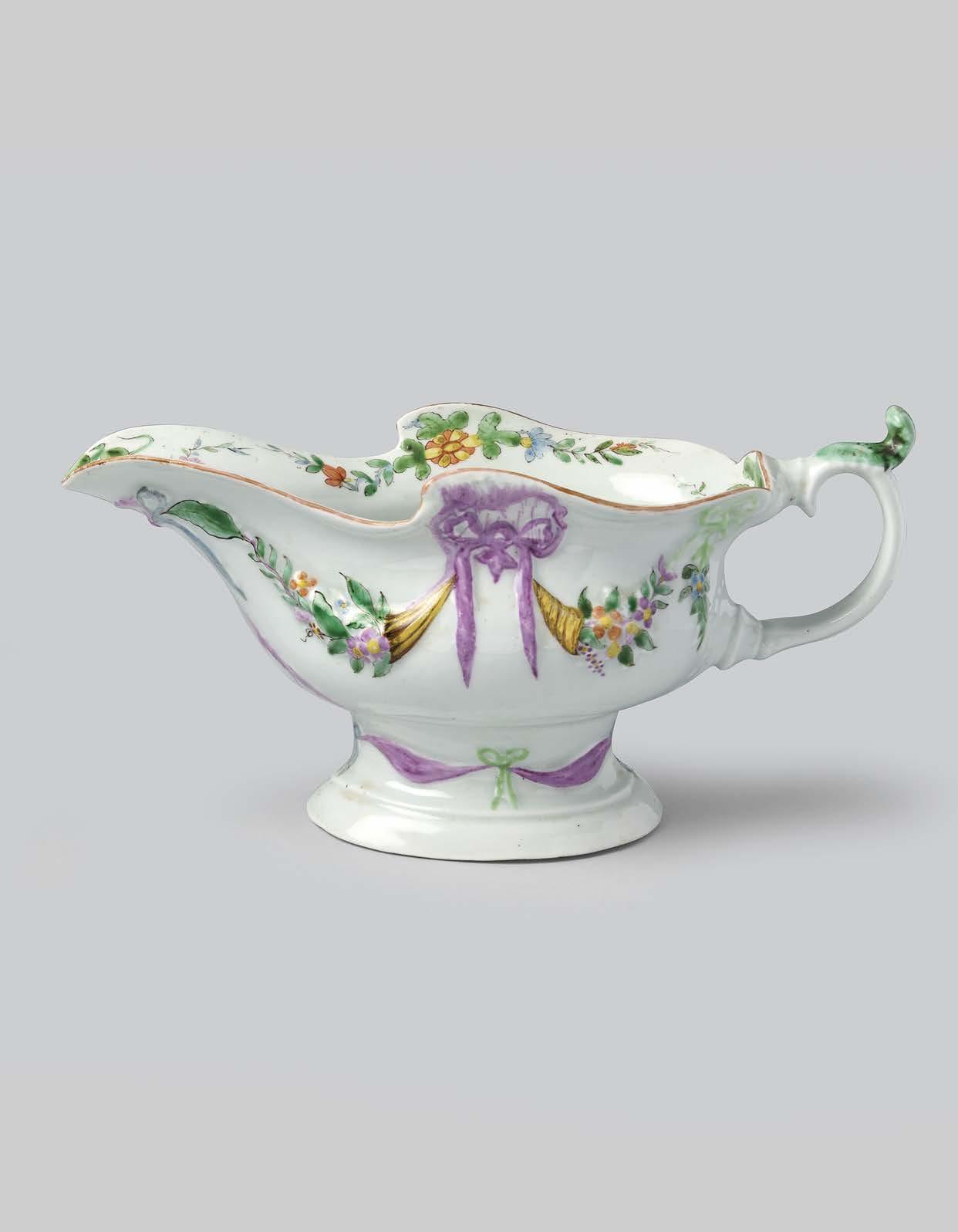
404 A large and early Worcester silvershape sauceboat, c.175253, the exterior moulded and painted with cornucopia swags issuing from tied puce ribbons, with further ribbons around the high foot, the interior painted with flower sprays in the famille verte palette, 22.3cm across. £2,0003,000
Provenance: Rod Jellicoe. Formerly in the A.T.Morley Hewitt collection, no. C201, sold at Sotheby’s 10 February 1959, lot 103. Also, the collection of Mr and Mrs D H Sidders, sold by Amor, October 1985. Also, the R. David Butti Collection, sold at Bonhams 10th May 2006, lot 1. At some juncture with Steppes Hill Farm Antiques, Kent. Exhibited: English Ceramics Circle, 1950. Also: Albert Amor Ltd., 1976, Dr John Wall 1708-1776, catalogue no. 7.

406 A Worcester trio, c.175660, comprising a teabowl, coffee cup and saucer, painted with a redcapped crane standing beside an ornamental fence, holey rockwork and flowering plants, within a red crowsfoot border, 12.2cm. (3) £150250
Provenance: Rod Jellicoe.
Cf. H. Rissik Marshall, Notes on the Origins of Worcester Decoration, Transactions of the ECC, Vol. 4, Part 3, pl.IVa for a teabowl and a Chinese saucer showing the decoration from which this pattern derived.

405 A Longton Hall coffee cup and saucer, c.175860, painted with the Goose pattern, with two birds painted in yellow and red standing beside rockwork issuing tall flowering plants, 11.8cm. (2) £250350
Provenance: Rod Jellicoe. Formerly the Tryhorn Collection.
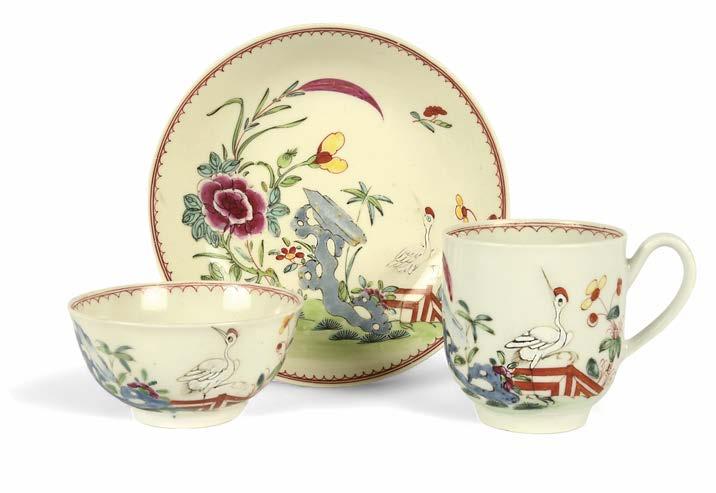
407 A good Worcester teacup and saucer, c.1770, decorated in the James Giles atelier with spiralling flower garlands converging on the centre of the saucer, with moths and other insects approaching the gilt dentil rim, crossed swords and 9 marks, with a Worcester saucer dish painted by James Giles with fancy birds, the saucer dish restored, 17.3cm max. (3) £500700
Provenance: Rod Jellicoe. Formerly the Raymond Dennis Collection, no. 54. Sold Woolley and Wallis, 25th February 2014, lot 105. Purchased by Dennis from Mary Wise at the Chelsea Antiques Fair on 18th September 1969.
Cf. Rissik Marshall, Coloured Worcester Porcelain, pl.16, no. 291 for a similar example, also Stephen Hanscombe, James Giles: China and Glass Painter, fig 6 for a milk jug decorated with the same pattern.
408 A Bow coffee pot and cover, c.1770, the baluster shape painted with two Chinese figures standing before tables in a garden setting, the reverse with a small boy feeding a bird beneath a tree, the spout with a floral motif, cracked, the base broken out and restuck, 20.5cm. (2) £150250
Provenance: Rod Jellicoe.
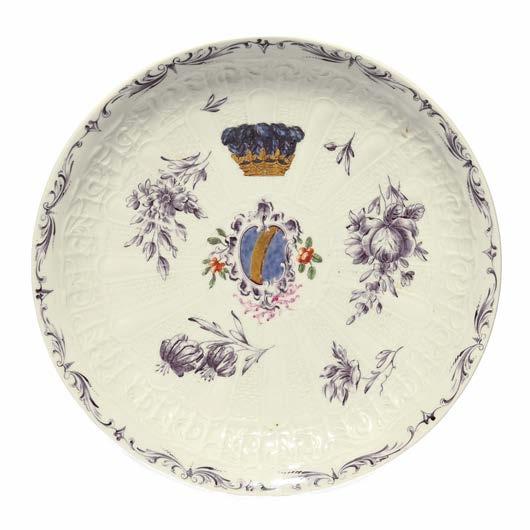
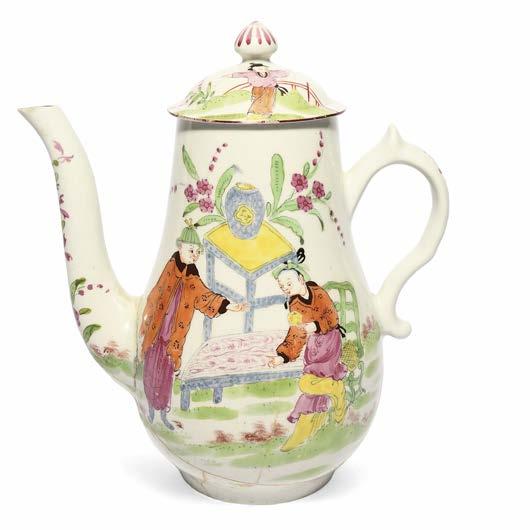
409 A good Worcester armorial saucer dish, c.1758, the moulded form painted in the Meissen manner with the arms of Viscount Howe of Langar, Nottinghamshire within flower sprays in purple monochrome, the rim with a repeated scrollwork design, 20.3cm. £500800
Provenance: Rod Jellicoe.
The crown crest of the Howe family sits above the barred shield of the Scrope family. The 1st Viscount Howe was the son of John Grobham Howe and Annabelle Scrope, the illegitimate daughter of the 1st Earl of Sunderland. George Augustus Howe, 3rd Viscount Howe was killed in the French and Indian War in July 1758. His title passed to his younger brother, later Admiral Lord Howe, 1st Earl Howe.
410 A good Worcester chestnut basket with cover and stand, c.1770, unusually decorated to the interior and stand with panels of polychrome flowers within shaped gilt cartouches on a blue scale ground, the basket’s exterior moulded with flowerheads in a honeycomb design, the crabstock handles issuing from applied flowers and leaves, square seal marks, 28cm. (3) £500800
Provenance: Rod Jellicoe.
Cf. Bonhams, The Zorensky Collection of Worcester Porcelain Part III, 22nd February 2006, lot 135 for a similar basket.
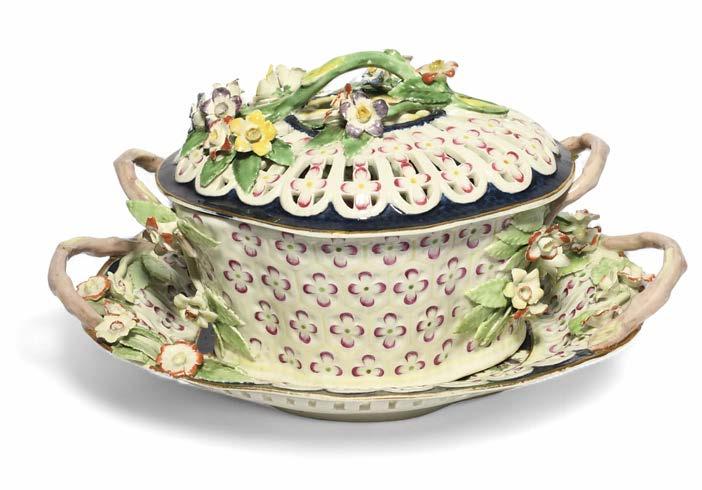

411 A garniture of three Worcester pot pourri vases, c.1770, the baluster forms in two sizes, painted with heartshaped panels of colourful exotic birds perched on and below leafy branches, within elaborate gilt borders on a mazarin blue ground, the shoulders pierced with a formal design, open crescent marks, covers lacking, some restoration to the necks of both small vases, 23.2cm max. (3)
Provenance: Rod Jellicoe.
£1,0001,500

£1,0002,000
412 A rare matched pair of Worcester bough pots, c.1768, of rococo moulded form, the front and sides with panels of fancy birds before leafy branches, one back with a panel of birds and flying insects, the other with a puce flower spray, all reserved on a blue scale ground, the recessed tops set with small holes around a central shaped aperture, square seal marks, a restored crack to one, 22.2cm across. (2)
Provenance: Rod Jellicoe.
The continued decoration to the reverse of the bough pots would suggest they were not intended to sit flush against a wall, although both have been modelled with suspension holes.



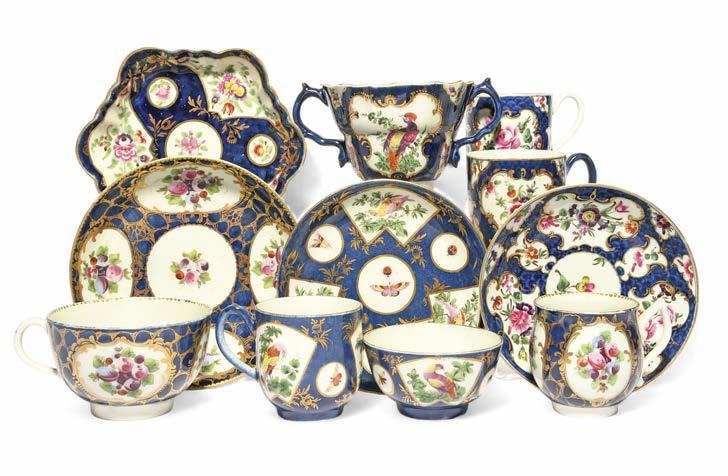
413 Three Worcester dessert dishes, c.176570, one of double leaf shape and painted with floral panels on a wet blue ground, another lozenge shape and painted with puce flower garlands on a gilt dot ground, the last a scallopedged plate painted with insects in an Oriental landscape within a wet blue border, 26.5cm max. (3)
£200300
Provenance: Rod Jellicoe. The plate formerly the Zorensky Collection.
414 Three Worcester dessert dishes, c.176070, of lozenge shape, one with panels of fancy birds, another with floral garland panels, within gilt cartouches on a blue scale ground, square seal marks, the last painted to the well with spotted fruit within a blue and gilt caillouté border, open crescent mark, 26.3cm max. (3) £200300
Provenance: Rod Jellicoe.
415 A pair of Worcester leaf dishes, c.176570, the large vine leaf forms painted with panels of flower garlands within gilt cartouches, reserved on a wet blue ground, square seal marks, 22.7cm. (2) £250350
Provenance: Rod Jellicoe.
416 A small group of Worcester tea wares, c.176070, including a trio painted with birds in fan panels on a wet blue ground, a matched trio with spotted fruit on a gilt caillouté ground, a coffee cup and saucer painted with flowers on a blue scale ground, another coffee cup, a chocolate cup and a hexagonal teapot stand, all with similar decoration, square seal and open crescent marks, 14.3cm max. (11)
Provenance: Rod Jellicoe.
£250350
417 A garniture of three Philip Christian (Liverpool) vases, c.176875, the baluster bodies painted with shaped panels of European flowers reserved on a wet blue ground, two of the vases with flared rims, one lacking a cover, 17.7cm. (3) £400600
Provenance: Rod Jellicoe. Formerly the Lois Ruth Lorie Collection.

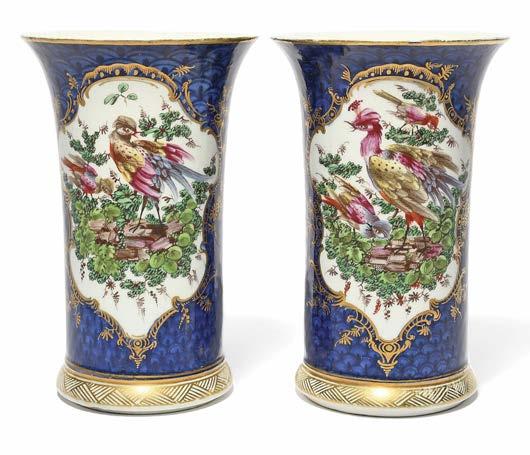
418 A rare pair of Bow beaker vases, c.1770, the flared forms painted with colourful ‘agitated’ birds standing on rocks among foliage, reserved within gilt cartouches on a blue scale ground, the feet with a gilt trellis border, blue A marks to the base, 17.5cm. (2) £6001,000
Provenance: Rod Jellicoe. Formerly in the collections of Ralph Kenber, John Alchin and Rous Lench. Sold at Christie’s, 30th May 1990, lot 380 (part).
419 A large Chelsea dessert dish, c.175860, the rim painted with four panels of colourful birds in flight and perched upon gilt trellis work, the well with scattered flower sprigs, reserved on a mazarin blue ground within a gilt dentil rim, gold anchor mark, some wear, 37.2cm. £200300
Provenance: Rod Jellicoe.


421 A large and rare Derby punch pot and cover, c.1760, well painted with dishevelled birds perched on and beneath low leafy branches, the cover formed with a lemon finial, the cover a replacement, 28cm across. (2)
£250350
Provenance: Rod Jellicoe.
Cf. Dennis Rice, Derby Porcelain: the Golden Years, pl. 102 for a similar example.

420 A Caughley trio and a coffee cup, c.1790, the fluted forms painted with backtoback pink roses between formal scrolls in blue, red and gilt, a Worcester teabowl and saucer of Warmstry fluted shape, decorated with a panelled Japan pattern, and a Derby coffee cup and saucer painted in green monochrome and gilt with millet sprays issuing from a banded hedge, 14cm max. (8)
Provenance: Rod Jellicoe.
£150250

422 A pair of Bow dessert plates, c.176570, painted with loose arrangements of English flowers and small scattered sprigs, within scalloped rims with a gilt dentil border, red anchor and dagger marks, small filled rim chips and retouching to the gilding, 18.5cm. (2) £150250
Provenance: Rod Jellicoe.

423 A rare Derby punch kettle, c.176065, the body well painted with dishevelled birds in flight and perched on and beneath leafy branches, the cover painted with moths and surmounted with a lemon finial, mounted with a wicker bound ormolu overhead handle, 26.5cm high. (2) £1,0001,500
Provenance: Rod Jellicoe.
Illustrated: Dennis Rice, Derby Porcelain: the Golden Years, col. pl. H. In his discussion of the kettle, Rice states: “Lady Schreiber in Volume I of her Journals refers to a visit on September 15th 1869 to Mr Hodges’ collection at Lyme where there was a ‘Chelsea tea Kettle (I should think unique), painted in birds’. At that time all early Derby pieces were attributed to Chelsea, and it is difficult to avoid the conclusion that the particular kettle to which Lady Schreiber refers and which she professes to covet was in fact the kettle illustrated here”.
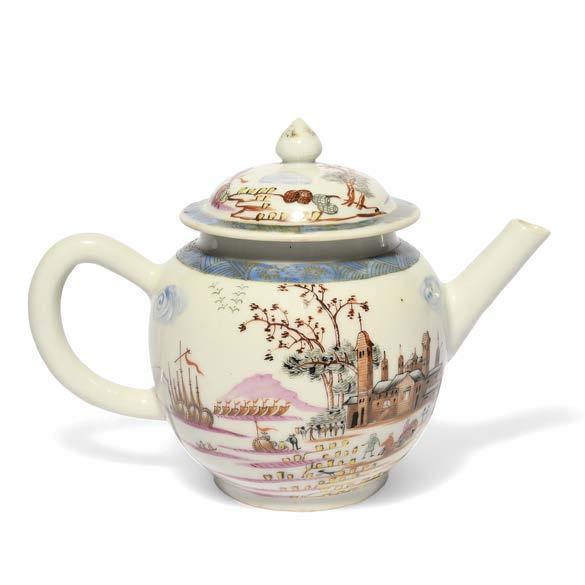
424 A Chinese porcelain teapot and cover, Qianlong (173695), painted to both sides with an extensive harbour scene depicting figures unloading boats with barrels and parcels before a Customs House, the shoulder and cover’s rim with a blue and gilt border, 19cm across. (2) £200300
Provenance: Rod Jellicoe.

426 Two Lowestoft vases from a garniture, c.1790, one of baluster form, the other a flared beaker vase, painted in the Chinese Export manner with stylised censer of flowers suspended from gilt ribbon, the rims with pink scale borders, the baluster vase lacking a cover, some restoration to the foot, 18.2cm max. (2) £400600
Provenance: Rod Jellicoe.
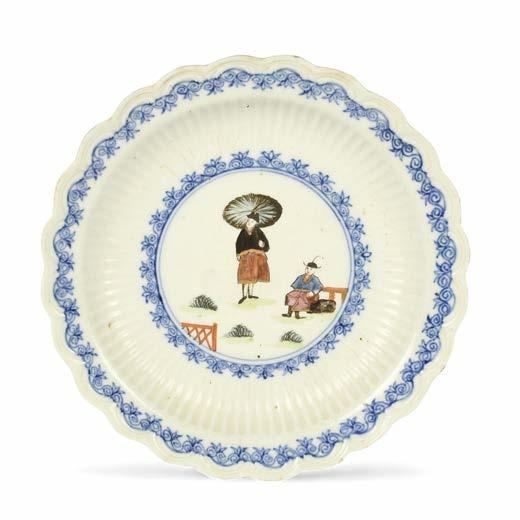
425 An unusual English porcelain plate, c.176575, probably Derby, the well painted in polychrome enamels with a Chinese figure holding a parasol, another seated beside a low table, the cavetto with a reeded band flanked by stylised scroll borders in underglaze blue, 17.4cm. £200300
Provenance: Rod Jellicoe.

427 A good Derby harvest jug, c.175860, painted with summer flowers and ripe ears of corn, the reverse with a single narcissus and a spray of blue flowers, 18.4cm. £200300
Provenance: Rod Jellicoe.
Exhibited: Klaber & Klaber, 75 Jugs Exhibition, 1993.

428 A Worcester teapot and cover, c.1758, the strapmoulded form with rococo scroll panels painted with flowers, the whole with scattered sprigs, some good restoration to the end of the spout, 18cm across. (2) £150250
Provenance: Rod Jellicoe.

430 A Plymouth small sauceboat or creamboat, c.1770, of leaf shape, painted with scattered flower sprigs, the handle formed from the stalk, raised on a low gadroon moulded foot, 14.2cm across. £200300
Provenance: Rod Jellicoe. Formerly the Peter Stephens Collection, and with Klaber & Klaber.

429 An early Worcester silver shape sauceboat, c.175253, the exterior moulded with elaborate panels and painted with colourful strutting birds in Oriental landscapes, the interior with a panelled famille verte border, 16.5cm across. £300500
Provenance: Rod Jellicoe. Formerly the Louise Coon Collection.

431 An early Worcester milk or cream jug, c.1753, the baluster body well painted in polychrome enamels with bamboo, peony and other flowering plants issuing from holey rockwork and a small fence, with elaborate scroll handle, 7cm. £6001,000
Provenance: Rod Jellicoe.
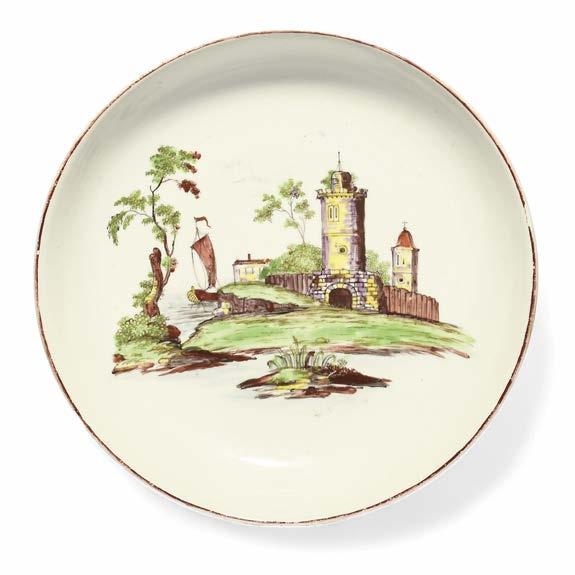
433 A Chelsea mug, c.1758, painted with a longtailed bird standing beneath a fringed tree beside an arrangement of fruit, the reverse with a bird perched on a berried branch, with a gilt dentil rim, 13.4cm.
£200300
Provenance: Rod Jellicoe.

432 A Longton Hall saucer dish, c.175658, decorated in the Castle Painter style with a turreted tower beside water with a sailing boat beside, brown line rim, a small chip to the footrim, 20cm. £600800
Provenance: Rod Jellicoe. Formerly the Tryhorn Collection and the F R Briggs Collection.
While John Hayfield is often the name put forward as the identity of the Castle Painter, the style is actually known to have been executed by several hands.

434 A Worcester dessert dish in the Sèvres style, c.1770, of lozenge shape, painted in the London atelier of James Giles with four feuille de choux panels containing colourful birds, around scattered flower sprays, 29.5cm. £200300
Provenance: Rod Jellicoe.

435 A Liverpool porcelain three vase garniture, c.175658, probably Richard Chaffers, including one baluster vase and two flared sleeve vases, all finely painted with a large bouquet of flowers including rose, dahlia, convolvulus, auricula and tulip, with scattered insects and a large grasshopper, with brown scalloped decoration to the rims, some damages, 24cm max. (3)
Provenance: Rod Jellicoe.
Cf. Maurice Hillis, Liverpool Porcelain, p.213, fig. 5.177 for a vase with similar decoration.
£7001,000

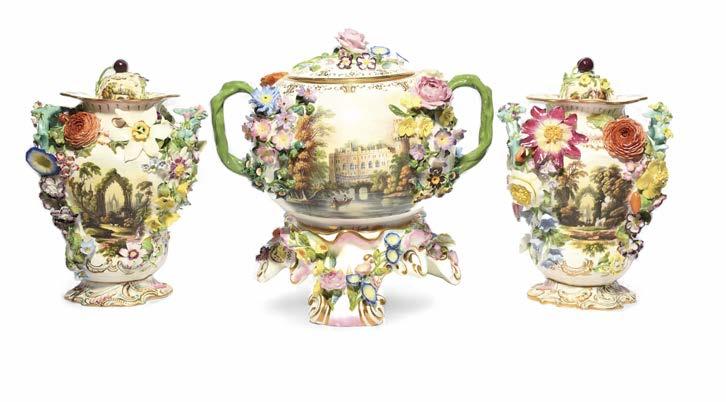
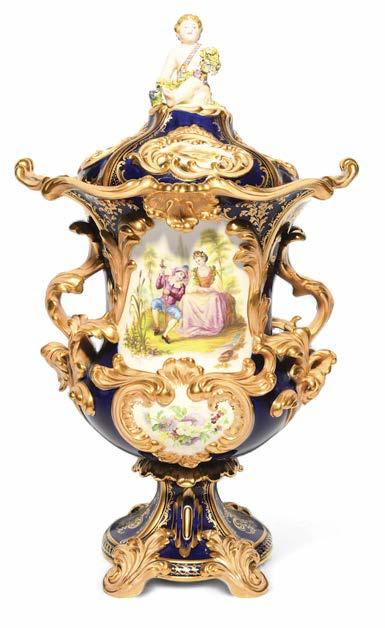
436 A garniture of three Derby pot pourri frill vases and covers, c.1770, painted in the manner of Richard Askew with puce monochrome scenes of putti at play, within applied rococo scrolls in turquoise and gilt, and large applied flowers in white, the necks and covers pierced with arrangements of small holes, some damages, 30.5cm. (6)
Provenance: Rod Jellicoe.
£250350
437 A garniture of three Minton vases and covers, 19th century, the central vase of Munster globe form and painted with a titled view of Warwick Castle, the two baluster forms with landscape scenes, the reverses with flowers, all applied with an effusion of flowers and small fruits, some damages and repairs, 28.5cm. (7)
£150250
Provenance: Rod Jellicoe.
438 A large English porcelain pot pourri vase and cover, 19th century, painted with a courting couple, the reverse with a landscape, within exuberant scroll work in peach and gilt on a blue ground, raised on a footed base, the pierced cover with a putto finial, 46cm. (2)
£100200
Provenance: Rod Jellicoe.
439 A Bow figure of a musician, c.1765, seated with a small drum between his knees and playing the flageolet, wearing a baggy cloth hat and a short pink cape, raised on a tall scrolled base picked out in puce, small losses and restorations, 20.3cm. £100200
Provenance: Rod Jellicoe.

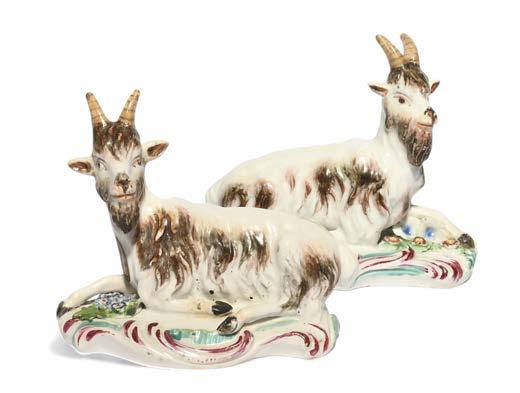
440 A pair of Derby figures of goats, c.1765, each recumbent with one foreleg outstretched and heads slightly turned, raised on low scrolled bases applied with flowers and picked out in turquoise and puce, some restorations, 11.5cm across. (2) £300500
Provenance: Rod Jellicoe.

442 A Longton Hall whiteglazed figure of Harlequin, c.1755, wearing a half mask and holding onto the brim of his hat with his right hand, the pad base applied with flowers and leaves, 12.3cm. £300500
Provenance: Rod Jellicoe.
Cf. Bernard Watney, Longton Hall Porcelain, fig. 40C for a polychrome example.

441 A small Derby figure of a Florentine boar, c.175860, modelled by Andrew Planché, in running pose with head turned to the left, his tusks bared, his coat decorated with pale rust patches, raised on an oval pad base edged in two shades of green, restoration, 5.5cm high. £400600
Provenance: Rod Jellicoe.
These models were first made in pairs of a larger size during the Dry-Edge period. The smaller figures followed a few years later.
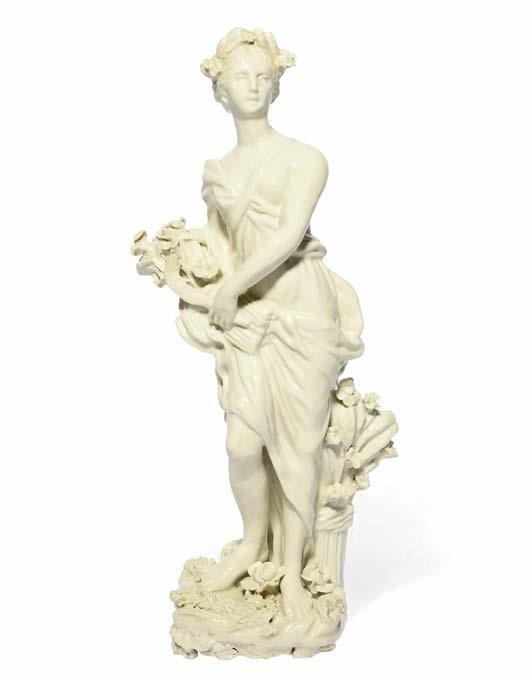
443 A whiteglazed porcelain figure of Ceres, second half 18th century, possibly French or Italian, emblematic of Summer, modelled as a Classical maiden holding a sickle and a stook of corn, draped in a loose robe and standing before a further corn stook on a low square base applied with flowers, small restorations to the flowers and leaves, 26.5cm. £300500
Provenance: Rod Jellicoe. Paper label for Albert Amor Ltd.
444 A rare pair of Bow candlestick figures of birds, c.1765, each modelled with a colourful exotic bird with long feathered appendages, perched on tall scrolled bases painted with flowers and landscape vignettes, each bird standing before flowering bocage, red anchor and dagger marks, 26.3cm. (2)
Provenance: Rod Jellicoe.

£8001,200

445 A rare Longton Hall figural sweetmeat stand, c.1765, modelled with a figure of Harlequin playing the bagpipes and seated between three large scallop shells painted with European flower sprays, raised on rocky feet highlighted in green and red and painted with small moths, 20.5cm high. £1,0001,500
Provenance: Rod Jellicoe.
Exhibited: Mint Museum, Charlotte, NC, October 2004 - January 2005.
The Harlequin figure is a copy of a Meissen original and also seen at Bow and West Pans.


446 A rare pair of small Derby figures of tigers, c.1820, with tails flicked across their backs, raised on low green bases with puce scroll decoration, a small amount of good restoration, 5cm high. (2) £400600
447 A pair of Derby figures of pugs, c.1765, each seated on its haunches with head slightly turned, wearing a red collar studded with bells, the scroll bases picked out in turquoise and puce, 6.6cm. (2) £600800
448 A pair of Derby figures of the Infant Seasons, c.1770, emblematic of Spring and Summer, a Derby figure of a shepherdess with a sheep, and a Derby figure of a young girl holding a magpie and leaning over a basket of flowers, some restorations, 16.5cm max. (4) £100200
449 Two Plymouth figures of the Seasons, c.1770, modelled as putti, the smaller emblematic of Autumn, wearing a grapevine diadem and holding a glass of wine, the other emblematic of Summer, holding two birds in a nest and standing beside a bee skep, both raised on scrolled bases picked out with puce detailing, restoration to the latter, 14.2cm max. (2) £300500




450 A Bow figure of Winter, c.1755, left in the white, modelled as an old bearded man in a hooded coat, holding his hands over a flaming brazier, some chipping, 13.2cm.
£100200
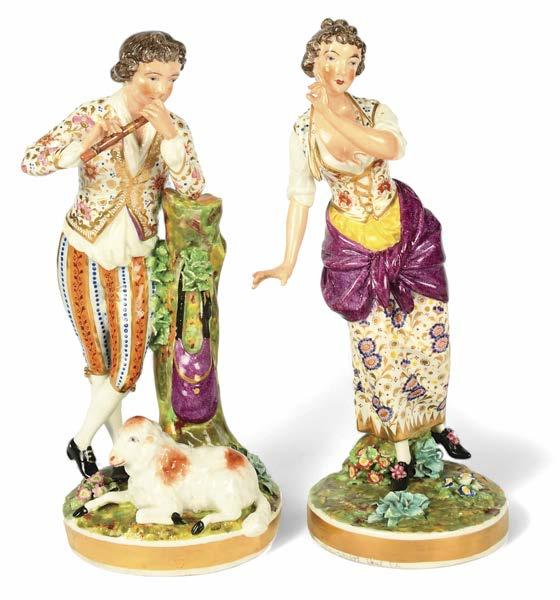
452 A pair of Bloor Derby figures of a shepherd and his companion, c.1820, he standing beside and leaning on a tree stump, playing the flute to his beloved, a sheep recumbent at his feet, she raising her left hand to her lips, both raised on circular bases, a little restoration to her fingers, 26cm. (2) £100200
The shepherd derives from a 16th century Florentine bronze sculpture of a nude youth, which in turn followed a Roman marble inspired by a 4th century Hellenistic bronze.
451 A Longton Hall figure of a nun, seated with a large prayer book or Bible resting in her lap, wearing a purple wimple, the remains of a possible candlestick stem behind, 13.5cm.
£200300

453 A Bow candlestick figure group of birds in branches, c.175860, modelled with two finches perched on a twobranch stump entwined with flowers and leaves, a recumbent dog looking up at the tree, with a rococo pierced sconce and drip pan mounted on a metal stem, small losses and repairs, 23cm.
£150250
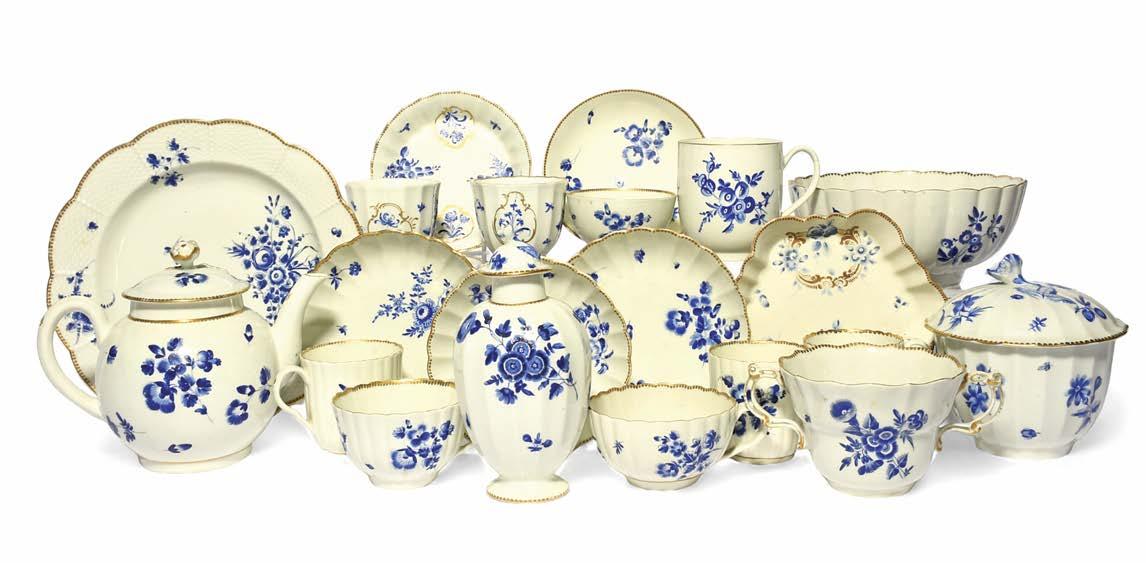
454 A combined Worcester tea service, c.177080, of varying fluted, reeded and plain forms, all decorated in dry blue with flower sprays and scattered sprigs. Comprising: a teapot and cover, a teapot stand, a tea canister and cover, a sucrier and cover, a shallow plate, a slop bowl, six coffee cups, two teacups, a teabowl, a chocolate cup, and five saucers. (24)

£200300

455 Four Worcester blue and white plates, c.176575, printed with fruit sprigs to the wells, the scalloped rims with small flower sprays, 22.6cm. (4)
£150250
456 Five Bow blue and white plates or dishes, c.175862, including a saucer dish painted with the Jumping Boy pattern, two octagonal dishes painted with bamboo and chrysanthemum within a panelled trellis border, a plate painted with an ornamental fence and rockwork and an octagonal plate in the same pattern, minor faults, 27.5cm max. (5)
£200300
457 Two Lowestoft blue and white trios, c.176575, one painted with flowering plants beside a fence and rockwork, another with a low hut in an island landscape, a teabowl and saucer painted with a pagoda pattern and a coffee cap in the same pattern with a trellis border, 12.8cm max. (9) £150250

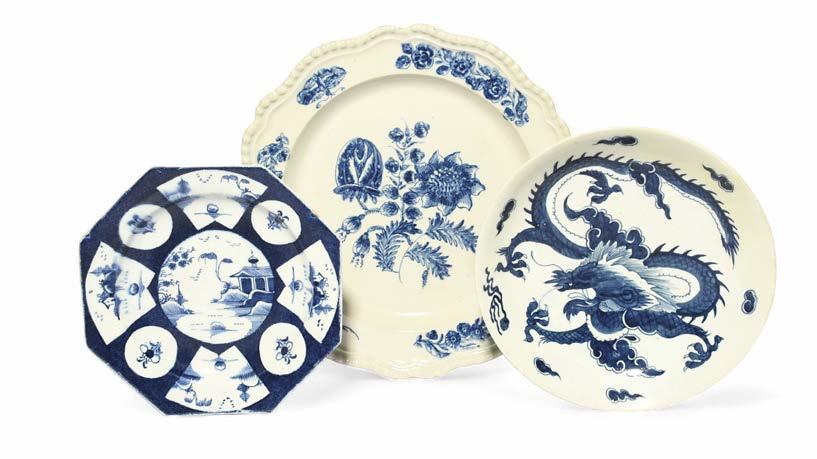
458 An unusual English blue and white plate, c.1800, painted with a central flower spray, the gadrooned silvershape rim with further flowers and butterflies, a small Bow octagonal plate with a fan panel design, and a Worcester saucer dish in the Dragon pattern, a repair of the rim of the latter, 24.2cm max. (3) £100200
The design on the first plate has been attributed to both Bow and Isleworth, however the shape is too late for this to be attributed to Bow.
459 A small collection of English blue and white porcelain, c.175270, including a Worcester butter tub with cover and stand printed with the Pinecone pattern, a teapot and cover in the Three Flowers pattern, a slop bowl in the Cannon Ball pattern and a punch bowl in the Mansfield pattern, a Chaffers bowl painted with a bird and flowers, and an early Bow bowl with plantain, 21cm max. (9) £150250
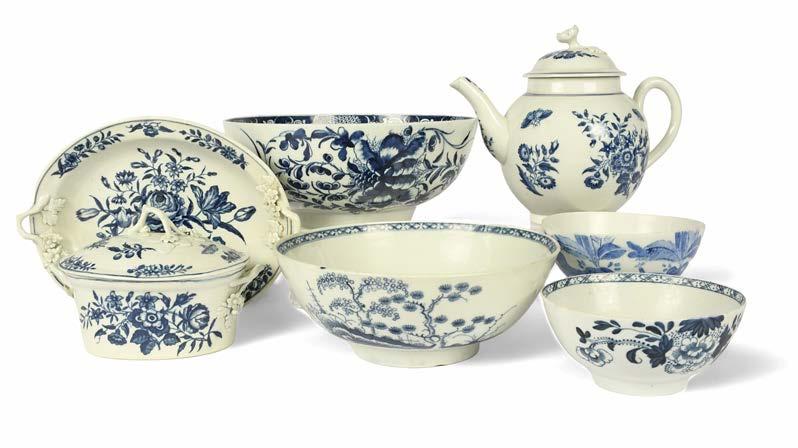

460 Four English porcelain blue and white pickle dishes, 2nd half 18th century, of leaf shape, two Worcester and decorated with the Pickle Leaf Vine pattern with grapevine and flower sprigs, one Lowestoft and painted with a branch of fruiting vine with a berry border, the last Derby and decorated with a rose and other flowers, 11cm max. (4) £100200

462 A Bow blue and white teabowl and saucer, c.175860, painted with the Golfer and Caddy pattern, an early Bow small mug painted in a bright blue with flowering plants and rockwork, and another small mug or coffee can painted with a bridge linking small islands, the teabowl cracked, 11.6cm max. (4) £200300
The saucer with a paper label for Albert Amor Ltd.
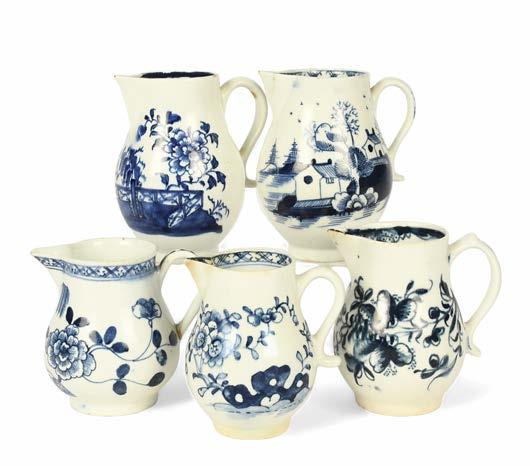
461 Five English porcelain blue and white milk jugs, 2nd half 18th century, Bow and Lowestoft, variously printed or painted with flowering plants, the Mansfield pattern, a fence pattern, and a pagoda landscape, minor faults, 9.5cm max. (5)
£150250
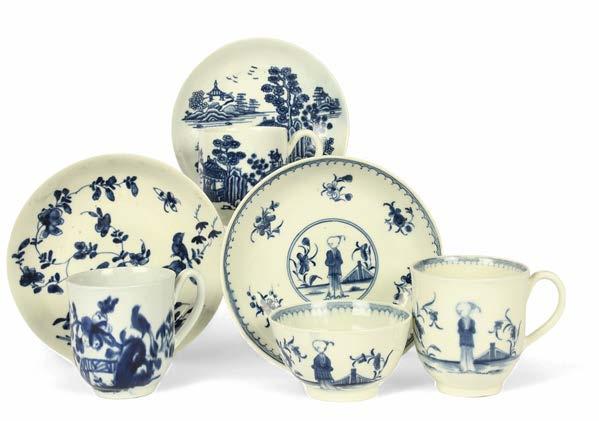
463 Two Worcester blue and white cups and saucers and a trio, c.175865, the trio painted with the Waiting Chinaman pattern, one cup and saucer with the Rock Warbler pattern, another printed with the Man in the Pavilion pattern, open and hatched crescent marks, painter’s marks to one, minor faults, 12.5cm max. (7)
£150200
464 Three Vauxhall blue and white saucers, c.175558, one painted with a Chinese lady standing behind a fence and talking to a figure seated the other side, another with a figure walking through an island landscape, the last with a figure in a boat before huts and a willow tree, 11.7cm max. (3) £200300
Provenance: the second formerly the Goss Collection; the last formerly the Watney Collection.
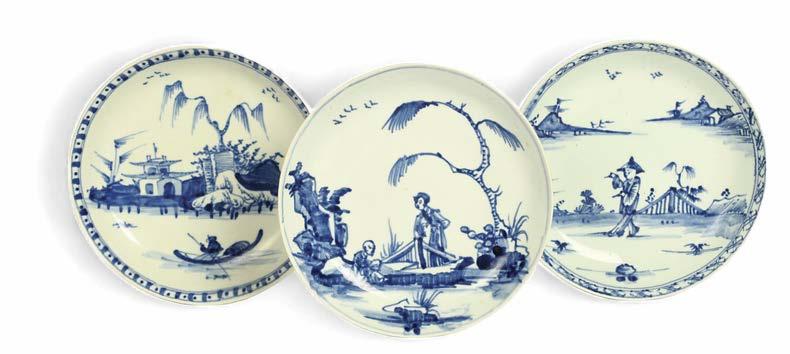

465 Four Worcester blue and white teabowls and saucers, c.176065, one printed with the Candle Fence pattern, one with the Man in a Pavilion pattern, one painted in the Prunus Root pattern, the other in a version of Lowestoft’s Robert Browne pattern, hatched and open crescent marks, 11.8cm max. (8) £250350
466 Three Lowestoft blue and white sauceboats, c.176570, moulded with floral panels and printed with flower sprays, the interiors with a peony spray and a trellis design to the spout, the larger with a hatched crescent mark, 19cm max. (3) £150250
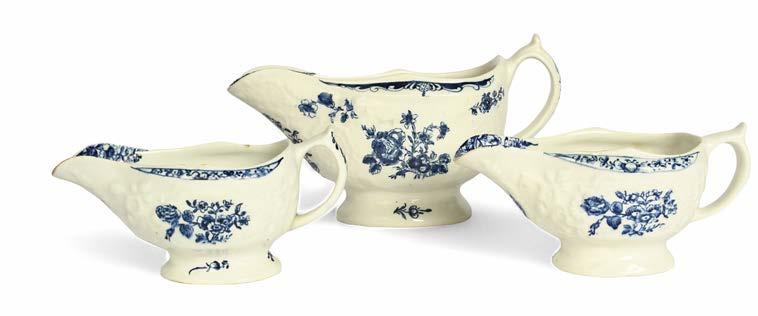
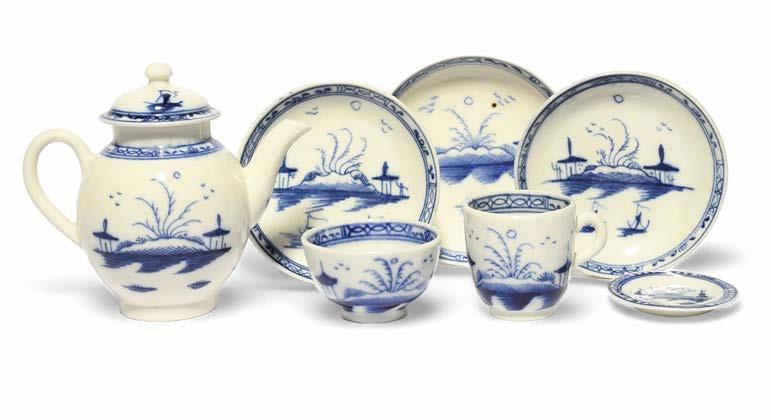
467 A small collection of blue and white miniature or toy Caughley porcelains, c.178090, including a teapot and cover, a teabowl, a coffee cup, three saucers and a miniature plate or stand, all decorated in the Island pattern, the last with an S mark, 9.5cm max. (8) £150200
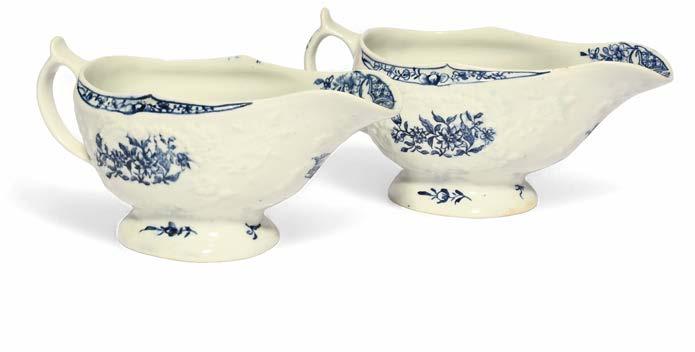
469 Three large Worcester blue and white mugs, c.176080, one painted with the Gardener pattern, a figure kneeling and digging with a trowel beside a dignitary seated at a table, one printed with the Plantation pattern, the last with the Parrot Pecking Fruit pattern, open and hatched crescent marks, minor faults, 15.5cm max. (3) £100200
Exhibited: Albert Amor Ltd, 18th Century English Chinoiserie Porcelain, 1990, no.44 (the Gardener pattern mug).
468 A pair of Lowestoft blue and white sauceboats, c.177075, moulded with floral panels and printed with flower vignettes, the interiors with further flower sprays and a trellis border, 15.7cm across. (2) £200300


470 Two pairs of Bow blue and white pickle dishes, c.1765, of leaf shape, the larger painted with a large grape spray on a blue ground, the smaller with growing vines, and a Lowestoft pickle dish of similar form with a berry border, 11.5cm max. (5) £200300
471 Two Lowestoft blue and white teabowls and saucers, c.177580, one printed with a figure on a bridge before a pagoda, the other with two peacocks perched on flowering branches, minor faults, 12.2cm. (4) £250350


472 A Worcester blue and white teabowl and saucer, c.1765, painted with the Gardener pattern, a Chinese figure digging the ground with a hand tool while a dignitary sits beneath a willow at a low table, a bruise to the footrim of the teabowl, 11.8cm. (2)
Provenance: formerly in the Zorensky Collection, no. Y.79.
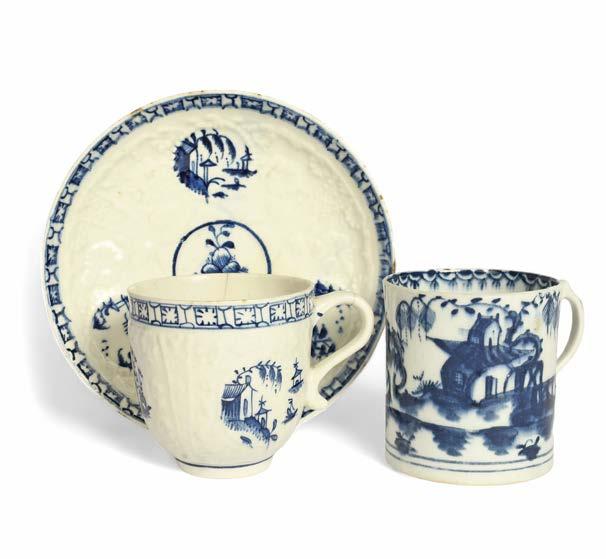
£300500

474 A Lowestoft blue and white trio, c.1768, comprising a teabowl, coffee cup and saucer, painted with a flower and bud spray with a small flying insect, within a formal dotted border, painter’s marks inside the footrim, minor faults, 12cm. (3)
£200300
Provenance: the cup and saucer formerly the Susi and Ian Sutherland Collection.
473 A Lowestoft blue and white coffee cup and saucer, c.176165, of Hughes type, moulded with three small panels painted with landscape vignettes, and a Lowestoft coffee can or small mug, painted with small boats in a Chinese island landscape, the interior rim with a berry border, rim cracks, 12.6cm max. (3)
£300400
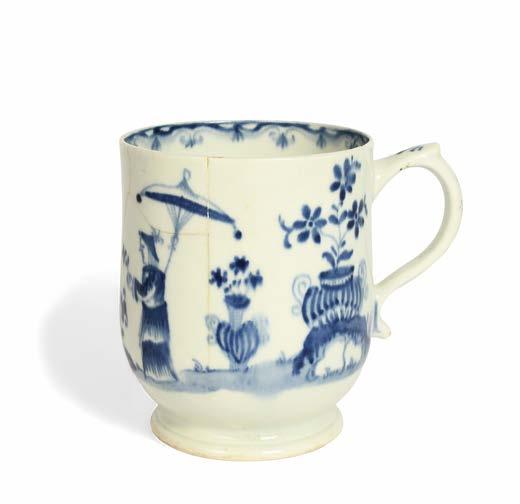
475 An early Lowestoft blue and white mug, c.176265, painted with a Chinese figure holding a parasol in a garden setting, the interior rim with a formal scroll border, a faint painter’s numeral inside the footrim, cracked, 9cm.
£300500
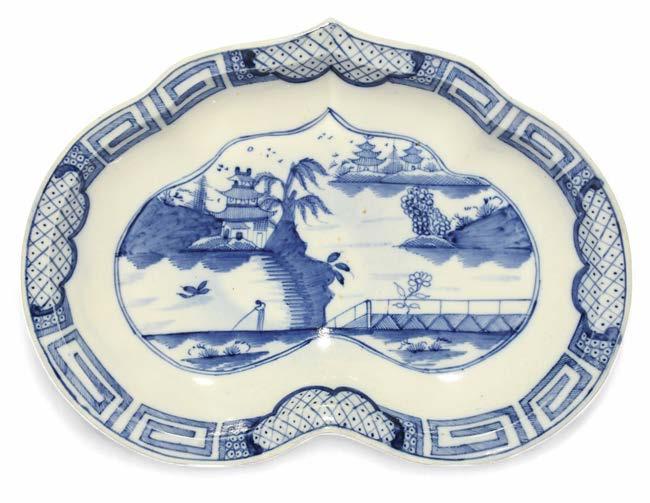
476 A Caughley dessert dish, c.178593, painted with the Weir pattern in a bright blue within a panelled trellis and Green key border, blue 8 mark to the footrim, 27.5cm. £100200
477 A rare Longton Hall blue and white sauceboat, c.175558, the generous form painted with a zigzag fence and pine tree beside a twostoreyed pagoda, the foot with lobed moulding, blue A mark, minor rim faults, 18cm across. £200300


478 A rare Worcester blue and white octagonal dish, c.175455, the elongated form painted with the TwoLevel Fence and Rock pattern, with twisted flowering branches issuing from holey rockwork and a zigzag fence, the underside with simple leaf sprigs, workman’s mark, 31.8cm. £200300
Exhibited: Simon Spero, 2002, no.39.
Cf. Branyan, French and Sandon, Blue and White Worcester Porcelain 1751-1790, No. I.D.27.
479 A Richard Chaffers (Liverpool) blue and white coffee pot and cover, c.1760, painted with a tall willow tree over a low hut and a figure in a sampan, with a trellis border, a small chip to the cover, 23.2cm. (2)
£200300


480 A Worcester blue and white water bottle or guglet, c.1760, painted with the Willow Bridge Fisherman pattern, a figure traversing an arched bridge with two further figures fishing from a sampan beneath, the reverse with a figure and a bird beside a small pagoda beneath pine, 25.3cm.
£100200
481 A rare Derby blue and white jug, c.1765, the generous body painted with a Chinese figure kneeling before a lady seated at a table, a further attendant standing beside a tall plant stand, the inside rim with a trellis border, 13cm.
£150250
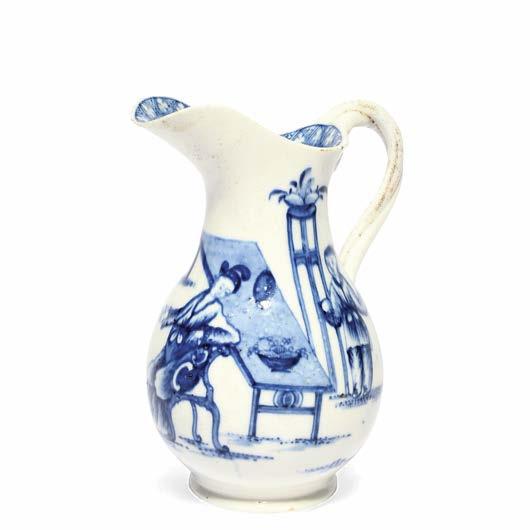

482 Three Liverpool blue and white teabowls and saucers, c.175660, and two saucers, mostly Richard Chaffers, variously decorated with flowering branches, figures on rocks and island landscapes, four with varying trellis borders, some faults, 12.6cm max. (8) £200300
483 A Worcester blue and white Dutch jug, c.175558, the rounded body formed of overlapping cabbage leaves, painted in the Cabbage Leaf Floral pattern with continuous sprays of flowering prunus, and a large Liverpool mask jug printed with flower sprays, 22.8cm max. (2) £300400


484 Five Lowestoft blue and white teabowls and saucers, c.176575, one painted in the Robert Browne pattern, three with differing pagoda landscape designs, the last with willow and peony plants, 12.8cm max. (10) £200300
485 Five English porcelain plates, c.17651820, including a Chelsea dessert plate painted with fruit and flowers within a turquoise panelled border, a Derby plate painted in the Imari palette, another with flowers and an osier moulded border, a Caughley blue and white dessert dish in the Gillyflower pattern, and a Chamberlain’s Worcester plate painted with a dense floral arrangement, 27.3cm max. (5) £200300


486 A small study collection of English porcelains, 2nd half 18th century, including a Lowestoft teapot and cover and a Worcester teapot and cover painted with flowers, a Worcester coffee cup and saucer with flower sprays within a green ground border, a fluted Worcester teabowl and saucer painted with birds within leaf swags, a Lowestoft saucer painted with a Chinese garden, a Chamberlain’s saucer decorated with the Stag Hunt pattern, and a 19th century Derby figure of Dr Syntax disputing a bill, some faults, 21cm max. (11) £150250
Provenance: the Joy Hallam Collection. The teapots formerly with Geoffrey Godden. The Lowestoft saucer formerly the Frank Arnold Collection.
487 A small group of Caughley porcelains, c.177090, including a rare heartshaped dessert dish, probably decorated by Chamberlain with the Sèvres Swags formal floral design, an armorial cream jug with a mermaid crest above the initials GG, a trio with a formal design of gilt swags and green motifs, two coffee cups and saucers, a single coffee cup with gilt flowers, and a fluted teabowl with gilt dots, 27cm max. (11) £150200
Provenance: the Joy Hallam Collection. The cream jug formerly the Geoffrey Godden Reference Collection.
Exhibited: Caughley Polychrome Exhibition, Ironbridge, 2005, no.175 (the dessert dish).

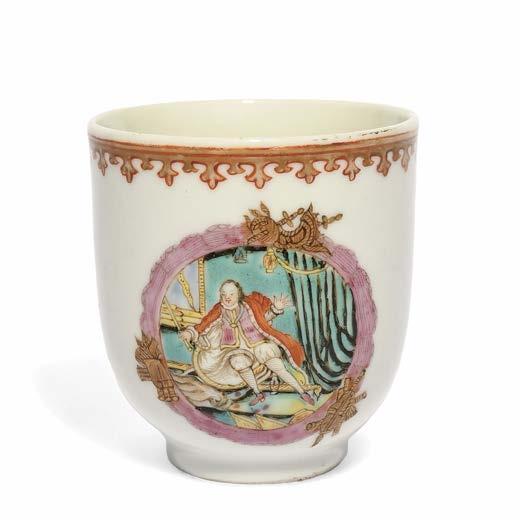

£80120
488 An unusual Chinese porcelain cup for the English theatrical market, 2nd half 18th century, painted with a vignette of the actor David Garrick in his role as Richard III, the sides with flowering branches, gilt spearhead border, 6.2cm.
489 A rare Chelsea fluted teabowl, c.175052, the fluted form painted in famille rose enamels with flowering plants and lotus, the interior with a single floral sprig, a rim crack, 5cm high.
£250350
Provenance: the Roger and Patricia Daniels Collection. Purchased from Colin Self, Tasmania, during the 1980s.
Famille rose decoration is rare at Chelsea. The few examples that do exist are based on imported Chinese wares from the Yongzheng period (1722-39) and are of much finer quality than those being produced at the rival Bow factory. Cf. F S Mackenna, Chelsea Porcelain: The Triangle and Raised Anchor Wares, pl.18, no.41 for two beakers with similar decoration.

490 A small Liverpool mug, c.1760, possibly William Reid, painted with colourful bamboo and rootwork before an ornamental fence, and a Richard Chaffers coffee cup painted with the Chinese Flower Show pattern with a figure standing beside a vase on a table, minor chips to the mug, 6.3cm max. (2) £200300
The mug with a paper label for A J Filkins.

491 A small English porcelain mug, c.178090, probably Caughley, the cylindrical body painted with a polychrome flower spray and small scattered sprigs beneath a pink trellis border, 6.8cm. £100150
492 A pair of Longon Hall dessert plates, c.1755, the deep wells painted with floral arrangements and single scattered blooms within leafmoulded rims highlighted in a rich green and puce, 24cm. (2)
£300400


493 A pair of Worcester dessert plates of ‘Lord Rodney’ type, c.1780, finely painted with colourful birds standing before buildings on an opposite river bank, with further birds in flight and perched on branches above, the scalloped rims with a blue border edged in gilt C scrolls, open crescent marks, chipping to the rims, 22cm. (2) £200300
Provenance: a private collection in Sussex.

ti
The shape of the two dishes is that used for the Duke of Cambridge service.

496 An early Chelsea whiteglazed beaker, c.1747, the tall flared form of eight lobes, sprigged with spiralling tea plant sprays, a small chip to the foot, 7cm.
£600800
Cf. Malcolm Anderson, An Exhibition of Early St Cloud and Chelsea Porcelain, pl.XI and pl.XIII.

495 A Bow botanical plate, c.1758, of octagonal form, painted with a spray of Lavatera (Tree Mallow), the rim with a caterpillar and colourful moths, brown line rim, some restoration, 21.3cm.
The print is after an engraving by Vallet.
£400600
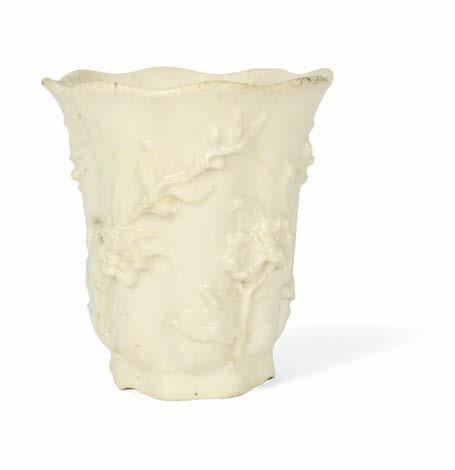
497 An early Chelsea ‘ten square’ saucer dish, c.1752, the tensided form painted in the Kakiemon palette with a longtailed bird swooping down beside another perched in a flowering prunus tree issuing from banded hedges, the rim with a continuous floral border in red and gilt, a rim crack, 16.6cm.
£250350
Cf. Simon Spero, A Taste Entirely New, Chelsea Porcelain 1744-54, 1988, fig. 24 for a larger version of this dish.
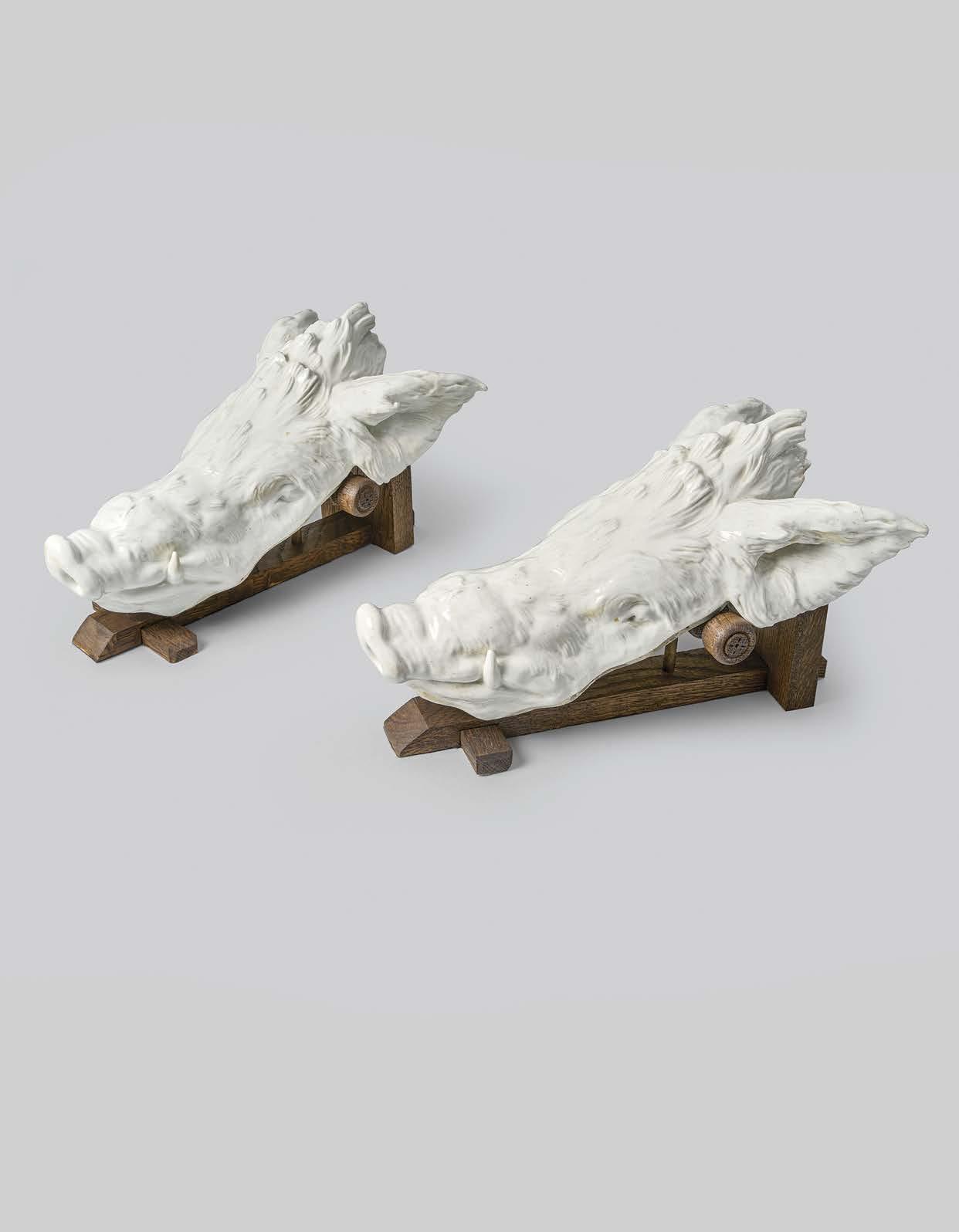
498 A rare pair of Chelsea boar’s heads, c.175255, to form the cover of two tureens, realistically modelled with tusks and benign expressions, left in the white, a large chip to the flange of one, 41.5cm. Together with two modern wooden stands. (4)
Provenance: a private collection. Formerly the John Hewett Collection and with Albert Amor Ltd in 1997. Also the J J Tufnell Collection.
£7,0009,000
Tureens of this type are mentioned in the factory sale of 1755 as lot 60 (8th day of sale) and lot 90 (14th day of sale). Very few examples have survived. A polychrome example is in the collection of the Ashmolean Museum, Oxford, and another in the Campbell Museum, New Jersey.
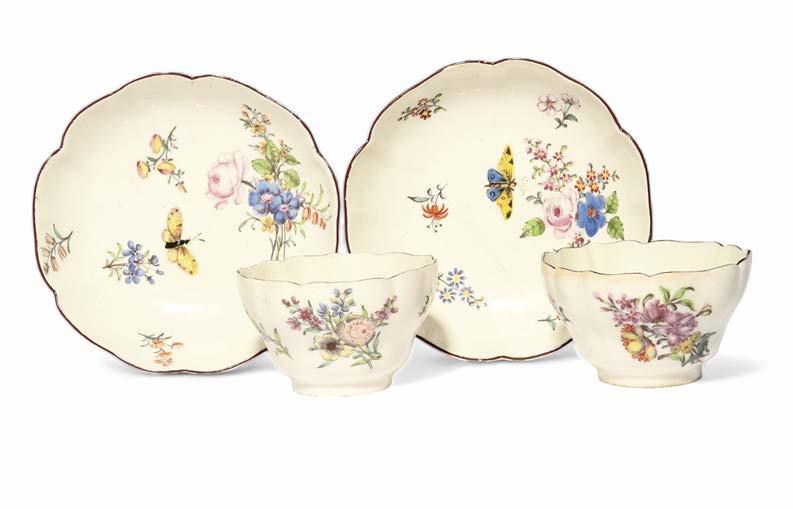
499 A pair of Chelsea teabowls and saucers, c.1754, of lobed hexafoil form, painted with sprays and arrangements of flowers amidst colourful moths and insects, red anchor marks, a crack to the well of one saucer, 11.5cm max. (4)
£200300

500 Five English porcelain milk jugs, c.175565, one Bow and painted with a peony spray, one Lowestoft and painted with Chinese figures, another with flower sprays, a Liverpool jug painted with a flower spray and another with similar decoration, small faults, 9cm max. (5)
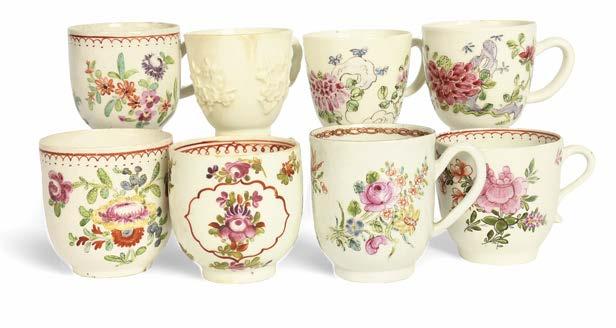
£150250
502 Six English porcelain coffee cups, 2nd half 18th century, including Worcester and Liverpool, five decorated with scenes of Chinese figures at various pursuits, one Chaffers and decorated with a Scarlet Japan pattern, 6.5cm max. (6)
£100200
501 Eight English porcelain coffee cups, c.175270, two Bow and painted with peony, another Bow applied with prunus, the others Bow, Lowestoft and Liverpool and variously decorated with polychrome flower sprays, 6.6cm max. (8)
£150250

503 A collection of English porcelain teawares, c.176580, mostly Worcester, including a Warmstryfluted teabowl and saucer in the Scarlet Japan pattern, a trio in a Hop Trellis design, a coffee cup, teacup and three saucers in a panelled Kakiemon pattern, a Fan pattern saucer, a Jabberwocky saucer, and six various coffee cups, some damages, 13.4cm max. (18) £200300
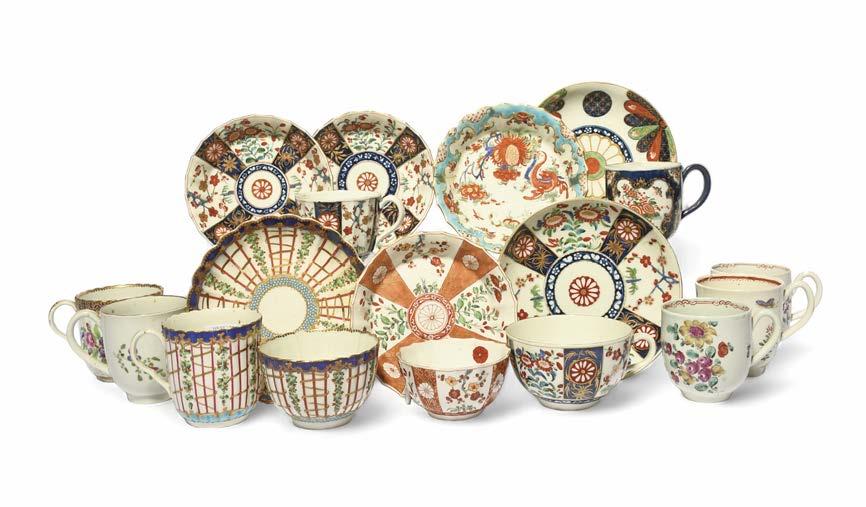

504 A Longton Hall strawberry plate, c.1756, the well painted with sprays of flowers, the rim moulded with fruiting sprays, a Chelsea dessert dish painted with moths and fruiting branches, brown anchor mark, and a Worcester breakfast sized teabowl and saucer, painted with panels of birds and swags of fruit and leaves, 27.7cm max. (4) £100200
Provenance: the Joy Hallam Collection.
505 A Longton Hall teabowl and saucer, c.1755, painted with flowering peony branches and bamboo issuing from holey rootwork and a low fence, a Chelsea dessert plate painted with six small panels of green monochrome birds within ribboned leaf swags, gold anchor mark, and a Chelsea plate painted with flowers within a feathered border, some wear, 22.5cm max. (4) £400600


506 A Worcester tea service, c.177585, painted with small sprays of European flowers within a red crowsfoot border. Comprising: a teapot and cover with stand, a jug and cover, a sucrier and cover, two cake plates, seven teabowls, five coffee cups and 12 saucers. (33)
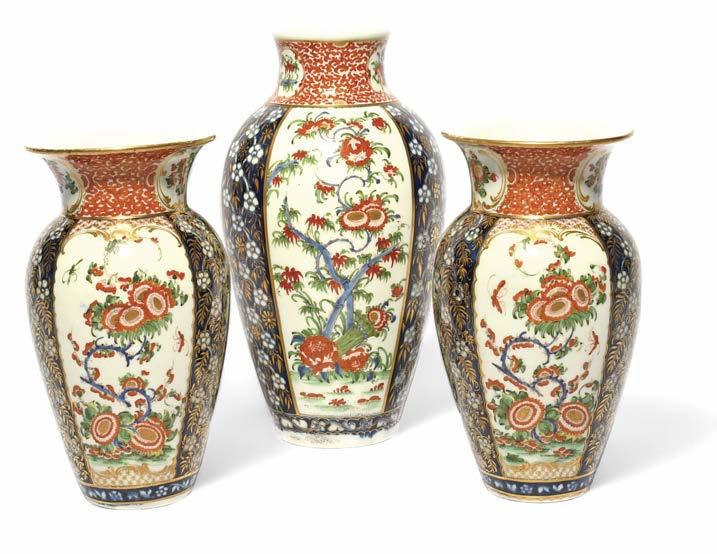
£200300

507 A garniture of three Worcester vases, c.176870, the baluster forms richly decorated in a panelled Japan pattern, with Kakiemon bands of longtailed birds perched on flowering plants, alternating with white and gilt floral designs on a blue ground, square seal marks, a small restuck section to one rim, 20.3cm and 16.5cm. (3)
Provenance: a private collection in Sussex.
£8001,200
508 A BaddeleyLittler mask jug, c.178085, moulded with overlapping cabbage leaves, brightly painted with sprays of flowers and single scattered blooms, the mask spout enamelled with ruddy cheeks, the handle and neck with puce detailing, 21cm.
£250350

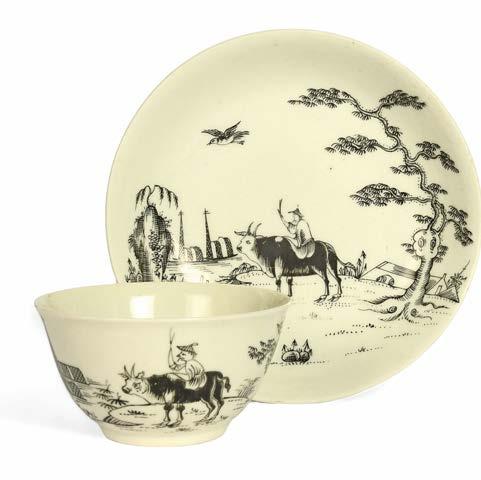
509 A rare William Reid (Liverpool) milk jug, c.175556, painted in red, green and black with flowering plants, the interior rim with a red crowsfoot border, red S marks around the handle, 8.3cm.
Exhibited: Phillips, Liverpool Exhibition, 1997, no.813.
£300400
510 A Worcester teabowl and saucer, c.175558, pencilled in black with the Boy on a Buffalo pattern, the eponymous pair standing beneath a gnarled pine tree, with boats in the water beside, workman’s mark to the teabowl, 12cm. (2) £150250
511 A Worcester Blind Earl plate, c.1770, moulded and painted with a rosebud and leaves, painted inbetween with small sprays of flowers and scattered leaves, the scalloped rim with a gilt C scroll motif, 19.7cm.
£200300
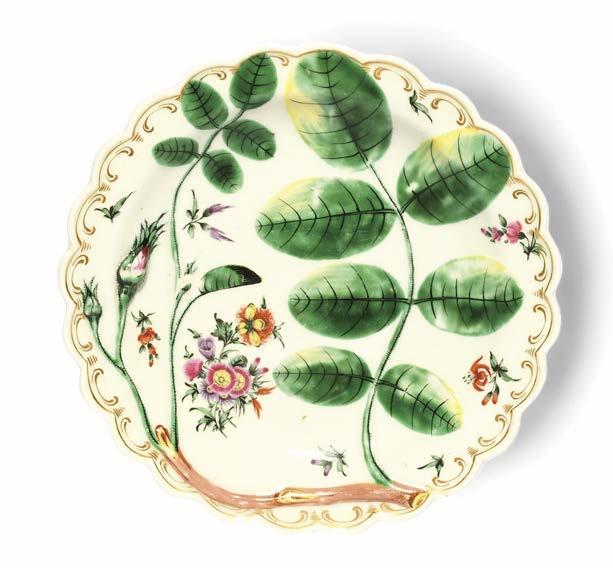
512 A rare and early Worcester spoon tray, c.1754, the long octagonal shape painted with a version of the Stag Hunt pattern, with a red stag being chased by a black dog behind bowing Chinese figures between low islands, the border pencilled with a continuous band of ruyi heads, a few filled rim chips, 15.3cm.
£300400
Provenance: The Zorensky Collection: sold Bonham’s, 16th March 2004, lot 15; Sir Jeremy Lever: sold Bonham’s 7th March 2007, lot 15; Paul Crane: sold Bonham’s, 31st March 2010, lot 26.

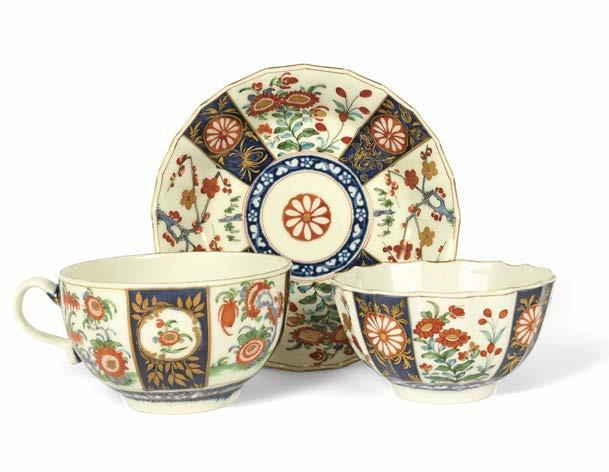
513 A Worcester teabowl and saucer, c.1770, the Warmstryfluted bodies decorated in a panelled Japan pattern with flowering plants in the Kakiemon palette, with a Worcester teacup decorated in a similar manner, square seal marks, 12cm. (3) £80120
Provenance: a private collection in Sussex.
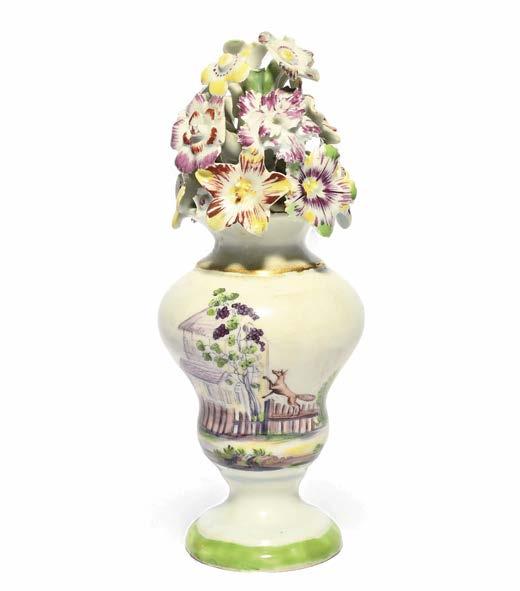
515 An unusual Derby Fable flower vase, c.1760, of baluster shape, painted with the fable of the Fox and the Grapes, the animal leaping for the fruit before a fence and tall building, the reverse painted with flowers, the top applied with a profusion of flowers, small losses to the flowers, 17cm. £200300
Cf. Victoria and Albert Museum, Accession No. C.1147-1924.

514 A rare Vauxhall pickle dish, c.1756, of deep leaf shape, painted with a polychrome flower spray and narrow leaf tendrils, raised on three peg feet, 7.8cm across.
£250350
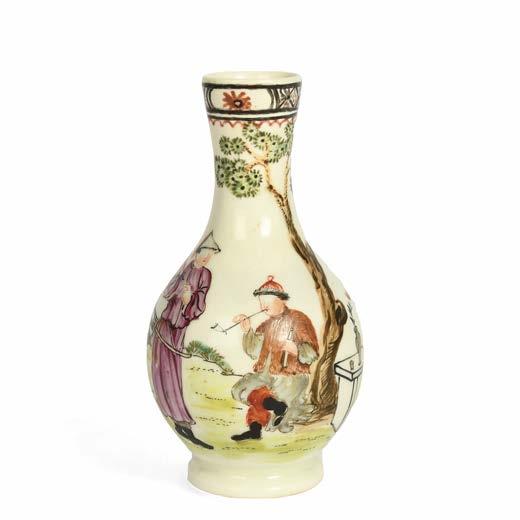
516 A small Lowestoft bottle vase, c.1780, painted in polychrome enamels with a Chinese figure smoking a longstemmed pipe beside a further figure holding a bird, the rim with a panelled border in black and red, some good restoration to the neck, 10.5cm. £500800
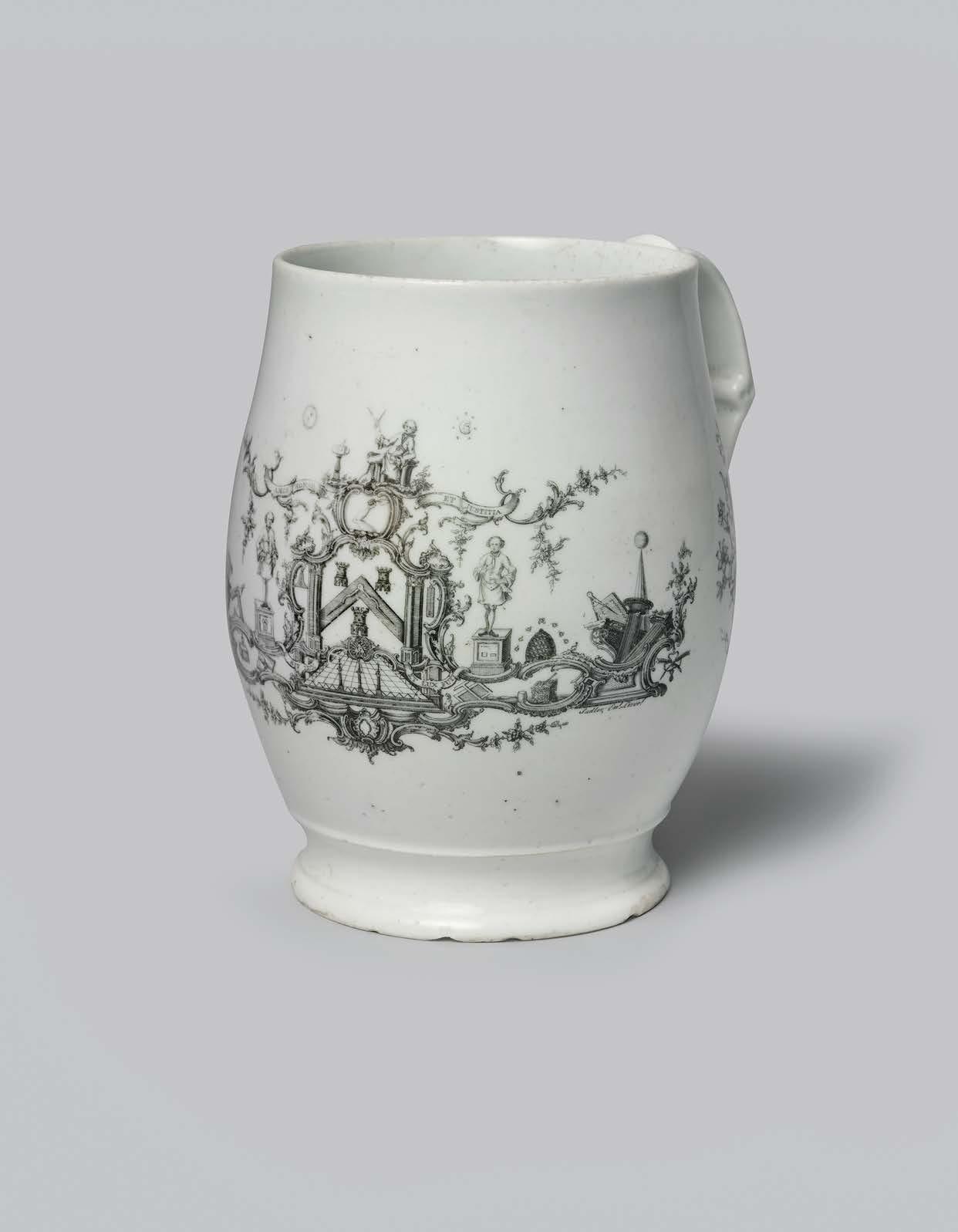
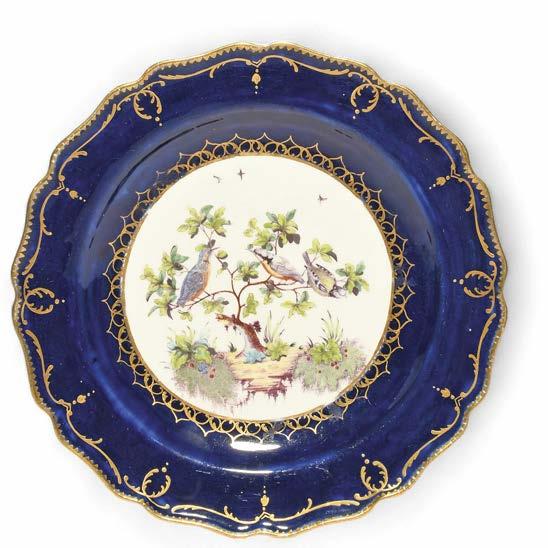
519 A Chelsea plate of MecklenburgStrelitz type, c.176465, the well painted with an Italianate landscape scene within scattered insects and moths, the rim with further gilt insects on a blue ground between flower garland panels, gold anchor mark, 22cm. £250350
A service with the same rim was ordered by King George III and Queen Charlotte in 1762 as a gift to Duke Adolphus Frederick IV of Mecklenburg-Strelitz, the Queen’s brother. That service had bird decoration to the well.

518 A rare Chelsea plate, c.1760, painted to the well with songbirds perched on a low tree flanked by further plants, reserved within a gilt scroll border on a mazarin blue ground, gilt dentil rim, gold anchor mark, 21.5cm. £300500
Provenance: Thomas, 2nd Marquess of Bath (1765-1847), Longleat, Wiltshire and by descent until sold Christie’s, London, 13th June 2002, lot 314 (part). Listed in the inventories of Longleat - 1869 and 1896.
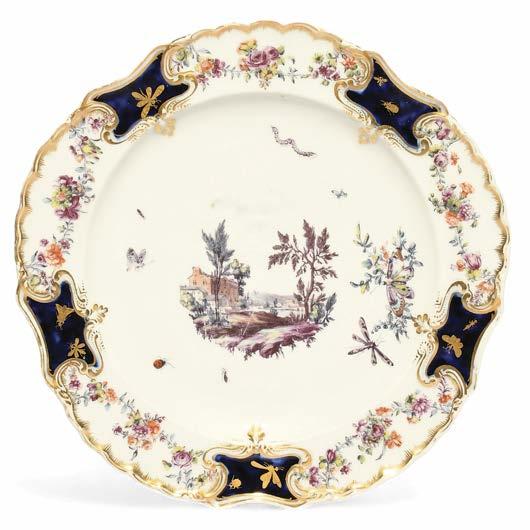
520 A Chelsea dessert plate, c.1760, the well painted with a fruiting pomegranate spray, with scattered moths and a caterpillar around, the rim with three panels of colourful birds within gilt foliate and trellis borders on a mazarin blue ground, gold anchor mark, some good restoration to the rim, 20.7cm. £150250
521 A Bristol coffee cup and saucer, c.1775, painted with berried leaf swags beneath a continuous husk border, gilt dentil rim, blue X and gilt numeral marks, 12.7cm. (2)
Paper label for Klaber & Klaber.
£100150
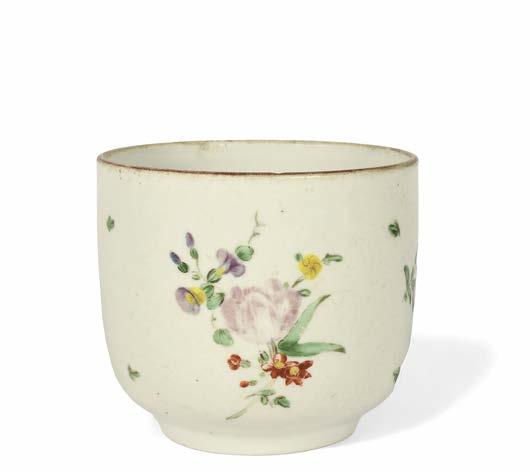

522 A Bristol glass cooler or bowl, c.177275, the Ushaped vessel painted with sprays of European flowers, with a puce line rim, blue X mark, two chips to the rim, 9cm. £150250
Paper label for A J Filkins.
523 A good Bristol dessert dish, c.177275, painted possibly by Henry Bone with sprays of flowers to the well, the cavetto with floral garlands suspended with a border of entwined ribbons in blue and puce, blue X mark, 29.5cm. £150250


TUESDAY 4TH FEBRUARY 2025
WEDNESDAY 4TH SEPTEMBER 2024





City Centre Salerooms
Monday to Friday 9am – 5pm
Old Sarum Galleries
Monday to Friday 9am – 5pm
All our auctions are on view at least two days prior to the sale and details will be found in the relevant catalogues.
All first time buyers need to register with us.
To register, you will need to provide two forms of identification:
1. a passport or photographic driving licence
2. a utility bill or document showing your name and address You can register in person or by contacting the office on 01722 424500 or emailing id@woolleys.live You will be asked to show your documents or email copies.
PLEASE NOTE: Registering with our website, or any third party website, does not automatically register you to bid with us.
See below for the different options for bidding. Please note that you may be asked to provide two forms of identification, even if you have bid with us before, in order that we are compliant with Money Laundering Regulations.
To bid at auction you will need a paddle number. This can be obtained from the office either during the view or on the day of the sale.
If you are unable to attend the sale you can leave a commission bid. This will be executed on your behalf by the auctioneer who will purchase the lot as cheaply as possible bearing in mind any reserve price and other bids.
It is usually possible to bid on the telephone by prior arrangement with the office.
Live online bidding is now available free of charge for most of our auctions via bid.woolleyandwallis.co.uk, enabling you to take part in the bidding from anywhere in the world live as it happens.
The Buyer shall pay the hammer price together with a premium thereon of 26% plus VAT @20% (totalling 31.2% inclusive) on the first £500,000 and 20% plus VAT @20% (24% inclusive) thereafter.
The relevant department will be pleased to give condition reports on any lot, where practical. All weights and measures given in the catalogue should be regarded as approximate.
The colours printed in the catalogue are not necessarily true.
These will be posted on our website shortly after the sale.
Woolley & Wallis do not offer a packing and despatch service but the following are carriers in our area.
Alban Shipping +44 (0)1582 493099 info@albanshipping.co.uk www.albanshipping.co.uk
Kimdan Ltd +44 (0)7973 389436 andy@kimdan.co.uk
Mailboxes +44 (0)1962 622133 info@mbewinchester.co.uk www.mbe.co.uk/winchester
ZIXIS Fine Art Limited +44 (0)7873 981026 zixisfineart@163.com www.zixisfineart.co.uk
Please note that we cannot be held responsible for any damage or loss to items once they are in the hands of a carrier.
If you are exporting your property, import taxes, customs duties and other fees may apply at the country of destination. It is also your responsibility to ensure that your shipment can be lawfully imported to the destination country.
Please note that due to the withdrawal of the Retail Export Scheme by HMRC, we are unable to provide VAT refund documentation (C88) for handcarried exports.
In order to qualify for a VAT refund, your lots must be exported by a shipper and valid export documentation must be provided.
Payment is due immediately after the auction in pounds sterling. If you are a first time buyer we will need your name, address and bank details and will require funds to be cleared before purchases can be released.
The following methods of payment may be made:
Bankers draft, cashiers cheque, personal cheque, debit and credit cards.
Wire transfers should be sent to:
Lloyds Bank plc, Blue Boar Row, Salisbury SP1 1DB.
Account no. 00957707
Sort code 309741
IBAN no. GB20LOYD30974100957707
BIC code LOYDGB21063
Debit and Credit cards: Visa, Mastercard, Amex or Union Pay.
Where practical, payment can be made and purchases collected during the auction.
We reserve the right to add storage charges to all lots not collected within 30 calendar days of the sale. This will include a handling fee of £20 (+ VAT) per consignment and a storage charge of £2 (+ VAT) per lot per day. No goods will be allowed to be collected until these charges have been paid.
VAT
Lots marked with an dagger (†) are subject to VAT on the hammer price. Lots marked with an omega (Ω) have been temporarily imported from outside the EU and are subject to VAT at 5% on the hammer price and the buyer’s premium. In online catalogues, the Sales Tax % column indicates the rate of VAT on hammer price.
Please note that lots marked λ may be subject to CITES Regulations when exported.
The CITES Regulations may be found at www.defra.gov.uk/ahvlaen/importsexports/cites/
Lots marked with a Φ symbol are potentially subject to a levy.
Droit de Suite is a royalty payable to a qualifying artist or the artist’s heirs each time a work is resold during the artist’s lifetime and up to a period of 70 years after the artist’s death.
Royalties are calculated on a sliding percentage scale based on the hammer price excluding the buyer’s premium. The royalty does not apply to lots selling below £1,000 and the maximum royalty payable on any single lot is £12,500.
Droit de Suite, which is not subject to VAT, will be added to the buyer’s purchase price and then passed on to the relevant collecting agency.
Royalties for Droit de Suite are as follows:
4% Up to £50,000
3% £50,000.01 200,000
1% £200,000.01 350,000
0.5% £350,000.01 500,000
0.25% In excess of £500,000
Up to a maximum levy of £12,500
Lots marked Ƒ in the catalogue, or by any other means identified as controlled firearms, are subject to the UK firearms/shotgun licencing regime, and should only be viewed/purchased by individuals with appropriate licences. It is the responsibility of the bidders to ensure that they are legally authorised to acquire the lot that they are bidding for. In the event that such a lot is successfully bid for by an individual who is not authorised to possess it, that individual will be required to pay for it, but will not be allowed to take physical possession of it. The auctioneers will reoffer the lot on behalf of the buyer in a future auction; or may accept instructions to dispose of it by some other legal means, at their discretion.
1 . Introduction. The following informative notes are intended to assist Buyers, particularly those inexperienced or new to our salerooms. All sales are conducted on our printed Conditions of Sale which are readily available for inspection and normally accompany catalogues. Our staff will be happy to help you if there is anything you do not fully understand.
2. Agency. As auctioneers we usually contract as agents for the seller whose identity, for reasons of confidentiality, is not normally disclosed. Accordingly if you buy your primary contract is with the seller.
3. Estimates. Estimates are designed to help buyers gauge what sort of sum might be involved for the purchase of a particular lot. The lower estimate may represent the reserve price and certainly will not be below it. Estimates do not include the Buyer’s Premium or VAT (where chargeable). Estimates are prepared some time before the sale and may be altered by announcement before the sale. They are in no sense definitive.
4. The purchase price. The Buyer shall pay the hammer price together with a premium thereon of 26% plus VAT @20% (totalling 31.2% inclusive) on the first £500,000 and 20% plus VAT @20% (24%) inclusive thereafter.
5. VAT. (†) indicates that VAT at the current standard rate is payable by the purchaser on the hammer price as well as being an element in the buyer’s premium. This imposition of VAT is likely to be because the seller is registered for VAT within the European Union and is not operating the Dealers Margin Scheme or because VAT is due at 20% on importation into the UK. The omega symbol (Ω) indicates that the lot has been imported from outside the European Union and the present position is that these lots are liable to a reduced rate of VAT (5%) on the gross lot price (i.e. both the hammer price and the buyer’s premium). Lots which appear without either of the above symbols indicate that no VAT is payable on the hammer price. This is because such lots are sold using the Auctioneers’ Margin Scheme and it should be noted that the VAT included within the Premium is not recoverable as input tax.
6. We are, primarily, agents for the seller. We are dependent on information provided by the seller and whilst we may inspect lots and act reasonably in taking a general view about them we are normally unable to carry out a detailed or any examination of lots in order to ascertain their condition in the way in which it would be wise for a buyer to do. Intending buyers have ample opportunity for inspection of goods and, therefore, accept responsibility for inspecting and investigating lots in which they may be interested. Please note carefully the exclusion of liability for the condition of lots contained in the Conditions of Sale. Neither the seller nor we, as the auctioneers, accept any responsibility for their condition. In particular, mechanical objects of any age are not guaranteed to be in working order. However, in so far as we have examined the goods and make a representation about their condition, we shall be liable for any defect which that examination ought to have revealed to the auctioneer but which would not have been revealed to the buyer had the buyer examined the goods. Additionally, in specified circumstances lots misdescribed because they are ‘deliberate forgeries’ may be returned and repayment made. There is a 3 week time limit. (The expression ‘deliberate forgery’ is defined in our Conditions of Sale).
7. Electrical goods. These are sold as ‘antiques’ only and if bought for use must be checked over for compliance with safety regulations by a qualified electrician first.
8. Export of goods. Buyers intending to export goods should ascertain (a) whether an export licence is required for the goods to leave the U.K. and (b) whether there is any specific prohibition on importing the goods in question into the destination country because, e.g. they may contain prohibited materials such as ivory. Charges may be applicable for export licences. Ask us if you need help. The denial of any permit or licence shall not justify cancellation or rescission of the sale contract or any delay in payment.
9. Bidding. Bidders will be required to register before the sale commences and lots will be invoiced to the name and address on the registration form. Some form of identification will be required if you are unknown to us. Please enquire in advance about our arrangements for telephone bidding.
10. Commission bidding. Commission bids may be left with the auctioneers indicating the maximum amount to be bid excluding buyers’ premium. They will be executed as cheaply as possible having regard to the reserve (if any) and competing bids. If two buyers submit identical commission bids the auctioneers may prefer the first bid received. Please enquire in advance about our arrangements for the leaving of commission bids by telephone.
11. Methods of Payment. As a general rule any cheques tendered will need to be cleared before removal of the goods is permitted. Please discuss with our Office in advance of the sale if other methods of payment are envisaged.
12. Collection and storage. Please note what the Conditions of Sale state about collection and storage. It is important that goods are paid for and collected promptly. Any delay may involve the buyer in paying storage charges.
1. Interpretation. In these Terms the words ‘you’, ‘yours’, etc. refer to the Seller and if the consignment of goods to us is made by an agent we assume that the Seller has authorised the consignment and that the consignor has the Seller’s authority to contract. Similarly the words ‘we’, ‘us’, etc. refer to the Auctioneers.
2. Commission is charged to sellers at the following rates: 15% + VAT on each lot sold for up to £999, 10% + VAT on each lot realising £1,000 and above.
3. Removal costs. Items for sale must be consigned to the sale room by any stated deadline and at your expense. We may be able to assist you with this process but any liability incurred to a carrier for haulage charges is solely your responsibility.
4. Loss and damage waiver. We are not regulated by the FSA for the provision of insurance to clients. However, we for our own protection assume liability for property consigned to us at lower presale estimate. To justify accepting liability, we make a charge of 1.5% of the hammer price plus VAT or, if unsold, our mid estimate of the hammer price. If the owner of goods consigned instructs us in writing not to take such action, they then remain at owner’s risk unless and until the property in them passes to the Buyer or they are collected by or on behalf of the owner, and clause 4 is inapplicable.
5. Illustrations. The cost of any illustrations is borne by you. If we consider that the lot should be illustrated your permission will usually be asked first. The copyright in respect of such illustrations shall be the property of us, the auctioneers, as is the text of the catalogue.
6. Minimum bids and our discretion. Goods may be offered subject to a reserve agreed between us before the sale in accordance with clause 7.
7. We may sell lots below the reserve provided we account to you for the same sale proceeds as you would have received had the reserve been the hammer price. If you specifically give us ‘discretion’ we may accept a bid of up to 10% below the formal reserve.
Reserves.
(a) You are entitled to place prior to the auction a reserve on any lot consigned, being the minimum hammer price at which that lot may be sold. Reserves must be reasonable and we may decline to offer goods which in our opinion would be subject to an unreasonably high reserve (in which case goods carry the storage and insurance charges stipulated in these Terms of Consignment).
(b) A reserve once set cannot be changed except with our consent.
(c) Where a reserve has been placed only we may bid on your behalf and only up to the reserve (if any) and you may in no circumstances bid personally.
8. Electrical items. These are subject to detailed statutory safety controls. Where such items are accepted for sale you accept responsibility for the cost of testing by external contractors. Goods not certified as safe by an electrician (unless antiques) will not be accepted for sale. They must be removed at your expense on your being notified. We reserve the right to dispose of unsafe goods as refuse, at your expense.
9. Soft furnishings. The sale of soft furnishings is strictly regulated by statute law in the interests of fire safety. Goods found to infringe safety regulations will not be offered and must be removed at your expense. We reserve the right to dispose of unsafe goods as refuse, at your expense. The rights of disposal referred to in clause 8 and 9 are subject to the provisions of The Torts (Interference with Goods) Act 1977, Schedule 1, a copy of which is available for inspection on request.
10. Descriptions. Please assist us with accurate information as to the provenance etc. of goods where this is relevant. There is strict liability for the accuracy of descriptions under modern consumer legislation and in some circumstances responsibility lies with sellers if inaccuracies occur. We will assume that you have approved the catalogue description of your lots unless informed to the contrary. Where we are obliged to return the price to the buyer when the lot is a deliberate forgery under Condition 15 of the Conditions of Sale and we have accounted to you for the proceeds of sale you agree to reimburse us the sale proceeds. The liability to reimburse the sale proceeds shall not arise where you are acting reasonably and honestly and are unaware of the forgery but we are or ought to have been aware of it.
11. Unsold and withdrawn items. If an item is unsold it may with your consent be reoffered at a future sale. Where in our opinion an item is unsaleable you must collect such items from the saleroom promptly on being so informed. Otherwise, storage charges may be incurred. We reserve the right to charge for storage in these circumstances at a reasonable daily rate.
12. Withdrawn and bought in items. These are liable to incur a charge of up to 10% plus VAT of the reserve or low estimate on being bought in or withdrawn after being catalogued.
13. Conditions of Sale. You agree that all goods will be sold on our Conditions of Sale. In particular you undertake that you have the right to sell the goods either as owner or agent for the owner. You undertake to compensate us and any buyer or third party for all losses liabilities and expenses incurred in respect of and as a result of any breach of this undertaking.
14. Authority to deduct commission and expenses and retain premium and interest.
(a) You authorise us to deduct commission at the stated rate and all expenses incurred for your account from the hammer price and consent to our right to retain beneficially the premium paid by the buyer in accordance with our Conditions of Sale and any interest earned on the sale proceeds until the date of settlement.
(b) You authorise us in our discretion to negotiate a sale by private treaty not later than the close of business on the day of the sale in the case of lots unsold at auction, in which case the same charges will be payable as if such lots had been sold at auction and so far as appropriate these terms apply.
15. Warehousing. We disclaim all liability for goods delivered to our saleroom without sufficient sale instructions and reserve the right to make minimum warehousing charge of £2 per lot per day. Unsold lots are subject to the same charges if you do not remove them within a reasonable time of notification. If not removed within three weeks we reserve the right to sell them and defray charges from any net proceeds of sale or at your expense to consign them to the local authority for disposal.
16. Settlement. Subject to our normal trading conditions, payment will be made by BACS or cheque 5 weeks after the sale unless the buyer has not paid for the goods. In this case no settlement will then be made but we will take your instructions in the light of our Conditions of Sale. You authorise any sums owed by you to us on other transactions to be deducted from the sale proceeds. You must note the liability to reimburse the proceeds of sale to us as under the circumstances provided for in Condition 10 above. You should therefore bear this potential liability in mind before parting with the proceeds of sale until the expiry of 28 days from the date of sale.
Woolley & Wallis Salisbury Salerooms Ltd carries on business with bidders, buyers and all those present in the auction room prior to or in connection with a sale on the following General Conditions and on such other terms, conditions and notices as may be referred to herein.
1. DEFINITIONS
In these Conditions:
(a) ‘auctioneer’ means Woolley & Wallis Salisbury Salerooms Ltd or its authorised auctioneer, as appropriate;
(b) ‘deliberate forgery’ means an imitation made with the intention of deceiving as to authorship, origin, date, age, period, culture or source but which is unequivocally described in the catalogue as being the work of a particular creator and which at the date of the sale had a value materially less than it would have had if it had been in accordance with the description;
(c) ‘hammer price’ means the level of bidding reached (at or above any reserve) when the auctioneer brings down the hammer;
(d) ‘terms of consignment’ means the stipulated terms and rates of commission on which Woolley & Wallis Salisbury Salerooms Ltd accepts instructions from sellers or their agents;
(e) ‘total amount due’ means the hammer price in respect of the lot sold together with any premium, Value Added Tax chargeable and any additional charges payable by a defaulting buyer under these Conditions;
(f) ‘sale proceeds’ means the net amount due to the seller, being the hammer price of the lot sold less commission at the stated rate, Value Added Tax chargeable and any other amounts due to us by the seller in whatever capacity and however arising.
(g) ‘‘You’, ‘Your’, etc. refer to the buyer as identified in Condition 2.
(h) The singular includes the plural and vice versa as appropriate.
2.
(a) Bidders are required to register their particulars before bidding and to satisfy any security arrangements before entering the auction room to view or bid;
(b) the maker of the highest bid accepted by the auctioneer conducting the sale shall be the buyer at the hammer price and any dispute about a bid shall be settled at the auctioneer’s absolute discretion by reoffering the Lot during the course of the auction or otherwise. The auctioneer shall act reasonably in exercising this discretion.
(c) Bidders shall be deemed to act as principals.
(d) Our right to bid on behalf of the seller is expressly reserved up to the amount of any reserve and the right to refuse any bid is also reserved.
3. INCREMENTS
Bidding increments shall be at the auctioneer’s sole discretion.
4. THE PURCHASE PRICE
The Buyer shall pay the hammer price together with a premium thereon of 26% plus VAT @20% (totalling 31.2% inclusive) on the first £500,000 and 20% plus VAT @20% (24%) inclusive thereafter.
5. VALUE ADDED TAX
Value Added Tax on the hammer price is imposed by law on all items affixed with a † or Ω. Value Added Tax is charged at the appropriate rate prevailing by law at the date of sale and is payable by buyers of relevant lots. (Please refer to ‘Information for Buyers’ for a brief explanation of the VAT position).
6. PAYMENT
(a) Immediately a lot is sold you will:
(i) give to us, if requested, proof of identity, and
(ii) pay to us the total amount due in pounds sterling
(b) Any payments by you to us may be applied by us towards any sums owing from you to us on any account whatever without regard to any directions of you or your agent, whether express or implied.
(c) In line with new legislation we reserve the right to investigate and identify the source of any funds received by us. The completion of the sale of a Lot will be postponed or cancelled at our discretion if further time is needed for investigation, or if you are in breach of your warranties as a buyer, or if we consider the sale to be unlawful or in any way cause liabilities or be detrimental to either Woolley and Wallis or the Seller.
7. TITLE AND COLLECTION OF PURCHASES
(a) The ownership of any Lots purchased shall not pass to you until you have made payment in full to us of the total amount due.
(b) You shall at your own risk and expense collect any lots that you have purchased and paid for from our premises not later than 3 working days following the day of the auction or upon the clearance of any cheque used for payment (if later) after which you shall be responsible for any collection, storage and insurance charges.
(c) No purchase may be collected and we shall not release any lot to you or your agent until it has been paid for.
8. REMEDIES FOR NONPAYMENT OR FAILURE TO COLLECT PURCHASES
(a) If any Lot is not paid for in full and taken away in accordance with these Conditions or if there is any other breach of these Conditions, we, as agent for the seller and on our own behalf, shall at our absolute discretion and without prejudice to any other rights we may have, be entitled to exercise one or more of the following rights and remedies:
(i) to proceed against you for damages for breach of contract;
(ii) to rescind the sale of that lot and/or any other lots sold by us to you;
(iii) to resell the lot (by auction or private treaty) in which case you shall be responsible for any resulting deficiency in the total amount due (after crediting any part payment and adding any resale costs). Any surplus so arising shall belong to the seller;
(iv) to remove, store and insure the lot at your expense and, in the case of storage, either at our premises or elsewhere;
(v) to charge interest at a rate not exceeding 1.5% per month on the total amount due to the extent it remains unpaid for more than 3 working days after the sale;
(vi) to retain that or any other lot sold to you until you pay the total amount due;
(vii) to reject or ignore bids from you or your agent at future auctions or to impose conditions before any such bids shall be accepted;
(viii) to apply any proceeds of sale of other Lots due or in future becoming due to you towards the settlement of the total amount due and to exercise a lien (that is a right to retain possession of any of your property in our possession for any purpose until the debt due is satisfied.
(b) We shall, as agent for the seller and on our own behalf pursue these rights and remedies only so far as is reasonable to make appropriate recovery in respect of breach of these conditions
All members of the public on our premises are there at their own risk and must note the layout of the accommodation and security arrangements. Accordingly neither the auctioneer nor our employees or agents shall incur liability for death or personal injury (except as required by law by reason of our negligence) or similarly for the safety of the property of persons visiting prior to or at a sale.
Whilst prospective buyers are strongly advised to attend the auction and are always responsible for any decision to bid for a particular lot and shall be assumed to have carefully inspected and satisfied themselves as to its condition, we will if so instructed clearly and in writing execute bids on their behalf. Neither the auctioneer nor our employees or agents shall be responsible for any failure to do so save where such failure is unreasonable. Where two or more commission bids at the same level are recorded we reserve the right in our absolute discretion to prefer the first bid so made.
11. WARRANTY OF TITLE AND AVAILABILITY
The seller warrants to the auctioneer and you that the seller is the true owner of the property consigned or is properly authorised by the true owner to consign it for sale and is able to transfer good and marketable title to the property free from any third party claims.
12. AGENCY
The auctioneer normally acts as agent only and disclaims any responsibility for default by sellers or buyers.
13. TERMS OF SALE
The seller acknowledges that lots are sold subject to the stipulations of these Conditions in their entirety and on the Terms of Consignment as notified to the consignor at the time of the entry of the lot.
14. DESCRIPTIONS AND CONDITION
(a) Whilst we seek to describe lots accurately, it may be impractical for us to carry out exhaustive due diligence on each lot. Prospective buyers are given ample opportunities to view and inspect before any sale and they (and any independent experts on their behalf) must satisfy themselves as to the accuracy of any description applied to a lot. Prospective buyers also bid on the understanding that, inevitably, representations or statements by us as to authorship, genuineness, origin, date, age, provenance, condition or estimated selling price involve matters of opinion. We undertake that any such opinion shall be honestly and reasonably held and accept liability for opinions given negligently or fraudulently. Subject to the foregoing neither we the auctioneer nor our employees or agents nor the seller accept liability for the correctness of such opinions and all conditions and warranties, whether relating to description, condition or quality of lots, express, implied or statutory, are hereby excluded. This Condition is subject to the next following Condition concerning deliberate forgeries and applies save as provided for in paragraph 6 ‘information to buyers’.
(b) Private treaty sales made under these Conditions are deemed to be sales by auction for purposes of consumer legislation.
15. FORGERIES
Notwithstanding the preceding Condition, any lot which proves to be a deliberate forgery (as defined) may be returned to us by you within 21 days of the auction provided it is in the same condition as when bought, and is accompanied by particulars identifying it from the relevant catalogue description and a written statement of defects. If we are satisfied from the evidence presented that the lot is a deliberate forgery we shall refund the money paid by you for the lot including any buyer’s premium provided that (1) if the catalogue description reflected the accepted view of scholars and experts as at the date of sale or (2) you personally are not able to transfer a good and marketable title to us, you shall have no rights under this condition. The right of return provided by this Condition is additional to any right or remedy provided by law or by these Conditions of Sale.
GENERAL
16. We shall have the right at our discretion, to refuse admission to our premises or attendance at our auctions by any person.
17. (a) Any right to compensation for losses liabilities and expenses incurred in respect of and as a result of any breach of these Conditions and any exclusions provided by them shall be available to the seller and/or the auctioneer as appropriate.
(b) Such rights and exclusions shall extend to and be deemed to be for the benefit of employees and agents of the seller and/or the auctioneer who may themselves enforce them.
18. Any notice to any buyer, seller, bidder or viewer may be given by first class mail or Swiftmail in which case it shall be deemed to have been received by the addressee 48 hours after posting.
19. Special terms may be used in catalogue descriptions of particular classes of items in which case the descriptions must be interpreted in accordance with any glossary appearing in the catalogue.
20. Any indulgence extended to bidders buyers or sellers by us notwithstanding the strict terms of these Conditions or of the Terms of Consignment shall affect the position at the relevant time only and in respect of that particular concession only; in all other respects these Conditions shall be construed as having full force and effect.
21. English law applies to the interpretation of these Conditions.
22. Prior written consent must be sought by the buyer or any other party for the use of any images, illustrations and written materials produced by or for Woolley & Wallis relating to a lot or sale, including the contents of a catalogue. Copyright for any of the aforementioned will remain the property of Woolley & Wallis, subject to the provisions of the Copyright, Designs and Patents Act 1988. Woolley & Wallis and the seller make no representations or warranties that the buyer of a lot will acquire any copyright or other reproduction rights to it.
PAINTINGS, DRAWINGS, LITHOGRAPHS, ENGRAVINGS AND PRINTS
In accordance with long standing practice in Fine Art Sale Rooms certain terms used in descriptions in the Catalogue have the meanings ascribed to them in the glossary below.
Any statement as to authorship, attribution, origin, date, age, provenance and condition is a statement of opinion and is not to be taken as a statement of fact. The Company reserves the right, in forming their opinion, to consult and rely upon any expect or authority considered by them to be reliable.
(a) Edward Lear: In our opinion a work by the artist. (When the artist’s forename(s) is not known, a series of asterisks, followed by the surname of the artist, whether preceded by an initial or not, indicates that in our opinion the work is by the artist named.
(b) Attributed to Edward Lear: In our opinion probably a work by the artist but less certainly as to authorship is expressed than in the preceding category.
(c) Studio of Edward Lear: In our opinion a work by an unknown hand in the studio of the artist which may be or may not have been executed under the artist’s direction.
(d) Circle of Edward Lear: In our opinion a work by an as yet unidentified but distinct hand, closely associated with the named artist but not necessarily his pupil.
(e) Style of ...; Follower of Edward Lear: In our opinion a work by a painter working in the artist’s style, contemporary or nearly contemporary, but not necessarily his pupil.
(f) Manner of Edward Lear: In our opinion a work in the style of the artist and of a later date.
(g) After Edward Lear: In our opinion a copy of a known work of the artist.
(h) The term signed and/or dated and/or inscribed means that in our opinion the signature and/or date and/or inscription are from the hand of the artist.
(i) The term bears a signature and/or date and/or inscription means that in our opinion the signature and/or date and/or inscription have been added by another hand.
(j) Dimensions are given height before width.
(k) Pictures are framed unless otherwise stated.
If, on collation, any named item in this catalogue proves defective in text or illustration, the lot may be returned within 14 days of the sale with the defects stated in writing. This proviso shall not apply to defects stated in the catalogue or announced at the time of sale; nor to the absence of blanks, half titles, tissue guards or advertisements, damage in respect of bindings, stains, spotting, marginal tears or other defects not affecting completeness of text or illustration; nor to drawings, autographs, letters or manuscripts, signed photographs, music, atlases, maps or periodicals; nor to books not identified by title; nor to books sold not subject to return.
Droit de Suite is a royalty payable to a qualifying artist or the artist’s heirs each time a work is resold during the artist’s lifetime and up to a period of 70 years after the artist’s death.
Royalties are calculated on a sliding percentage scale based on the hammer price excluding the buyer’s premium. The royalty does not apply to lots selling below £1,000 and the maximum royalty payable on any single lot is £12,500.
Droit de Suite, which is not subject to VAT, will be added to the buyer’s purchase price and then passed on to the relevant collecting agency by the auctioneer.
Royalties for Droit de Suite are as follows:
4% Up to £50,000
3% £50,000.01 200,000
1% £200,000.01 350,000
0.5% £350,000.01 500,000
0.25% In excess of £500,000
Up to a maximum levy of £12,500
Lots marked with a Φ symbol are potentially subject to the levy.
This privacy notice (Notice) explains how Woolley and Wallis Salisbury Salerooms Limited (us, we, our, Woolley & Wallis), processes the personal data of users of our auction and valuation services (Services) and includes buyers, bidders and sellers of auction items as well as prospective users of our Services (you, your). It also explains your rights in relation to the personal data we hold about you.
This Notice is effective from May 2018. We may change this Notice from time to time. Any significant changes will be notified to you.
Woolley and Wallis is the data controller of your personal data and is subject to the Data Protection Act 2018 (DPA) and the General Data Protection Regulation (GDPR).
If you have any questions about how we use your personal data, whom we share it with, or if you wish to exercise any of the rights set out in this Notice, please contact us using the following details:
• By post – Privacy Officer, Woolley and Wallis Salisbury Salerooms, 5161 Castle Street, Salisbury, SP1 3SU.
• By email – privacyofficer@woolleys.live
• By telephone – +44 (0)1722 424599
We collect your personal data from the following sources: From you when you:
• interact with us before entering into a contract with us, for example when you express your interest in our Services;
• instruct us to provide Services to you, sign contractual documentation and provide information in connection with those instructions;
• communicate with us by post, telephone, email or via our website, for example in order to make enquiries or register for an online account;
• in various other ways as you interact with us during your time as a user (or potential user) of our Services, for the various purposes set out below.
From third parties such as:
• other auction houses and individuals and organisations in the auctioneering trade whom we may contact to check background details about you;
• thesaleroom.com who enable live online bidding and provide us with the name, contact details, the last four digits of registered payment cards and transaction history (in relation to activity on thesaleroom.com) of individuals who register for one of our auctions (please see thesaleroom.com’s privacy policy for further information). We also receive names, contact details, sale details and payment details (the amount and date paid) from realex payments (thesaleroom.com’s payment provider);
• sage pay who process payments on our behalf and who provide us with your name, contact details and payment details (only the last four digits of your payment card are provided);
• shipping companies whom you hire to collect items you purchased from us.
We may collect the following personal data about you:
• your name and contact details including address, telephone and email address;
• your image, as captured by CCTV, if you attend our premises;
• personal identification documents, including copies of governmentissued identification such as passport and driving license which are required to register bidders (or when we need to verify a seller’s details);
• account details and other information relating to your transactions/dealings with us and your use of our Services;
• payment details such as credit card and bank account details;
• credit and payment history (where you open an account with us as a buyer or bidder);
• information on your collecting preferences and aspirations, and your collections, acquisitions and disposals; and
• other information that you provide to us, for example, when you have a comment/complaint, submit a question, take part in a survey or where you express an interest in receiving marketing material or request further information.
We may also process special categories of personal data, including information concerning your health and medical conditions (for example, disability), where relevant to the provision of our Services.
THE BASIS FOR PROCESSING YOUR DATA, HOW WE USE THAT DATA AND WITH WHOM WE SHARE THAT DATA
WHERE WE HAVE A CONTRACTUAL RELATIONSHIP WITH YOU
We will process your personal data because it is necessary for the performance of a contract with you (for example, a contract to use our Services) or in order to take steps at your request prior to entering into a contract. In this respect, we use your personal data for the following:
• to interact with you before you enter into a contract with us, such as when you express your interest in our Services (for example, to send you information about our Services or answer enquiries about our Services);
• once you have engaged us and entered into a contract, to provide you with the Services set out in any contractual documents.
In this respect we will provide your data to our third party suppliers or subcontractors as necessary whom we engage to help us perform our Services or who assist us in conducting our business, such as our IT suppliers, data storage providers, and valuation companies.
LEGITIMATE INTERESTS
We may also process your personal data because it is necessary for our or a third party’s legitimate interests. Our legitimate interests include our commercial interests. In this respect, we may use your personal data for the following:
• to monitor and evaluate the performance and effectiveness of our Services, including by training our staff or monitoring their performance;
• to deal with any concerns or feedback you may have in the performance of the Services;
• for our internal business record keeping and processes;
• to seek advice on our rights and obligations, including obtaining legal advice;
• to contact you for marketing purposes. If you do not wish to receive such information, please let us know now or at any time in the future, and your details will be removed from our marketing list. We will not provide your personal data to third party organisations to use for their own marketing purposes;
• to customise our website and marketing communications in line with your particular interests or preferences;
• to collect money owed to us or our consignors;
• to carry out background and credit checks in relation to bidders and buyers.
In this respect we will provide your data to the following:
• our professional advisors;
• thesaleroom.com;
• debt collection agencies;
• third parties who assist us with our marketing;
• our website and email management software provider.
We may also process your Personal Data for our compliance with our legal obligations.
In this respect, we may use your Personal Data for the following:
• to meet our compliance and regulatory obligations, such as our tax reporting requirements or to carry out identity checks;
• in order to assist with investigations (including criminal investigations) carried out by competent authorities;
In this respect we will provide your data to the following:
• external auditors;
• the police and other competent authorities, including HMRC;
We may also process your Personal Data where we have your specific consent to do so (for example, where we have your agreement to include information about you (as a seller) in sale marketing materials) or where we have sought and obtained your consent to send you direct marketing by email, or for the use of cookies on our website. If you have given your consent and you wish to withdraw it, please contact us using the contact details set out above.
Please note that where our processing of your personal data relies on your consent and where you then withdraw that consent, we may not be able to provide all or some aspects of our Services to you and/or it may affect the provision of our Services.
We process special categories of personal data for the following reasons:
• if it is necessary to protect your or another person’s vital interests (for example, where you have a lifethreatening accident or illness and we have to process your personal data to ensure you receive appropriate medical attention);
• if it is necessary for the establishment, exercise or defence of legal claims (for example, to protect and defend our rights, and/or the rights of our customers);
We may process information relating to your health where we have your explicit consent to do so (for example, when you provide information about your access requirements prior to attending one of our events).
We transfer names and addresses on our Asian mailing list to a printing company in Hong Kong to distribute our auction catalogues and promotional material. In these circumstances, your personal data will be transferred subject to standard data protection clauses (adopted by the European Commission) and included in our contract with the printing company.
We share your data collected for marketing purposes and through our website with our website and email management software provider who are based in Jersey. In these circumstances, your personal data is transferred to them subject to an Adequacy Decision made by the European Commission in respect of Jersey.
We may use your geographical location to target our communications and advertising and promotions to you. If you do not wish us to do this, then please contact us using the details provided above.
We will retain your personal data for as long as we are providing you with the Services referred to in any contractual document, and for as long as is required for legal, regulatory, fraud prevention and our legitimate business purposes after the termination of your account/agreement with us, or if your application for a particular Service is declined or abandoned.
In particular:
• in relation to CCTV images taken when you attend our premises, we will retain these for a few months;
• in relation to personal data relating to the transactions you have entered into with us as part of the provision of our Services, we will retain that data for period of seven years after that transaction has concluded in case any legal claims arise out of the provision of those Services;
• we will retain your details on our marketing database until you inform us that you no longer wish to receive our marketing communications. However, where you do unsubscribe from our marketing communications we will keep your details on a suppression list to ensure that we do not send you information you have asked not to receive;
• in relation to personal data relating to the provenance of works, we may retain that data indefinitely in our legitimate interests and the legitimate interests of the wider art market in maintaining the integrity of that market.
Under the DPA you have the following rights:
• to obtain access to, and copies of, the personal data that we hold about you;
• to require that we cease processing your personal data if the processing is causing you damage or distress;
• to require us not to send you marketing communications.
• to require us to correct the personal data we hold about you if it is incorrect;
• to require us to erase your personal data;
• to require us to restrict our data processing activities (and, where our processing is based on your consent, you may withdraw that consent, without affecting the lawfulness of our processing based on consent before its withdrawal);
• to receive from us the personal data we hold about you which you have provided to us, in a reasonable format specified by you, including for the purpose of you transmitting that personal data to another data controller;
• to object, on grounds relating to your particular situation, to any of our particular processing activities where you feel this has a disproportionate impact on your rights.
Please note that the above rights are not absolute, and we may be entitled to refuse requests where exceptions apply
If you are not satisfied with how we are processing your personal data, you can raise a concern with the Information Commissioner. You can also find out more about your rights under data protection legislation from the Information Commissioner’s Office website available at: www.ico.org.uk
Valuations are a core part of our business and are usually carried out by a senior specialist or directors. Accuracy, speed and above all confidentiality are paramount.
Written valuations for insurance can vary from a single item to a large estate. Before starting we discuss the various options available so that the valuation is specifically tailored to individual client’s needs.
For valuations of an entire house contents an itemised bound valuation is produced and can be accompanied by photographs when required. In addition to providing an inventory, written valuations can prevent painful arguments with a loss adjuster in the event of a claim.
Woolley & Wallis valuations are accepted by all leading insurance companies.
We offer a speedy and professional service for executors and trustees and provide bound valuations for probate and duplicate copies when required. Since security is often a consideration, we can usually arrange for a house to be cleared and sent for auction, our Valuations Department ensures that executors are informed of which sales are involved and the results thereof.
We also carry out valuations for Family Division, Capital Gains Tax, and Private Treaty Sales.
Contact Jeremy Lamond +44 (0)1722 424502 | valuations@woolleys.live
Free verbal valuations of items for sale are available by appointment. Please email valuations@woolleys.live or call +44 (0)1722 424500




Please bid, on my behalf, for the undermentioned lots up to the prices shown which do not include the buyer’s premium or any V.A.T. payable on lots. These bids are to be executed as cheaply as is permitted by other bids, and/or reserves if any, and subject to the Conditions of Business printed in the catalogue. Please note we cannot guarantee that bids received after 4pm on the day prior to the auction will be executed.
Billing Name (please print)
Address
ID may be required even if you have bid with us before.
Signature
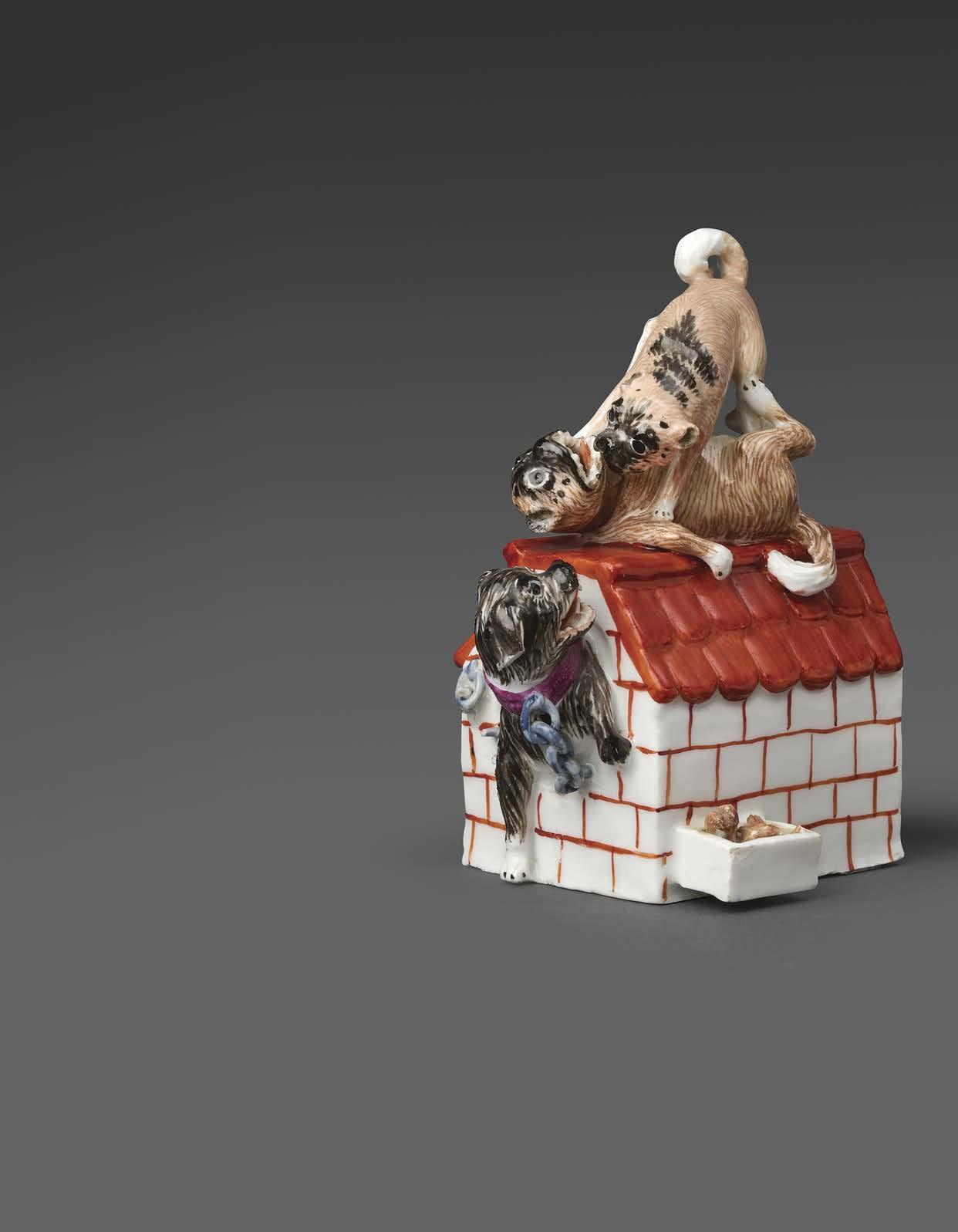
3rd British and Continental Ceramics & Glass 4th Old Masters, British & European Paintings 17th & 18th Arts of Africa, Oceania & the Americas
2nd & 3rd Furniture Works of Art & Clocks 16th & 17th Design
22nd & 23rd Silver & Objects of Vertu
30th & 31st Fine Jewellery
12th & 13th Asian Art, Chinese Paintings & Japanese Works of Art 27th Medals & Coins, Arms & Armour
3rd & 4th British Art Pottery 5th Modern British & 20th Century Art
Dates may be subject to change A rare Meissen dog and kennel group by J. J. Kändler, c.1735. SOLD FOR £8,820*
+44 (0) 1722 424500 enquiries@woolleyandwallis.co.uk
5161 Castle Street, Salisbury, SP1 3SU www.woolleyandwallis.co.uk *Price includes buyer’s premium
